

WELCOME TO
DRNY
I am always excited and proud to reflect upon our prior year’s work as we create our Annual Report. Once again, our advocacy efforts have brought about meaningful changes for people in New York State and across the country.
For example, we were successful in obtaining a landmark decision from the Second Circuit Court of Appeals ensuring that all of the protections under the IDEA are available to adult students between the ages of 1821. Prior to this decision, those students who were prevailing parties under the IDEA were prohibited from obtaining attorney’s fees.

We have also been litigating to ensure that Text to 911 services are available statewide in emergency situations. This past year, we finally secured a settlement with Nassau County. However, it is inexplicable to me that this critical service has not yet been implemented across the state.
It is important to note that none of these and DRNY’s many other successes would have been possible without the tireless efforts of our dedicated staff.
To them, I say, “Thank You”!
With that, I give you our FY23 Annual Report to explore more about our work and accomplishments.
Please let us know what issues are important to you and how we can help.
Timothy A. Clune, Esq. Executive DirectorWHO WE ARE
As the Protection & Advocacy (P&A) and Client Assistance Program (CAP) for New York State, all DRNY work is conducted with recognition that the people we serve combat persistent societal stigmatization and can be members of traditionally underserved populations, including BIPOC and LGBTQIA+ communities. We develop systemic advocacy projects to address patterns of discrimination, including state and federal systemic litigation, monitoring and investigation, publishing reports and policymaker education.
We do this through the following programs:
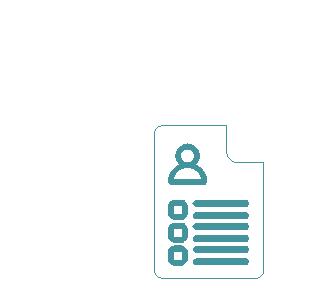
cap
Client Assistance Program
protection & advocacy for:


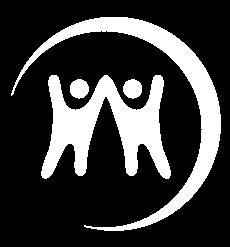

paat
Assistive Technology
pabss
Beneficiaries of Social Security
padd
Individuals with Intellectual and Developmental Disabilities
paimi
Individuals with Mental Illness
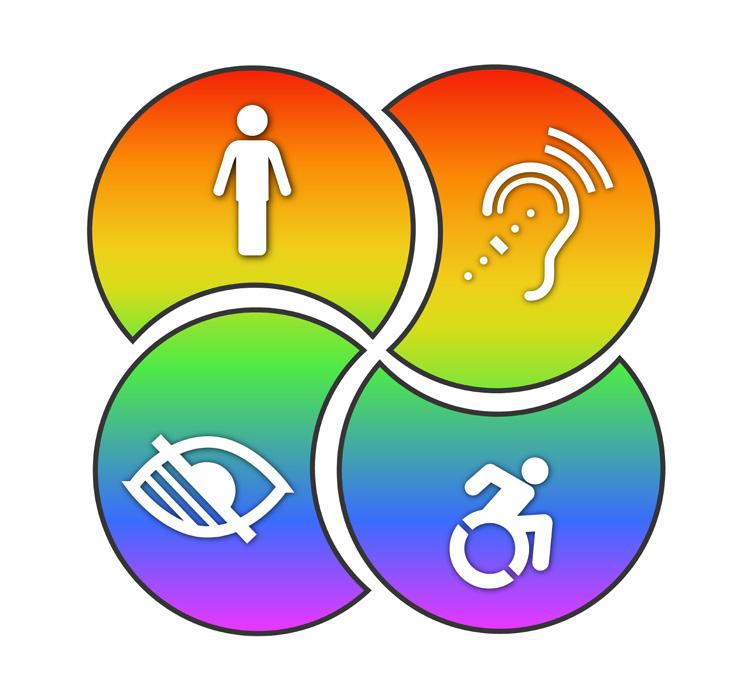


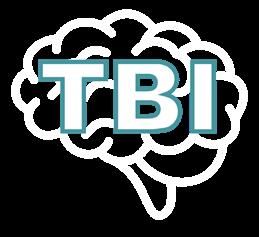

pair
Individual Rights
parp
Beneficiaries of Social Security with Representative Payees
patbi
Individuals with Traumatic Brain Injuries
pava
Voting Access


The Committee on Advancing Racial Equity (C.A.R.E.) is a direct response to the numerous injustices and systemic failures brought to light by May 25, 2020 murder of George Floyd. DRNY has made clear its stance in community as an antiracist organization.
DRNY is committed to reflecting internally on matters such as bias, privilege, racism, and intersectional social change. We are committed to fighting for racial justice as the P&A/CAP for the State of New York. Here you will find updates on the important work we are doing to address racism and racist systems.
Taking action is inherent in what we do. Our work incorporates the intersectional identities of all the people we serve. This includes BIPOC individuals, those with immigrant status, the LGBTQIA+ community, and those living in poverty.
In May of 2023, we witnessed the killing of Jordan Neely on a New York City subway. Jordan was a black man with a mental health diagnosis who was just trying to survive. Jordan’s life was so easily taken away in front of so many people. No one helped Jordan.
As the written accounts of this public, modern-day lynching have been reported on, we are faced with the 4-minute-long video documenting Jordan Neely’s murder. Staring at our phones, and our laptops, scrolling through social media – we witness a murder. Jordan Neely’s life is extinguished on a reel, shuffled into the endless videos of food, dance, and comedy. One more video, one more Black man murdered.
DRNY C.A.R.E. excerpt | May 4, 2023
We have a responsibility to address the oppressive systems that continue to impact our communities, as evidenced in Jordan’s killing.
BOARD OF DIRECTORS
The Board of Directors’ primary responsibility is the governance of our nonprofit organization. In collaboration with our advisory councils, they approve the priorities, policies and budget for DRNY. DRNY actively recruits and elects members who are, or have been, a person with a disability or family members of a person with a disability.
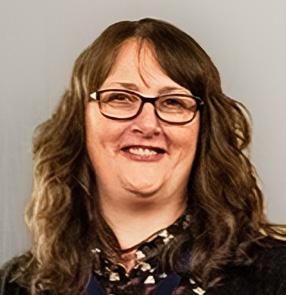


George
Secretary PAIMI Advisory Council Chairperson

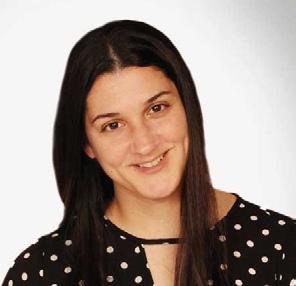
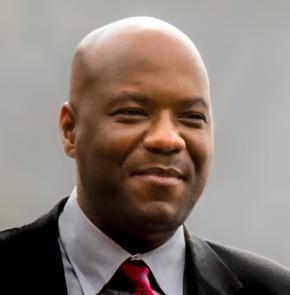

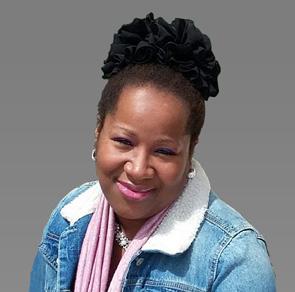
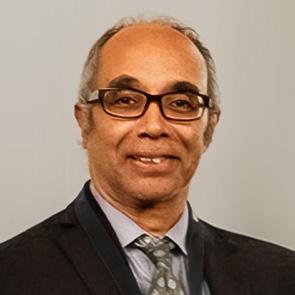
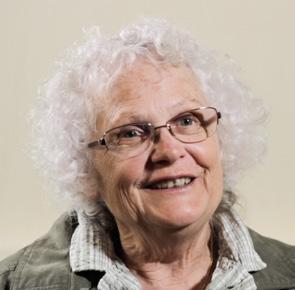
Council Chairperson
Christine Konsistorum, CPA President Audie Serrano Director Cathleen Kenny, CPA Treasurer Andrew Gordon, Esq. Director Lisa Barone Director Anthony Curtis Director Amy D’Amico, Esq. Director Antoinette Jarrett Parker Director Badillo Ann Scherff Director PADD AdvisoryEXECUTIVE STAFF

Timothy A. Clune, Esq. Executive Director

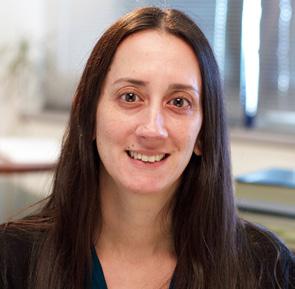
Danielle Myers, CPA Chief Financial Officer & Director of Operations
Elisabeth Taylor Human Resources Director
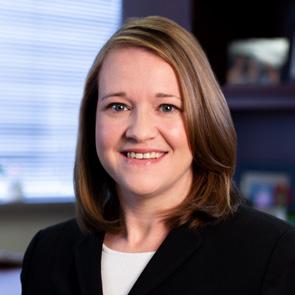
Jennifer J. Monthie, Esq. Legal Director
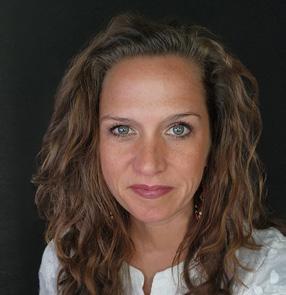
Katrin Haldeman Director Marketing & Communications
PROGRAM DIRECTORS

Christina Asbee, Esq. Director PAAT, PAIR & PAVA Programs

Julie Michaels Keegan, Esq. Director PADD Program

Joseph Clark, Esq. Director PARP Program
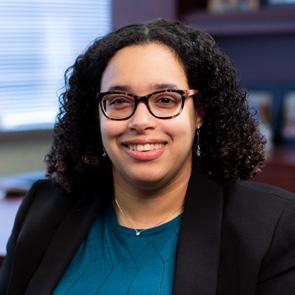
Erica M. Molina, Esq. Director CAP & PABSS Programs

Marc Fliedner, Esq. Director PAIMI & PATBI Programs

David Young, Esq. Director Intake
INTAKE
Our Intake Department is our center of advocacy. They assess a high volume of clients for DRNY services daily and simultaneously close and resolve just as many service requests. There are a variety of ways that our intake advocates serve our clients in the community and those clients are the measure of how meaningful our help can be.
In FY23, we responded to 2,338 Service Requests. We provided full case services to 507 of those requests and provided Information and Referral (I&R) services to the remaining 1,831 requests.
When we are contacted about issues that fall outside of our priorities or are unrelated to the person’s disability, we strive to provide appropriate referral sources. We educate people about their rights and available options. Our I&R services vary and are dependent on the needs of the person.
195 SERVICE REQUESTS per month AVERAGED
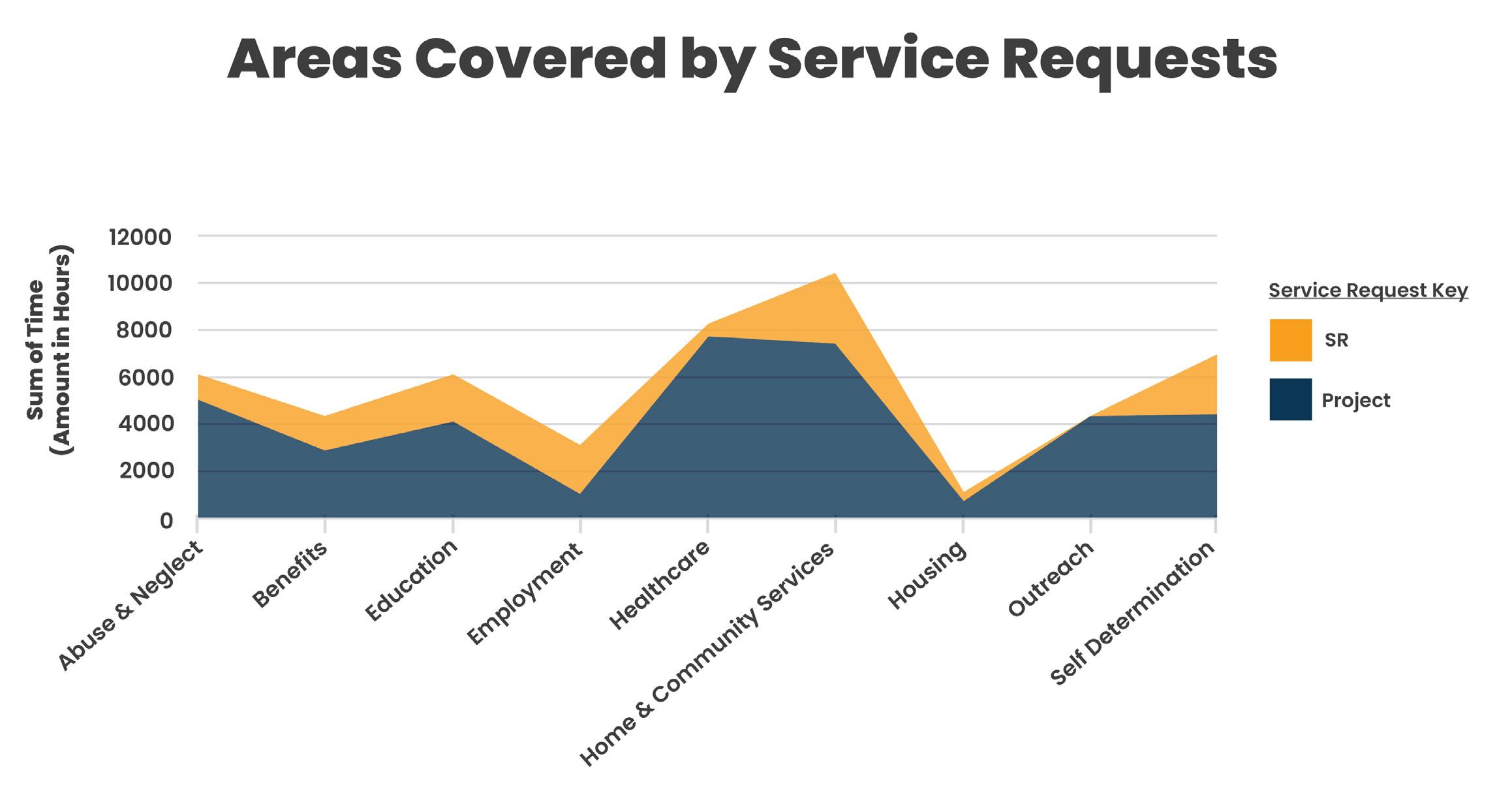
OUR CLIENTS
Over this 12 month period, DRNY averaged 195 Service Requests per month from individuals throughout New York State. According to the most recent U.S. Census Bureau estimates, there are 2,508,047 individuals with disabilities living in New York State. DRNY handled 2,338 Service Requests for 2,041 distinct individuals.
Clients by Age
DRNY has assisted some of the most vulnerable individuals in New York State. 342 unique clients were residents of nursing homes, hospitals, correctional facilities, rehabilitation facilities, and youth-focused residential facilities. Of the residents living in the community, 236, or nearly 14.77% of DRNY’s unique clients were under 18. According to census data, individuals under 18 account for only 7.43% of civilian, non-institutionalized individuals with a disability.
The following table shows that 28.32% of DRNY’s clients are age 55 or older. *Demographic information is not required to receive DRNY services.
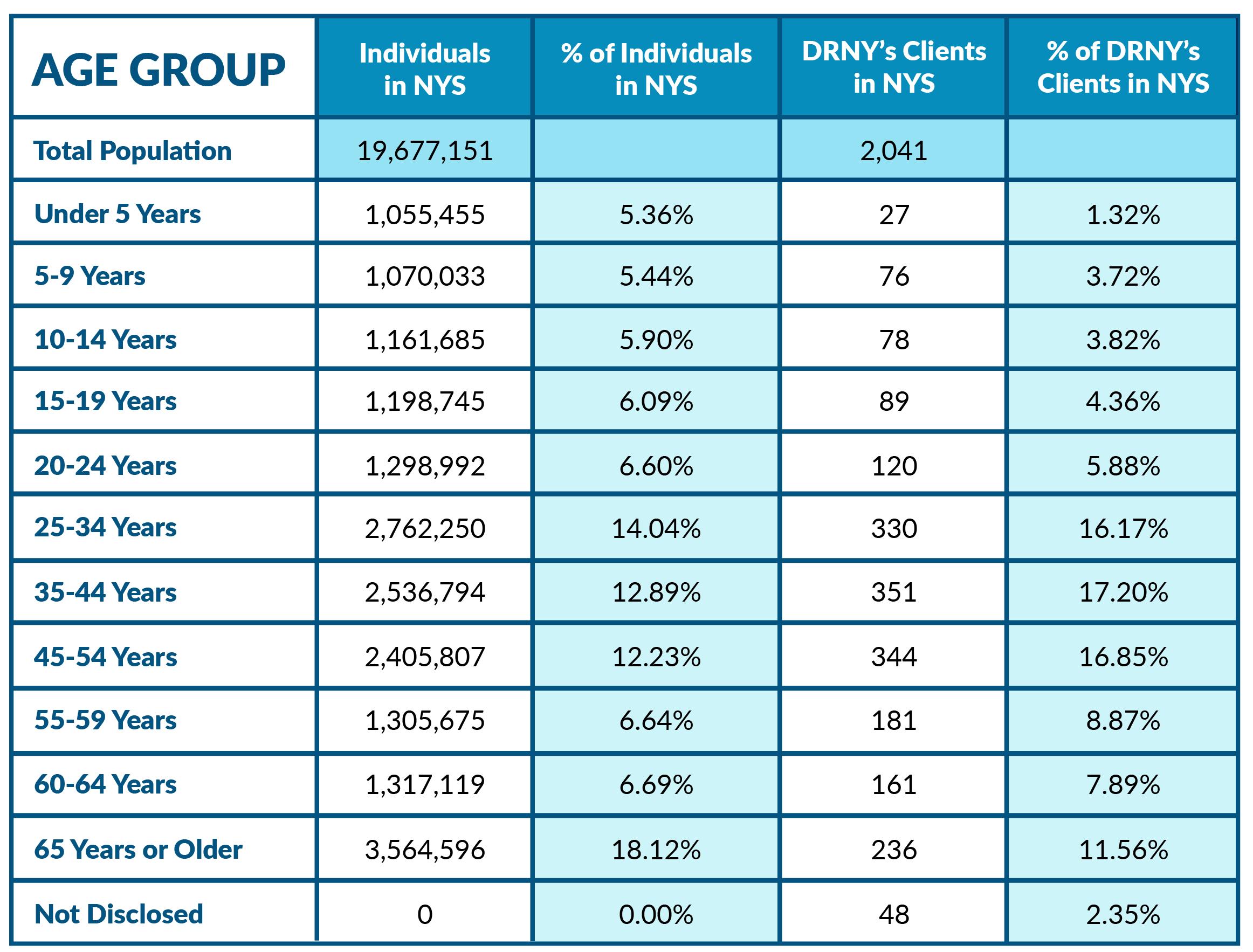
Clients from Under-Represented Groups
DRNY affirmatively seeks to provide services to historically under-represented groups. The following charts compare race and ethnicity demographics for the entire State of New York with that of DRNY’s clients.
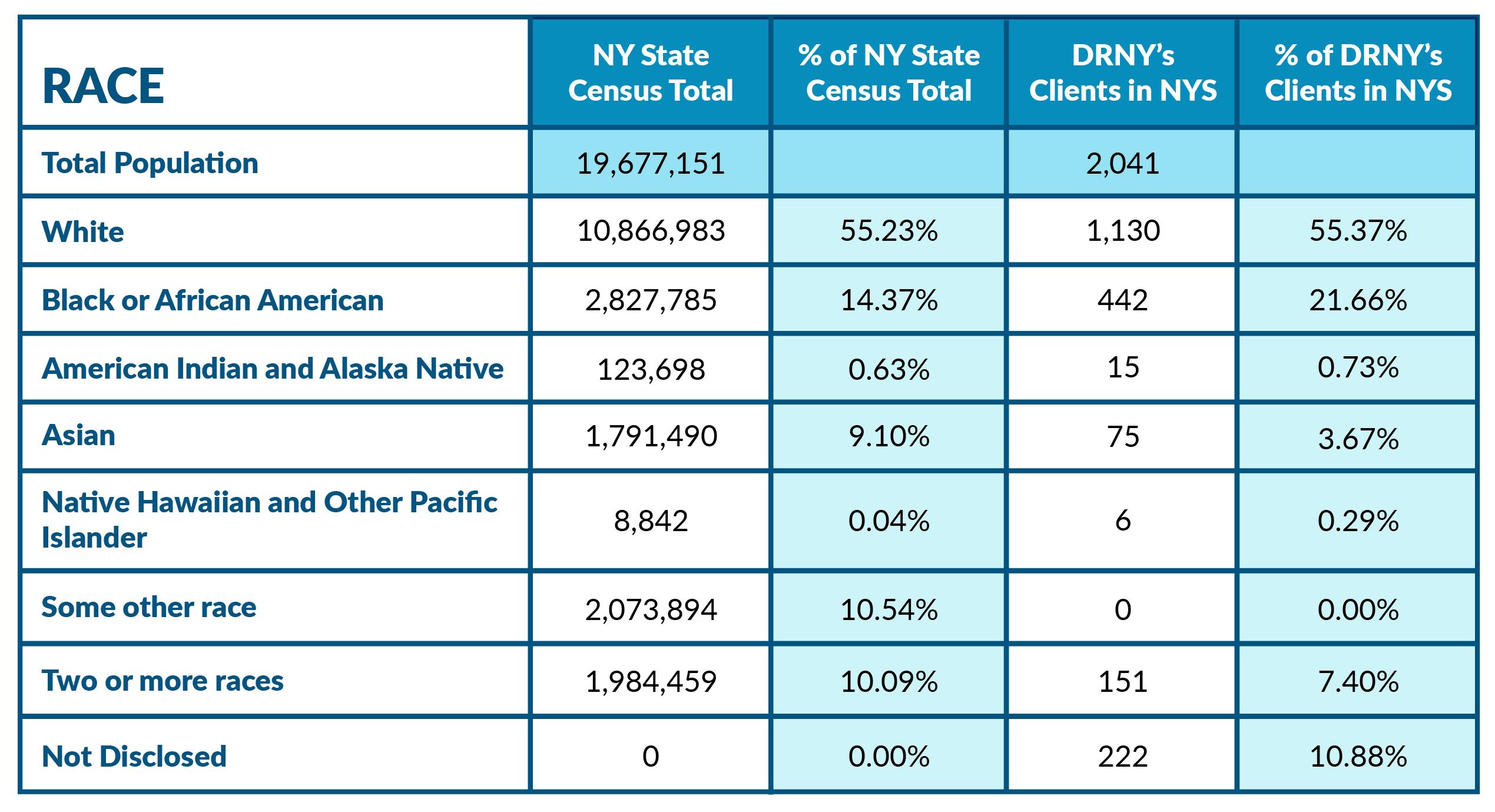

2023 HIGHLIGHT
Landmark Decision by US Court of Appeals for the Second Circuit Ensuring All Protections Under IDEA Remain with the Students Between the Ages of 18-21
In August 2023, together with Prisoners’ Legal Services of New York (PLS), we received a groundbreaking decision from the US Court of Appeals for the Second Circuit recognizing that young adults with disabilities can enforce their own special education rights.
The IDEA expressly establishes substantive and procedural safeguards for children with disabilities, including students between the ages of 18 to 21. Now students ages 18 to 21 can enforce their own IDEA rights as individuals responsible for their own welfare.
“
Prior to this court’s decision, students between the ages of 18 to 21 were not afforded the full protections of the IDEA. This decision will have a nationwide impact. Importantly, it will reverse New York State Education Department guidance which stripped those students of their IDEA rights in New York.
 Timothy A. Clune, Esq. Executive Director, DRNY
Timothy A. Clune, Esq. Executive Director, DRNY
SYSTEMIC ADVOCACY
While our individual advocacy focuses on supporting specific cases, our systemic advocacy addresses the underlying and outdated systems that need to be changed.
17a Guardianship
For many years, our organization has been working to prevent the overuse and unnecessary imposition of 17a guardianships in New York State. We promote alternatives and work to ensure the right to an independent life.
In the Spring of 2023, the Senate Committee on Aging held a hearing on guardianship and alternatives, during which the “Guardianship Bill of Rights Act” was introduced.
The bill would expand the Protection & Advocacy System to target guardianship reform and create a Bill of Rights to ensure that states provide a minimum set of due process protections to those at risk of guardianship.
During this time, we submitted public comment to the Senate Committee on Aging and received positive responses from the Committee.

Our advocacy has continued throughout the year, and on February 6, 2024, we filed a lawsuit challenging the illegal and discriminatory imposition of Article 17a Guardianships in New York State.


CAP
CAP is an advocacy resource for people with disabilities who are seeking, receiving, or have been denied services from state vocational rehabilitation agencies. In NYS those agencies are the Commission for the Blind and ACCES-VR. We help people get the services they need in order to prepare for, obtain, and maintain employment.

Foot Steering System Modification Approved
Our vehicles are essential for living an independent and free life. However, if they break down, we become dependent on getting them fixed. Without timely repairs, we lose our ability to live and function independently.
A woman struggled to get approval for modifying her van’s foot steering system even though ten years ago, she received the modification approval from Adult Career and Continuing Education Services-Vocational Rehabilitation (ACCES-VR). Still, she was denied because of a technical issue with the bidding process.
During our discussion with ACCES-VR, we discovered that their consultant had found a different and improved foot steering system, and we advocated for a re-bid for the modification.
PAAT
Our PAAT program helps people understand their rights to use medical devices or technology that can aid them in managing their disability. Collectively this is called Assistive Technology (AT). We help people navigate legal issues such as insurance denials of coverage for AT or related services, access to medical care that requires use of AT, housing accommodations, workplace accommodations, and accommodations in school.
PARA TRANSIT Success
Everyone should have access to reliable transportation services, regardless of the distance; however, a woman from Nassau County was unable to get paratransit services from one county to another.
We filed a complaint with the Federal Transit Administration (FTA) on her behalf. The FTA ruled that Nassau County must provide her with the services she needed, even if it meant crossing county borders. Thanks to our legal efforts, after fifteen months, the woman was finally able to get the door-to-door paratransit services she required.
Nassau County was also ordered to:
Immediately begin providing complementary paratransit service between her residence located in New Hyde Park and any other point located within three-fourths of a mile of Nassau’s fixed route bus service. She confirmed that Nassau immediately reinstated her doorto-door bus services.
Within 30 days, develop and submit a plan for ensuring that all origins and destinations located within three-fourths of a mile of Nassau’s fixed route bus service are served by Able-Ride for all eligible paratransit riders, including those in Queens and Suffolk counties.
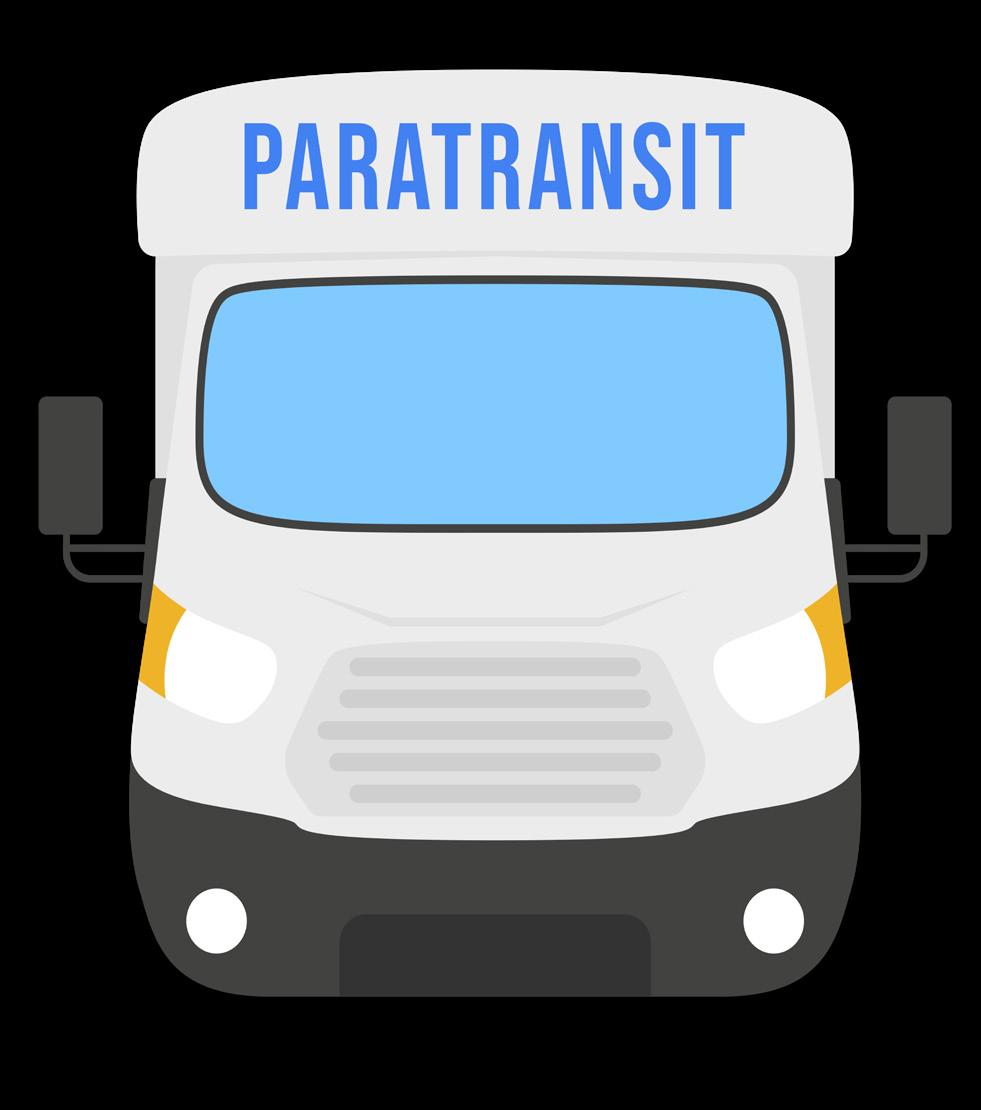
Within 60 days, notify all paratransit riders who are currently eligible to use Able-Ride that all origins and destinations within three-fourths of a mile of Nassau’s fixed route bus service will be served by Able-Ride, regardless of whether such locations are within Nassau County, and provide documentation that this action has been accomplished.
PABSS
Our PABSS program helps people remove barriers to being successfully employed. Some of those barriers include denial of reasonable accommodations, lack of accessible transportation to get to work, or being discriminated against while at work. Potential clients must be under age 65, and must currently be receiving SSI and/or SSDI.
Vehicle Modifications for Married Couple
In 2020, we assisted a couple who are both wheelchair users and required modification of their vans. The husband needed a modification to the hybrid steering system of the van, and the wife needed two wheelchair spots in the front of the vehicle. Having both vehicles worked on at the same time had a significant impact on their daily routine.
The Office for People with Developmental Disabilities (OPWDD) agreed to fund the wife’s modifications, but Adult Career and Continuing Education ServicesVocational Rehabilitation (ACCES-VR) denied the husband’s request based on their policy. After a year of negotiations, we were successful in obtaining ACCESVR sponsorship for the requested modification. OPWDD also delayed services for the wife due to the husband’s denial of services from ACCES-VR.
Finally, in 2022, with our advocacy, both ACCES-VR and OPWDD approved the modifications, resulting in over $52,000 in services for the couple. Now, the couple can live more independently with their modified van.
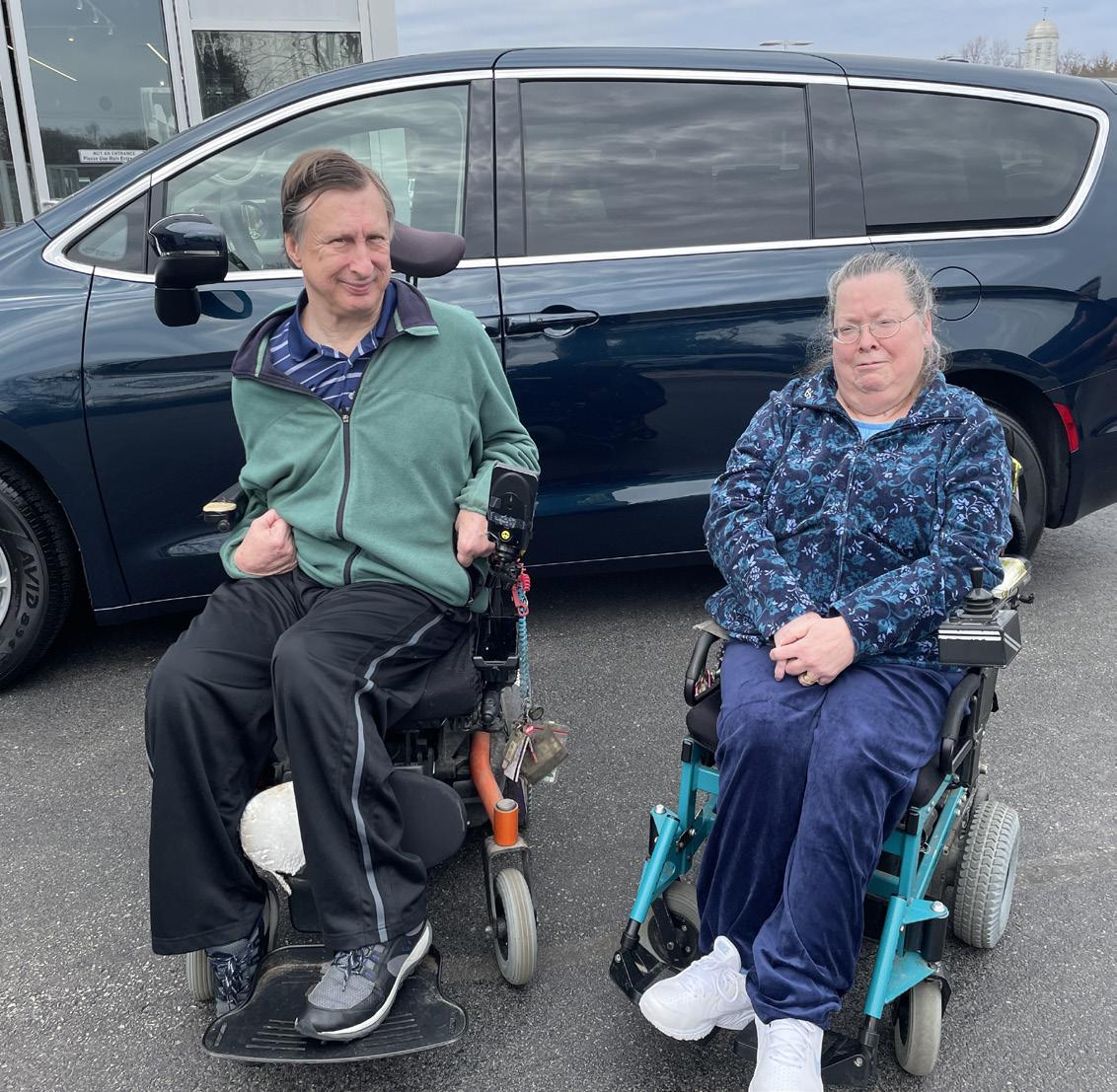
PADD
Our PADD program provides both systemic and individual advocacy to people with ID/DD. We investigate complaints of abuse, neglect, and rights violations. We monitor locations where people with disabilities receive services. We work to enforce and expand the rights of all people with ID/DD through lawsuits, public reports, education, outreach, and self-advocacy support.
Landmark Decision by US Court of Appeals for the Second Circuit Ensuring All Protections Under IDEA Remain with the Students Between the Ages of 18-21
Together with Prisoner Legal Services, we represented J.S., a 20-year-old student. We successfully challenged the Department of Corrections and Community Supervision’s (DOCCS) failure to provide any special education services despite federal and state mandates to do so. Under the Individuals with Disabilities Education Act (IDEA), students with a disability are ensured the right to free, appropriate public education that is tailored to their individual needs.
After winning his right to education, we sought attorney fees from DOCCS in accordance with the IDEA. DOCCS objected and asserted that only parents, not students, are entitled to seek fees under the IDEA even when the student is an adult. The District Court agreed and dismissed J.S.’s federal claims.
On appeal, the Second Circuit reversed the District Court, finding students with disabilities aged 18 to 21, can enforce their own IDEA rights. The Court made a key finding that impacts the educational rights of students.
Therefore, as an adult student responsible for his own welfare, J.S. is entitled to all the protections of the IDEA, including the right to challenge IDEA violations and to seek fees as a prevailing party.
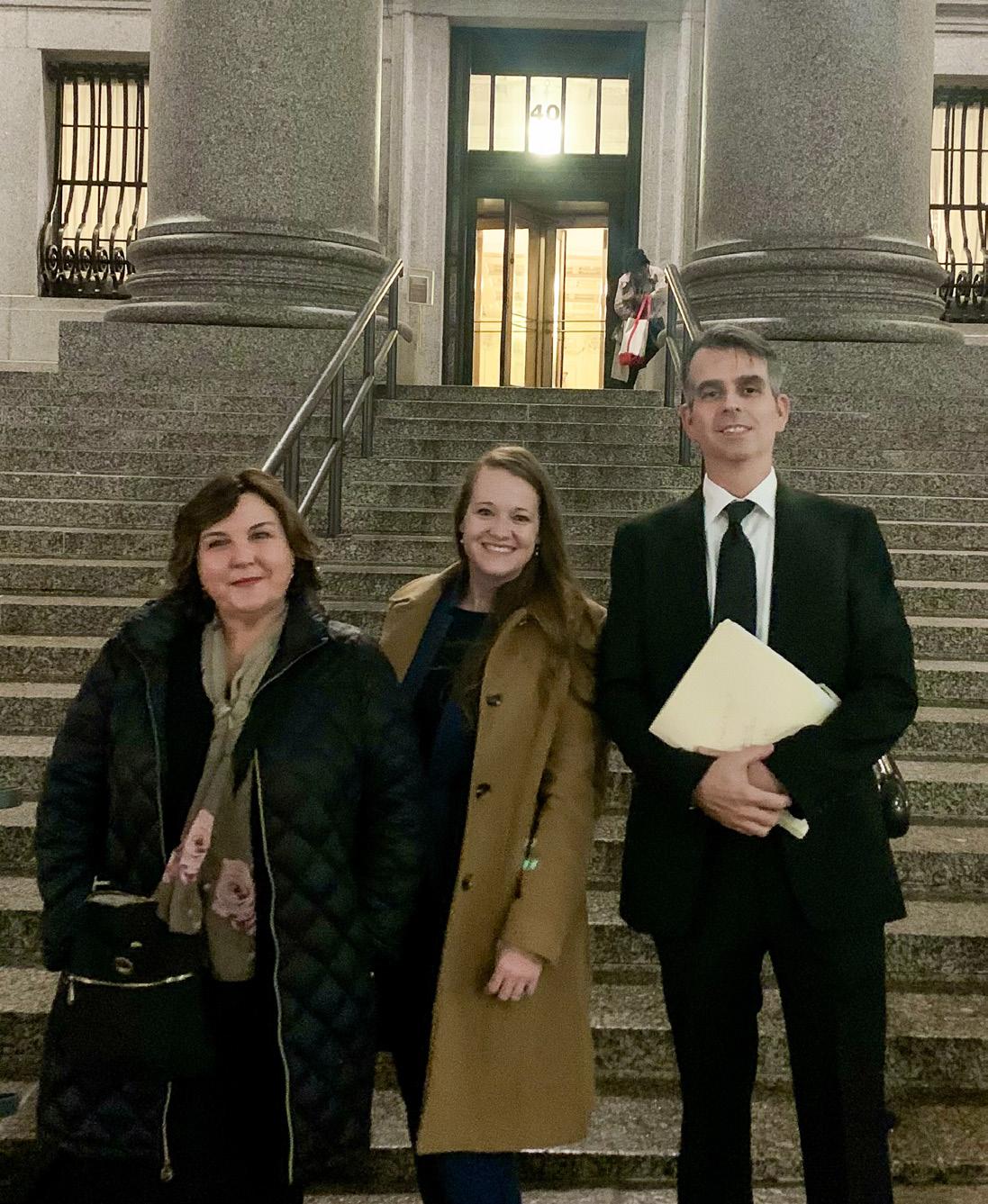
PAIMI
Our PAIMI program provides both systemic and individual advocacy to people with a mental health diagnosis. We advocate on behalf of individuals living in the community, as well as in congregate care settings, including psychiatric facilities, adult homes, jails, and prisons. We work to enforce and expand the rights of all people with mental illness through lawsuits, public reports, education, outreach, and self-advocacy support.
Promoting Disability Justice through a Conference on Emergency Preparedness
During 2023, we worked collaboratively with Mobilization for Justice to plan an external conference on disability justice and emergency preparedness in New York City.
Our joint efforts led to the development of a conference titled Never About Us Without Us: Emergency Preparedness. This conference, which took place in mid-May 2023, was the first of its kind. It was designed to promote the dialogue needed for continuous and proactive emergency preparedness efforts in disability-centered facilities and homes.
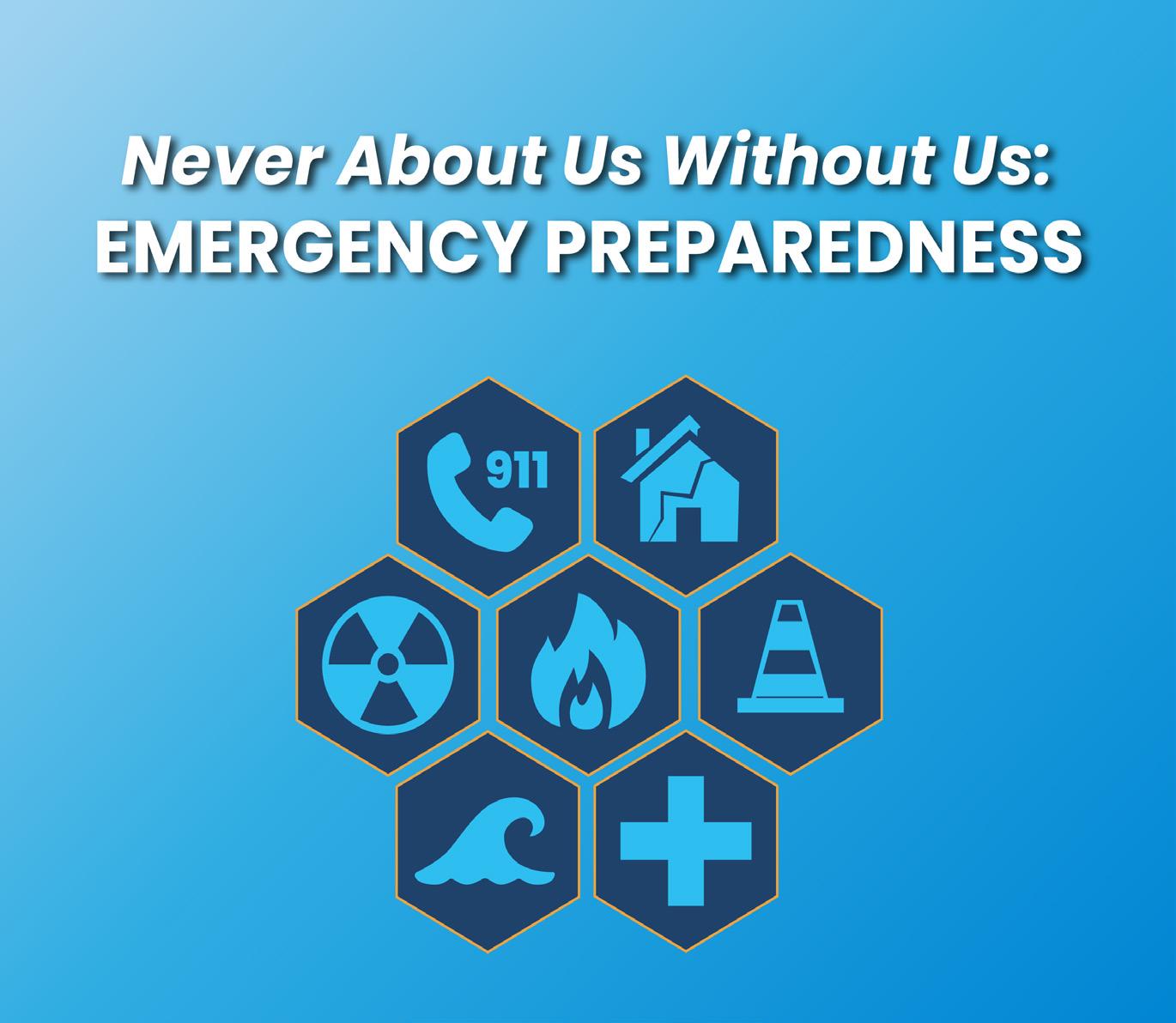
We identified the target audience members to include people with lived experiences, disability rights advocates, attorneys, policymakers, facility administrators and staff, as well as other members of the public. We realized that it was crucial to educate and engage with the public and share concrete and creative solutions moving forward.
This conference provided a platform for individuals and organizations to share their experiences and discuss innovative ideas to enhance emergency preparedness in disability-centered facilities and homes.
PAIR
Our PAIR program serves people with disabilities who are not eligible for assistance from our other programs. We work to ensure that they are free from discrimination in housing, employment, education, and access to public accommodations and that they are included in emergency preparedness initiatives.
Text to 911
We finally secured a settlement agreement for a complaint that was filed against Nassau County in January 2017. The county violated Title II of the Americans with Disabilities Act of 1990 by failing to provide ways for people with hearing loss to effectively communicate with 911 emergency services through text messages.
The settlement outlines Nassau County’s agreement to:
Implement a fully operational “Text-to-911” service no later than September 15, 2023. This service will allow all people the ability to send a text message to reach Nassau County’s 911 emergency call takers from their mobile phone or device.
Within 45 days of text-to-911 services becoming live in Nassau County, they will publish public service announcements, both in print and digitally on social media platforms.
Nassau County will also notify all schools in the County of the new way people can use the 911 service.
These service announcements will advertise the availability of the new emergency response feature of text-to-911 services.
All public service announcements, flyers, or posters shall be made available in both English and Spanish.

While we are very happy to report that Text-to-911 was implemented in Nassau County on September 14, 2023, Nassau County has not yet met the requirements for public service announcements or notifying the school districts.
We have notified them of these failures as required by the settlement agreement and will file another Motion to Compel Compliance if necessary.
PARP
Our PARP program protects Social Security beneficiaries that require the assistance of a representative payee from financial exploitation, abuse, and neglect. A representative payee is a person or an organization who assists someone who can’t manage or direct the management of their benefits. We review the performance of representative payees through beneficiary and payee interviews, onsite inspections, and a detailed review of financial and other documentation. These reviews ensure the wellbeing of beneficiaries while educating payees on how to better serve them.
PARP in Action
Our program protects Social Security beneficiaries that require the assistance of a representative payee from financial exploitation, abuse, and neglect. We review the performance of representative payees through beneficiary and payee interviews, onsite inspections, and a detailed review of financial and other documentation.
These reviews ensure the wellbeing of beneficiaries while educating payees on how to better serve them. Our Representative Payee team travels around the State conducting reviews on behalf of the Social Security Administration (SSA).

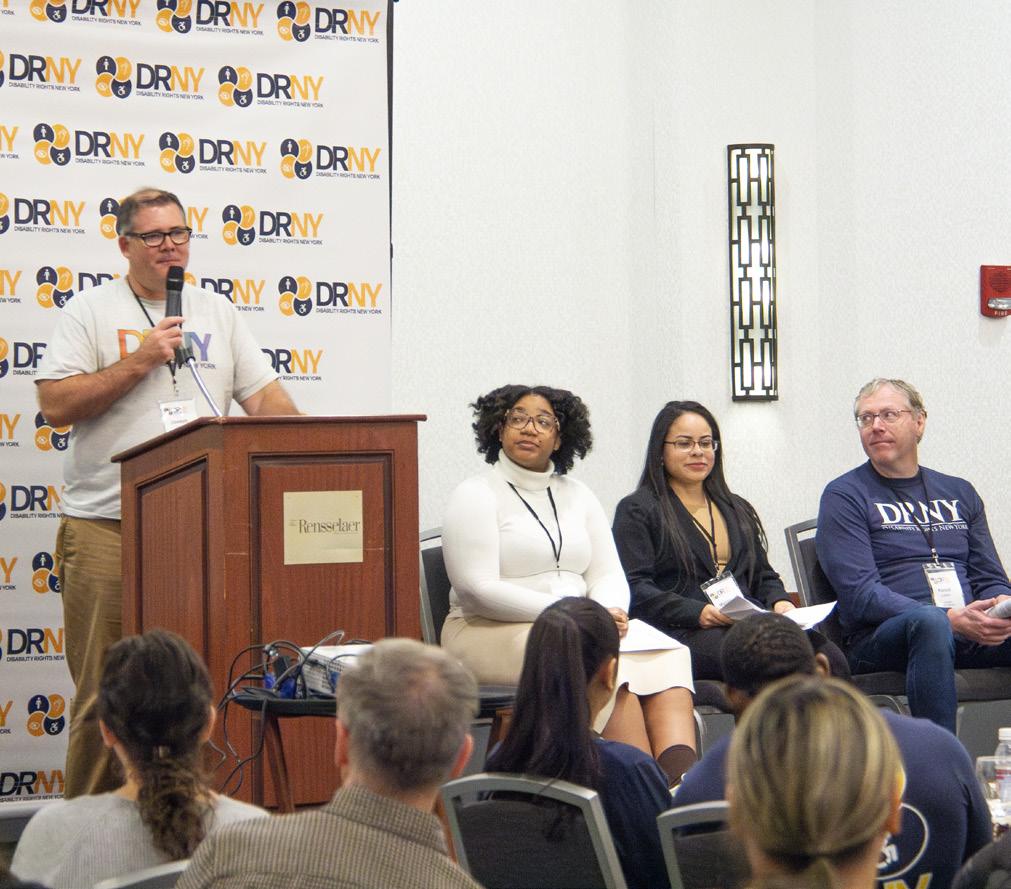
In 2023, the PARP team:
Submitted 155 completed reports for review by National Disability Rights Network (NDRN) and SSA.
Initiated 7 Quick Response Check (QRC) reviews to investigate situations involving suspected misuse.
Received requests for information on how to either become your own payee, or how to change your representative payee and distributed information packets to answer these questions.
Used information obtained during reviews to make appropriate referrals to other DRNY programs and community resources.
PATBI
Our PATBI program helps people with TBI navigate legal issues that may affect all aspects of their lives, including access to medical care, housing accommodations, workplace accommodations, and accommodations in school. We ensure that people with TBI and their families have access to information, referrals and advice, individual and family advocacy, legal representation, and specific assistance in self-advocacy.
Abuse and Neglect at Nursing Facility
Numerous acts of neglect and verbal abuse being committed by the staff of a nursing facility in western New York were reported by a woman who suffered a traumatic brain injury in March 2022.
She reported that they did not respond to her calls for assistance, delivered meals that did not meet her dietary restrictions, and gave her the wrong medications at inappropriate times.
Moreover, they failed to plan for her safe discharge. The staff did not understand her communication needs due to her TBI, and they were unwilling to accommodate her. Additionally, she reported that the staff did not respond to calls for assistance from residents who had fallen.
We met with her treatment team to address each of her concerns and developed plans for a monitoring trip to investigate the reports of other residents being neglected.
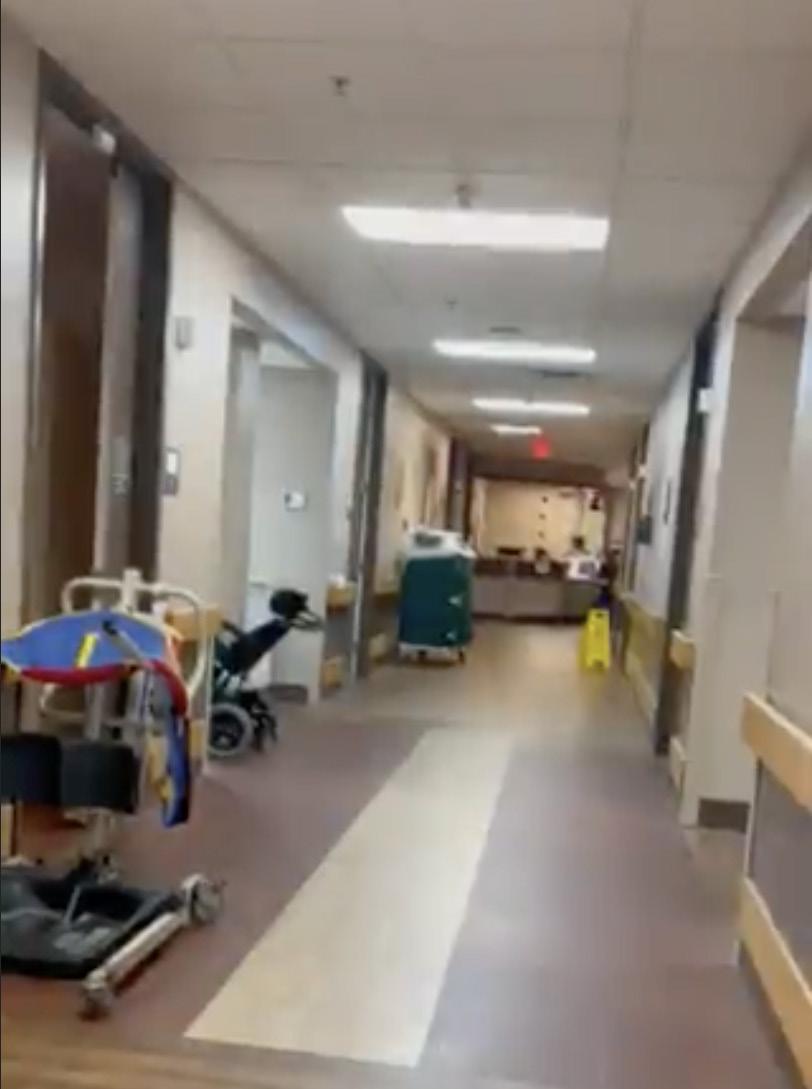
In August 2023, we submitted a Findings Letter identifying the numerous problems that were placing all residents at risk of harm or even death. We made recommendations for immediate action to ensure the safety of the residents and advised the facility that we would schedule follow-up monitoring visits as appropriate. Additionally, we made reports to the Department of Health and Medicaid.
PAVA
Our PAVA program helps ensure that people with disabilities are included in the election process. Civic engagement and inclusion of all people, including people with disabilities, is paramount to our democracy. We ensure that every qualified person with a disability has access to vote on Election Day.
Statewide Poll Site Accessibility Surveying
During
Early Voting
Together with The Brennan Center for Justice NYU Law, we published a report that examines early voting polling places’ accommodations for voters with disabilities in New York State, How to Improve Early Voting Accessibility in New York State. Researchers assessed 179 of the 402 early voting polling places in New York State used in the 2022 election cycle. They found rampant violations of state and federal standards designed to ensure that voters with disabilities have equal access to the ballot.
Other highlights from the report include:
169 (94%) of the 179 early voting polling places surveyed in New York State weren’t fully accessible to voters with disabilities.
In 42% of the early voting polling places surveyed in New York State, ballot marking devices — voting machines that allow individuals with low vision, limited dexterity, physical impairments, or other disabilities to mark their ballots privately and independently — weren’t set up to ensure privacy.
58% of the early voting polling places surveyed didn’t have adequate signage prohibiting parking in “access aisles” that provide room for wheelchair users to get in and out of vehicles in parking spots.
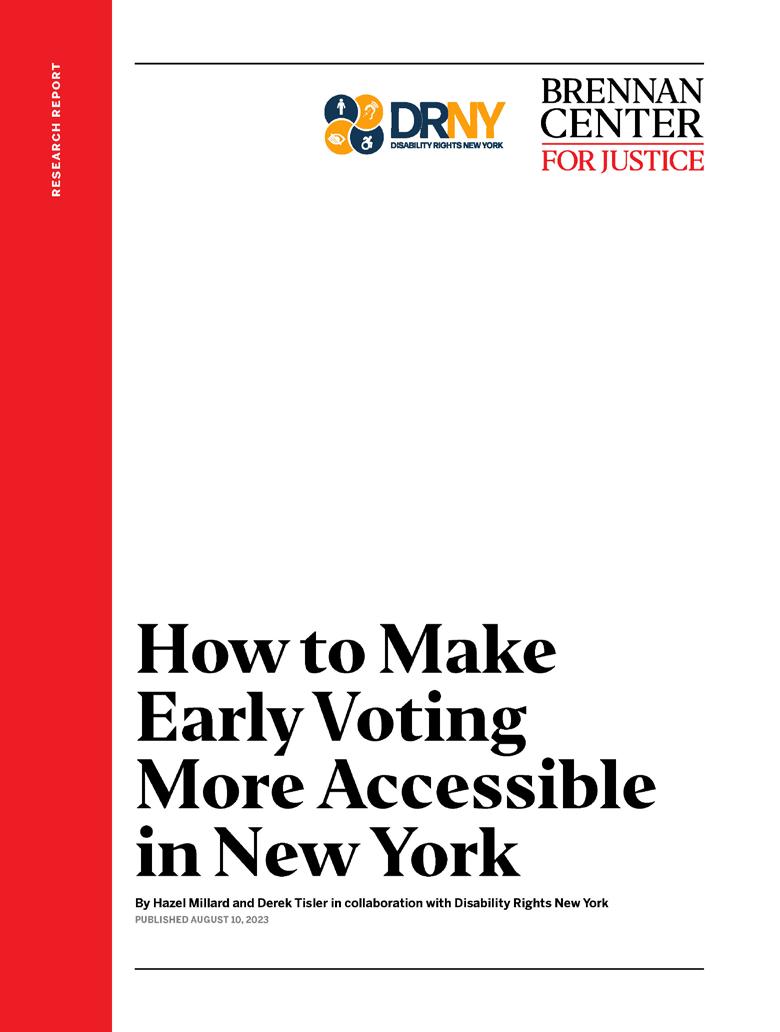
Common violations were doors without levers and handles to help people with disabilities enter and exit polling places or without sufficient clearance for voters using mobility devices. Poll workers at many of the polling places lacked adequate knowledge and training to assist voters with disabilities. We noted in the report that many of the problems could have been — and still can be — addressed with simple, low-cost solutions.
IN ACTION
Marketing & Communications
The Marketing & Communications Department informs the public about our services, what we have accomplished and what your rights are. With that in mind, we developed a strategic and goal centered plan to identify areas to focus on and approach from a person-first perspective, ensuring that it includes all members of the community.
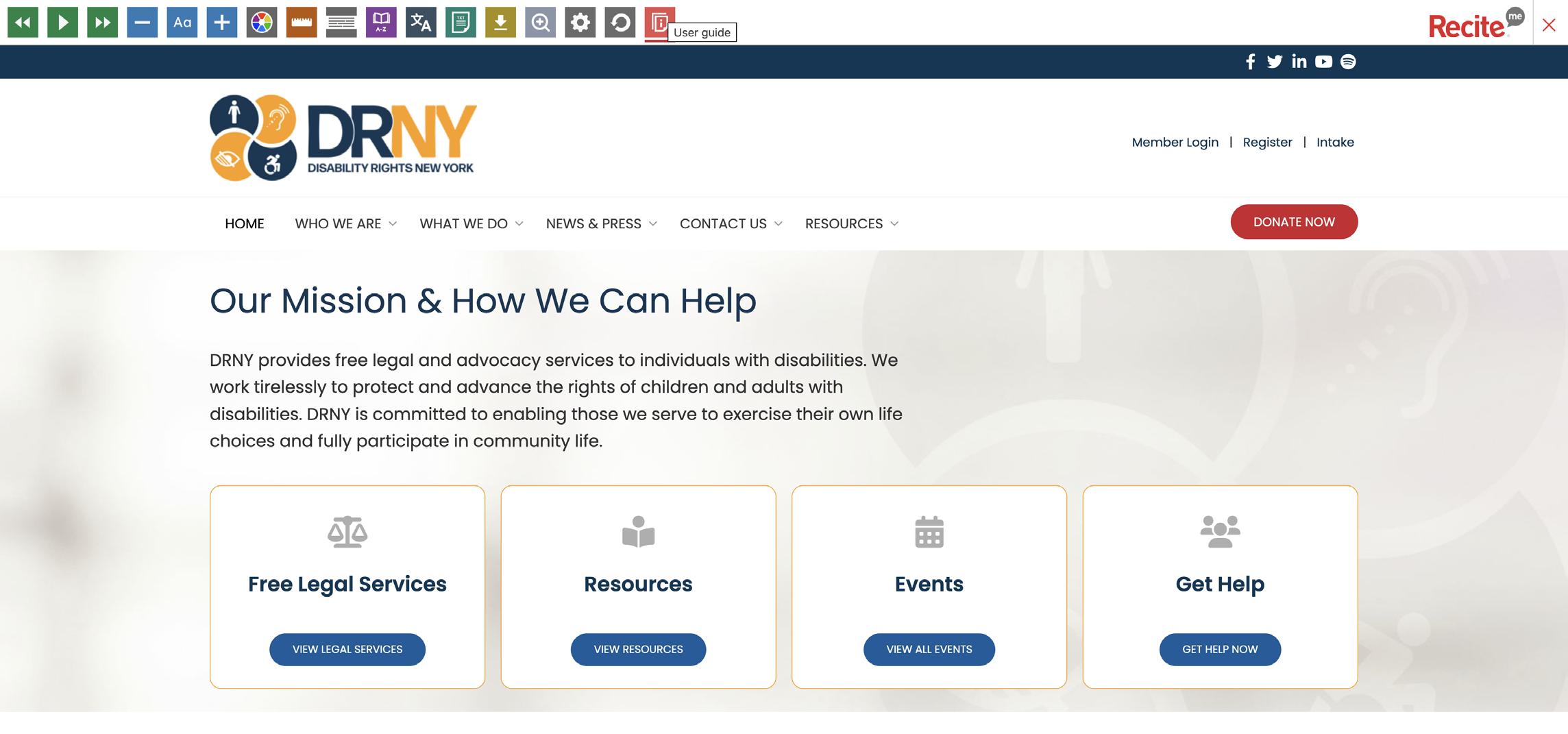
New Website Design and Accessibility Features
In 2023, our Marketing Department launched our new website design which has been reorganized and integrated with our new logo. We have also implemented a new accessibility toolbar that enables users to personalize their accessibility preferences. Additionally, our website can be instantly translated into over 150 languages.
FY23 FINANCIAL REPORT
Each year our finance department ensures that our funding and our programs are managed successfully.
EXPENSES

FEDERAL GRANTS
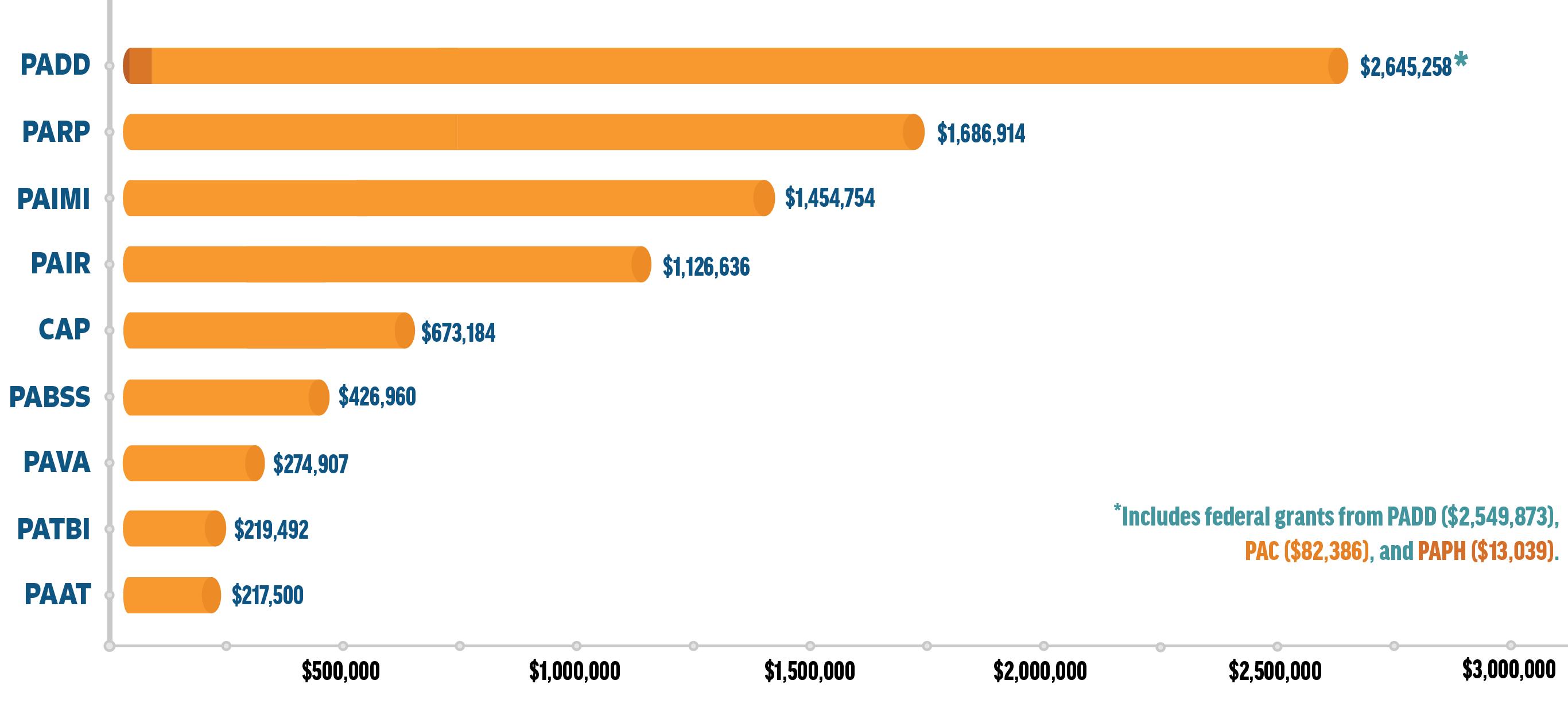
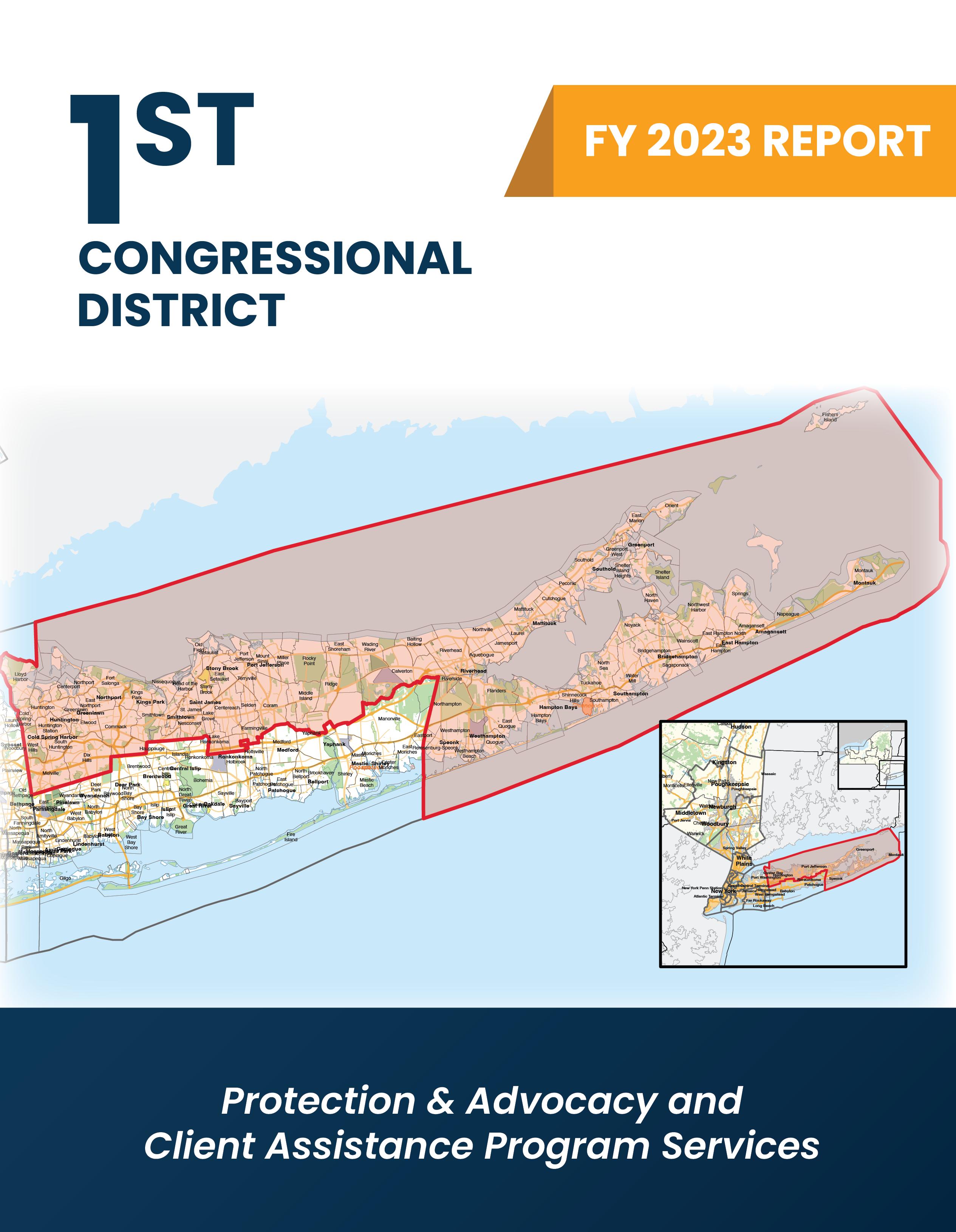
OUR CLIENTS
Over this 12 month period, DRNY averaged 6 Service Requests per month from individuals in your District. According to the most recent U.S. Census Bureau estimates, there are 83,389 individuals with disabilities living in the 1st Congressional District and DRNY has handled 71 Service Requests for 63 distinct clients living in those 38 zip codes.
Clients by Age
In your district DRNY assisted some of the most vulnerable individuals. 8 unique clients were residents of nursing homes, hospitals, correctional facilities, rehabilitation facilities, and youth-focused residential facilities. Of the residents living in the community, 14 or nearly 26.92% of DRNY’s unique clients were under 18. According to census data, individuals under 18 account for 6.72% of civilian, non-institutionalized individuals with a disability.
The following table shows that 25.40% of DRNY’s clients are age 55 or older. *Demographic information is not required to receive DRNY services.
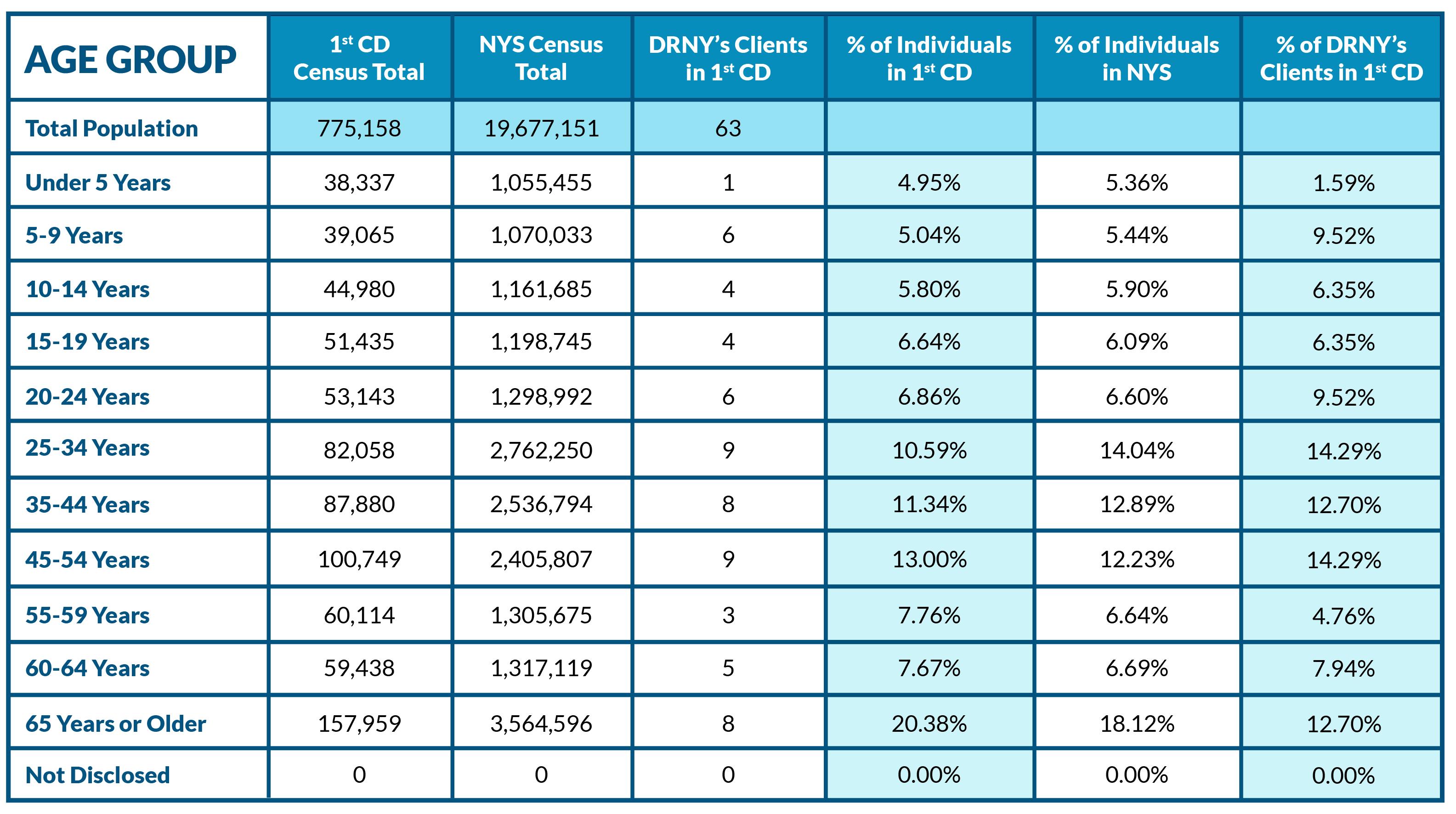
Clients from Under-Represented Groups
DRNY affirmatively seeks to provide services to historically under-represented groups. The following charts compare race and ethnicity demographics for the entire State of New York with that of DRNY’s clients.
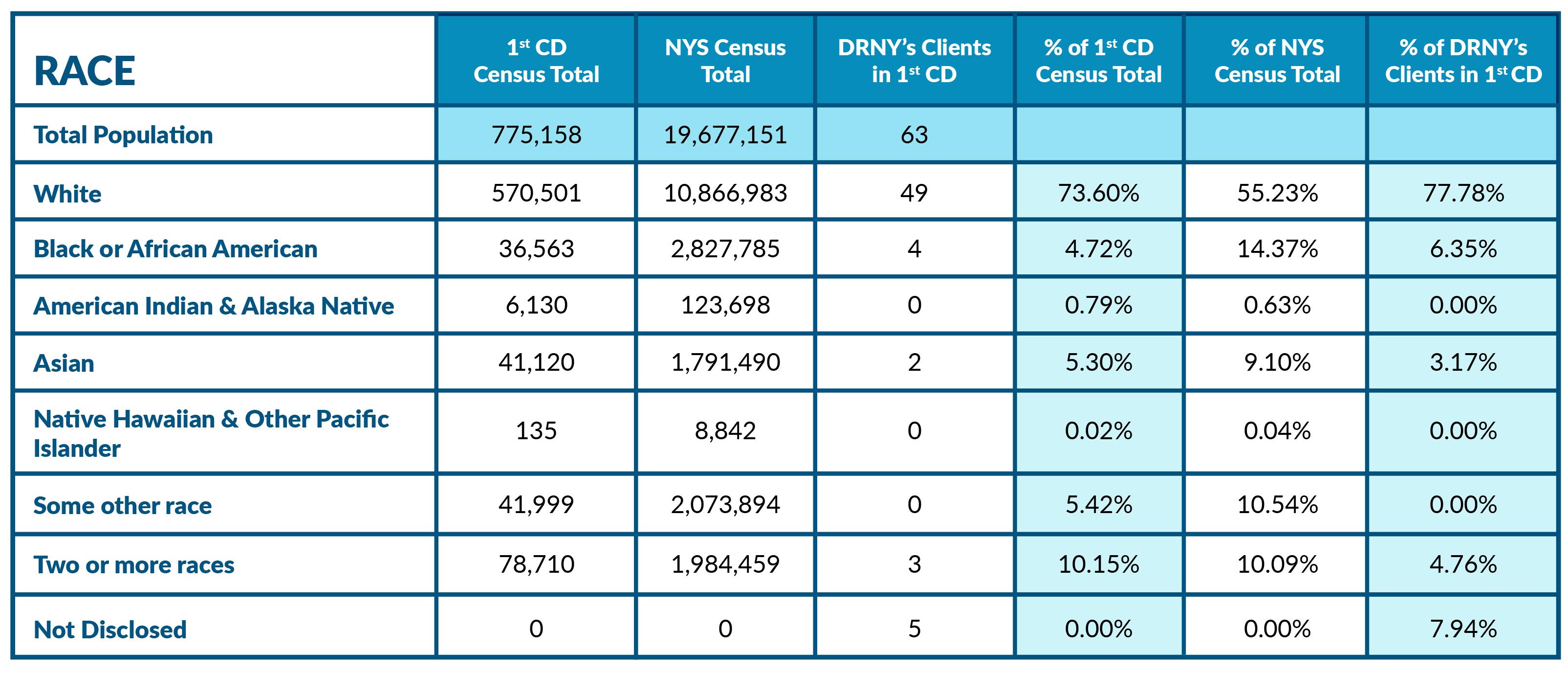

SERVICE REQUESTS
There were a total 71 service requests in this reporting period. DRNY provided full case services in 19 of the requests or 26.76%. DRNY provided Information and Referral (I&R) services to the remaining 52 requests.
DRNY makes appropriate referrals to other agencies in those matters where the issues are outside DRNY’s priorities, or because DRNY lacks the resources to undertake the matter. DRNY also provides information regarding the clients’ rights and available options. These matters vary from consumer financial issues, evictions, or other legal issues that are unrelated to the client’s disability.
Service Requests by Program
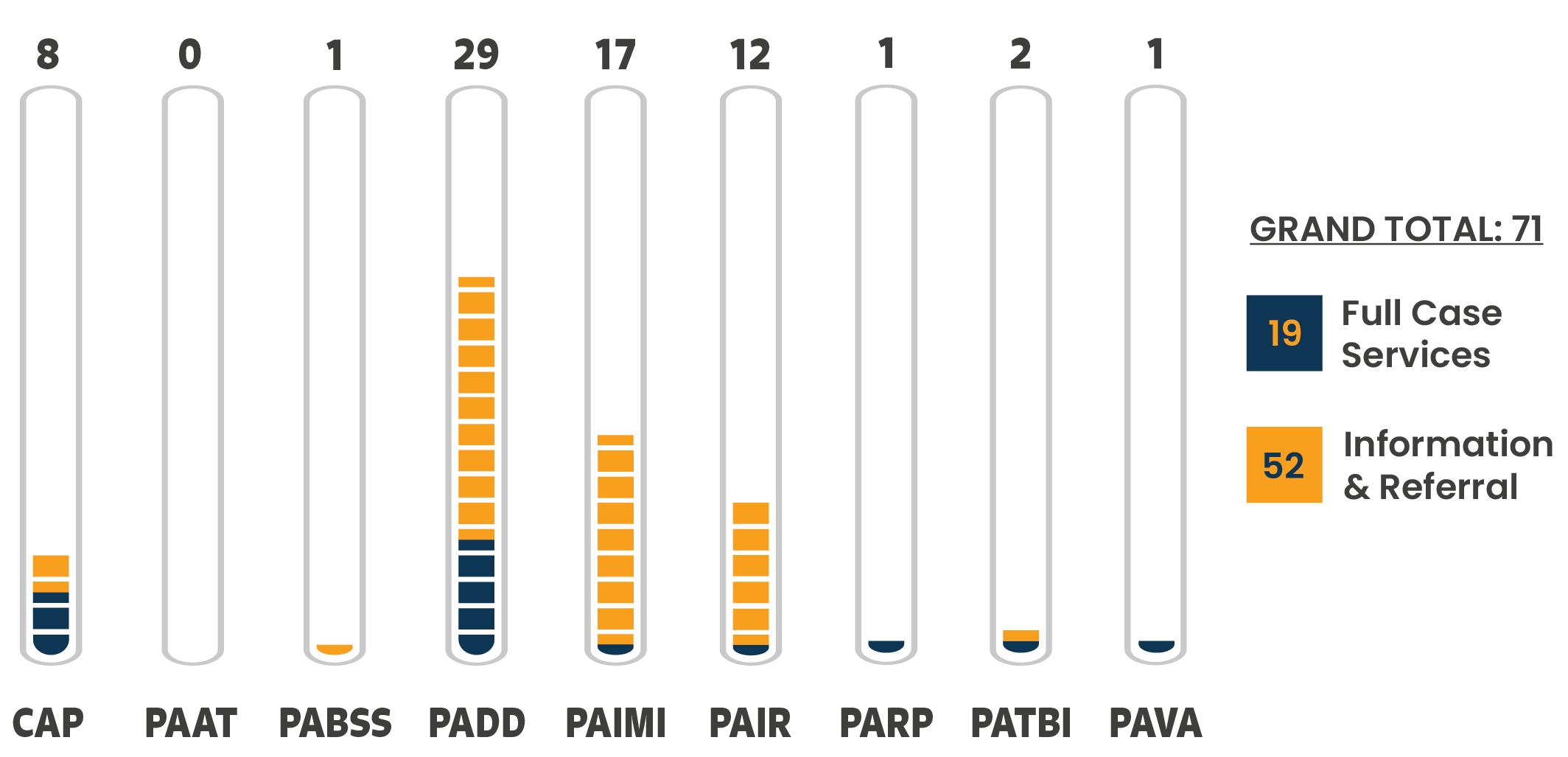
5
Response Time to Service Requests
of these Service Requests were resolved in less than 7 DAYS
11 of these Service Requests were resolved in less than 14 DAYS

REPRESENTATIVE ISSUE
Guardianship Dissolved

Imagine being limited to a life where you can’t make your own decisions. This was the reality for a woman we recently represented in Suffolk County Supreme Court. Her life changed dramatically after the dissolution of a restrictive guardianship.
Initially, she had consented to her mother becoming her guardian. However, in 2021, after completing a facilitated supported decision-making agreement, she wanted to file a petition to dissolve the guardianship.
With her mother’s signature on a stipulation agreeing to the dissolution of the guardianship, the Judge ruled in her favor. She is now free to make her own decisions.
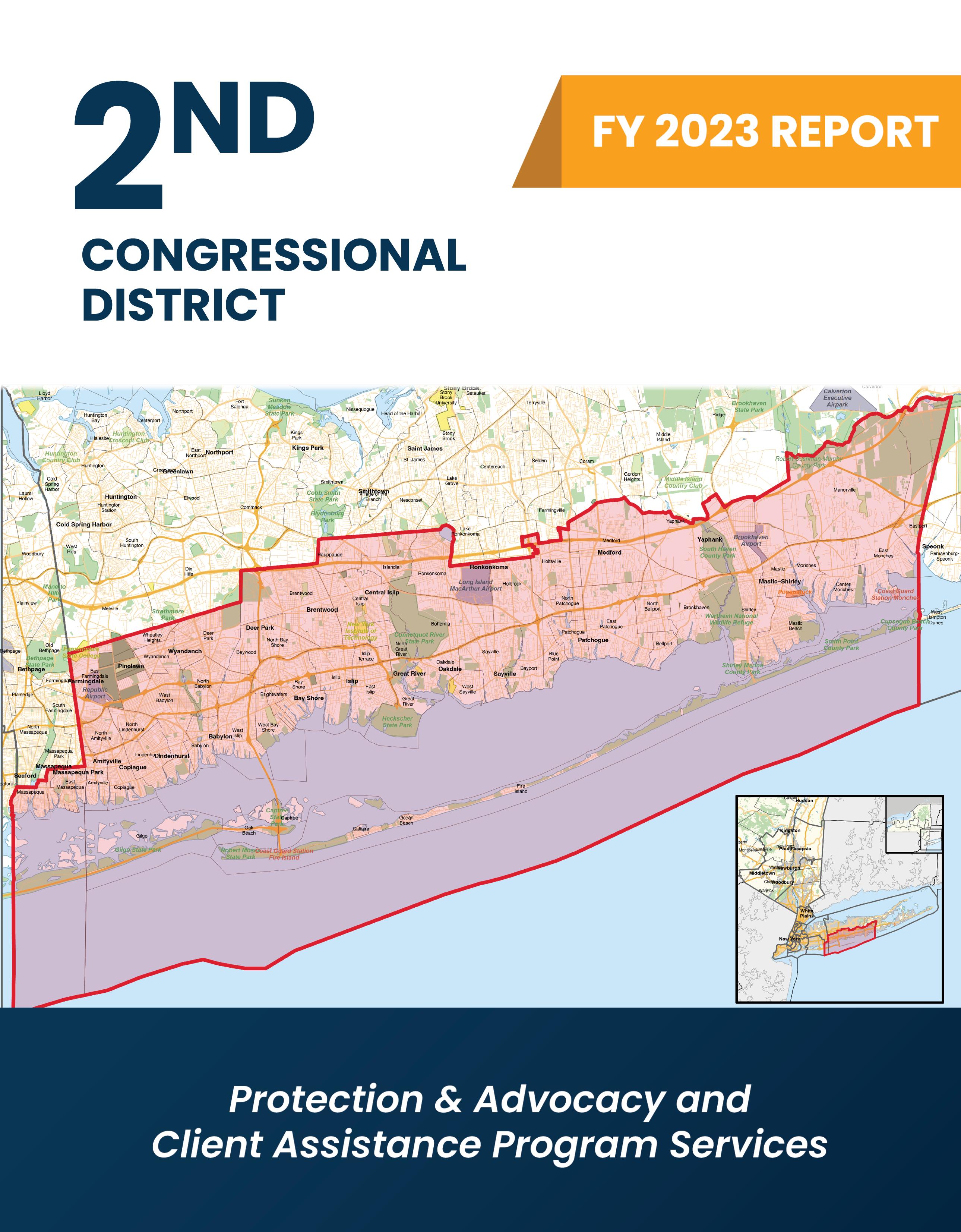
OUR CLIENTS
Over this 12 month period, DRNY averaged 5 Service Requests per month from individuals in your District. According to the most recent U.S. Census Bureau estimates, there are 89,877 individuals with disabilities living in the 2nd Congressional District and DRNY has handled 60 Service Requests for 52 distinct clients living in those 27 zip codes.
Clients by Age
In your district DRNY assisted some of the most vulnerable individuals. 7 unique clients were residents of nursing homes, hospitals, correctional facilities, rehabilitation facilities, and youth-focused residential facilities. Of the residents living in the community, 7 or nearly 16.67% of DRNY’s unique clients were under 18. According to census data, individuals under 18 account for 8.58% of civilian, non-institutionalized individuals with a disability.
The following table shows that 28.85% of DRNY’s clients are age 55 or older. *Demographic information is not required to receive DRNY services.
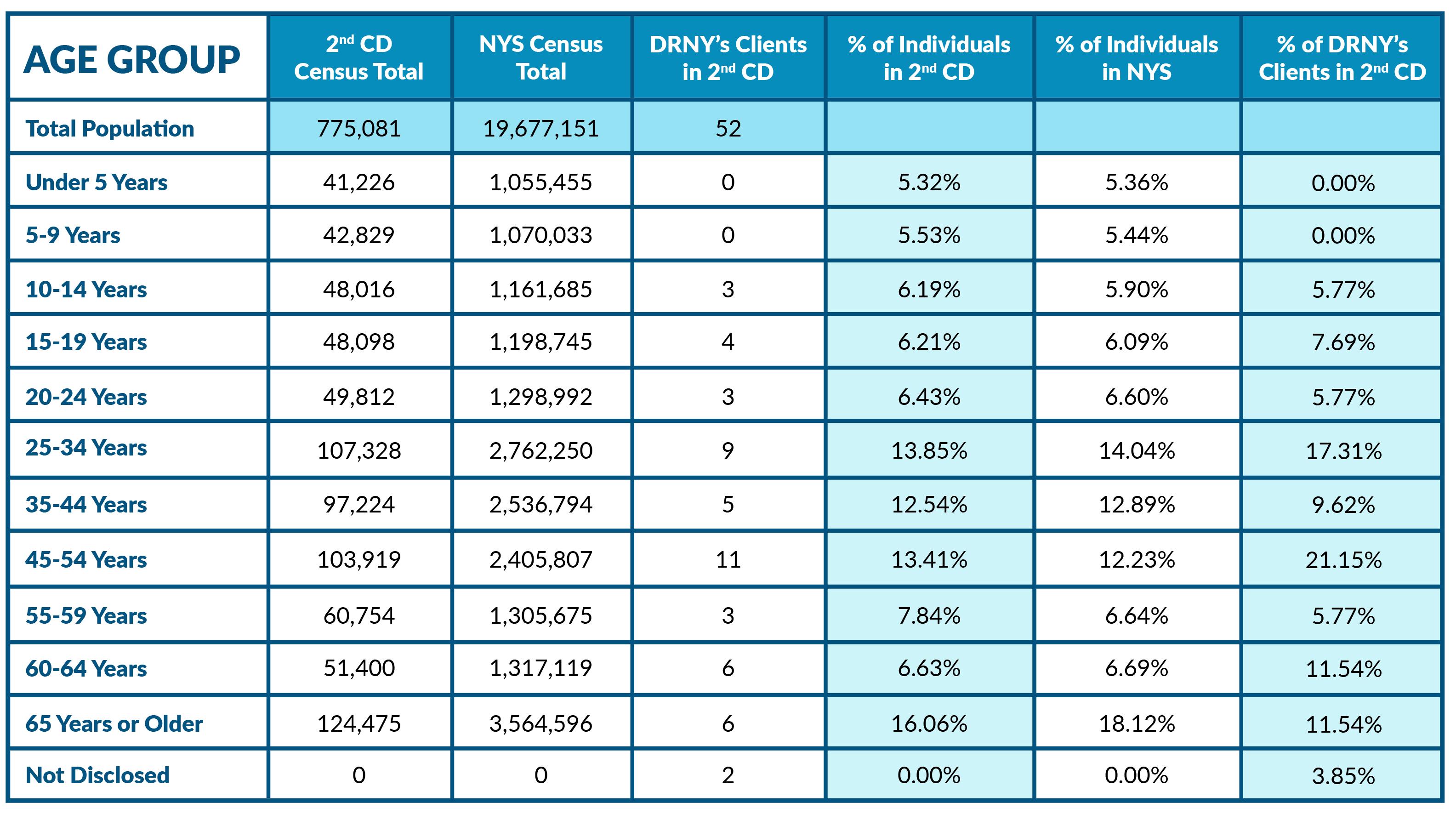
Clients from Under-Represented Groups
DRNY affirmatively seeks to provide services to historically under-represented groups. The following charts compare race and ethnicity demographics for the entire State of New York with that of DRNY’s clients.
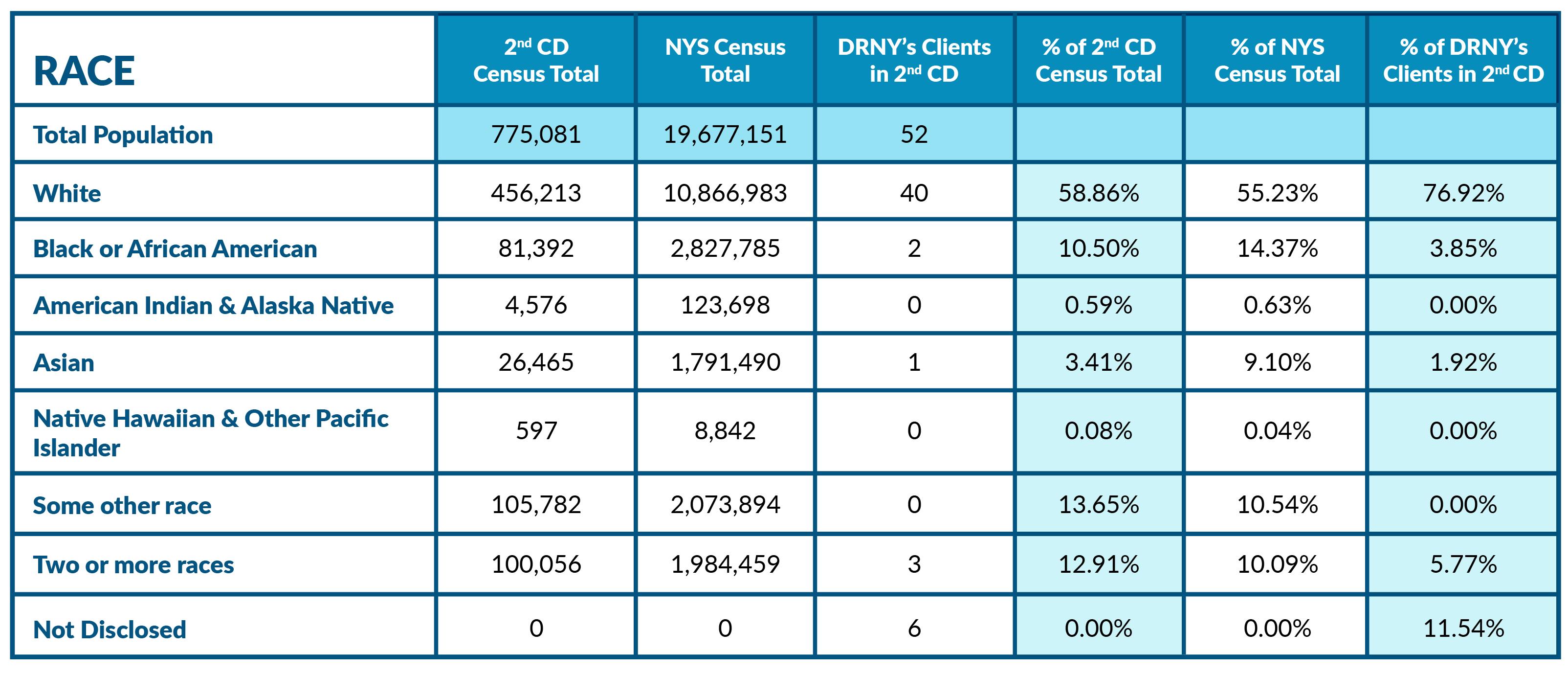

SERVICE REQUESTS
There were a total 60 service requests in this reporting period. DRNY provided full case services in 14 of the requests or 23.33%. DRNY provided Information and Referral (I&R) services to the remaining 46 requests.
DRNY makes appropriate referrals to other agencies in those matters where the issues are outside DRNY’s priorities, or because DRNY lacks the resources to undertake the matter. DRNY also provides information regarding the clients’ rights and available options. These matters vary from consumer financial issues, evictions, or other legal issues that are unrelated to the client’s disability.
Service Requests by Program
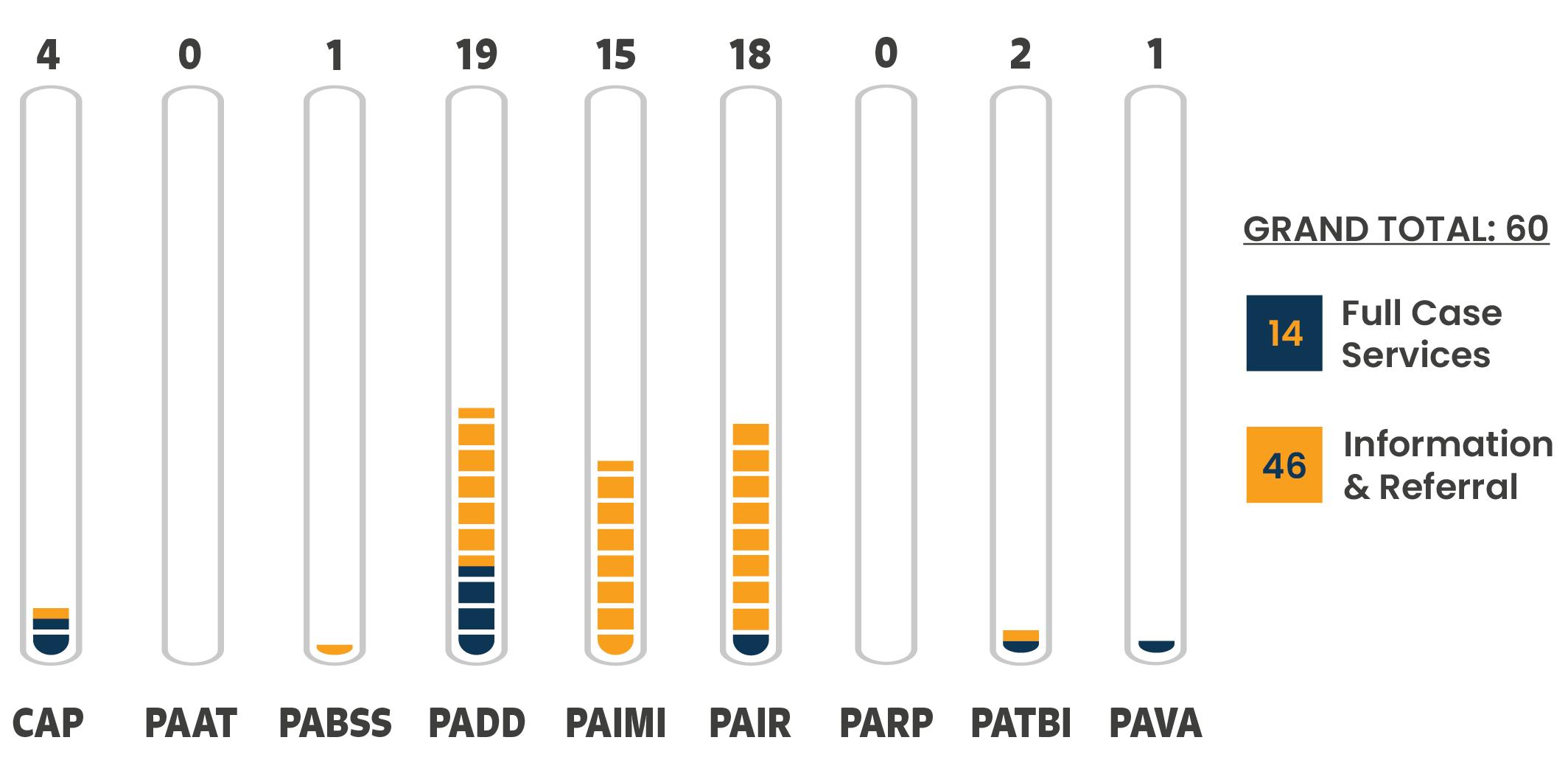
7
Response Time to Service Requests
of these Service Requests were resolved in less than 7 DAYS
8 of these Service Requests were resolved in less than 14 DAYS

REPRESENTATIVE ISSUE
Employment Assignment and Seniority Restored

We have often had great advocacy successes resulting from simple but powerful letters. One woman was facing the loss of her employment seniority due to a disability-related leave. We wrote to her employer detailing their illegal conduct under the ADA.
Her employer’s legal counsel took notice, and, as a result, they provided her with her desired employment assignment and restored her seniority. Through our advocacy, she was able to make her voice heard and achieve a positive outcome that allowed her to continue working with the same benefits and job security as before.
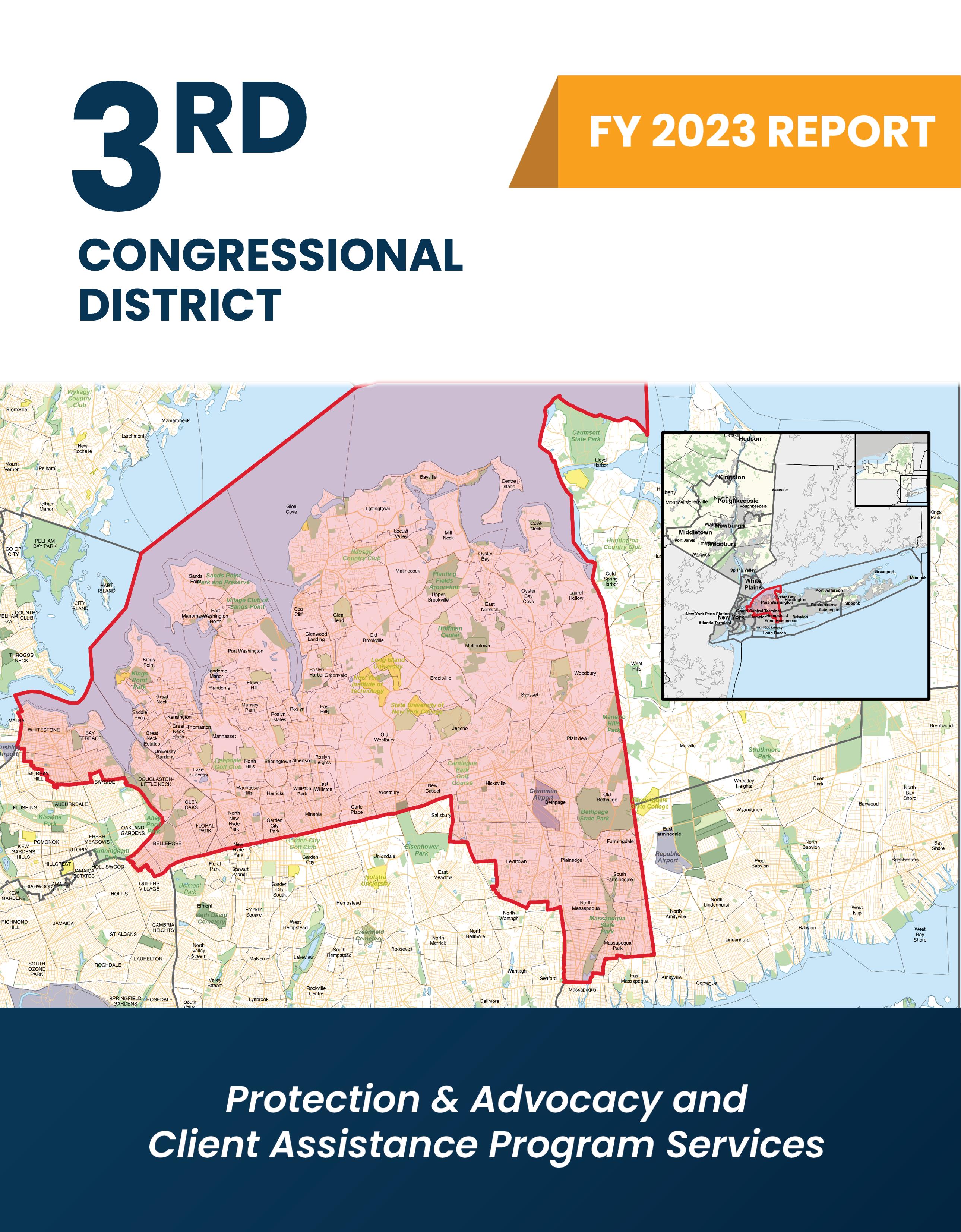
OUR CLIENTS
Over this 12 month period, DRNY averaged 4 Service Requests per month from individuals in your District. According to the most recent U.S. Census Bureau estimates, there are 75,512 individuals with disabilities living in the 3rd Congressional District and DRNY has handled 49 Service Requests for 60 distinct clients living in those 28 zip codes.
Clients by Age
In your district DRNY assisted some of the most vulnerable individuals. 8 unique clients were residents of nursing homes, hospitals, correctional facilities, rehabilitation facilities, and youth-focused residential facilities. Of the residents living in the community, 5 or nearly 16.67% of DRNY’s unique clients were under 18. According to census data, individuals under 18 account for 6.38% of civilian, non-institutionalized individuals with a disability.
The following table shows that 35.00% of DRNY’s clients are age 55 or older. *Demographic information is not required to receive DRNY services.
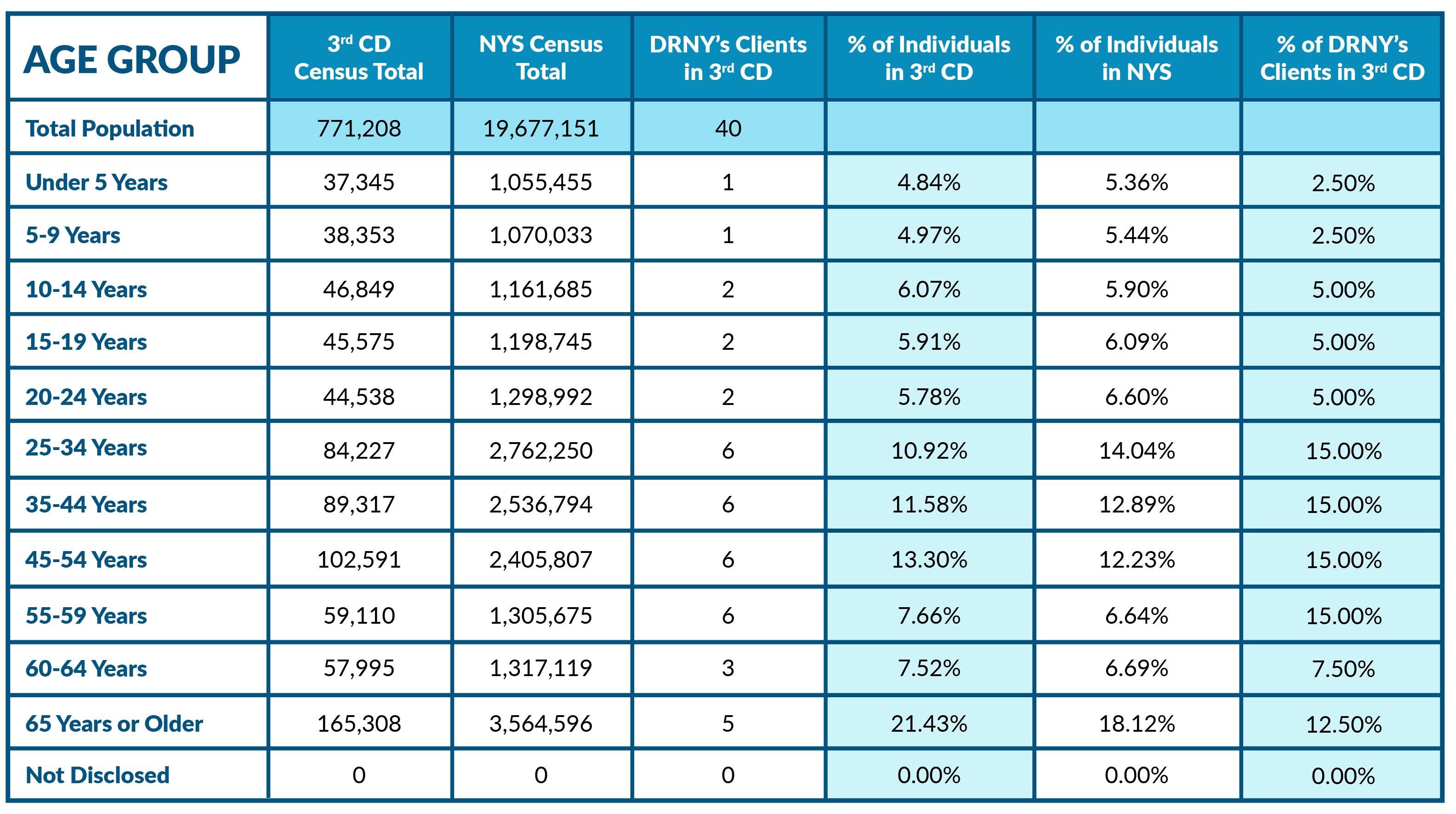
Clients from Under-Represented Groups
DRNY affirmatively seeks to provide services to historically under-represented groups. The following charts compare race and ethnicity demographics for the entire State of New York with that of DRNY’s clients.
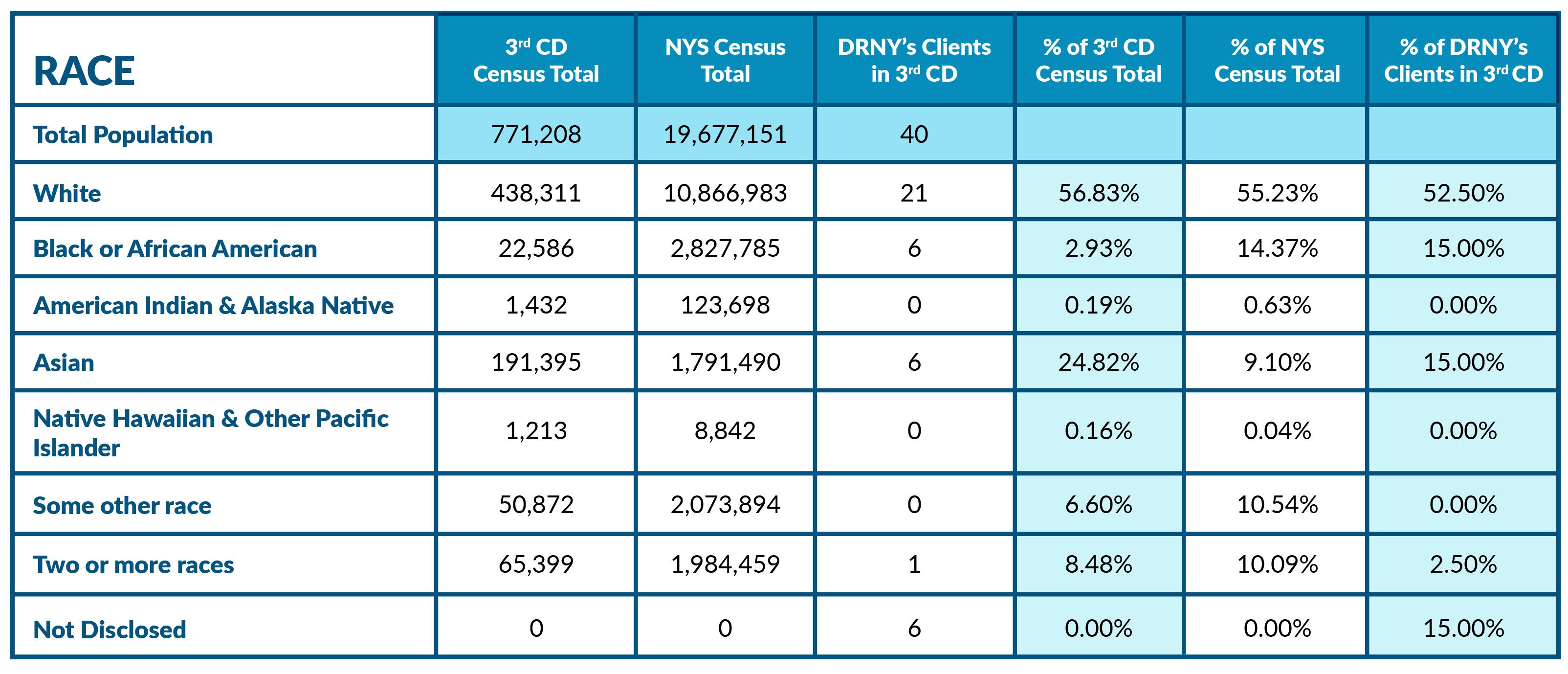

SERVICE REQUESTS
There were a total 49 service requests in this reporting period. DRNY provided full case services in 15 of the requests or 30.61%. DRNY provided Information and Referral (I&R) services to the remaining 34 requests.
DRNY makes appropriate referrals to other agencies in those matters where the issues are outside DRNY’s priorities, or because DRNY lacks the resources to undertake the matter. DRNY also provides information regarding the clients’ rights and available options. These matters vary from consumer financial issues, evictions, or other legal issues that are unrelated to the client’s disability.
Service Requests by Program
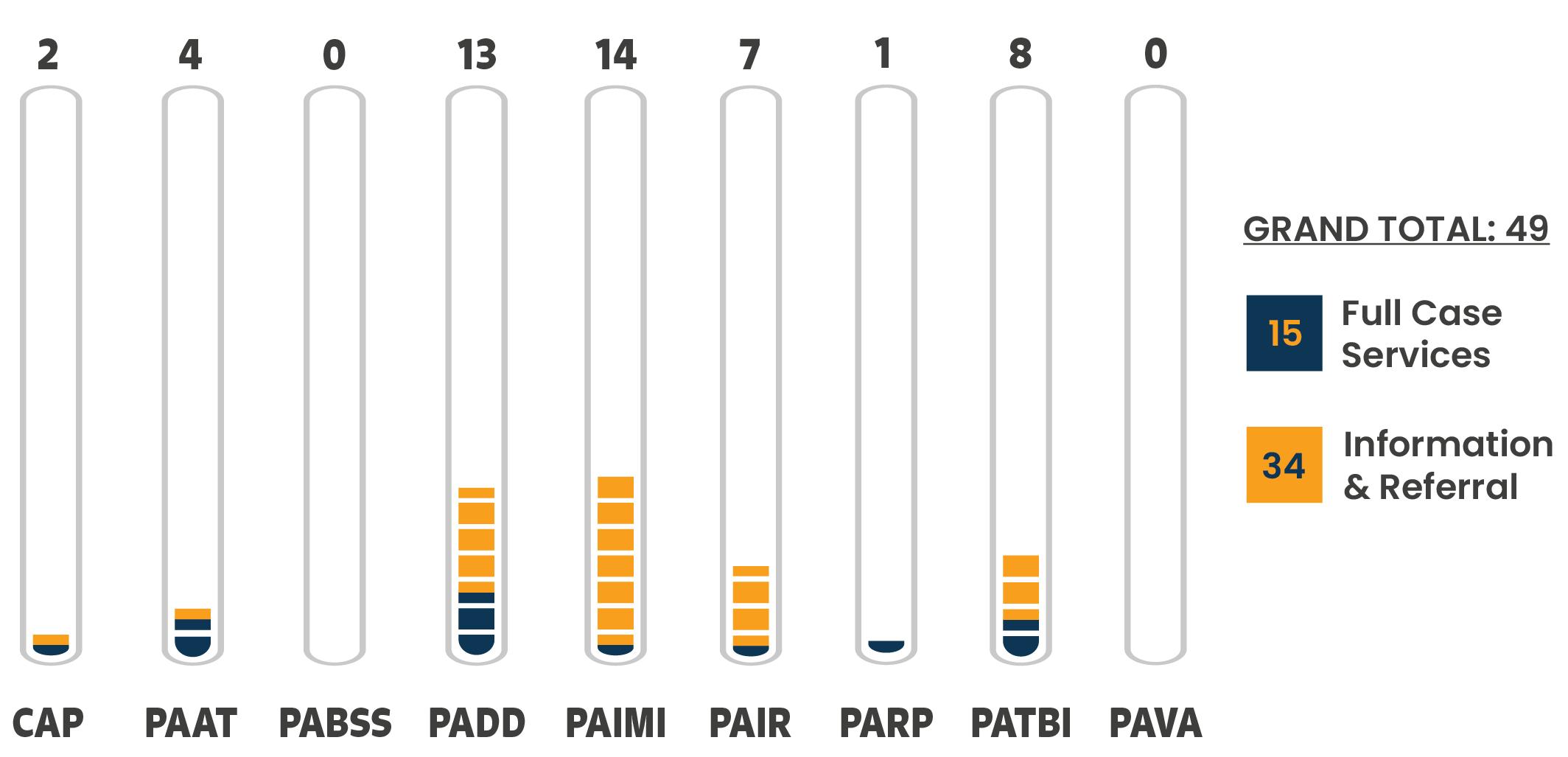
Response Time to Service Requests
of these Service Requests were resolved in less than 7 DAYS
3 of these Service Requests were resolved in less than 14 DAYS

REPRESENTATIVE ISSUE

Emotional Support and Service Animal Successes
There are many adjustments that people who are getting ready to give birth will need to make. However, during your eighth month of pregnancy, being told that your emotional support dog (ESA) is not allowed on the common grounds of the co-op that you live in should not be one of them.
This happened to a woman who reached out to us for help. In fact, the co-op had instructed her to carry the dog on the grounds and off the property to relieve herself. She told us that other tenants with ESAs were also given those same instructions.
We immediately contacted the co-op attorney, and because of our advocacy, the co-op will no longer prohibit ESAs from being on the common grounds, and tenants will not be required to carry them on the property. They have also agreed to make five substantive modifications to their policies that violated the rights of tenants and potential tenants with ESAs.
The woman emailed us to express her gratitude and said, “Thank you for helping us. Everyone in our community with an ESA is very appreciative of you.”
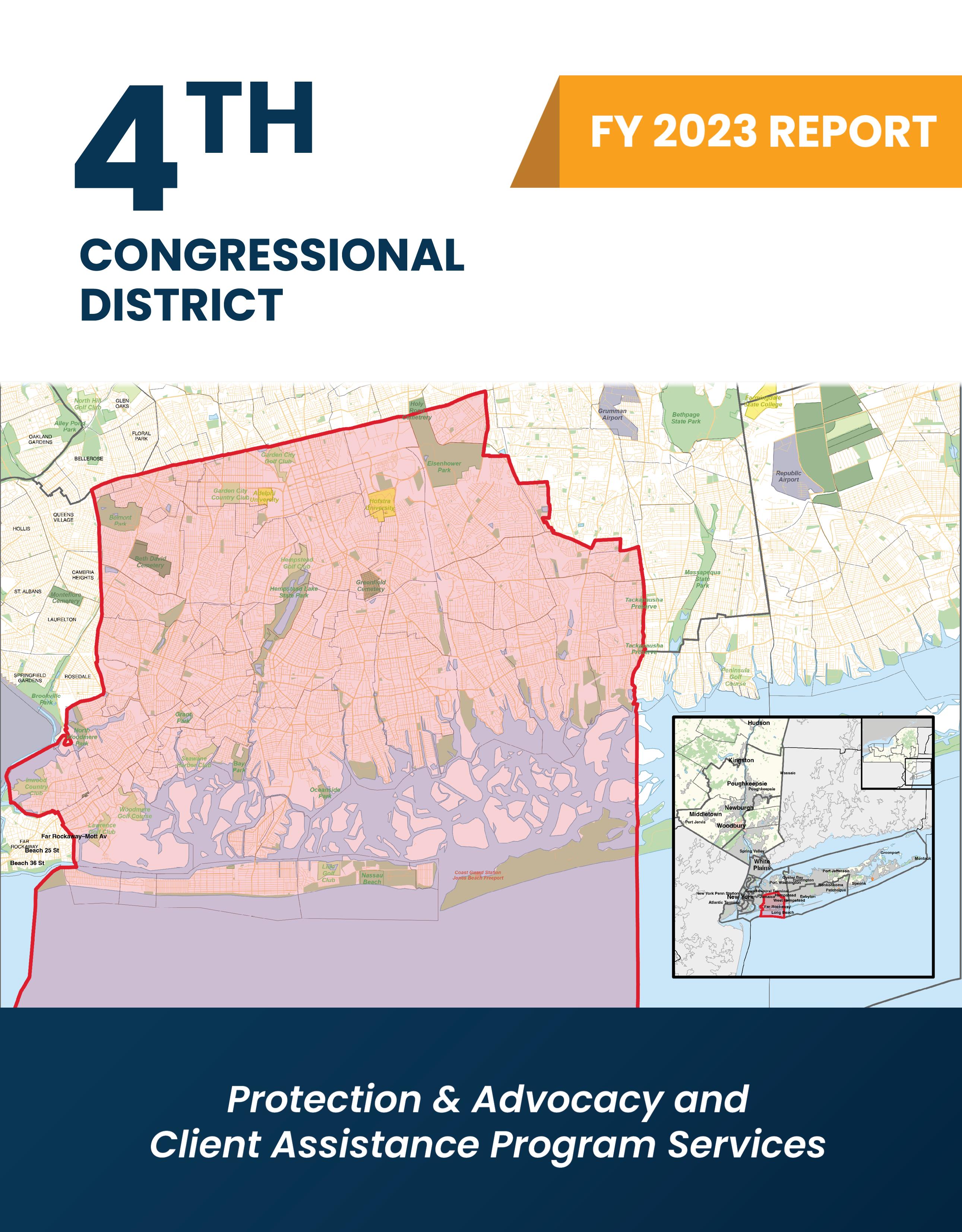
OUR CLIENTS
Over this 12 month period, DRNY averaged 4 Service Requests per month from individuals in your District. According to the most recent U.S. Census Bureau estimates, there are 76,966 individuals with disabilities living in the 4th Congressional District and DRNY has handled 53 Service Requests for 46 distinct clients living in those 22 zip codes.
Clients by Age
In your district DRNY assisted some of the most vulnerable individuals. 6 unique clients were residents of nursing homes, hospitals, correctional facilities, rehabilitation facilities, and youth-focused residential facilities. Of the residents living in the community, 8 or nearly 20.51% of DRNY’s unique clients were under 18. According to census data, individuals under 18 account for 7.28% of civilian, non-institutionalized individuals with a disability.
The following table shows that 19.57% of DRNY’s clients are age 55 or older. *Demographic information is not required to receive DRNY services.

Clients from Under-Represented Groups
DRNY affirmatively seeks to provide services to historically under-represented groups. The following charts compare race and ethnicity demographics for the entire State of New York with that of DRNY’s clients.
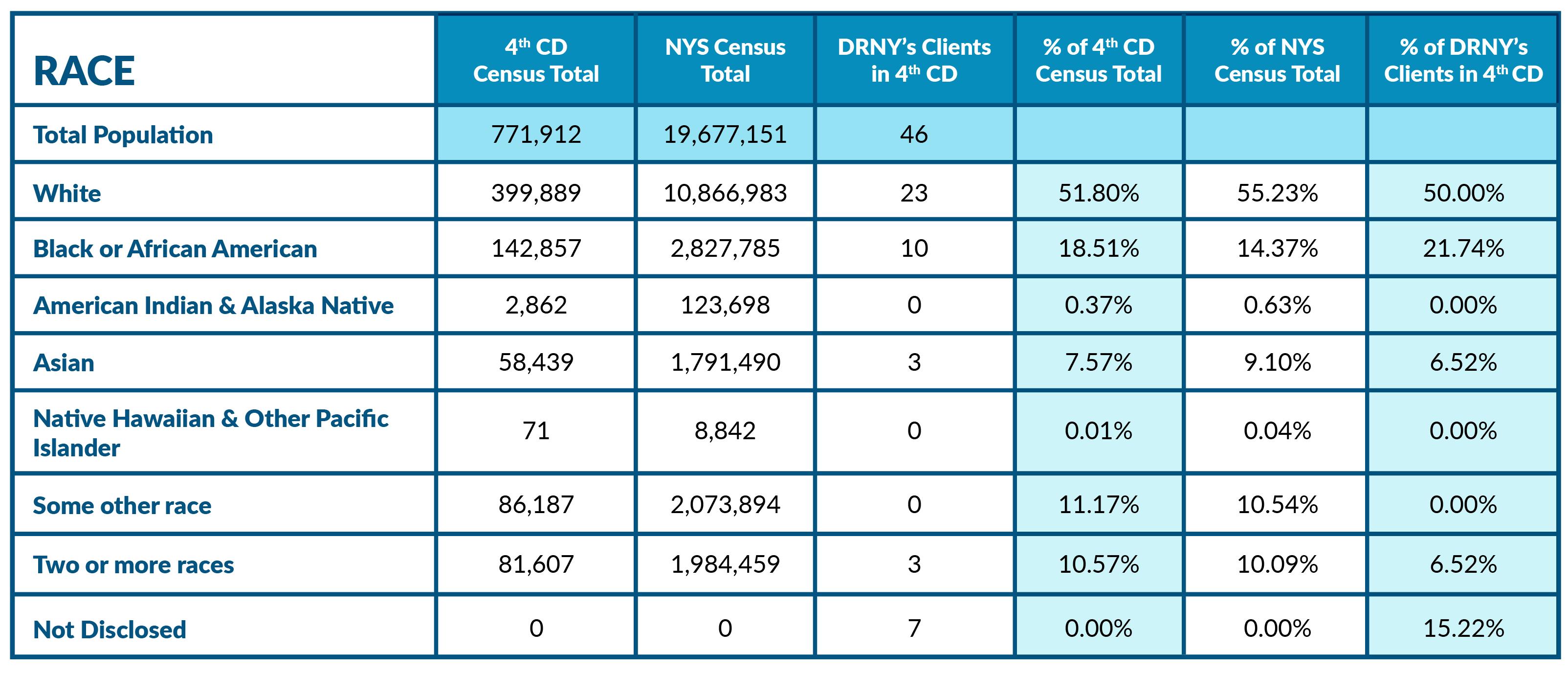

SERVICE REQUESTS
There were a total 53 service requests in this reporting period. DRNY provided full case services in 14 of the requests or 26.42%. DRNY provided Information and Referral (I&R) services to the remaining 39 requests.
DRNY makes appropriate referrals to other agencies in those matters where the issues are outside DRNY’s priorities, or because DRNY lacks the resources to undertake the matter. DRNY also provides information regarding the clients’ rights and available options. These matters vary from consumer financial issues, evictions, or other legal issues that are unrelated to the client’s disability.
Service Requests by Program
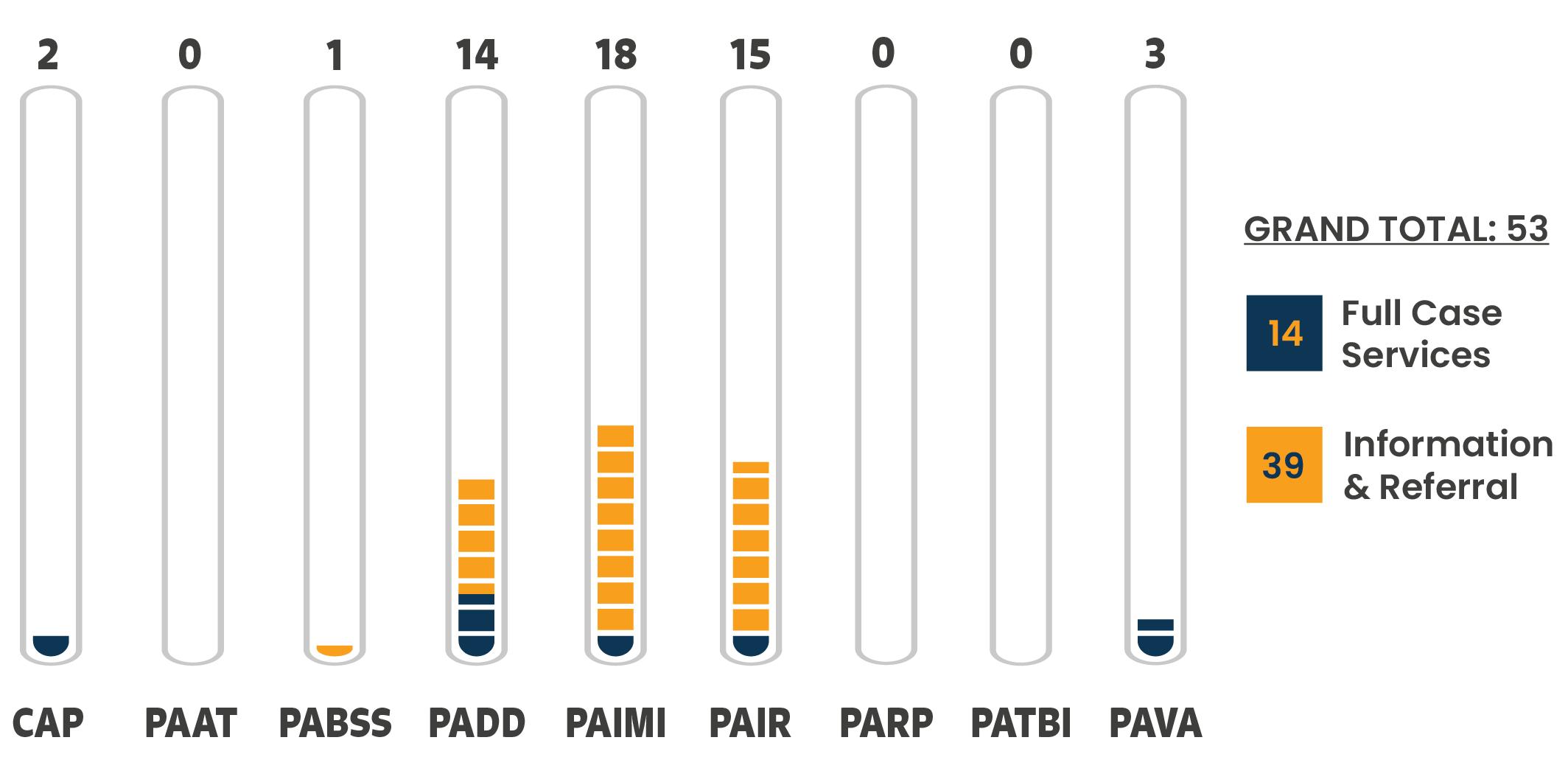
Response Time to Service Requests
5 of these Service Requests were resolved in less than 7 DAYS
4 of these Service Requests were resolved in less than 14 DAYS

REPRESENTATIVE ISSUE
Adjustable Seat for Power Chair Approved

The process of requesting a crucial component of a power chair that could improve mobility and independence should not be as complicated as it was for the parents of a young man last year.
They requested a power chair and device additions from the Office of Health Insurance Programs (OHIP), and OHIP approved the chair and some of the additions. However, they denied the request for a 12” power adjustable seat height module (“PSE”).
This small but significant device would have made all the difference, as it would have given their son the ability to be more independent in all environments, making everyday life easier and more fulfilling. After the appeal process, we received a favorable fair hearing decision, and the addition of the PSE device was approved.

OUR CLIENTS
Over this 12 month period, DRNY averaged 5 Service Requests per month from individuals in your District. According to the most recent U.S. Census Bureau estimates, there are 88,033 individuals with disabilities living in the 5th Congressional District and DRNY has handled 64 Service Requests for 53 distinct clients living in those 19 zip codes.
Clients by Age
In your district DRNY assisted some of the most vulnerable individuals. 11 unique clients were residents of nursing homes, hospitals, correctional facilities, rehabilitation facilities, and youth-focused residential facilities. Of the residents living in the community, 4 or nearly 9.76% of DRNY’s unique clients were under 18. According to census data, individuals under 18 account for 8.06% of civilian, non-institutionalized individuals with a disability.
The following table shows that 18.87% of DRNY’s clients are age 55 or older. *Demographic information is not required to receive DRNY services.
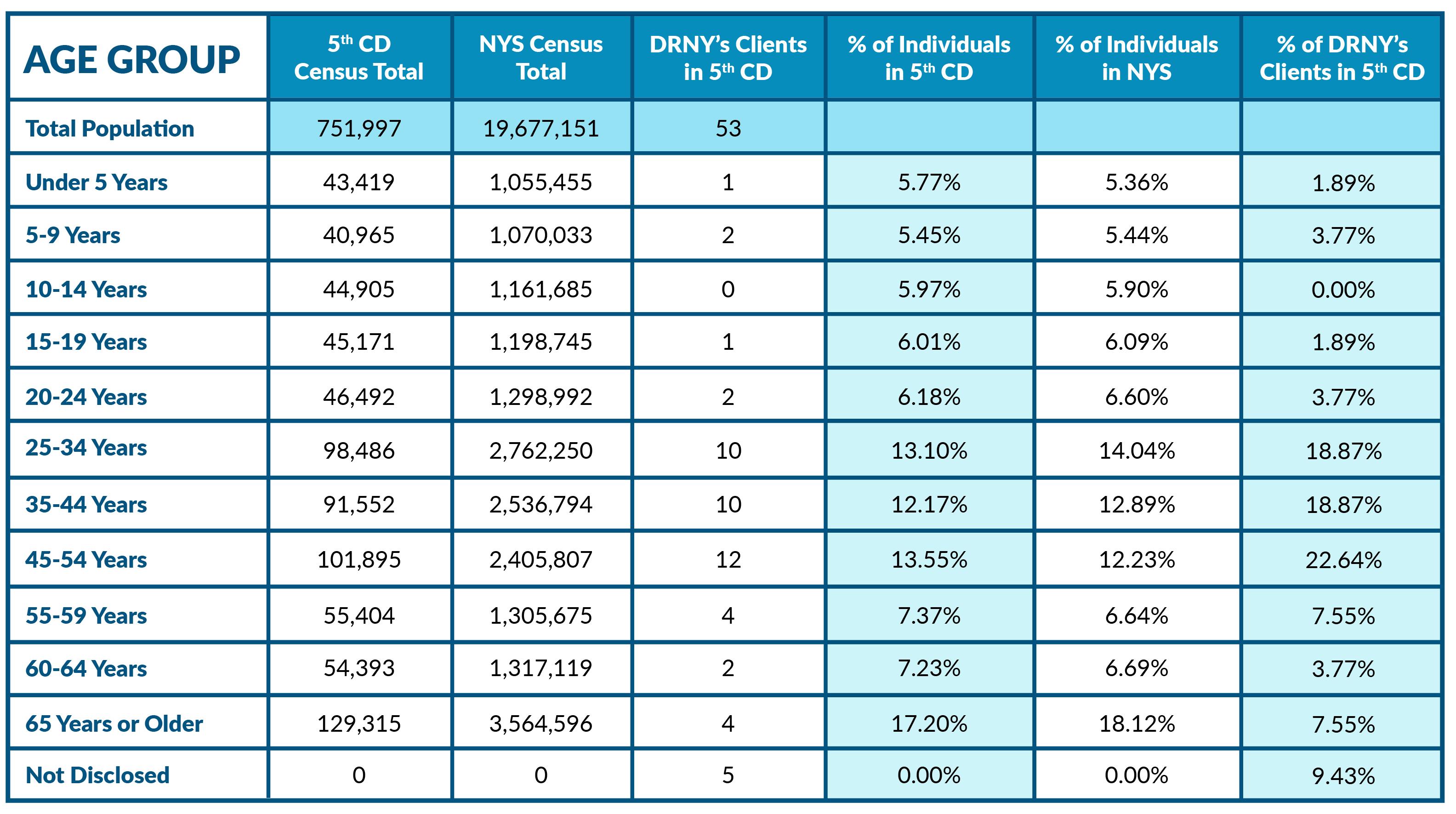
Clients from Under-Represented Groups
DRNY affirmatively seeks to provide services to historically under-represented groups. The following charts compare race and ethnicity demographics for the entire State of New York with that of DRNY’s clients.
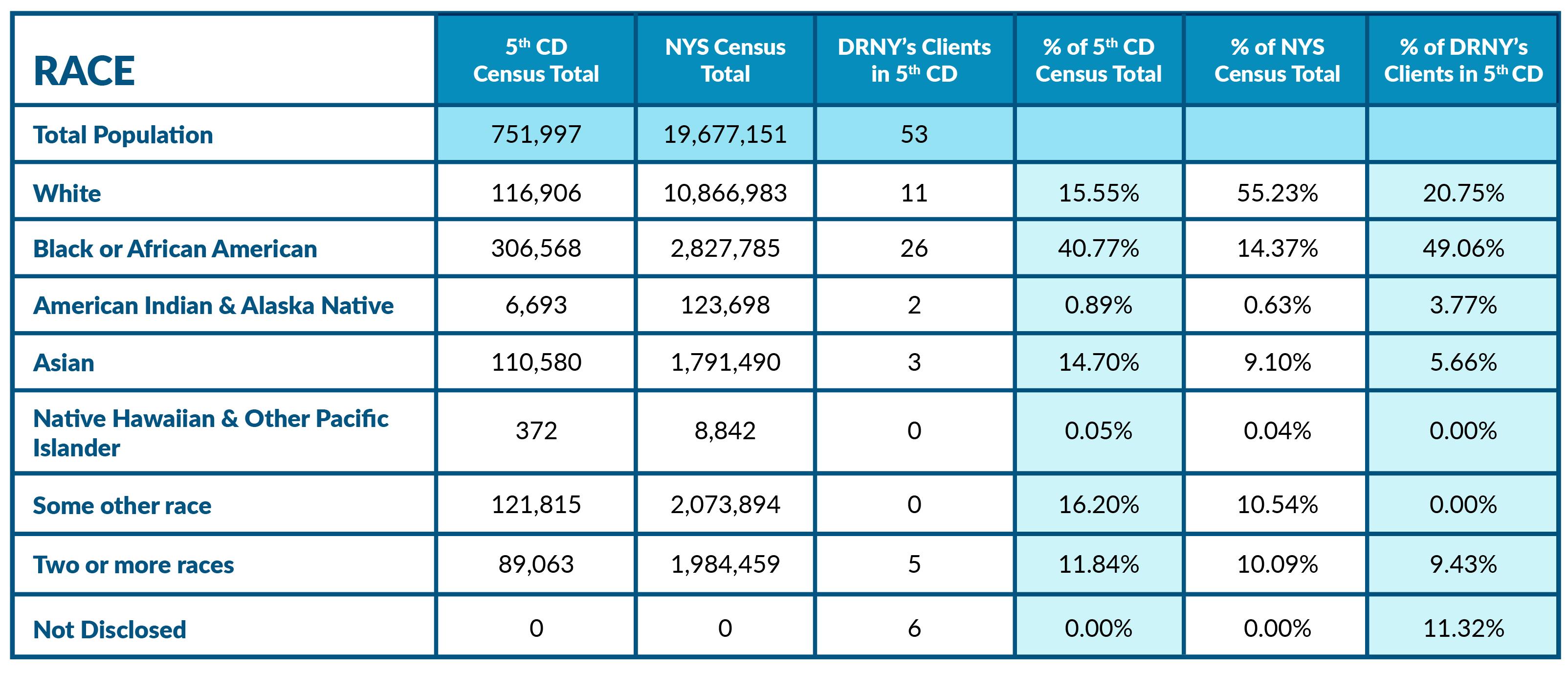

SERVICE REQUESTS
There were a total 64 service requests in this reporting period. DRNY provided full case services in 10 of the requests or 15.63%. DRNY provided Information and Referral (I&R) services to the remaining 54 requests.
DRNY makes appropriate referrals to other agencies in those matters where the issues are outside DRNY’s priorities, or because DRNY lacks the resources to undertake the matter. DRNY also provides information regarding the clients’ rights and available options. These matters vary from consumer financial issues, evictions, or other legal issues that are unrelated to the client’s disability.
Service Requests by Program
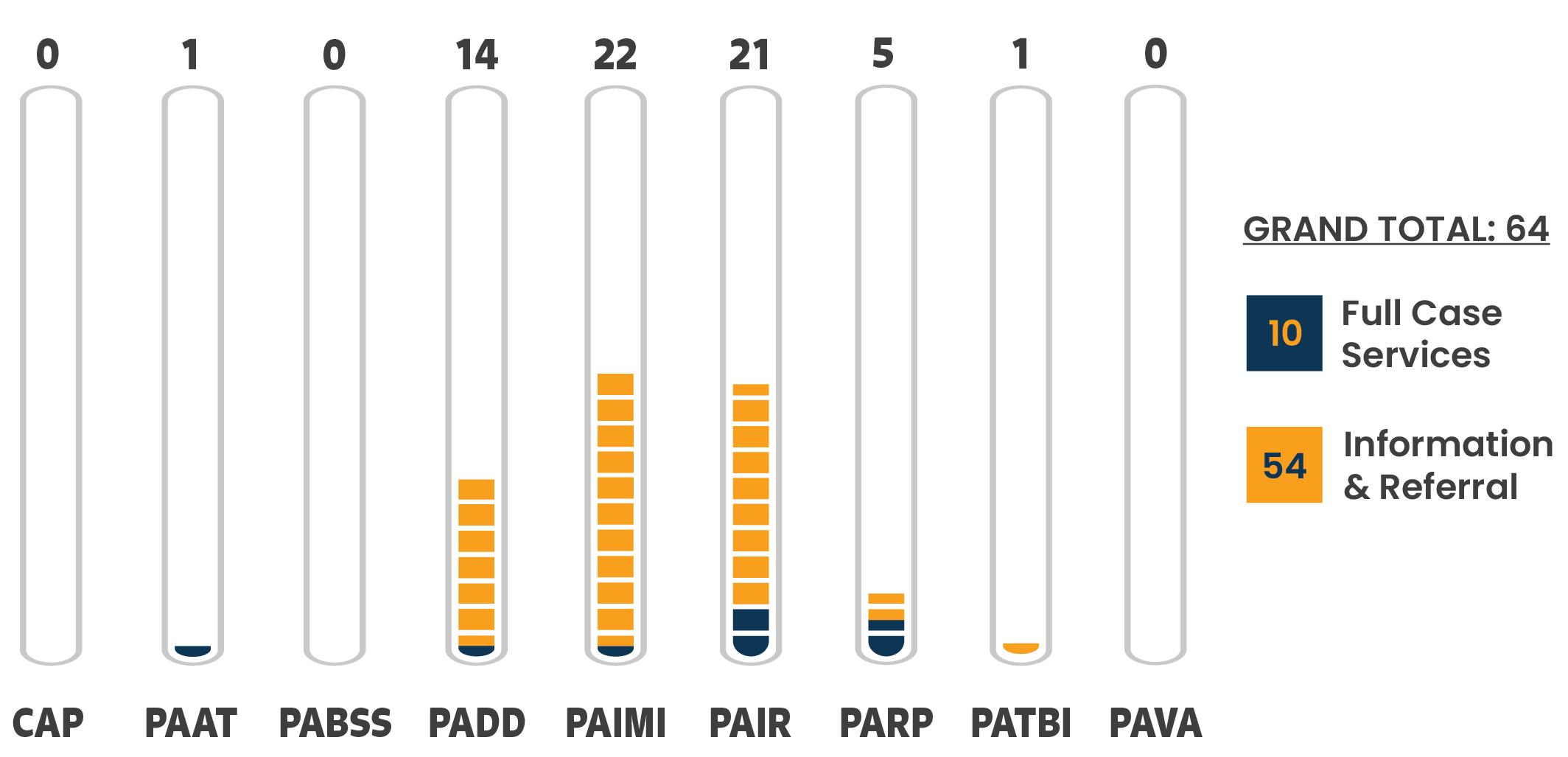
Response Time to Service Requests
of these Service Requests were resolved in less than 7 DAYS
9
of these Service Requests were resolved in less than 14 DAYS

REPRESENTATIVE ISSUE

Culturally Competent Supportive Housing Case Manager Assigned
A trans woman residing in supportive housing reported several troubling events precipitated by the staff at her residence. She reported being subjected to transphobic statements from her case manager and a pattern of staff calling 911 to report incidents involving her.
These 911 calls resulted in this woman being subjected to abusive and transphobic comments and actions by responding police officers. We met with the house administrators. They acknowledged that the manager was not culturally competent to work with transgender residents and the harm they caused. She was assigned a new case manager with prior experience working successfully with LGBTQIA+ clients. The administration also agreed to review and modify its policies regarding placing 911 calls to address resident’s actions. This is a hopeful new chapter in this woman’s life in the apartment she loves.
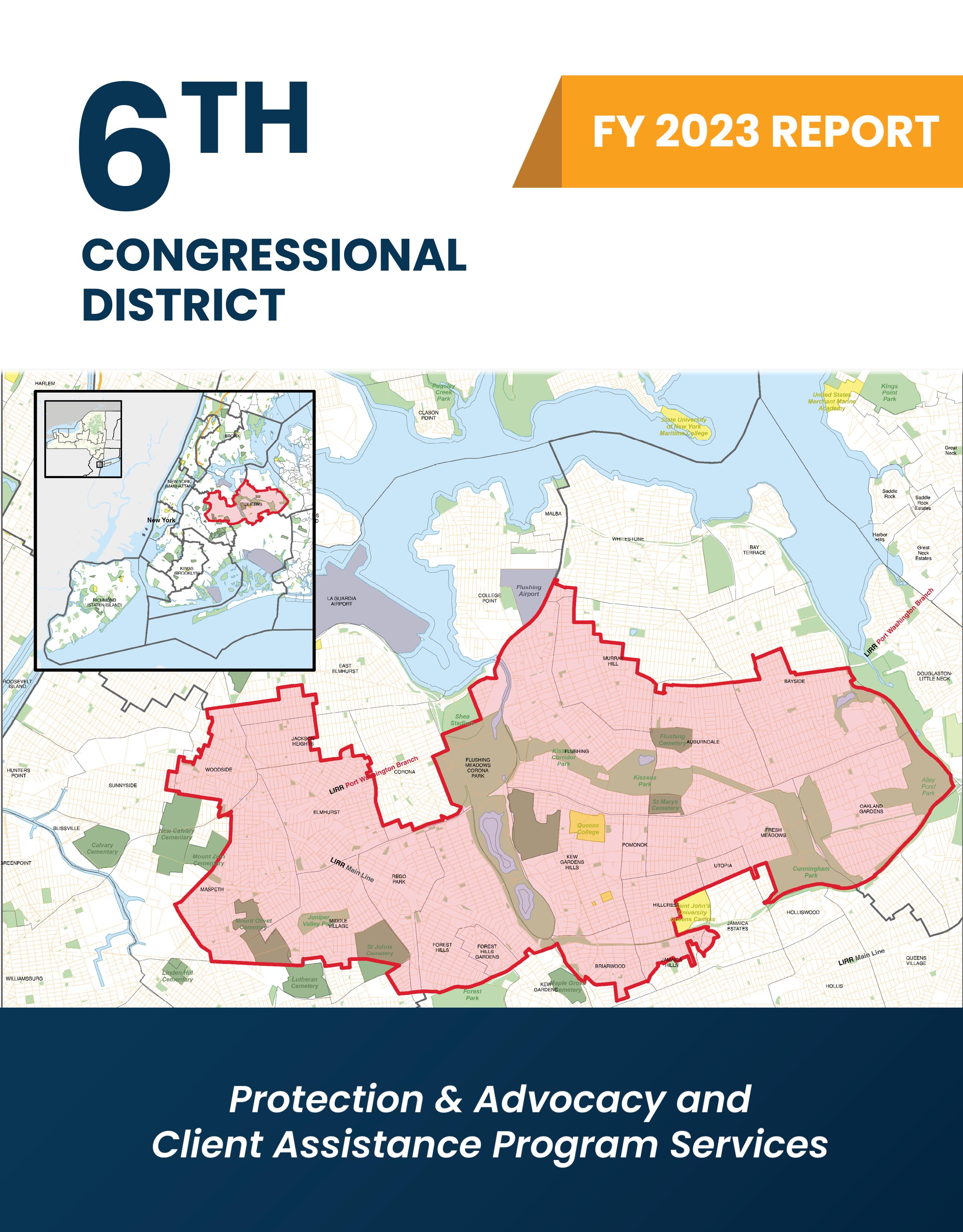
OUR CLIENTS
Over this 12 month period, DRNY averaged 5 Service Requests per month from individuals in your District. According to the most recent U.S. Census Bureau estimates, there are 75,630 individuals with disabilities living in the 6th Congressional District and DRNY has handled 63 Service Requests for 57 distinct clients living in those 19 zip codes.
Clients by Age
In your district DRNY assisted some of the most vulnerable individuals. 10 unique clients were residents of nursing homes, hospitals, correctional facilities, rehabilitation facilities, and youth-focused residential facilities. Of the residents living in the community, 3 or nearly 7.14% of DRNY’s unique clients were under 18. According to census data, individuals under 18 account for 5.27% of civilian, non-institutionalized individuals with a disability.
The following table shows that 33.33% of DRNY’s clients are age 55 or older. *Demographic information is not required to receive DRNY services.
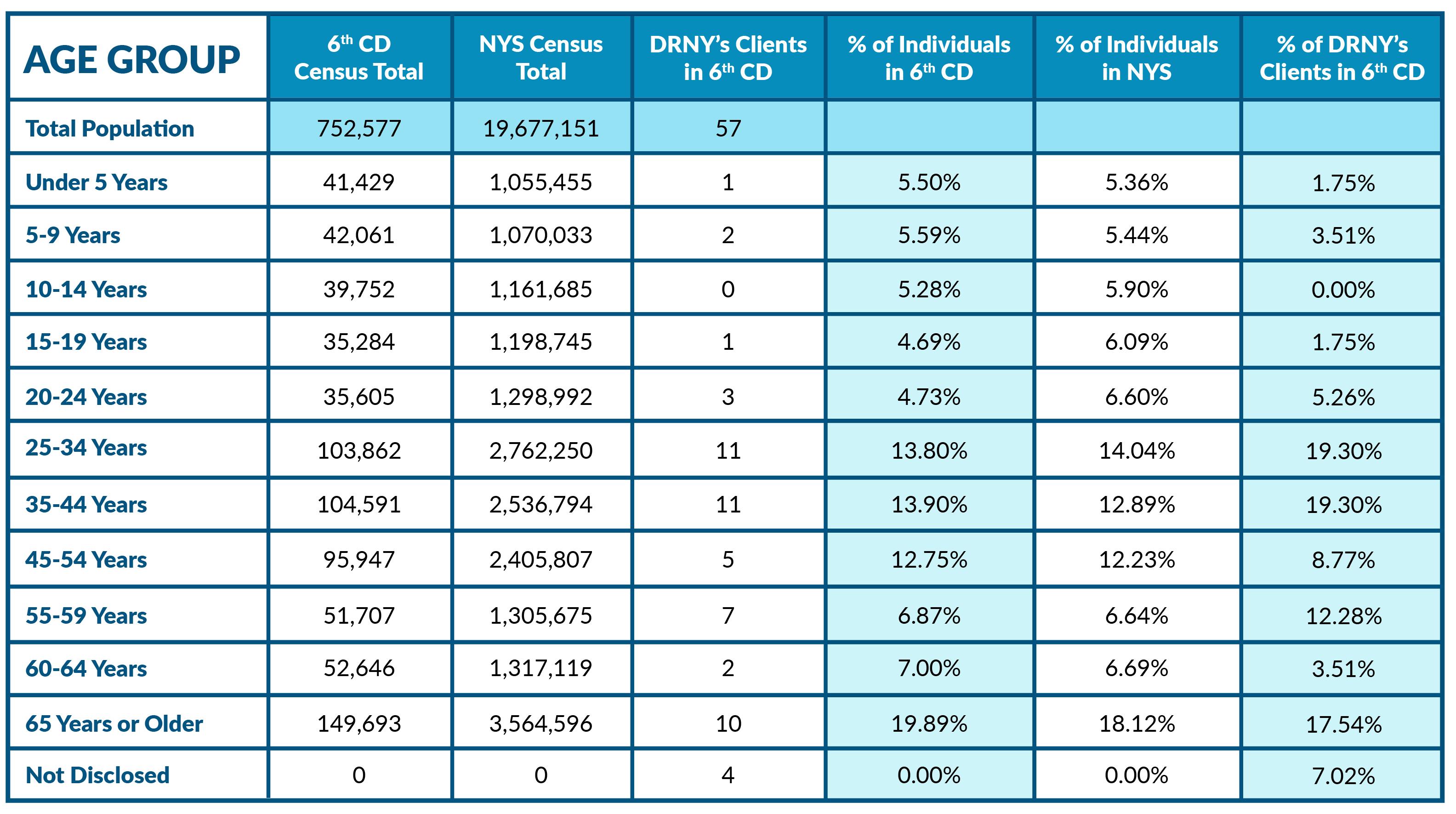
Clients from Under-Represented Groups
DRNY affirmatively seeks to provide services to historically under-represented groups. The following charts compare race and ethnicity demographics for the entire State of New York with that of DRNY’s clients.
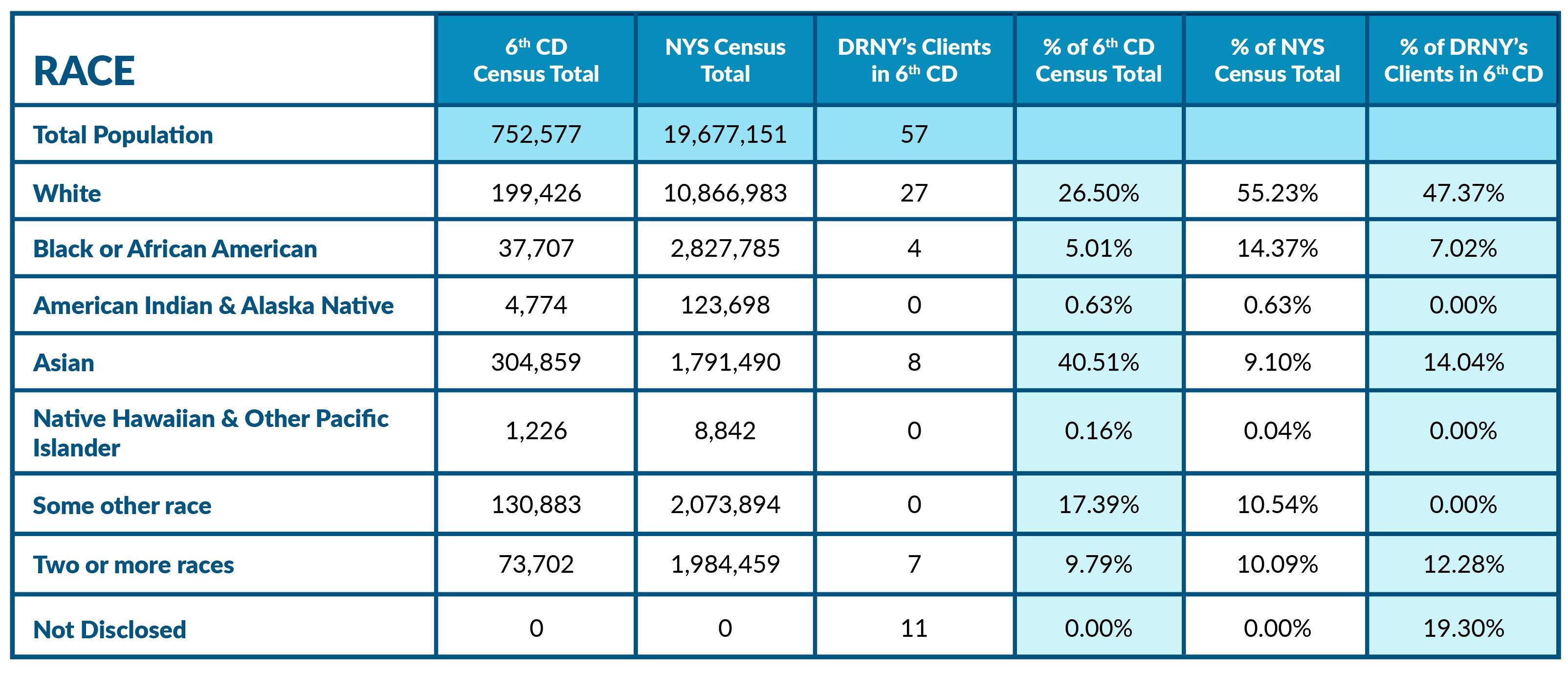

SERVICE REQUESTS
There were a total 63 service requests in this reporting period. DRNY provided full case services in 15 of the requests or 23.81%. DRNY provided Information and Referral (I&R) services to the remaining 48 requests.
DRNY makes appropriate referrals to other agencies in those matters where the issues are outside DRNY’s priorities, or because DRNY lacks the resources to undertake the matter. DRNY also provides information regarding the clients’ rights and available options. These matters vary from consumer financial issues, evictions, or other legal issues that are unrelated to the client’s disability.
Service Requests by Program
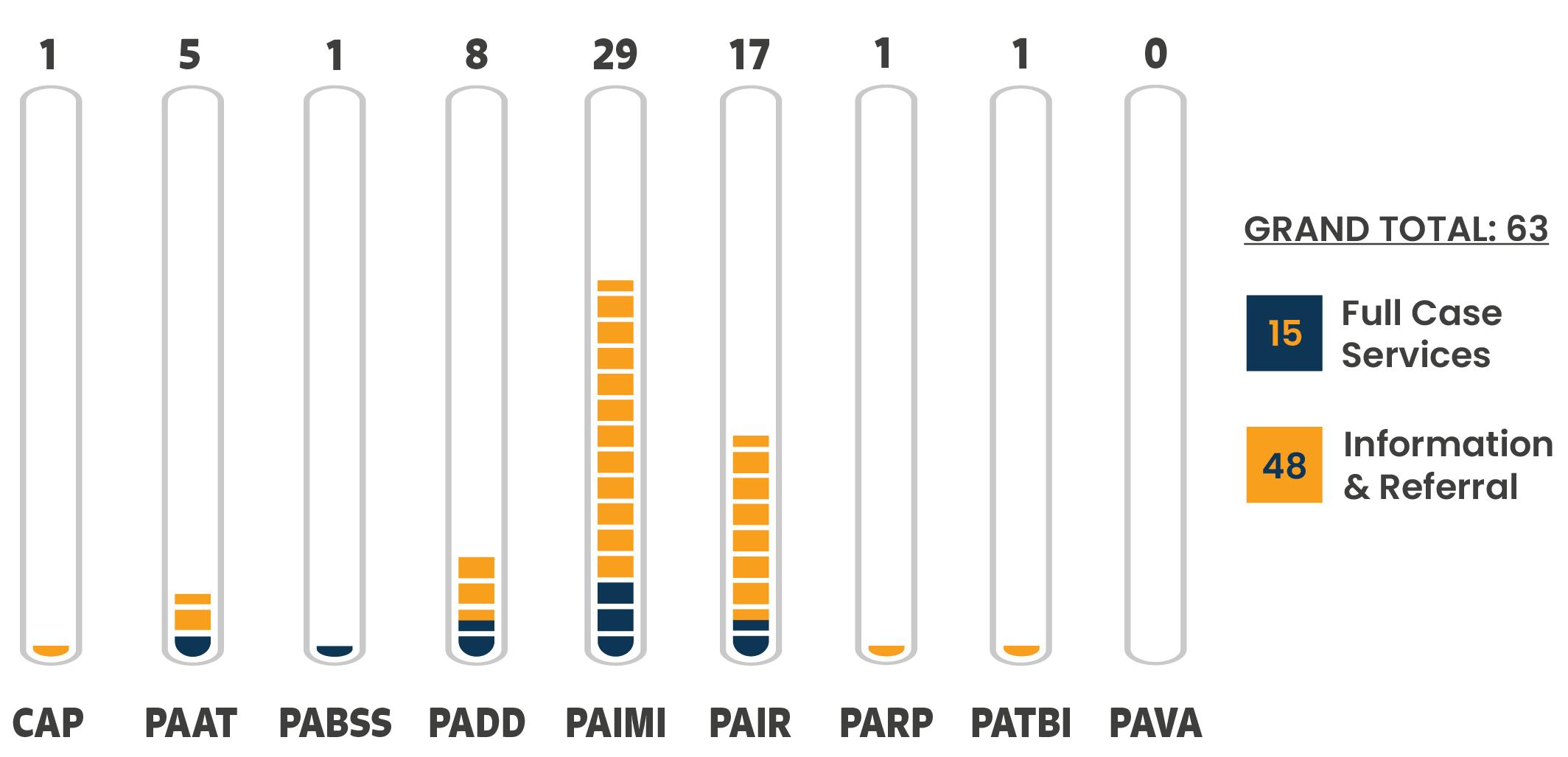
Response Time to Service Requests
of these Service Requests were resolved in less than 7 DAYS 8
of these Service Requests were resolved in less than 14 DAYS

REPRESENTATIVE ISSUE
Employment Discrimination

Looking for employment is often a long and frustrating process. From the initial contact to the interview, it can be very stressful. However, a sense of accomplishment should come next once a job offer is made.
Unfortunately, we had to file a complaint with the New York City Commission on Human Rights (NYCCHR) on behalf of a man who was offered a job as a respiratory therapist at a health center. However, when he requested a reasonable accommodation, the job offer was withdrawn.
Without even speaking to him, the health center revoked his offer. As a result of our advocacy, he will receive $126,258.82 as part of the settlement, and the employer will address systemic issues to ensure that this does not happen to another employee or prospective employee in the future.
They will be required to provide training for all staff and undergo a policy audit by NYCCHR. Additionally, the employer will create a program to improve the employment of people with disabilities.
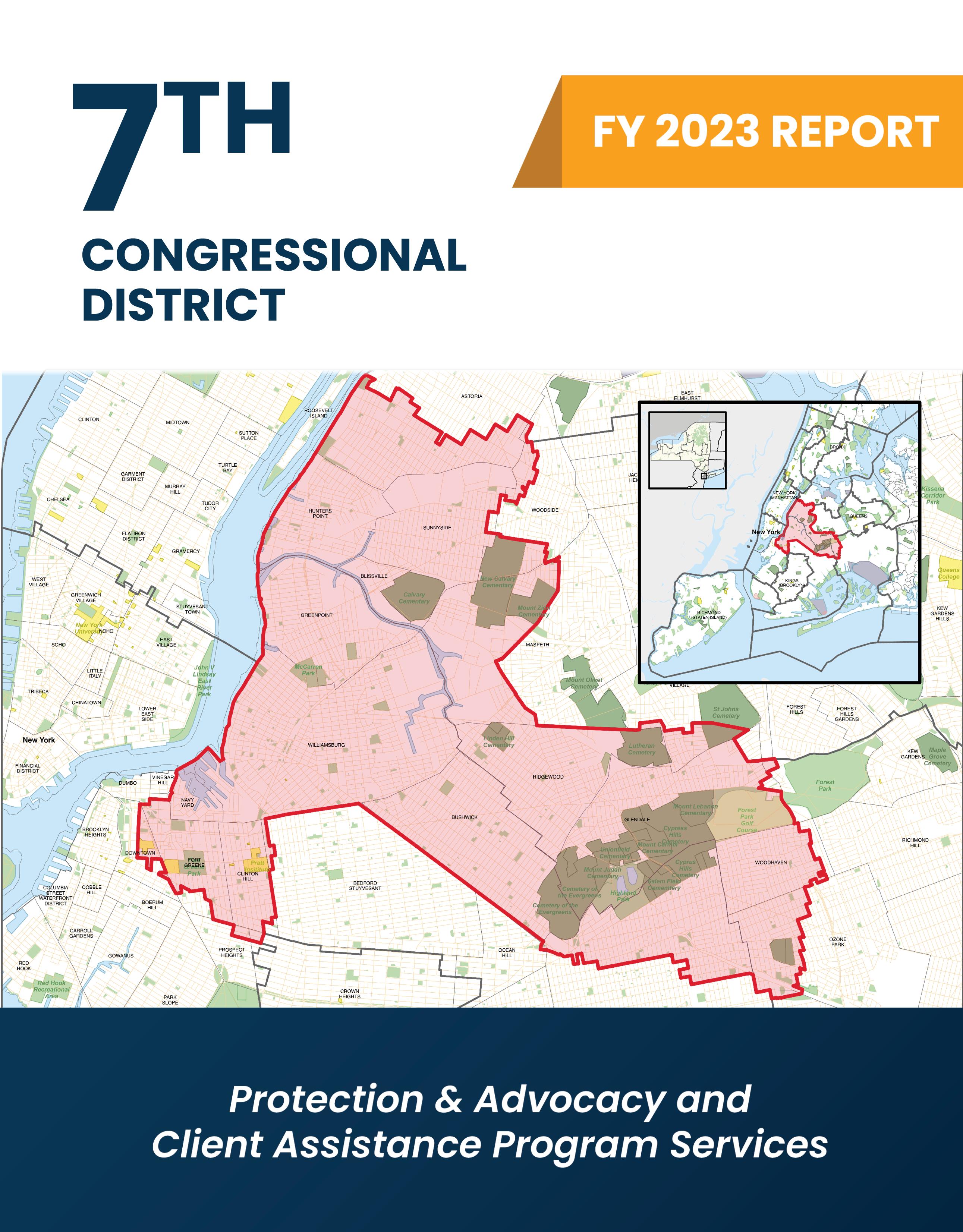
OUR CLIENTS
Over this 12 month period, DRNY averaged 5 Service Requests per month from individuals in your District. According to the most recent U.S. Census Bureau estimates, there are 67,752 individuals with disabilities living in the 7th Congressional District and DRNY has handled 56 Service Requests for 49 distinct clients living in those 21 zip codes.
Clients by Age
In your district DRNY assisted some of the most vulnerable individuals. 0 unique clients were residents of nursing homes, hospitals, correctional facilities, rehabilitation facilities, and youth-focused residential facilities. Of the residents living in the community, 5 or nearly 10.64% of DRNY’s unique clients were under 18. According to census data, individuals under 18 account for 4.99% of civilian, non-institutionalized individuals with a disability.
The following table shows that 22.25% of DRNY’s clients are age 55 or older. *Demographic information is not required to receive DRNY services.
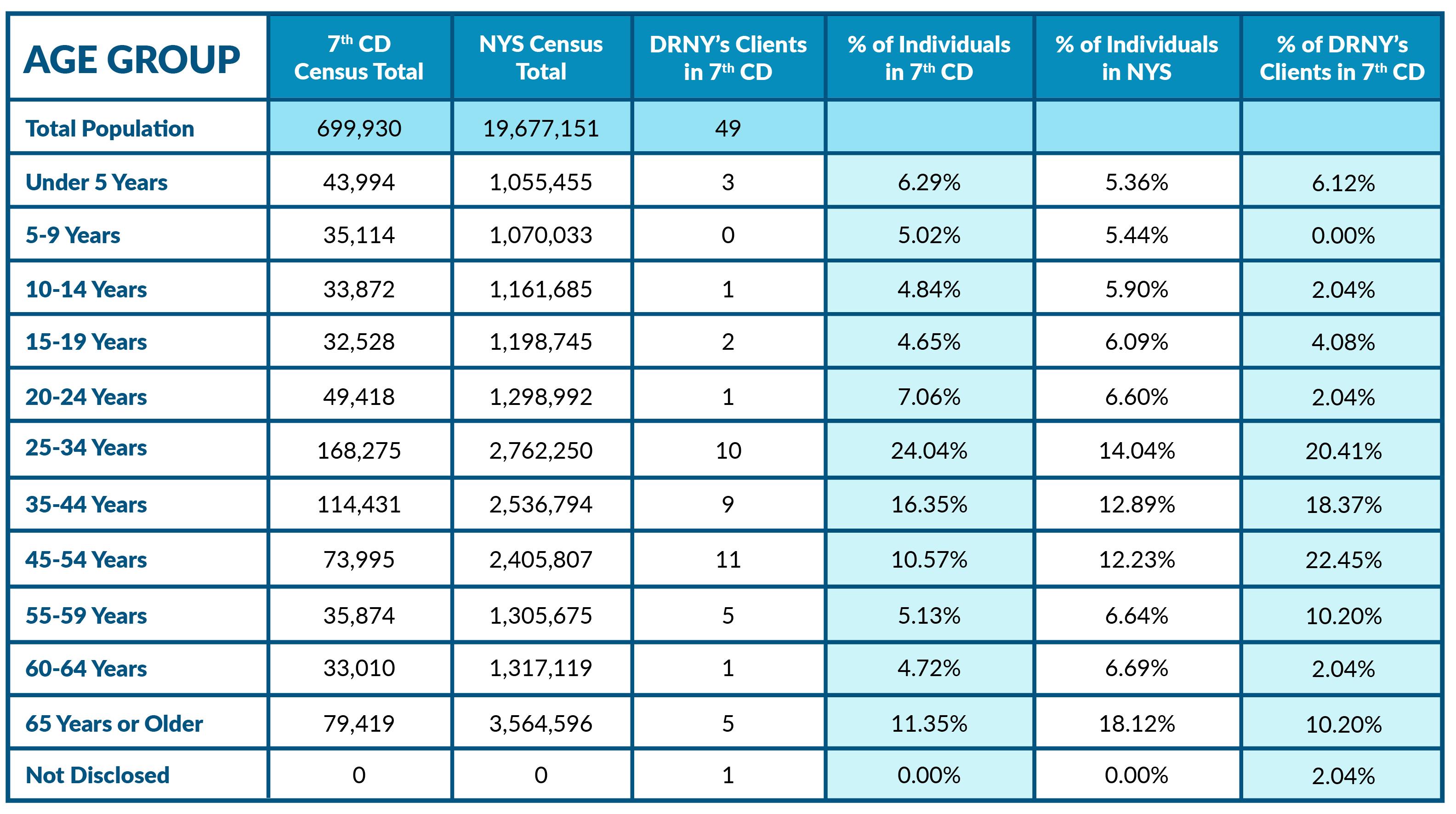
Clients from Under-Represented Groups
DRNY affirmatively seeks to provide services to historically under-represented groups. The following charts compare race and ethnicity demographics for the entire State of New York with that of DRNY’s clients.
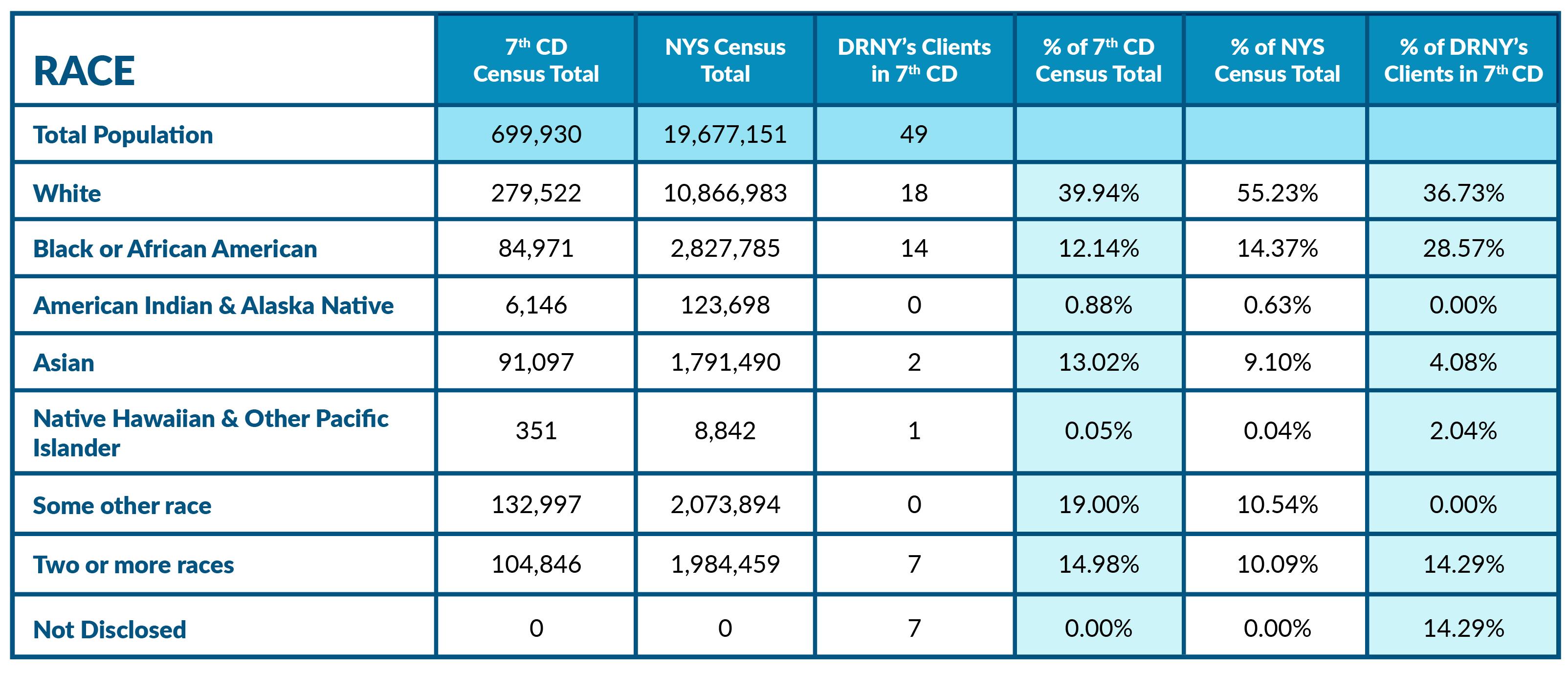

SERVICE REQUESTS
There were a total 56 service requests in this reporting period. DRNY provided full case services in 11 of the requests or 19.64%. DRNY provided Information and Referral (I&R) services to the remaining 45 requests.
DRNY makes appropriate referrals to other agencies in those matters where the issues are outside DRNY’s priorities, or because DRNY lacks the resources to undertake the matter. DRNY also provides information regarding the clients’ rights and available options. These matters vary from consumer financial issues, evictions, or other legal issues that are unrelated to the client’s disability.
Service Requests by Program

Response Time to Service Requests
9 of these Service Requests were resolved in less than 7 DAYS
11 of these Service Requests were resolved in less than 14 DAYS

REPRESENTATIVE ISSUE
Reasonable Accommodation at Work
Recently, we had the opportunity to advocate on behalf of a woman who worked with medically fragile children and required reasonable accommodations at work.

We advocated on her behalf, and her employer agreed to allow her service animal to come to work. They also provided her with a private office that could be locked, changed several door handles, and provided a lower keypad.
The medical facility provided her with a separate conference room to work with children medically cleared to work with her service animal. They also provided her with an assistant to run her groups for children who were not medically cleared. Thanks to our advocacy, the woman received effective accommodations that met her needs at work.
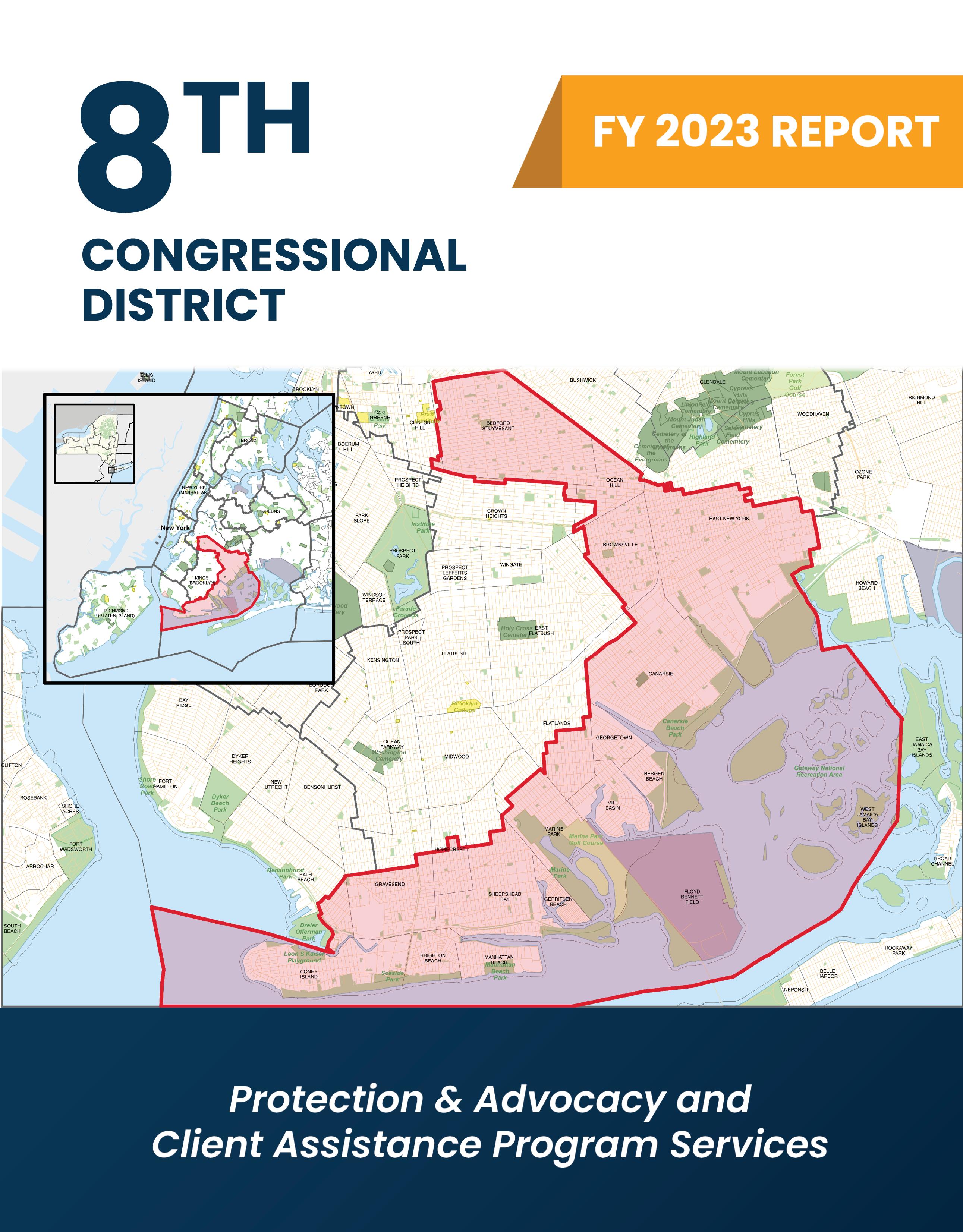
OUR CLIENTS
Over this 12 month period, DRNY averaged 6 Service Requests per month from individuals in your District. According to the most recent U.S. Census Bureau estimates, there are 115,802 individuals with disabilities living in the 8th Congressional District and DRNY has handled 69 Service Requests for 66 distinct clients living in those 18 zip codes.
Clients by Age
In your district DRNY assisted some of the most vulnerable individuals. 7 unique clients were residents of nursing homes, hospitals, correctional facilities, rehabilitation facilities, and youth-focused residential facilities. Of the residents living in the community, 3 or nearly 5.45% of DRNY’s unique clients were under 18. According to census data, individuals under 18 account for 5.03% of civilian, non-institutionalized individuals with a disability.
The following table shows that 28.79% of DRNY’s clients are age 55 or older. *Demographic information is not required to receive DRNY services.
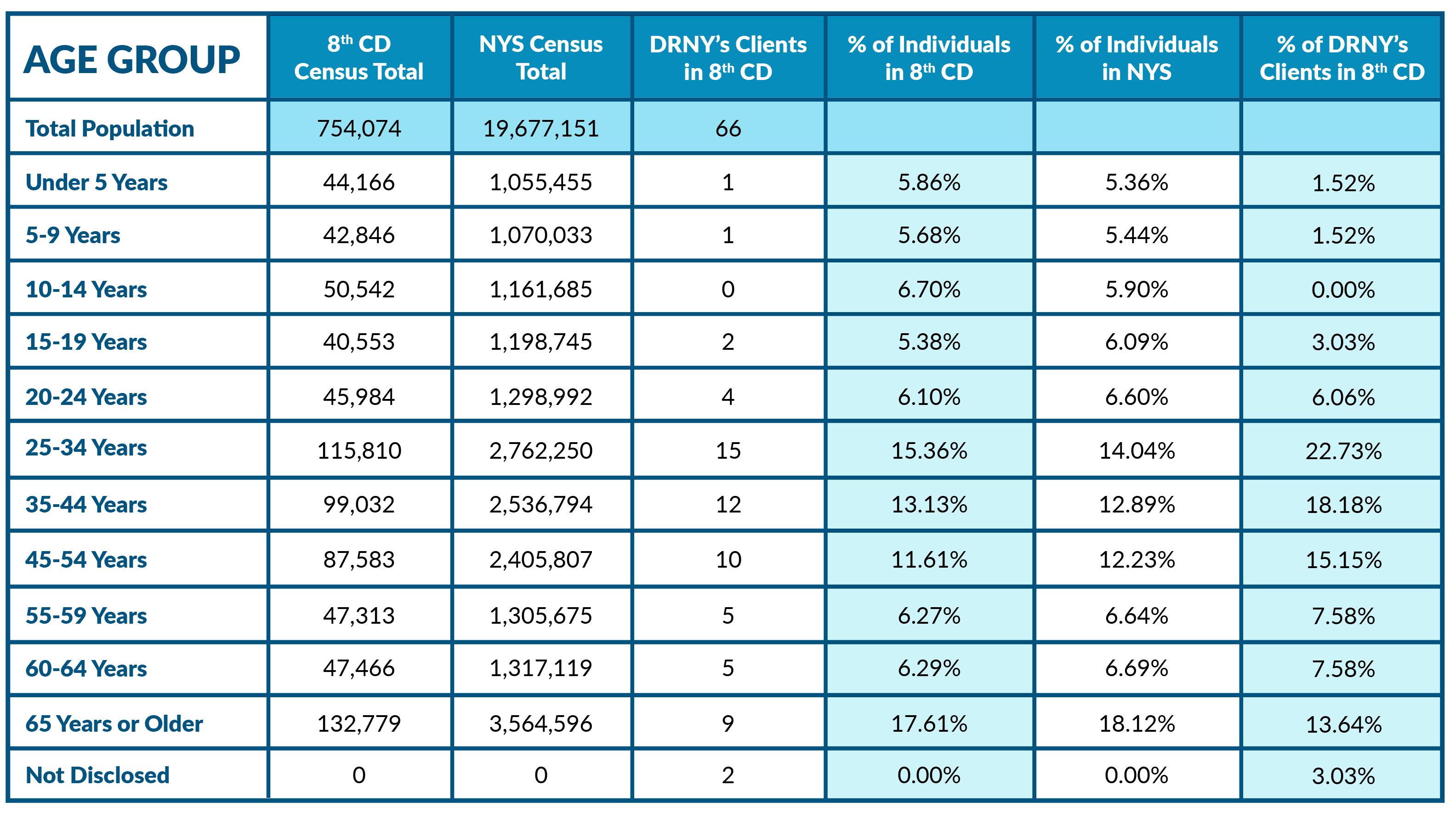
Clients from Under-Represented Groups
DRNY affirmatively seeks to provide services to historically under-represented groups. The following charts compare race and ethnicity demographics for the entire State of New York with that of DRNY’s clients.
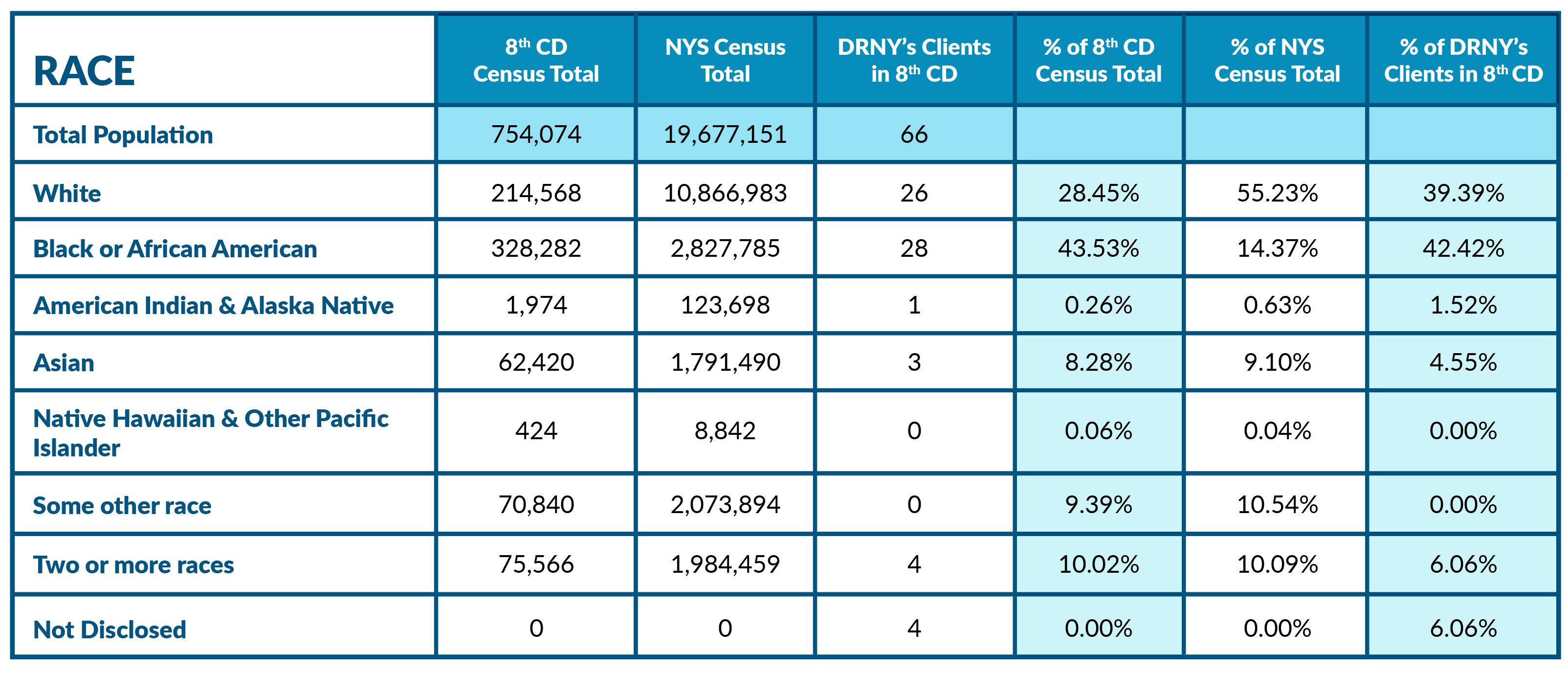

SERVICE REQUESTS
There were a total 69 service requests in this reporting period. DRNY provided full case services in 17 of the requests or 24.64%. DRNY provided Information and Referral (I&R) services to the remaining 52 requests.
DRNY makes appropriate referrals to other agencies in those matters where the issues are outside DRNY’s priorities, or because DRNY lacks the resources to undertake the matter. DRNY also provides information regarding the clients’ rights and available options. These matters vary from consumer financial issues, evictions, or other legal issues that are unrelated to the client’s disability.
Service Requests by Program
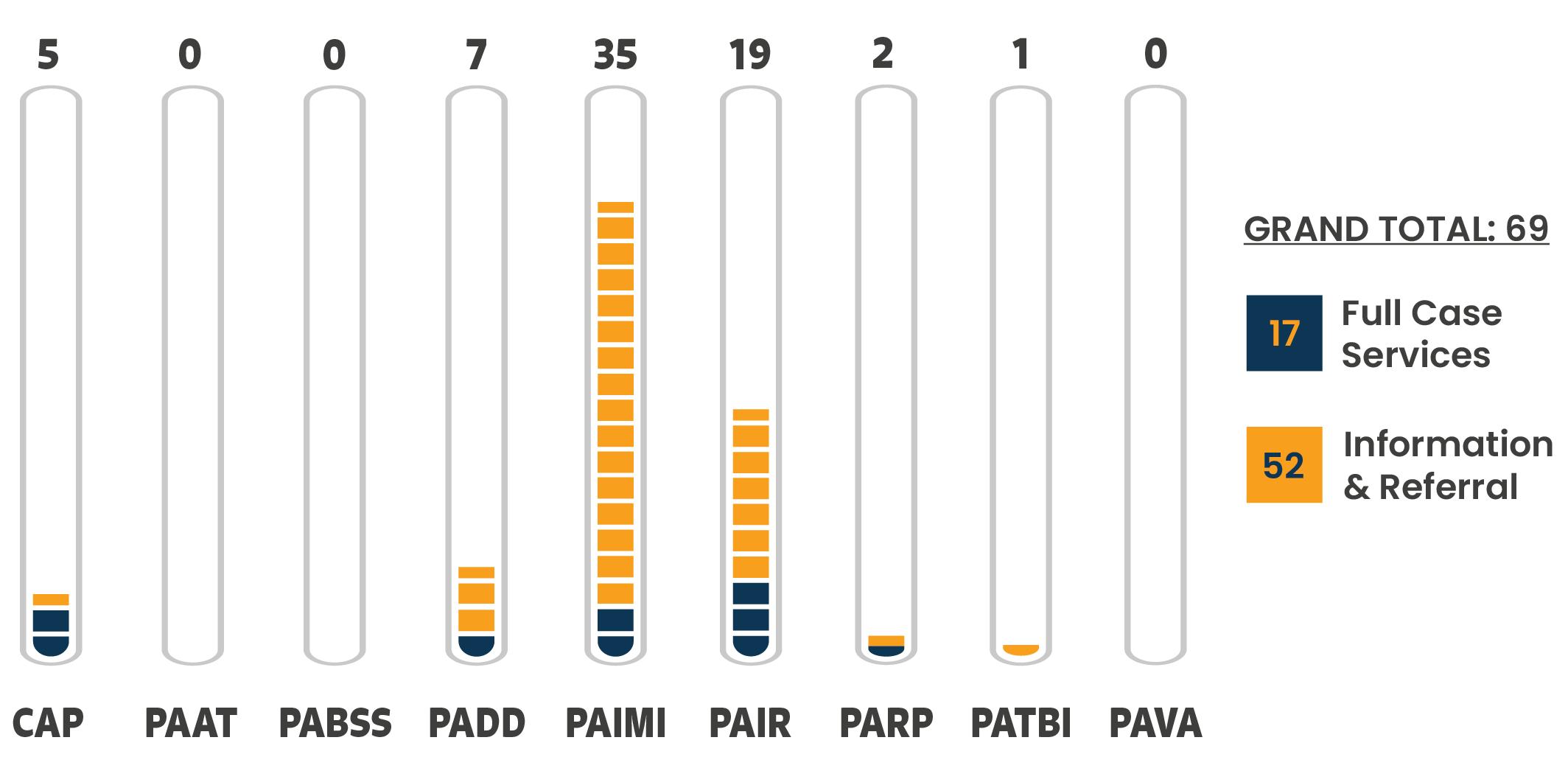
Response Time to Service Requests
8 of these Service Requests were resolved in less than 7 DAYS
4 of these Service Requests were resolved in less than 14 DAYS

REPRESENTATIVE ISSUE

Family Able to Live Together
Living with family in a community setting is the best way to ensure that a person needing medical services will thrive.
The grandmother of an 18-year-old young man who had been languishing in a nursing home in New Jersey for years wanted to bring him home to live with her. However, because of her age, she needed in-home support to make it happen.
We successfully navigated Medicaid hurdles, including the New York City Immediate Needs Home Care Services Program. In doing so, we secured 24-hour-per-day personal care services so that her grandson can have the round-the-clock care he needs. Thanks to our advocacy, this grandmother and grandson can live together as a family.
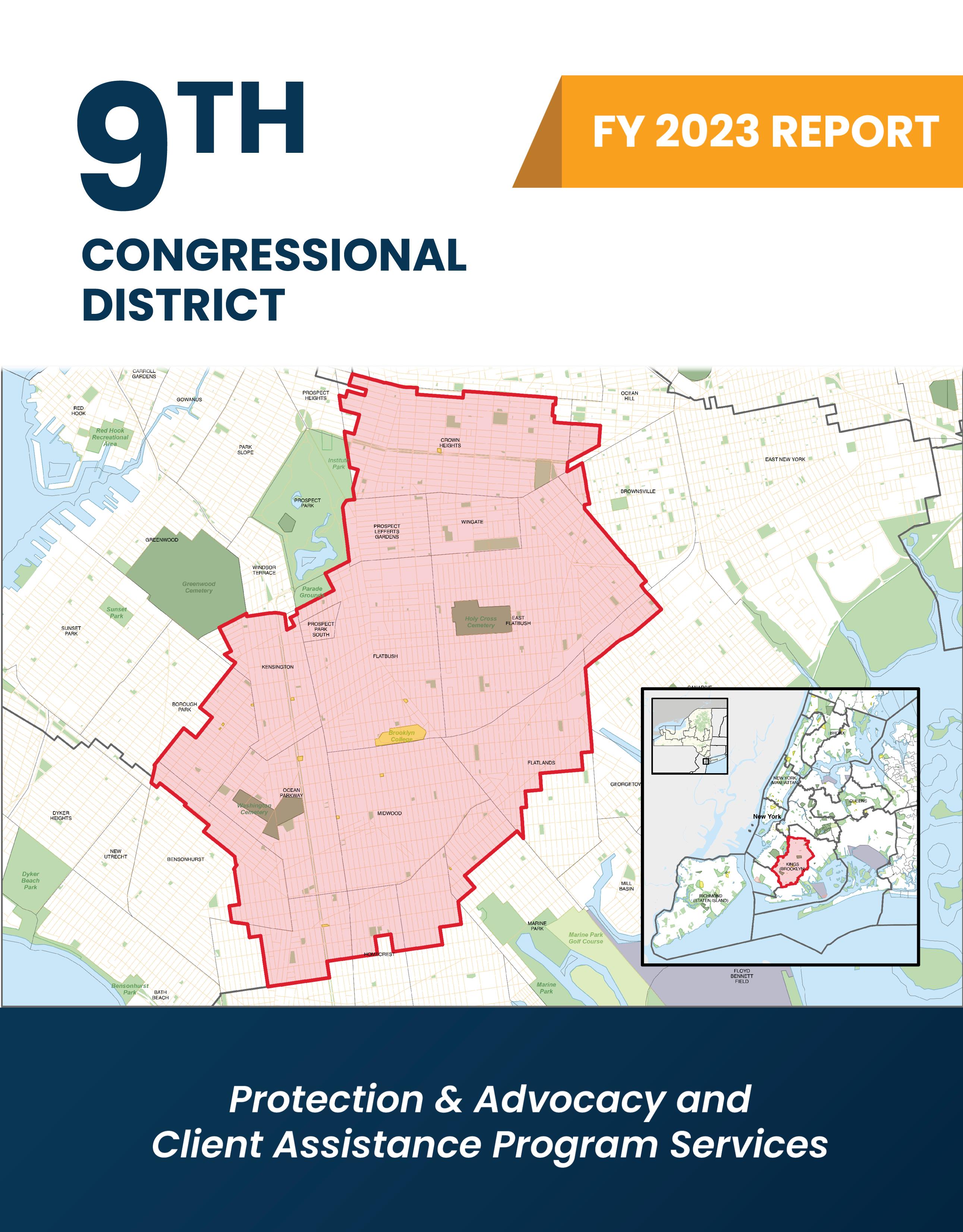
OUR CLIENTS
Over this 12 month period, DRNY averaged 6 Service Requests per month from individuals in your District. According to the most recent U.S. Census Bureau estimates, there are 91,315 individuals with disabilities living in the 9th Congressional District and DRNY has handled 74 Service Requests for 68 distinct clients living in those 18 zip codes.
Clients by Age
In your district DRNY assisted some of the most vulnerable individuals. 8 unique clients were residents of nursing homes, hospitals, correctional facilities, rehabilitation facilities, and youth-focused residential facilities. Of the residents living in the community, 6 or nearly 10.53% of DRNY’s unique clients were under 18. According to census data, individuals under 18 account for 5.86% of civilian, non-institutionalized individuals with a disability.
The following table shows that 22.06% of DRNY’s clients are age 55 or older. *Demographic information is not required to receive DRNY services.

Clients from Under-Represented Groups
DRNY affirmatively seeks to provide services to historically under-represented groups. The following charts compare race and ethnicity demographics for the entire State of New York with that of DRNY’s clients.


SERVICE REQUESTS
There were a total 74 service requests in this reporting period. DRNY provided full case services in 12 of the requests or 16.22%. DRNY provided Information and Referral (I&R) services to the remaining 62 requests.
DRNY makes appropriate referrals to other agencies in those matters where the issues are outside DRNY’s priorities, or because DRNY lacks the resources to undertake the matter. DRNY also provides information regarding the clients’ rights and available options. These matters vary from consumer financial issues, evictions, or other legal issues that are unrelated to the client’s disability.
Service Requests by Program
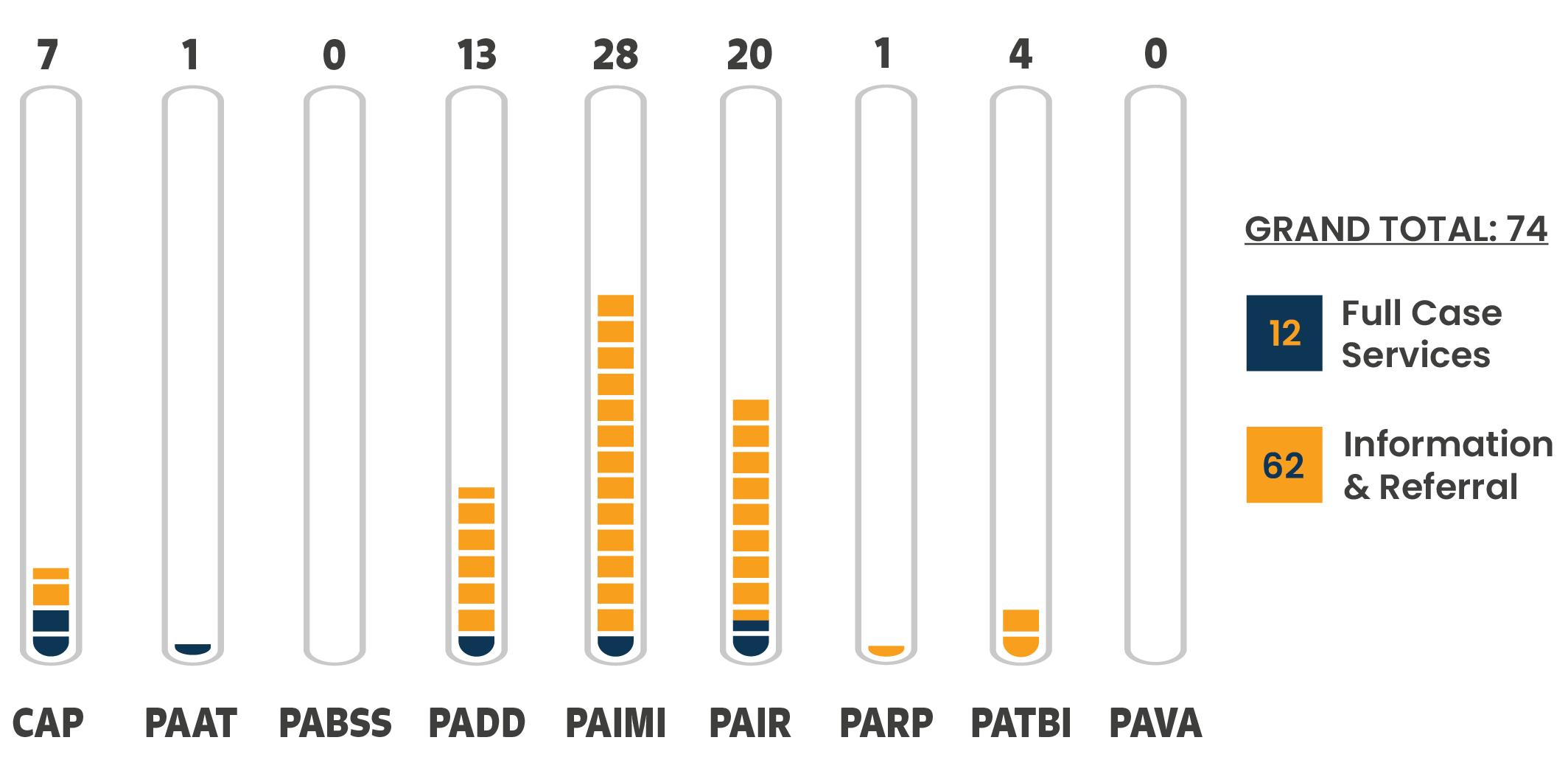
Response Time to Service Requests
12 of these Service Requests were resolved in less than 7 DAYS
11 of these Service Requests were resolved in less than 14 DAYS

REPRESENTATIVE ISSUE
Student Accommodated on Licensing Exam

To become licensed as a social worker, individuals are required to pass a demanding exam administered by the Association of Social Work Boards (ASWB). After thoroughly preparing for her exam, a young woman needed a reasonable accommodation to complete it successfully.
We advocated for specific testing accommodations, including increased font size for the test, additional time, the ability to take the exam at home, or the ability to visit the test center to confirm accommodations beforehand if she decided to go in person.
As a result of this advocacy, ASWB offered the young woman two sets of accommodation options. One set is for in-person testing at a test center, and the other is for at-home remote testing. She chose the at-home remote testing option. ASWB agreed to grant all her requested accommodations for at-home remote testing, including the ability to test the accommodations before the exam.
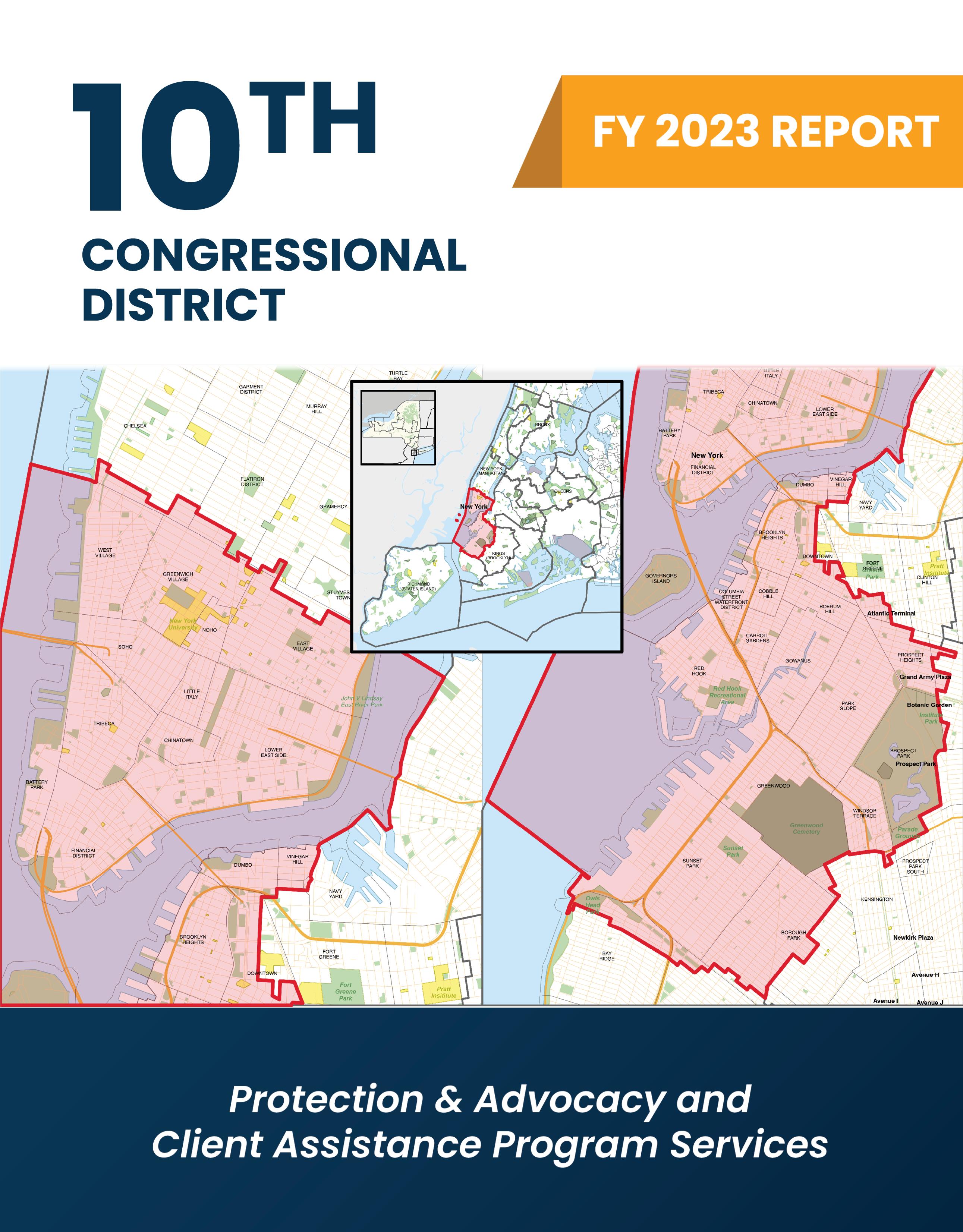
OUR CLIENTS
Over this 12 month period, DRNY averaged 5 Service Requests per month from individuals in your District. According to the most recent U.S. Census Bureau estimates, there are 67,718 individuals with disabilities living in the 10th Congressional District and DRNY has handled 63 Service Requests for 56 distinct clients living in those 17 zip codes.
Clients by Age
In your district DRNY assisted some of the most vulnerable individuals. 9 unique clients were residents of nursing homes, hospitals, correctional facilities, rehabilitation facilities, and youth-focused residential facilities. Of the residents living in the community, 5 or nearly 11.11% of DRNY’s unique clients were under 18. According to census data, individuals under 18 account for 7.31% of civilian, noninstitutionalized individuals with a disability.
The following table shows that 26.79% of DRNY’s clients are age 55 or older. *Demographic information is not required to receive DRNY services.
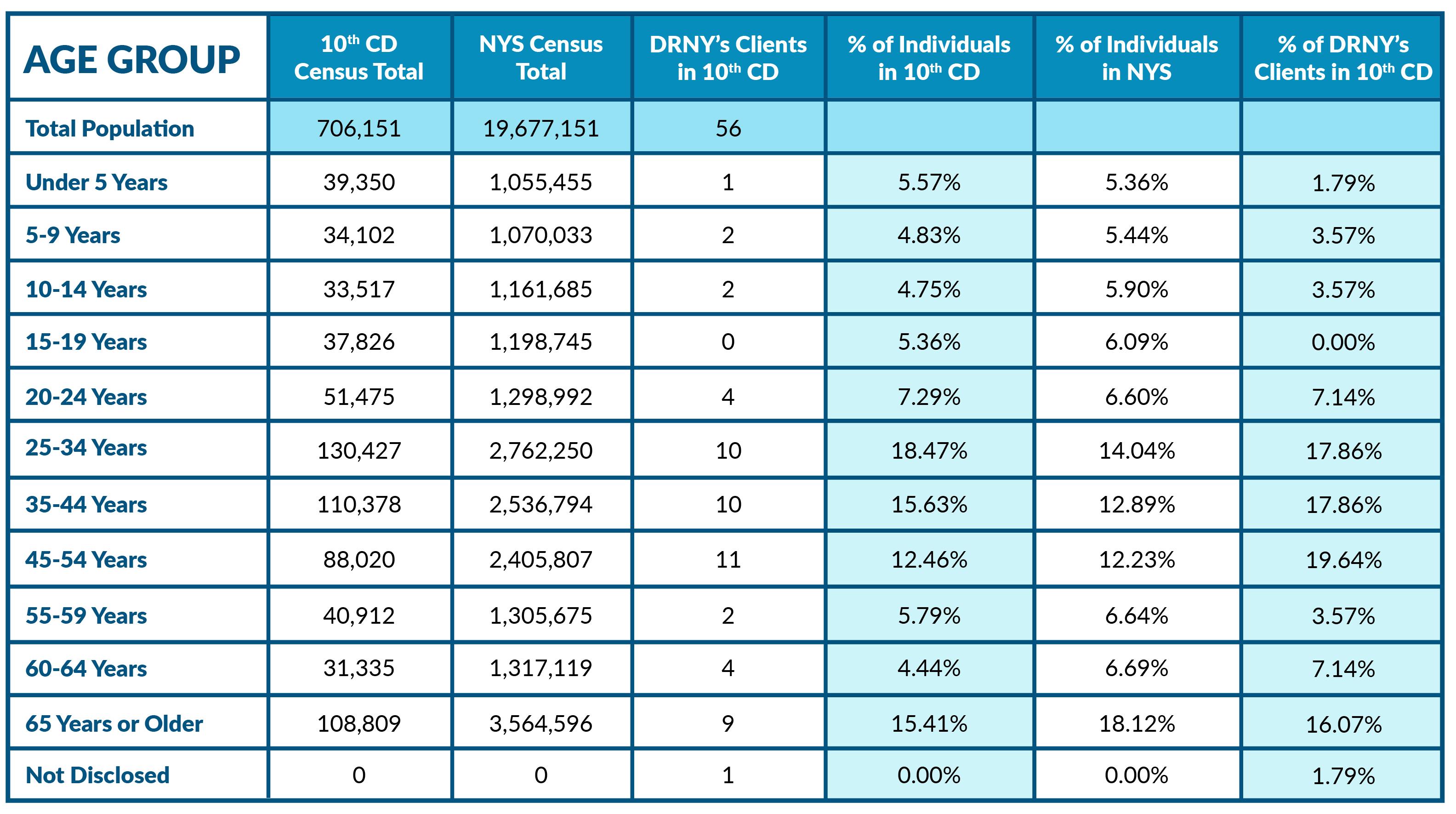
Clients from Under-Represented Groups
DRNY affirmatively seeks to provide services to historically under-represented groups. The following charts compare race and ethnicity demographics for the entire State of New York with that of DRNY’s clients.
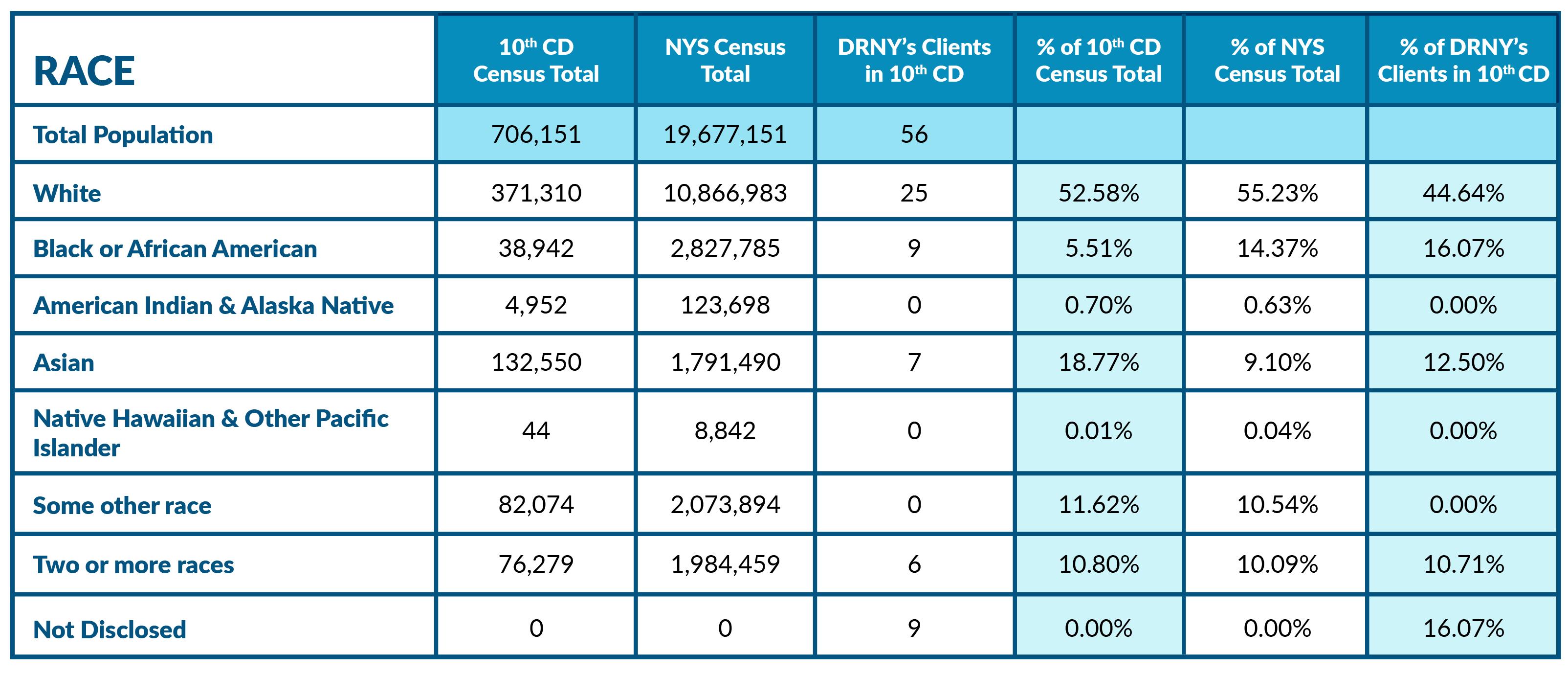

SERVICE REQUESTS
There were a total 63 service requests in this reporting period. DRNY provided full case services in 14 of the requests or 22.22%. DRNY provided Information and Referral (I&R) services to the remaining 49 requests.
DRNY makes appropriate referrals to other agencies in those matters where the issues are outside DRNY’s priorities, or because DRNY lacks the resources to undertake the matter. DRNY also provides information regarding the clients’ rights and available options. These matters vary from consumer financial issues, evictions, or other legal issues that are unrelated to the client’s disability.
Service Requests by Program
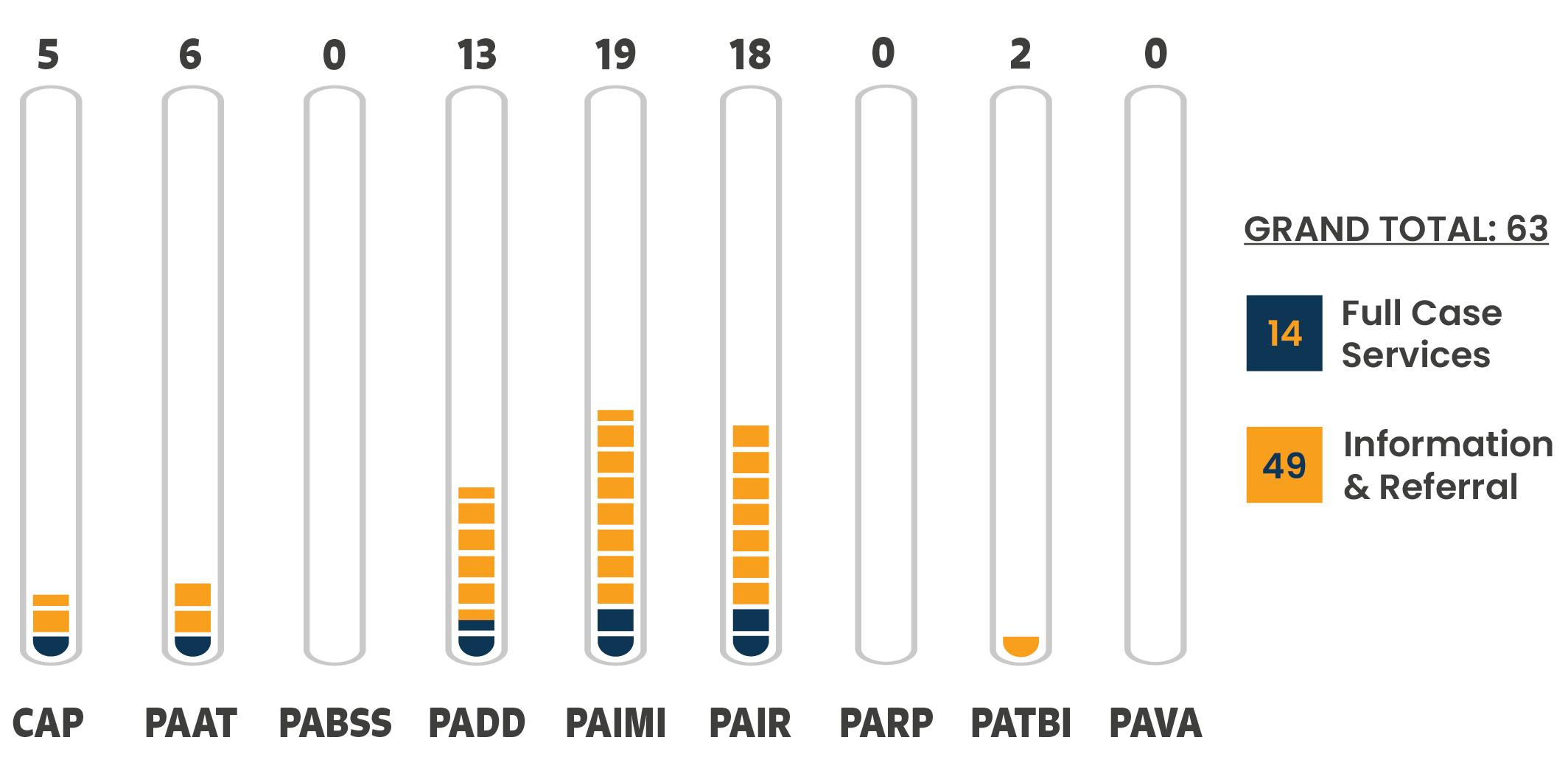
Response Time to Service Requests
10 of these Service Requests were resolved in less than 7 DAYS
4 of these Service Requests were resolved in less than 14 DAYS

REPRESENTATIVE ISSUE
Reasonable Modification to Bathroom

When it comes to bathroom modifications, the necessary changes are made to promote accessibility and safety.
A woman needed assistance requesting reasonable modifications to her bathroom from her landlord. She requested a walk-in shower and that her bathroom door be widened. In response to our advocacy, her property owner offered to hire a licensed contractor to cut a door in the side of her bathtub to allow her access and provide grab bars and a bath chair.
The property owner also offered to remove the door from her bathroom, as this solution had previously worked to allow her better access to other rooms in her unit.
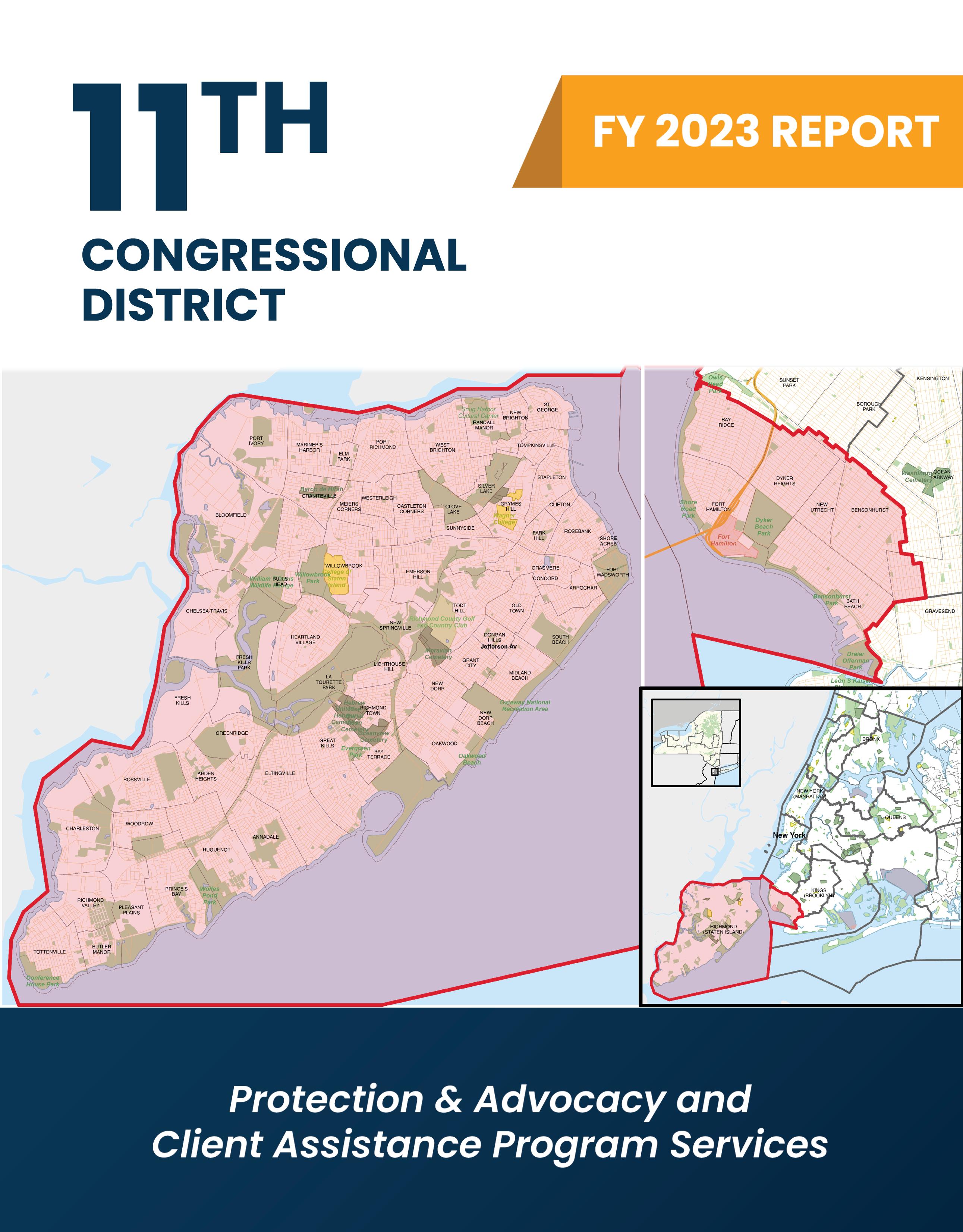
OUR CLIENTS
Over this 12 month period, DRNY averaged 6 Service Requests per month from individuals in your District. According to the most recent U.S. Census Bureau estimates, there are 85,144 individuals with disabilities living in the 11th Congressional District and DRNY has handled 66 Service Requests for 56 distinct clients living in those 19 zip codes.
Clients by Age
In your district DRNY assisted some of the most vulnerable individuals. 5 unique clients were residents of nursing homes, hospitals, correctional facilities, rehabilitation facilities, and youth-focused residential facilities. Of the residents living in the community, 6 or nearly 12.00% of DRNY’s unique clients were under 18. According to census data, individuals under 18 account for 5.36% of civilian, non-institutionalized individuals with a disability.
The following table shows that 28.57% of DRNY’s clients are age 55 or older. *Demographic information is not required to receive DRNY services.
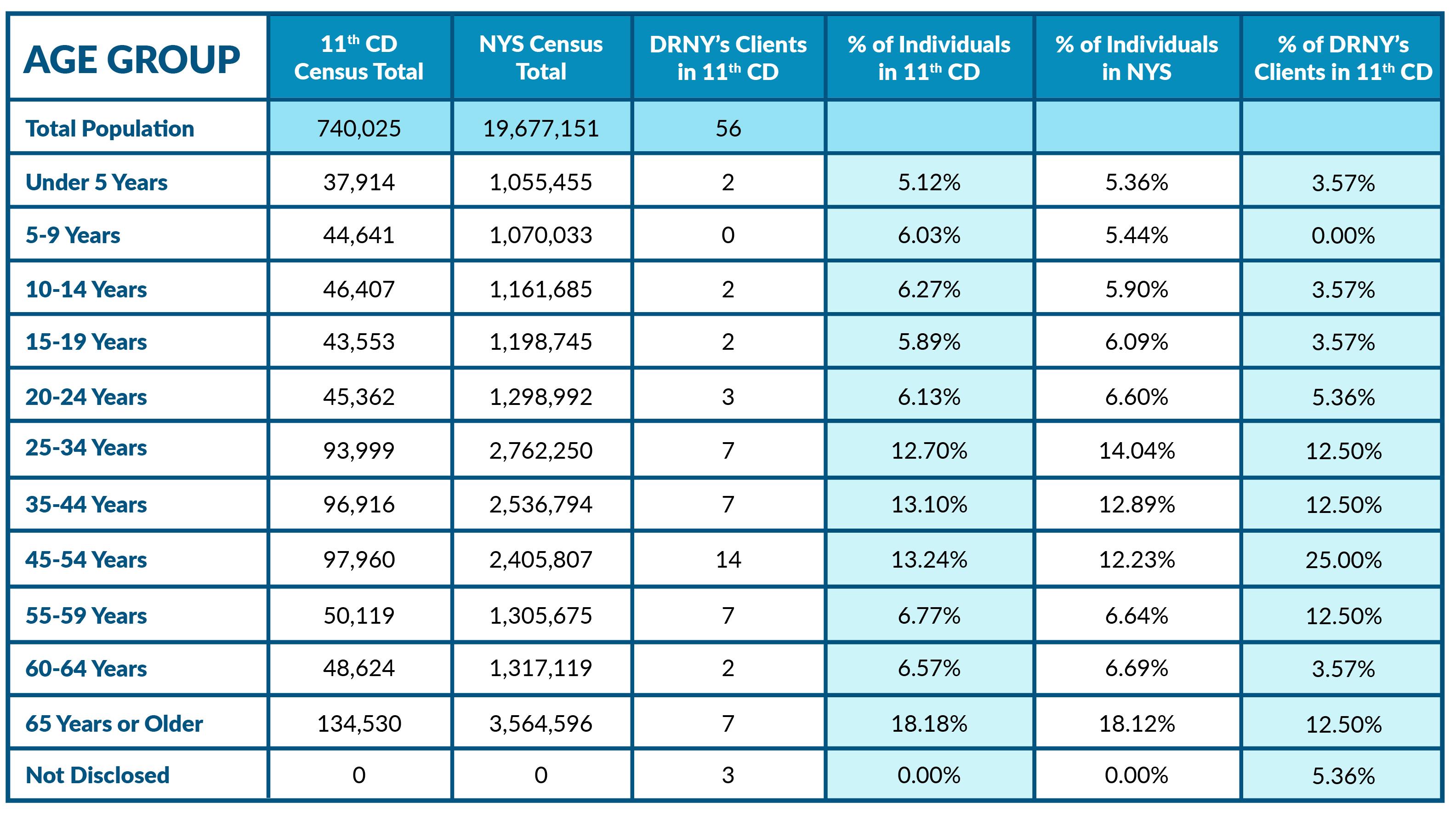
Clients from Under-Represented Groups
DRNY affirmatively seeks to provide services to historically under-represented groups. The following charts compare race and ethnicity demographics for the entire State of New York with that of DRNY’s clients.
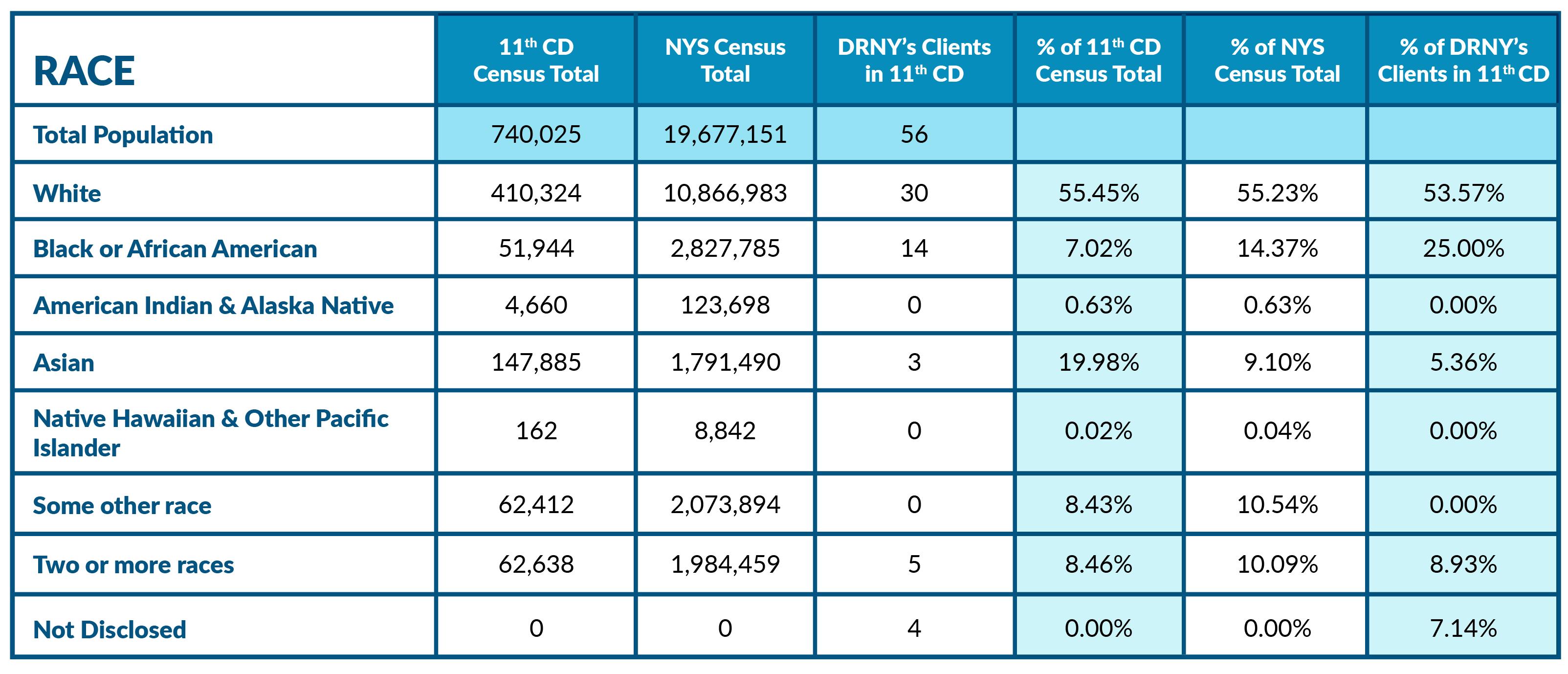

SERVICE REQUESTS
There were a total 66 service requests in this reporting period. DRNY provided full case services in 10 of the requests or 15.15%. DRNY provided Information and Referral (I&R) services to the remaining 56 requests.
DRNY makes appropriate referrals to other agencies in those matters where the issues are outside DRNY’s priorities, or because DRNY lacks the resources to undertake the matter. DRNY also provides information regarding the clients’ rights and available options. These matters vary from consumer financial issues, evictions, or other legal issues that are unrelated to the client’s disability.
Service Requests by Program
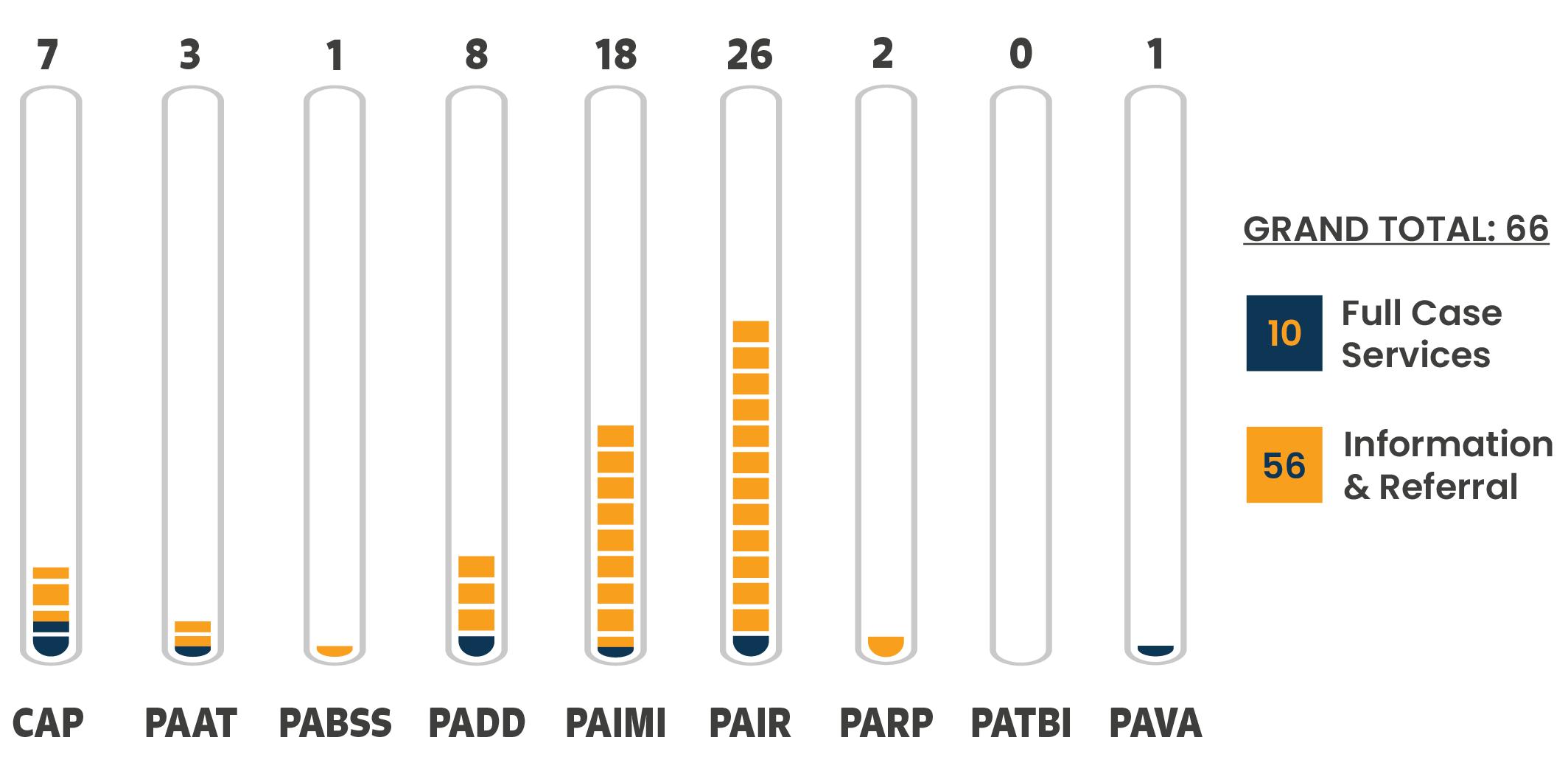
Response Time to Service Requests
9 of these Service Requests were resolved in less than 7 DAYS
3 of these Service Requests were resolved in less than 14 DAYS

REPRESENTATIVE ISSUE

Criminal Court Advocacy
It can be especially difficult when dealing with a complex situation like navigating the legal system. Adding the stress of job searching can make the situation even more challenging.
We had the opportunity to advocate for a man dealing with a pending criminal matter who was also struggling to secure a job through Adult Career and Continuing Education Services-Vocational Rehabilitation (ACCES-VR).
Although he was entitled to the Office for People with Developmental Disabilities (OPWDD) waiver services, he had not yet received it. We collaborated with his attorney and helped him obtain that waiver.
Despite facing various frustrating roadblocks and delays, he was ultimately able to begin a job through ACESS-VR and receive counseling services, which eventually led to the criminal charges being dropped.
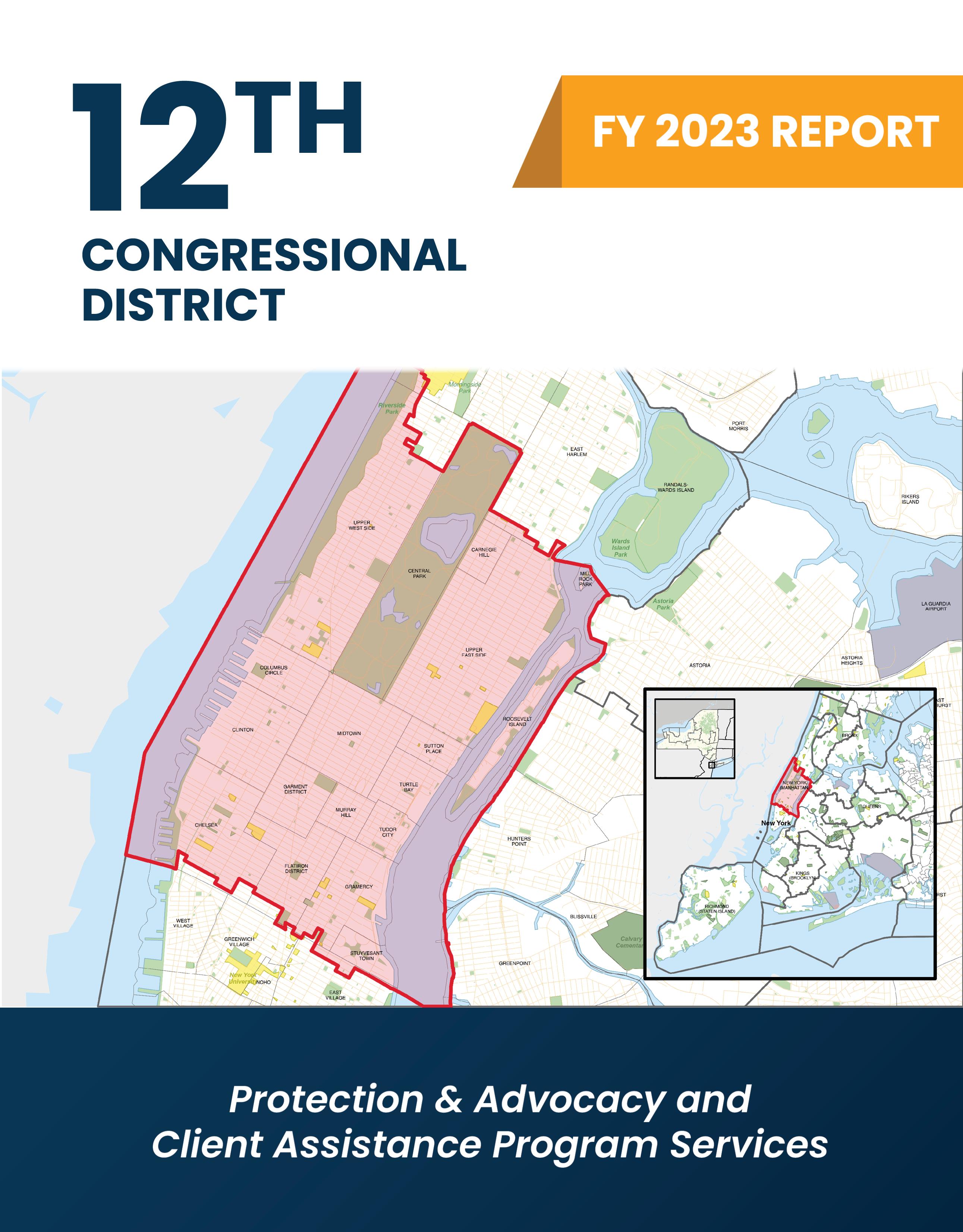
OUR CLIENTS
Over this 12 month period, DRNY averaged 7 Service Requests per month from individuals in your District. According to the most recent U.S. Census Bureau estimates, there are 66,857 individuals with disabilities living in the 12th Congressional District and DRNY has handled 85 Service Requests for 74 distinct clients living in those 23 zip codes.
Clients by Age
In your district DRNY assisted some of the most vulnerable individuals. 5 unique clients were residents of nursing homes, hospitals, correctional facilities, rehabilitation facilities, and youth-focused residential facilities. Of the residents living in the community, 4 or nearly 6.06% of DRNY’s unique clients were under 18. According to census data, individuals under 18 account for 3.83% of civilian, non-institutionalized individuals with a disability.
The following table shows that 43.24% of DRNY’s clients are age 55 or older. *Demographic information is not required to receive DRNY services.

Clients from Under-Represented Groups
DRNY affirmatively seeks to provide services to historically under-represented groups. The following charts compare race and ethnicity demographics for the entire State of New York with that of DRNY’s clients.
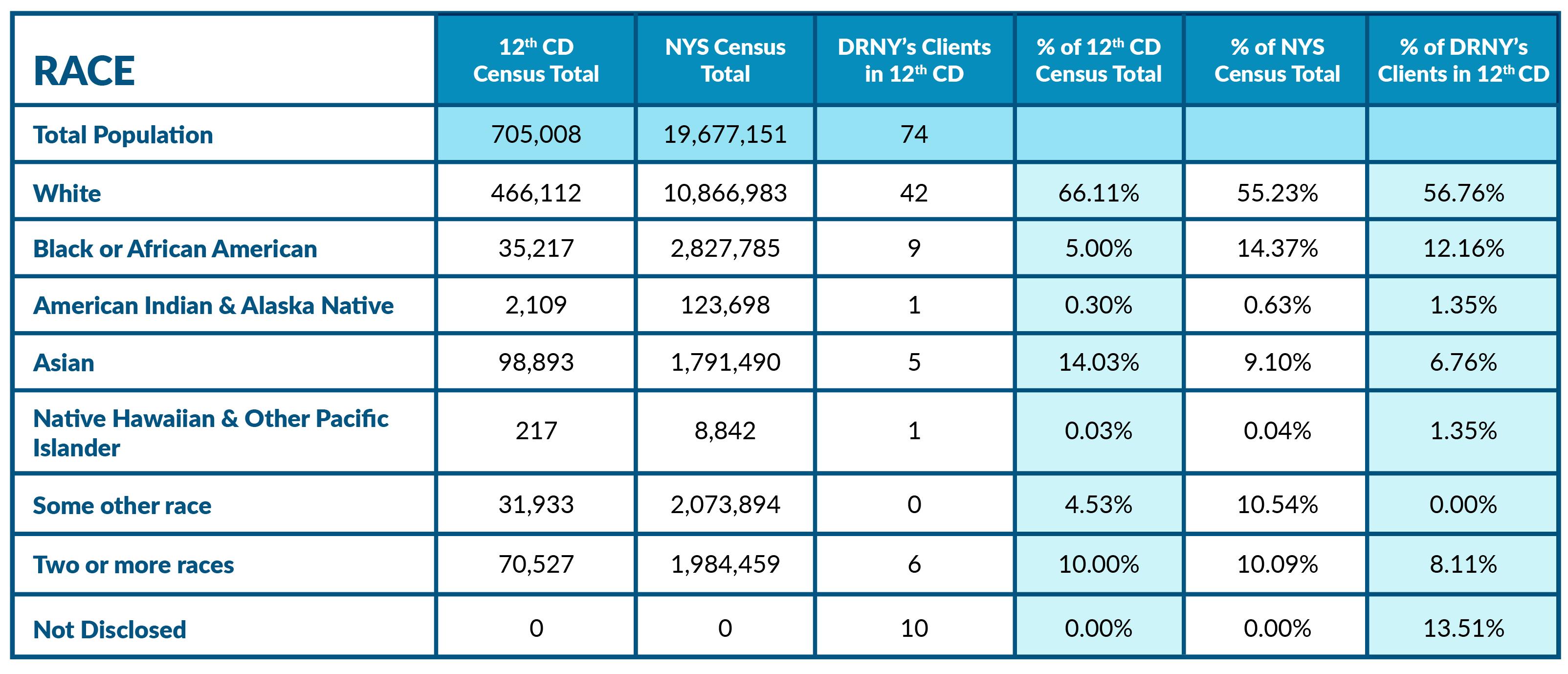

SERVICE REQUESTS
There were a total 85 service requests in this reporting period. DRNY provided full case services in 25 of the requests or 29.41%. DRNY provided Information and Referral (I&R) services to the remaining 60 requests.
DRNY makes appropriate referrals to other agencies in those matters where the issues are outside DRNY’s priorities, or because DRNY lacks the resources to undertake the matter. DRNY also provides information regarding the clients’ rights and available options. These matters vary from consumer financial issues, evictions, or other legal issues that are unrelated to the client’s disability.
Service Requests by Program
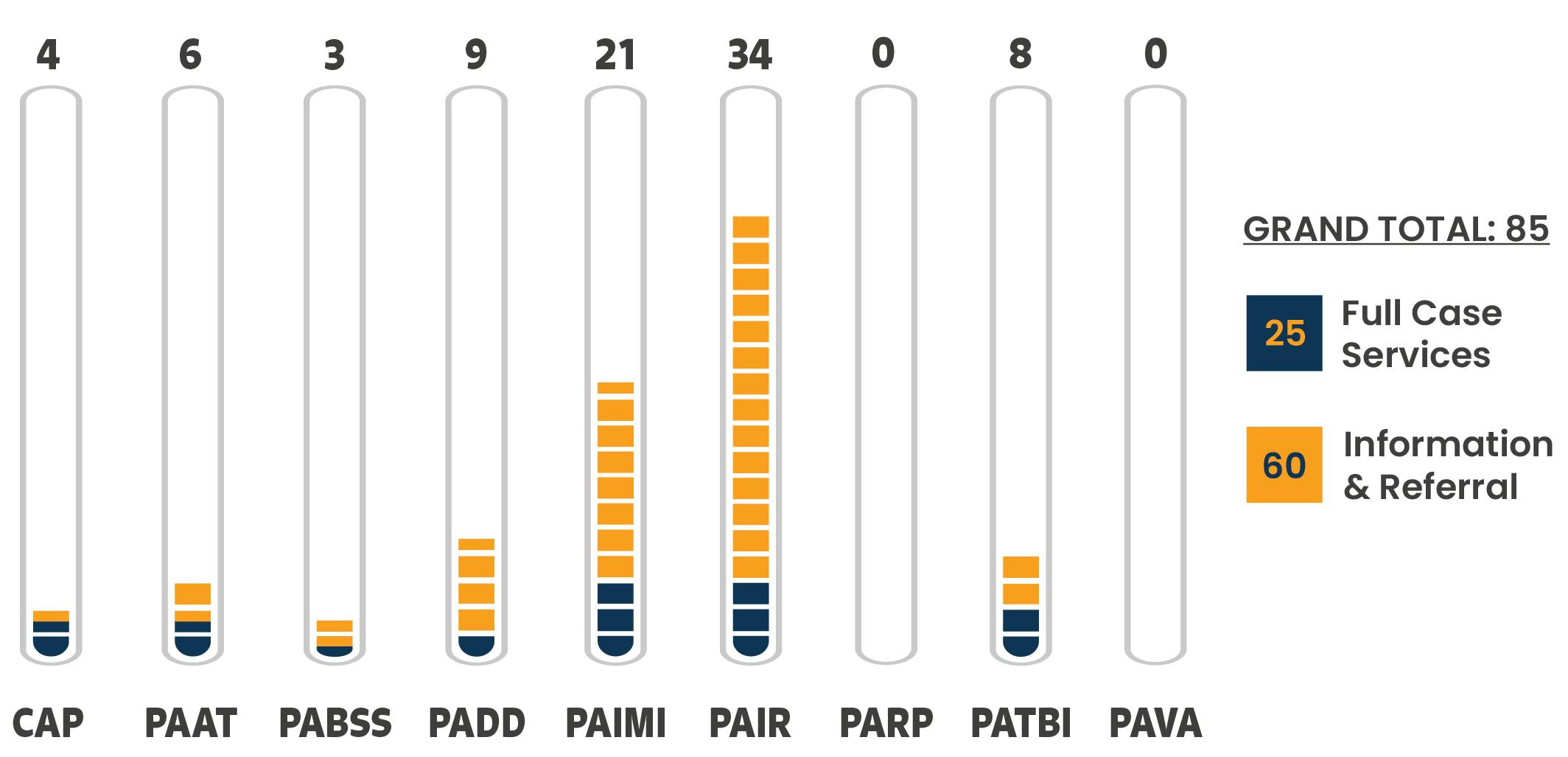
Response Time to Service Requests
of these Service Requests were resolved in less than 7 DAYS 13 of these Service Requests were resolved in less than 14 DAYS

REPRESENTATIVE ISSUE
Military Veteran Finally Receives Vertical Platform Lift

Starting in September 2020, we assisted a military veteran with a 100 percent serviceconnected disability in obtaining a vertical platform lift for his garden apartment entrance in New York City.
Before the Veterans Administration (VA) could install the lift, he needed a building permit from the NYC Department of Buildings. We worked with his landlord, expeditor, and architect to apply for the permit and finally, after multiple rejections and resubmissions, it was approved in April 2022.
Unfortunately, the VA hospital then claimed that the lift must be purchased from and installed by a “VA-approved vendor,” and they could not locate an approved vendor who would be willing to do the install.
The VA refused to provide any information about the approval process for vendors or any indication that they were actively searching for one. As a result of this delay, the building permit was set to expire.
We reached out to all potential contacts at the VA and other veteran support organizations for guidance. In early March 2023, we sent a stern email to the local VA hospital requesting information on their vendor procurement process, but they did not respond.
Finally, after a long and frustrating wait of 2.5 years, the lift was installed on March16, 2023. This allowed the veteran to leave his home safely and independently, and he can now enjoy a better quality of life.
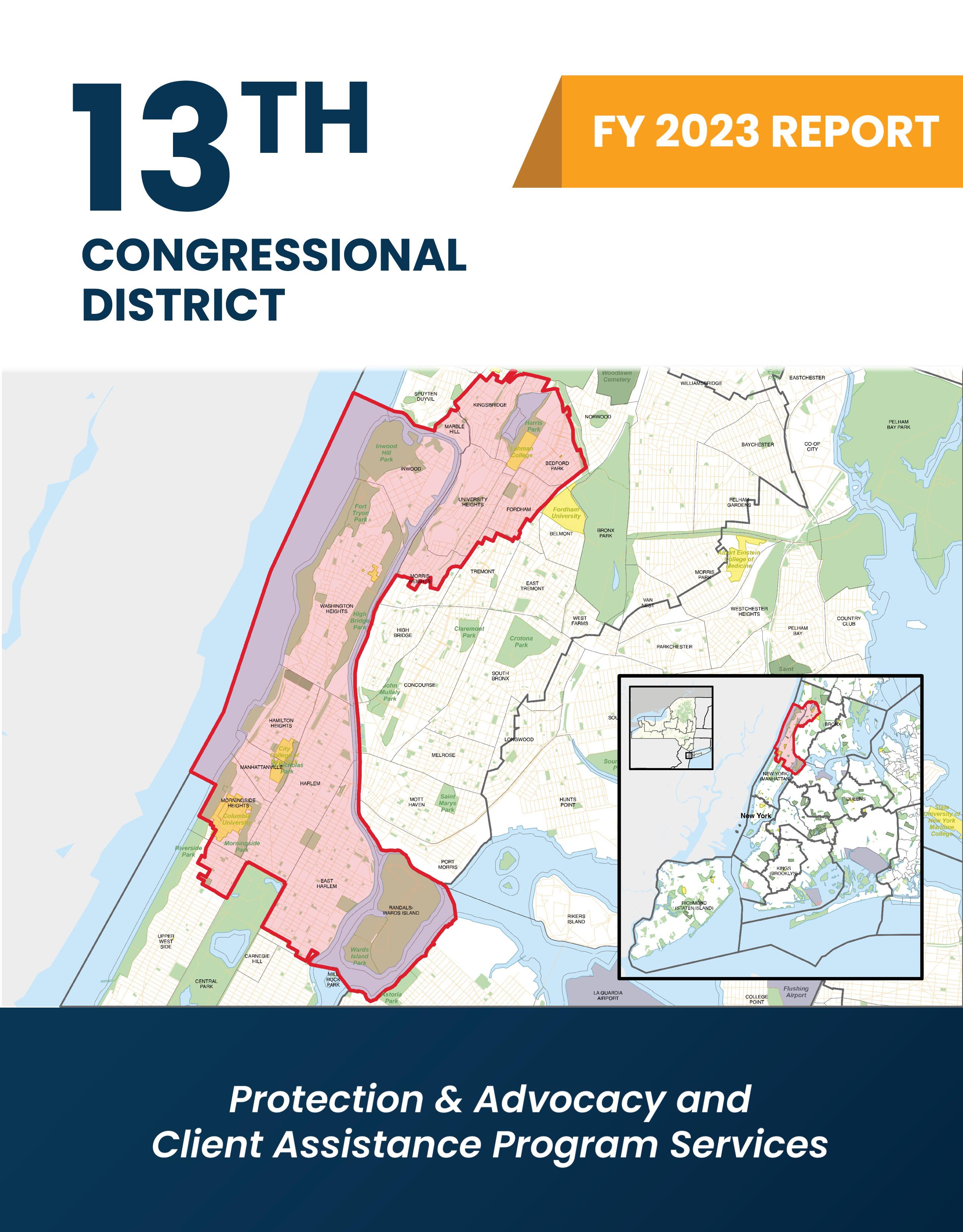
OUR CLIENTS
Over this 12 month period, DRNY averaged 11 Service Requests per month from individuals in your District. According to the most recent U.S. Census Bureau estimates, there are 123,755 individuals with disabilities living in the 13th Congressional District and DRNY has handled 135 Service Requests for 116 distinct clients living in those 20 zip codes.
Clients by Age
In your district DRNY assisted some of the most vulnerable individuals. 18 unique clients were residents of nursing homes, hospitals, correctional facilities, rehabilitation facilities, and youth-focused residential facilities. Of the residents living in the community, 7 or nearly 7.69% of DRNY’s unique clients were under 18. According to census data, individuals under 18 account for 9.53% of civilian, non-institutionalized individuals with a disability.
The following table shows that 30.17% of DRNY’s clients are age 55 or older. *Demographic information is not required to receive DRNY services.
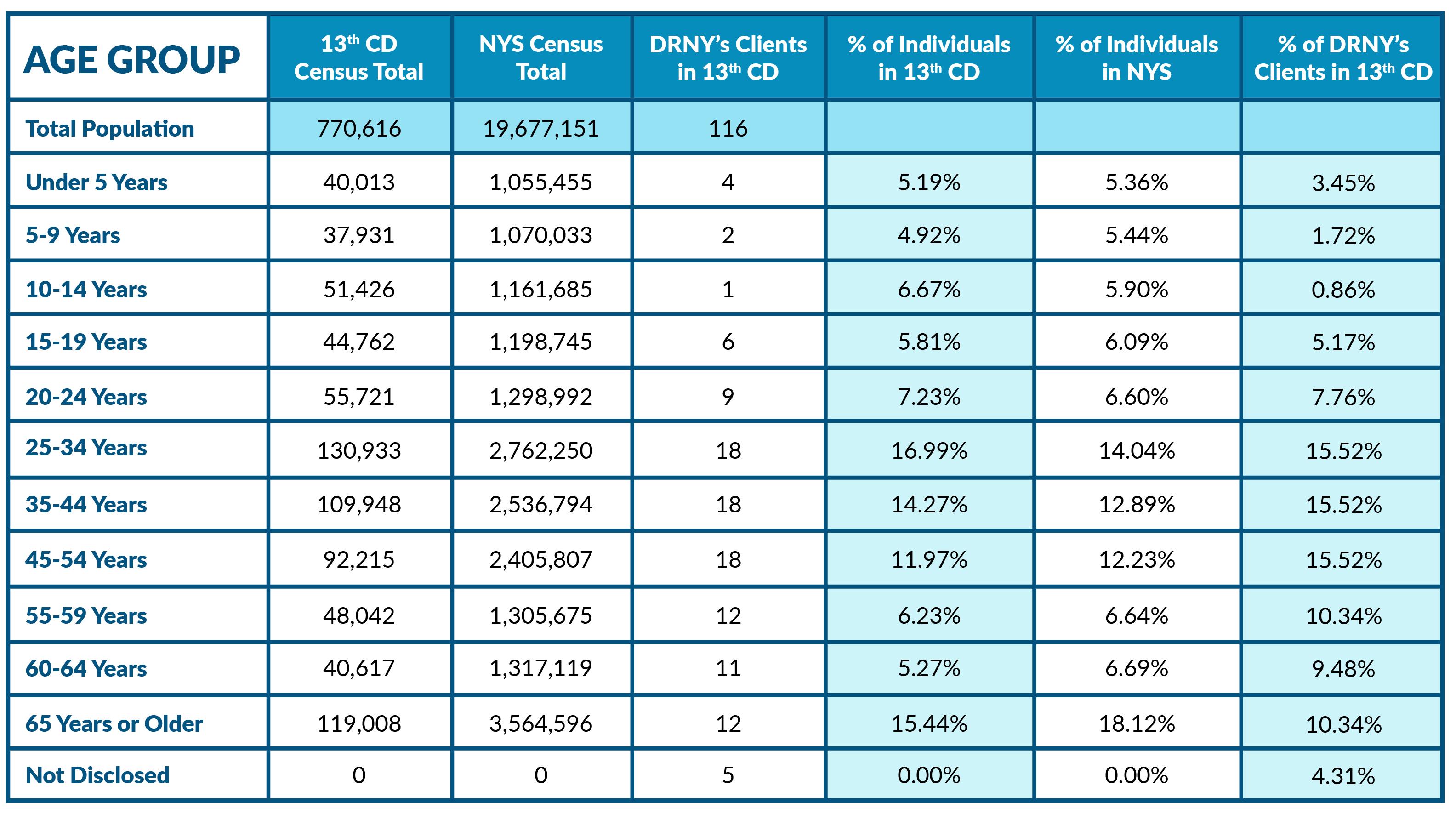
Clients from Under-Represented Groups
DRNY affirmatively seeks to provide services to historically under-represented groups. The following charts compare race and ethnicity demographics for the entire State of New York with that of DRNY’s clients.
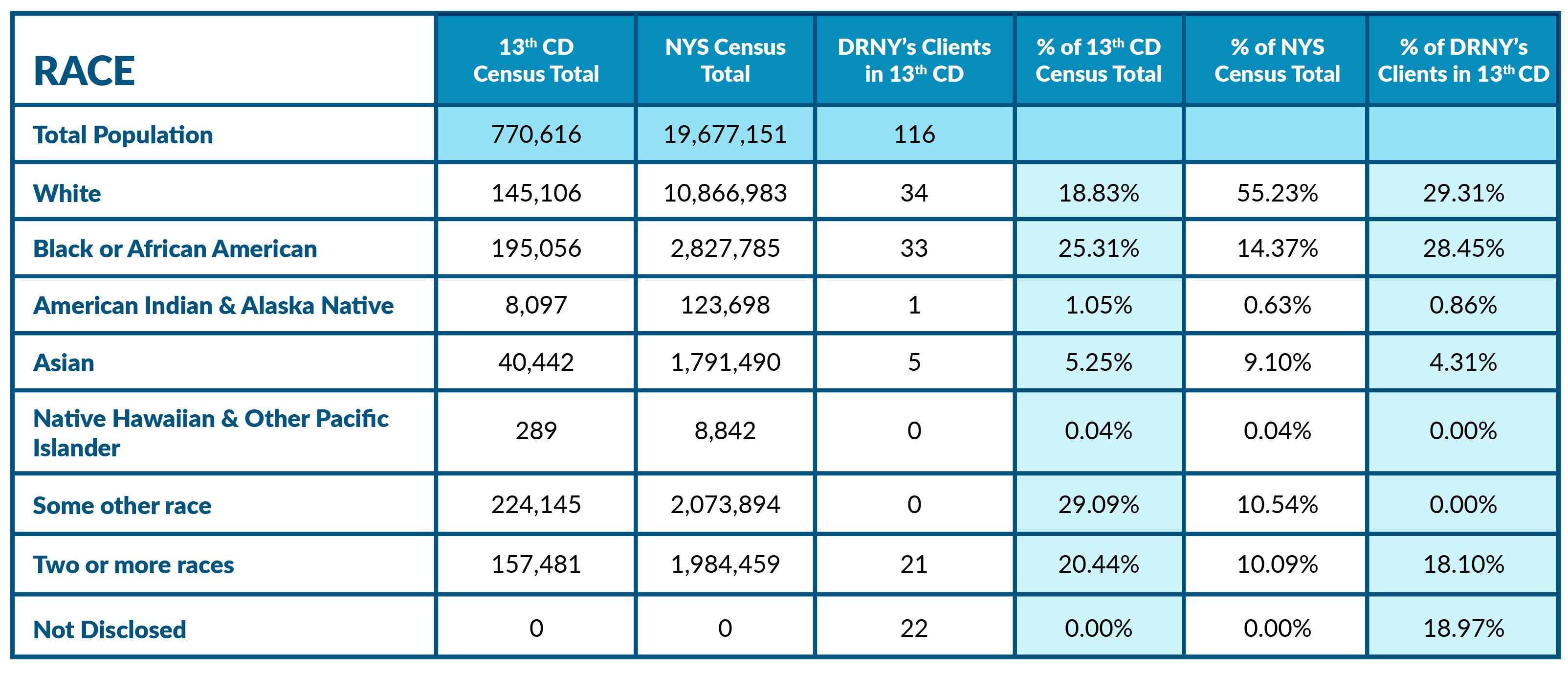

SERVICE REQUESTS
There were a total 135 service requests in this reporting period. DRNY provided full case services in 23 of the requests or 17.04%. DRNY provided Information and Referral (I&R) services to the remaining 112 requests.
DRNY makes appropriate referrals to other agencies in those matters where the issues are outside DRNY’s priorities, or because DRNY lacks the resources to undertake the matter. DRNY also provides information regarding the clients’ rights and available options. These matters vary from consumer financial issues, evictions, or other legal issues that are unrelated to the client’s disability.
Service Requests by Program
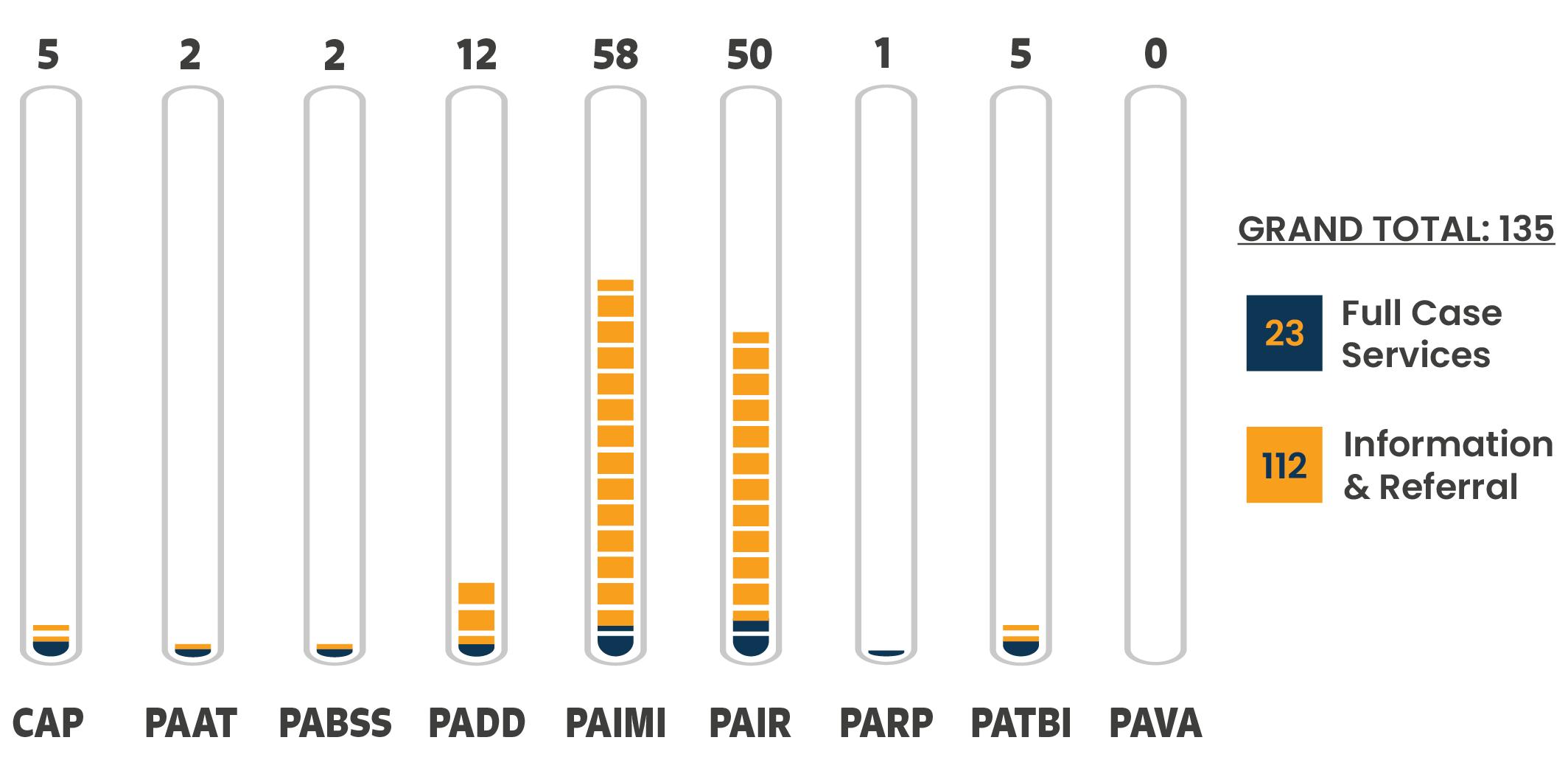
Response Time to Service Requests
19 of these Service Requests were resolved in less than 7 DAYS
11 of these Service Requests were resolved in less than 14 DAYS

REPRESENTATIVE ISSUE

Ramp for Entrance of Apartment Building
Having limited or no access to the entrance of one’s own home is more than an inconvenience; it is illegal. However, a man with a mobility disability could not access his apartment building’s entrance because there was no ramp.
When we started our advocacy to ensure the placement of a ramp, we discovered that there had already been a previously negotiated Conciliation Agreement with the New York City Housing Resource Center (NYCHRC). Nonetheless, his building had violated the agreement. To make matters worse, the building had accumulated almost $250,000 in fees due to the violation.
We immediately informed the NYCHRC about the issue, and they promptly took action to enforce the agreement. As a result, the man finally received the ramp he desperately needed.
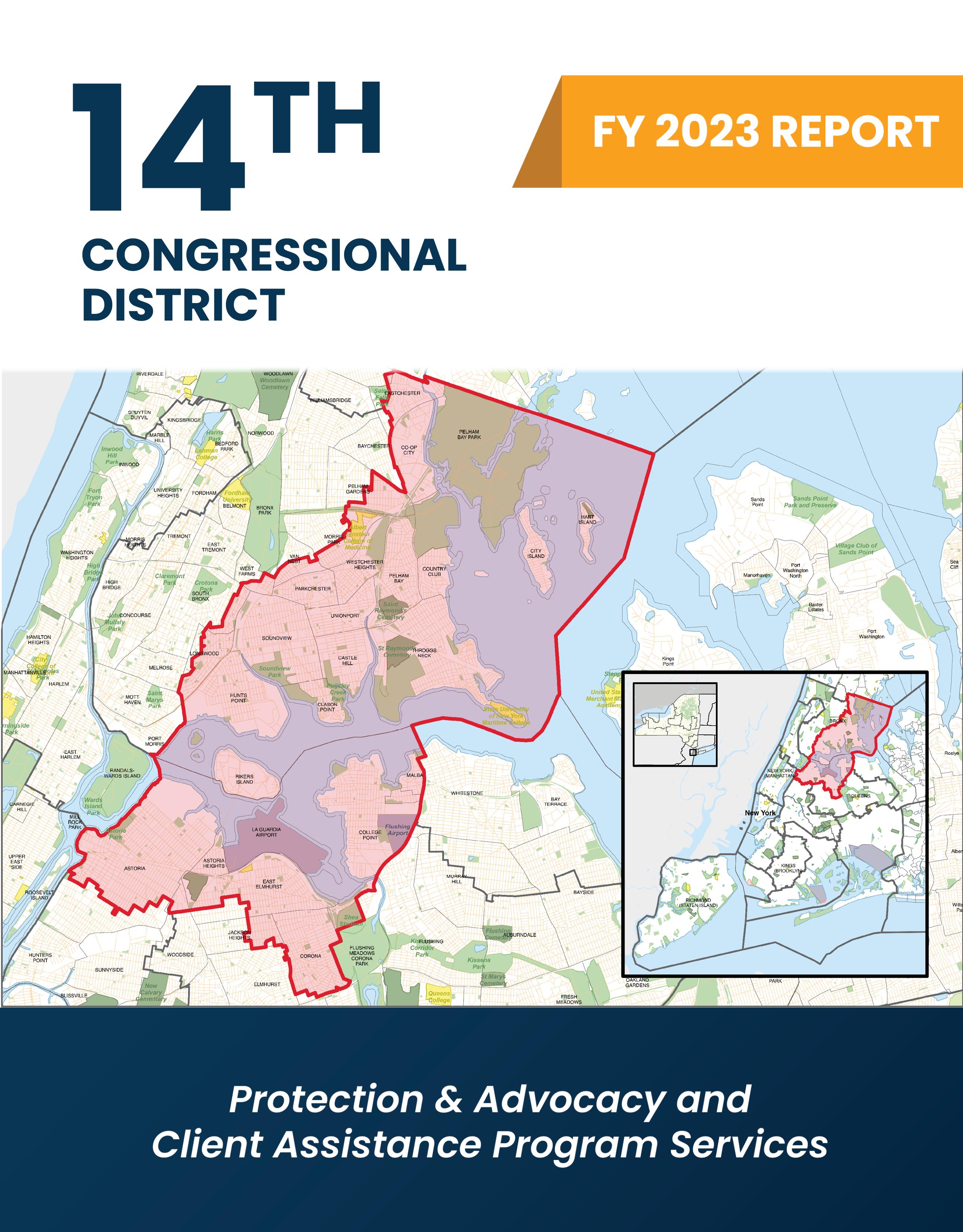
OUR CLIENTS
Over this 12 month period, DRNY averaged 5 Service Requests per month from individuals in your District. According to the most recent U.S. Census Bureau estimates, there are 102,216 individuals with disabilities living in the 14th Congressional District and DRNY has handled 58 Service Requests for 54 distinct clients living in those 19 zip codes.
Clients by Age
In your district DRNY assisted some of the most vulnerable individuals. 15 unique clients were residents of nursing homes, hospitals, correctional facilities, rehabilitation facilities, and youth-focused residential facilities. Of the residents living in the community, 5 or nearly 13.51% of DRNY’s unique clients were under 18. According to census data, individuals under 18 account for 7.17% of civilian, noninstitutionalized individuals with a disability.
The following table shows that 33.33% of DRNY’s clients are age 55 or older. *Demographic information is not required to receive DRNY services.
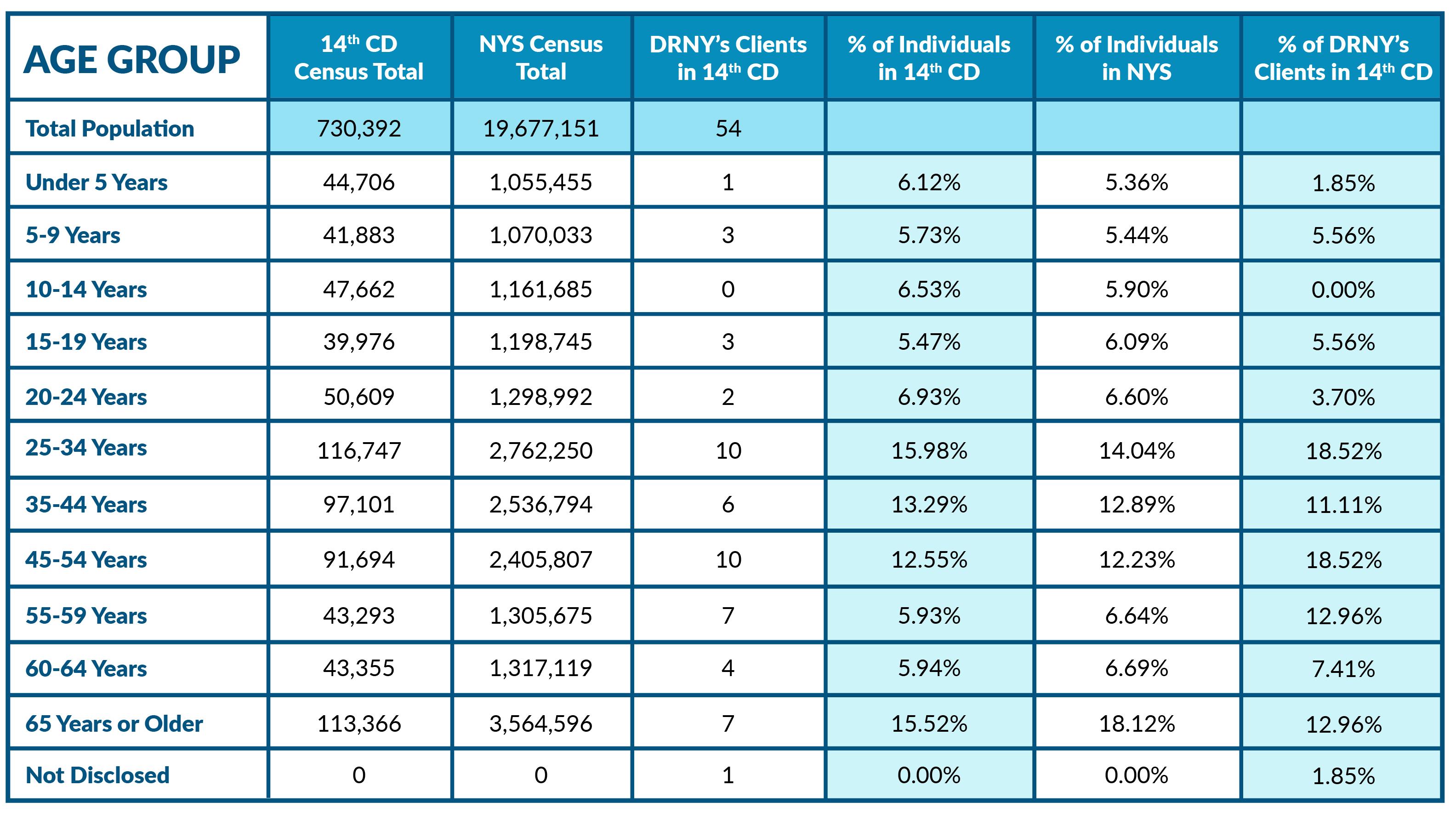
Clients from Under-Represented Groups
DRNY affirmatively seeks to provide services to historically under-represented groups. The following charts compare race and ethnicity demographics for the entire State of New York with that of DRNY’s clients.
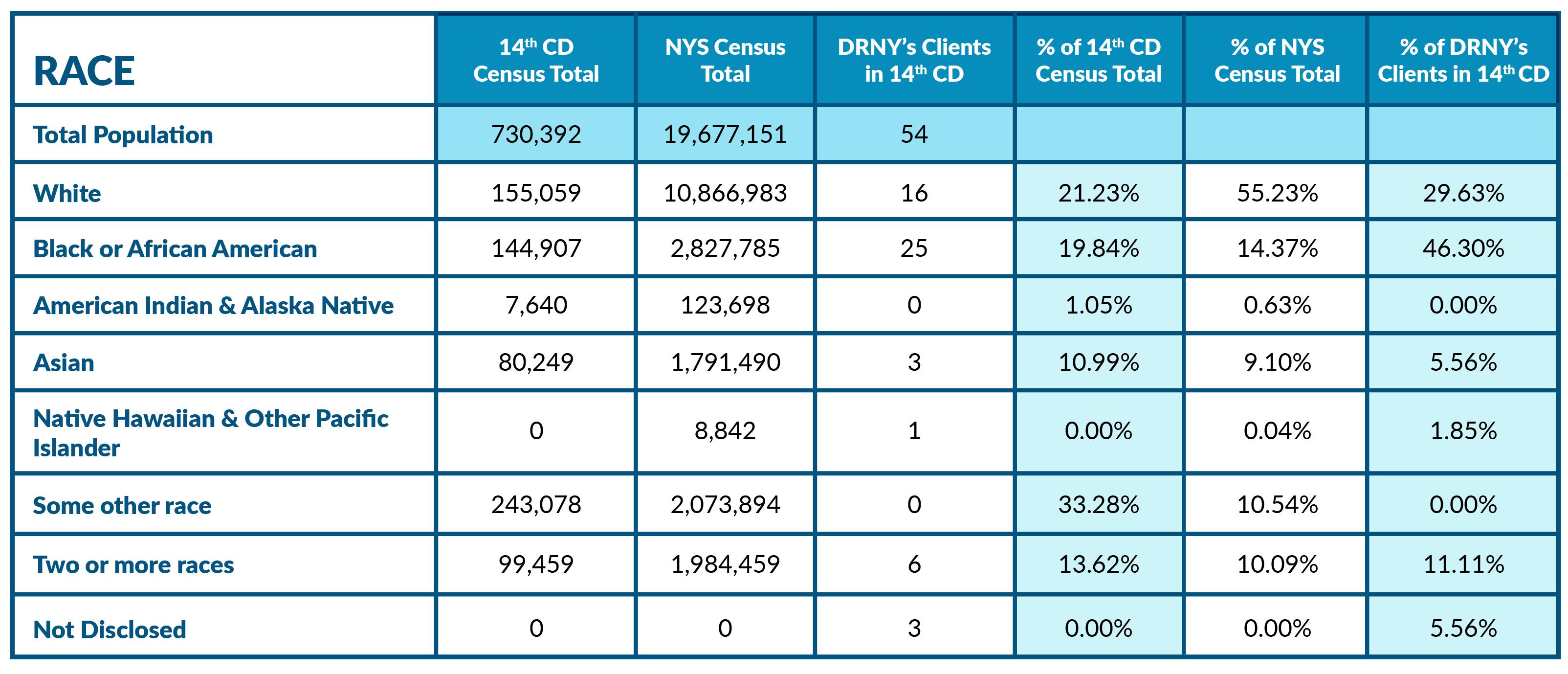

SERVICE REQUESTS
There were a total 58 service requests in this reporting period. DRNY provided full case services in 12 of the requests or 20.69%. DRNY provided Information and Referral (I&R) services to the remaining 46 requests.
DRNY makes appropriate referrals to other agencies in those matters where the issues are outside DRNY’s priorities, or because DRNY lacks the resources to undertake the matter. DRNY also provides information regarding the clients’ rights and available options. These matters vary from consumer financial issues, evictions, or other legal issues that are unrelated to the client’s disability.
Service Requests by Program
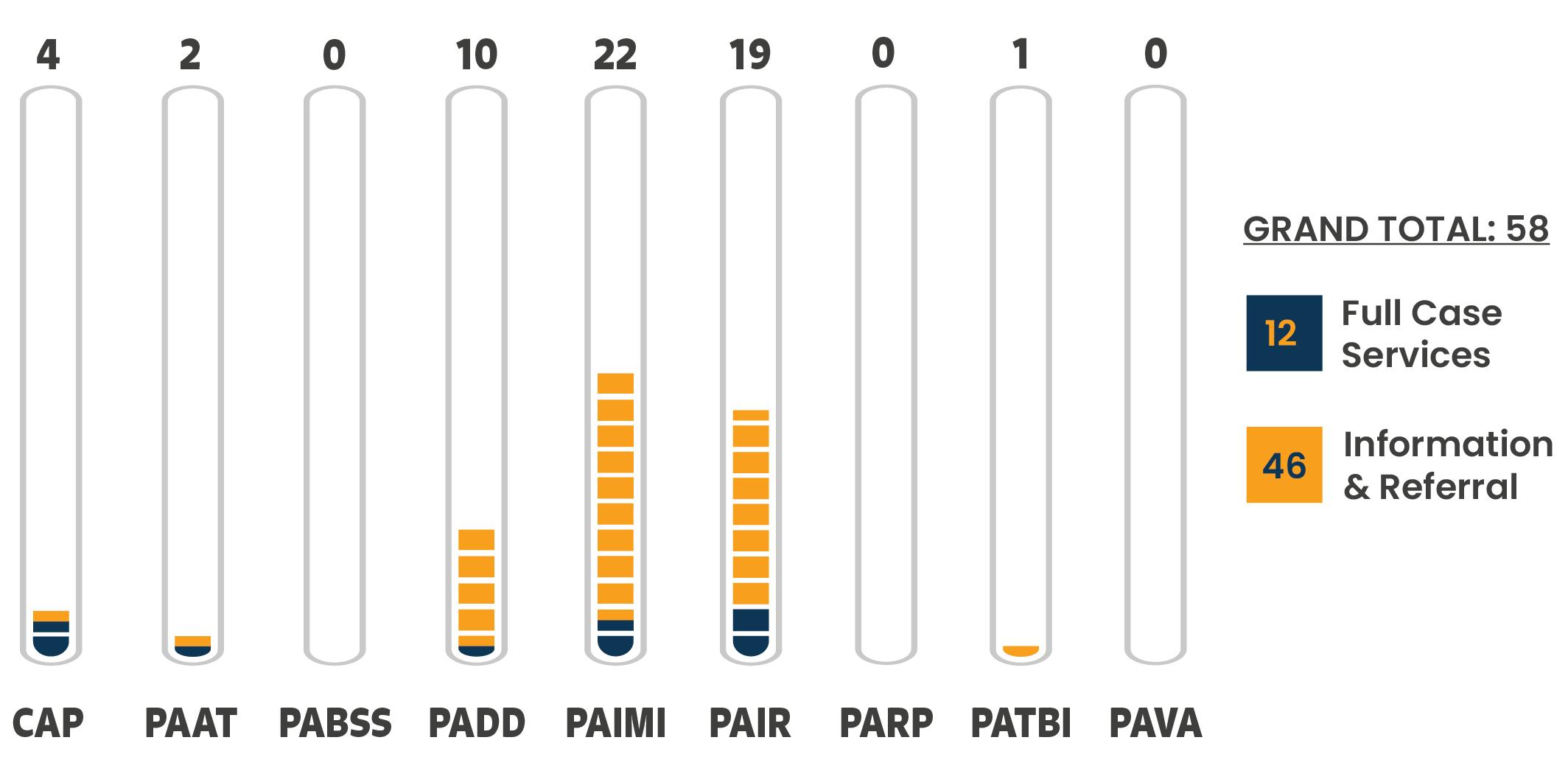
Response Time to Service Requests
5
of these Service Requests were resolved in less than 7 DAYS
8
of these Service Requests were resolved in less than 14 DAYS

REPRESENTATIVE ISSUE
Advocacy Success Receiving Passport

When planning a family vacation, there are many things to plan and account for. Being denied a passport should not be one of them.
We worked with a young man under guardianship who experienced multiple baseless denials in pursuing a passport. He could not verbally answer questions from the State Department, making the process much more difficult.
Despite his family’s numerous attempts, they were told they needed to complete paperwork typically reserved for children up to age 17. With his family vacation quickly approaching, we contacted various government offices to see if anyone could assist. After much persistence, we finally made contact with a Constituent Liaison and Field Representative from Congresswoman Alexandria Ocasio-Cortez’s office. Together, we worked to expedite the passport printing process and had it immediately sent to the client’s sister.
Thanks to our efforts, the young man could travel to Greece with his family without any issues!
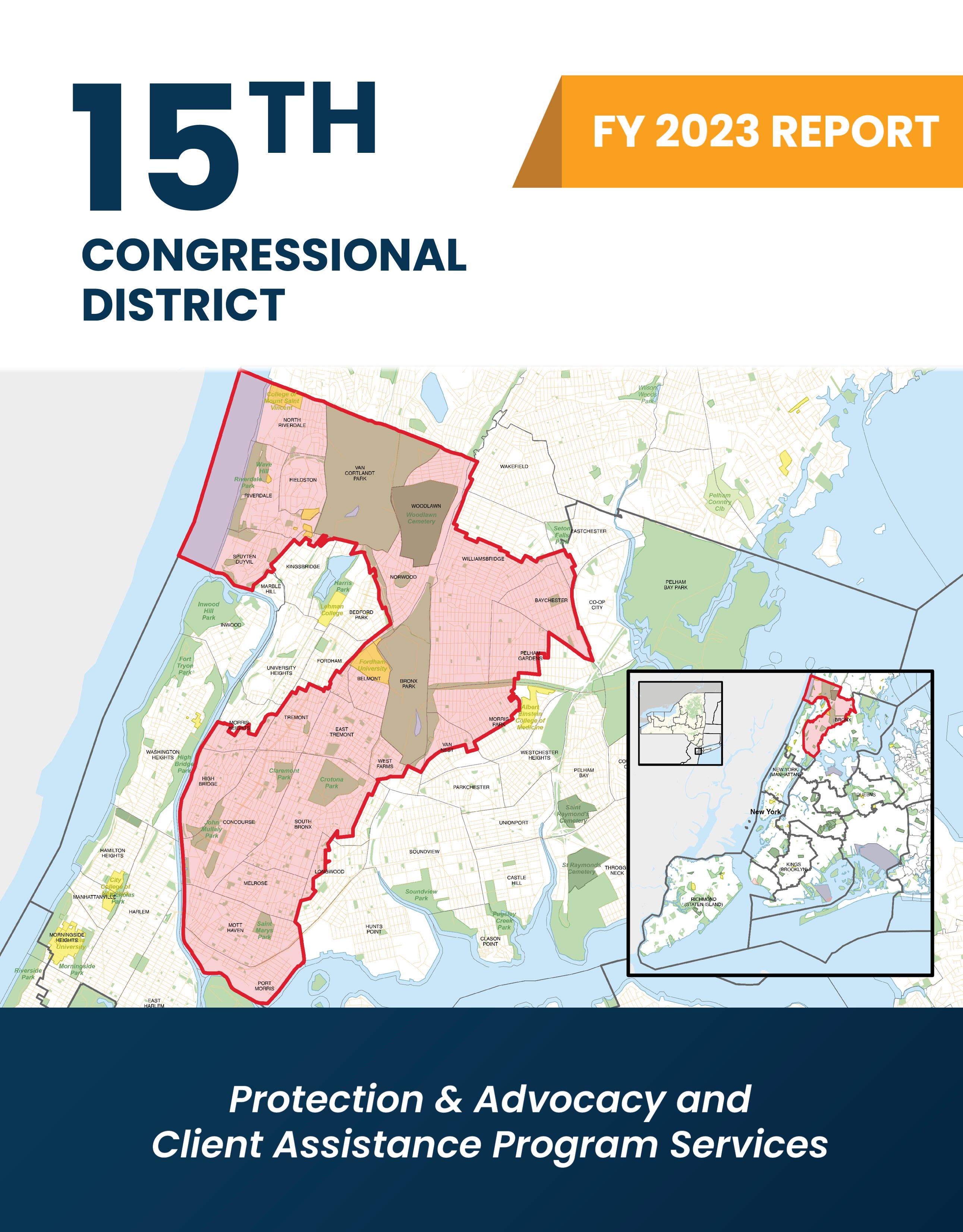
OUR CLIENTS
Over this 12 month period, DRNY averaged 9 Service Requests per month from individuals in your District. According to the most recent U.S. Census Bureau estimates, there are 131,184 individuals with disabilities living in the 15th Congressional District and DRNY has handled 102 Service Requests for 88 distinct clients living in those 18 zip codes.
Clients by Age
In your district DRNY assisted some of the most vulnerable individuals. 12 unique clients were residents of nursing homes, hospitals, correctional facilities, rehabilitation facilities, and youth-focused residential facilities. Of the residents living in the community, 5 or nearly 7.25% of DRNY’s unique clients were under 18. According to census data, individuals under 18 account for 10.94% of civilian, non-institutionalized individuals with a disability.
The following table shows that 27.27% of DRNY’s clients are age 55 or older. *Demographic information is not required to receive DRNY services.
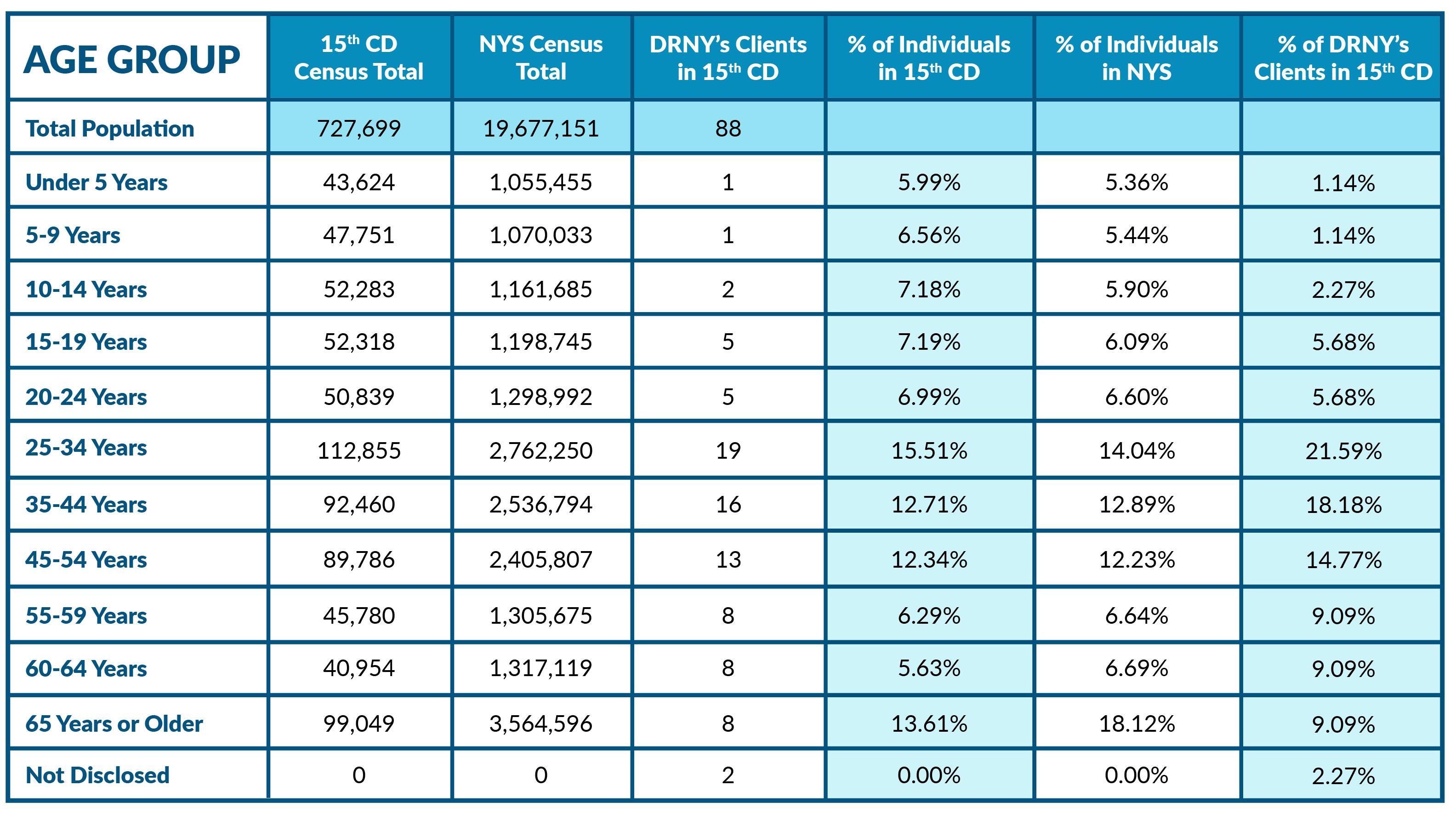
Clients from Under-Represented Groups
DRNY affirmatively seeks to provide services to historically under-represented groups. The following charts compare race and ethnicity demographics for the entire State of New York with that of DRNY’s clients.
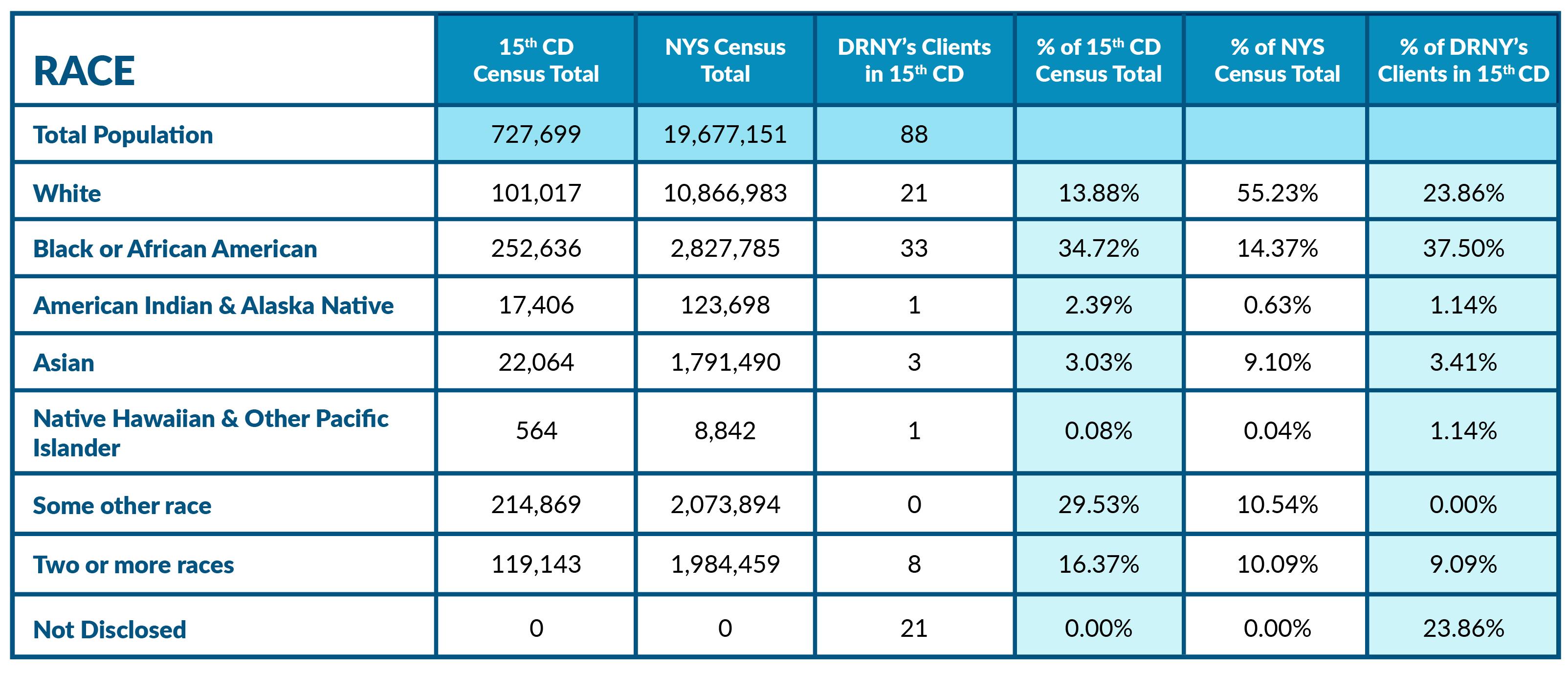

SERVICE REQUESTS
There were a total 102 service requests in this reporting period. DRNY provided full case services in 21 of the requests or 20.59%. DRNY provided Information and Referral (I&R) services to the remaining 81 requests.
DRNY makes appropriate referrals to other agencies in those matters where the issues are outside DRNY’s priorities, or because DRNY lacks the resources to undertake the matter. DRNY also provides information regarding the clients’ rights and available options. These matters vary from consumer financial issues, evictions, or other legal issues that are unrelated to the client’s disability.
Service Requests by Program
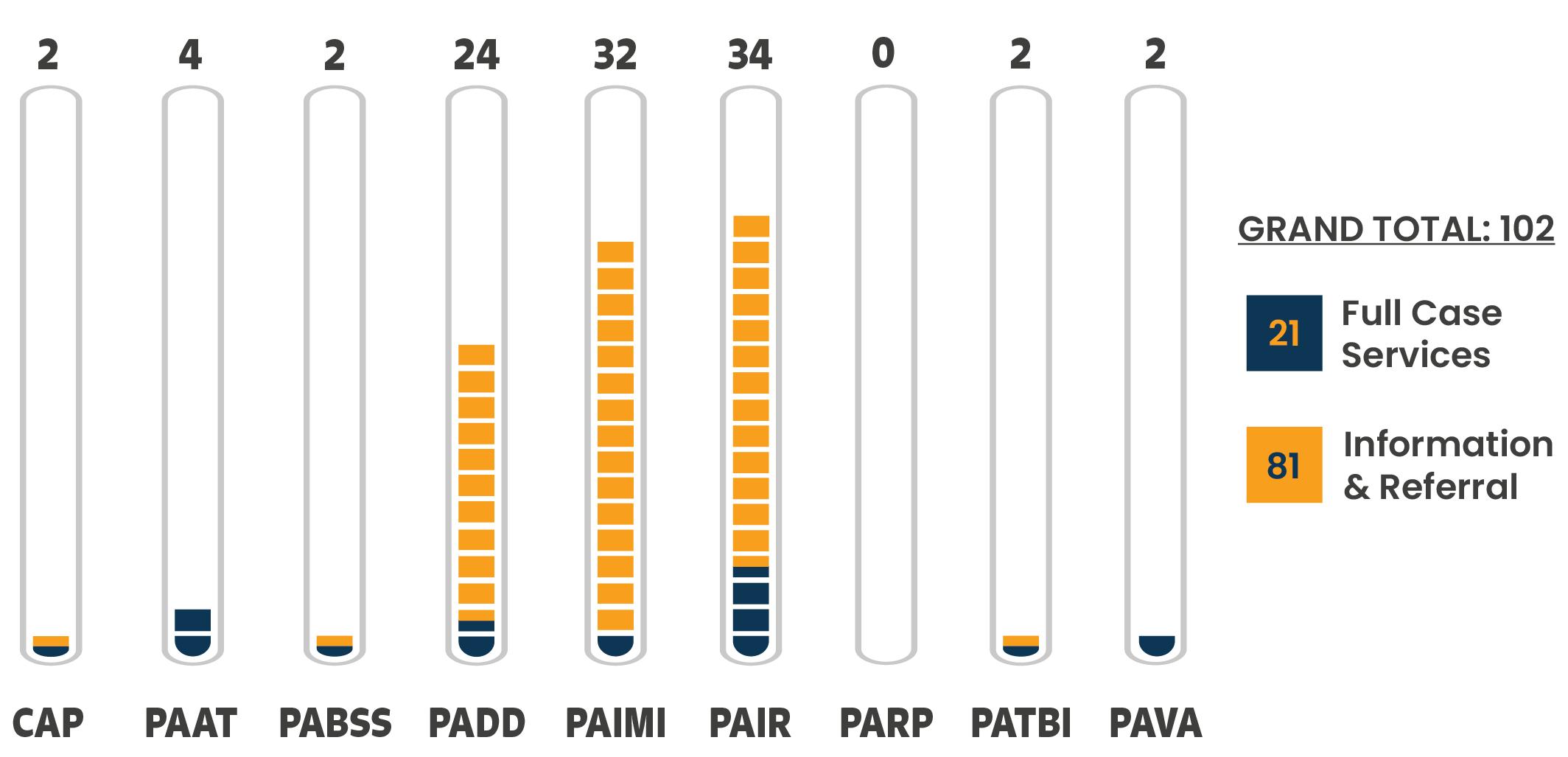
Response Time to Service Requests
12
of these Service Requests were resolved in less than 7 DAYS 11 of these Service Requests were resolved in less than 14 DAYS

REPRESENTATIVE ISSUE
Successful Reasonable Accommodation at Work

Returning to work after an injury can be challenging due to the many adjustments needed during recovery.
After injuring his back, an employee needed to change his hours to part-time. The schedule change was necessary so that he could receive treatment to heal properly. He reached out to his employer to request a reasonable accommodation. Initially, the employer denied his request and insisted he could only continue to work full-time.
However, they later agreed to the change in hours. While having the conversation, he expressed concern about needing to receive written confirmation of the accommodation approval and wanted to confirm his work schedule for the following week.
He later informed us that his employer had yet to add him to the schedule for the following week. His supervisor could not confirm when or if he would be added to the schedule.
We assisted him in drafting a successful letter to his supervisor, reminding them of his right to a reasonable accommodation and requesting a written statement of reasons. His employer approved his request and added him to the work schedule.
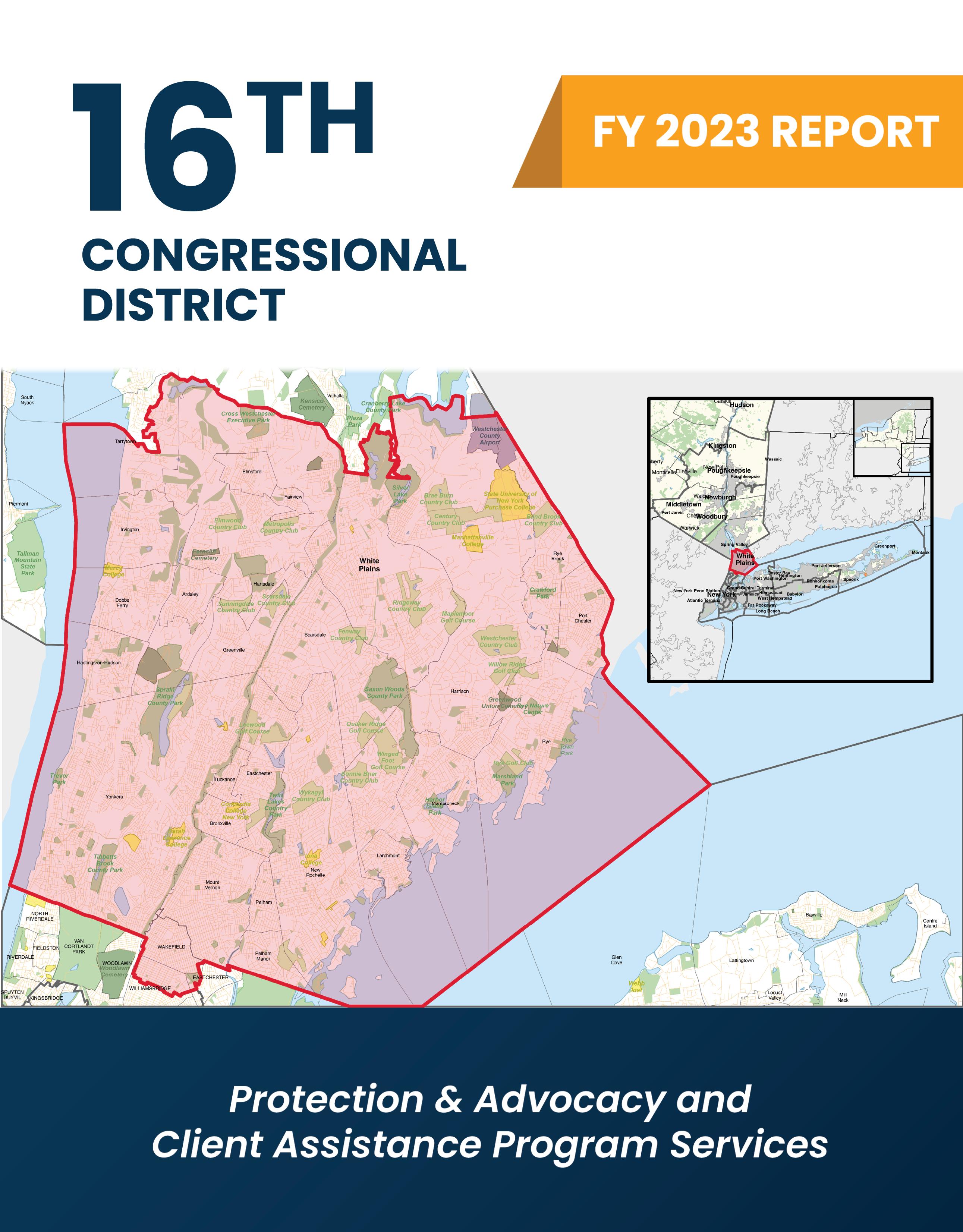
OUR CLIENTS
Over this 12 month period, DRNY averaged 7 Service Requests per month from individuals in your District. According to the most recent U.S. Census Bureau estimates, there are 92,432 individuals with disabilities living in the 16th Congressional District and DRNY has handled 86 Service Requests for 78 distinct clients living in those 30 zip codes.
Clients by Age
In your district DRNY assisted some of the most vulnerable individuals. 15 unique clients were residents of nursing homes, hospitals, correctional facilities, rehabilitation facilities, and youth-focused residential facilities. Of the residents living in the community, 4 or nearly 6.90% of DRNY’s unique clients were under 18. According to census data, individuals under 18 account for 7.45% of civilian, non-institutionalized individuals with a disability.
The following table shows that 30.77% of DRNY’s clients are age 55 or older. *Demographic information is not required to receive DRNY services.
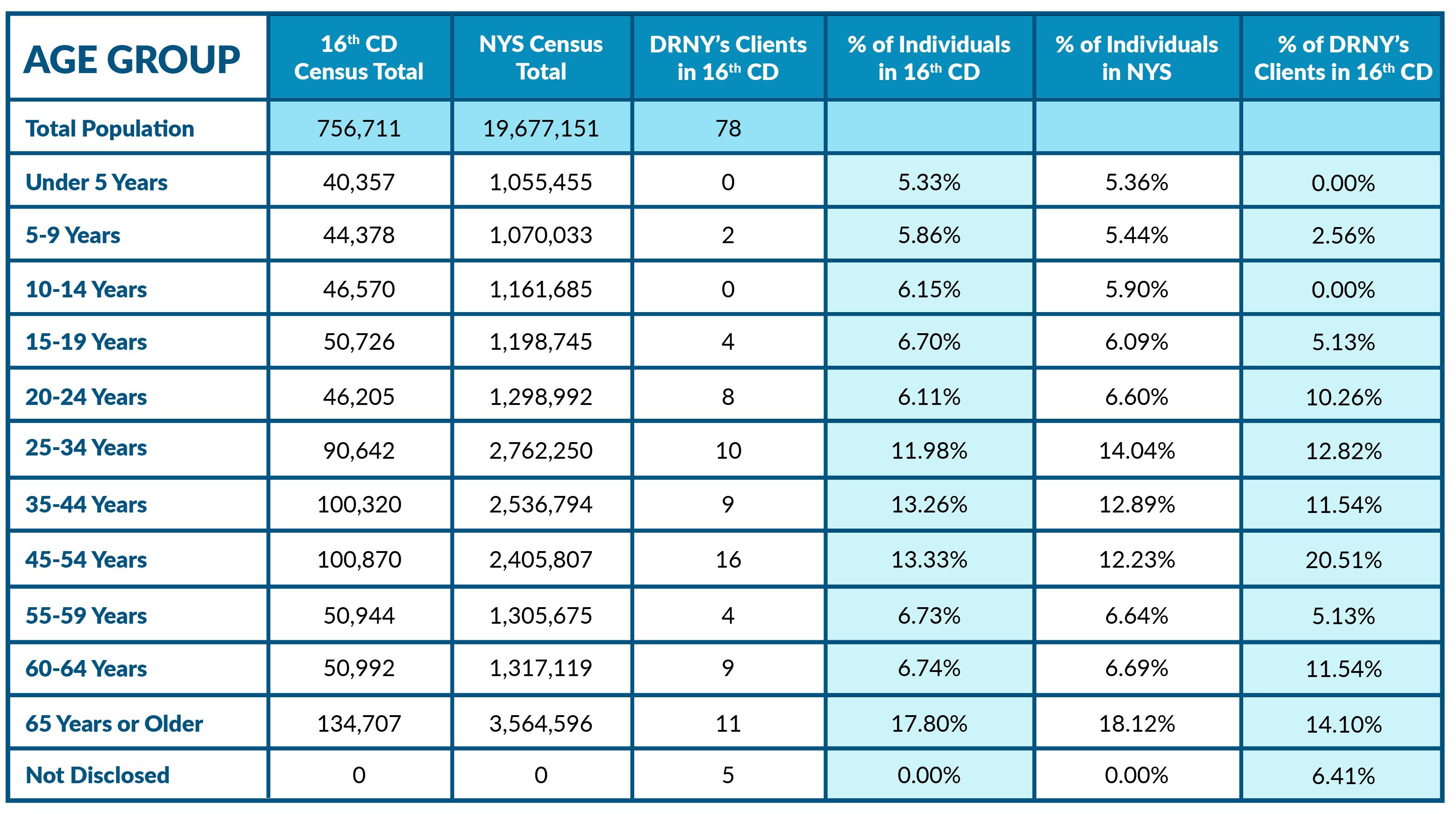
Clients from Under-Represented Groups
DRNY affirmatively seeks to provide services to historically under-represented groups. The following charts compare race and ethnicity demographics for the entire State of New York with that of DRNY’s clients.
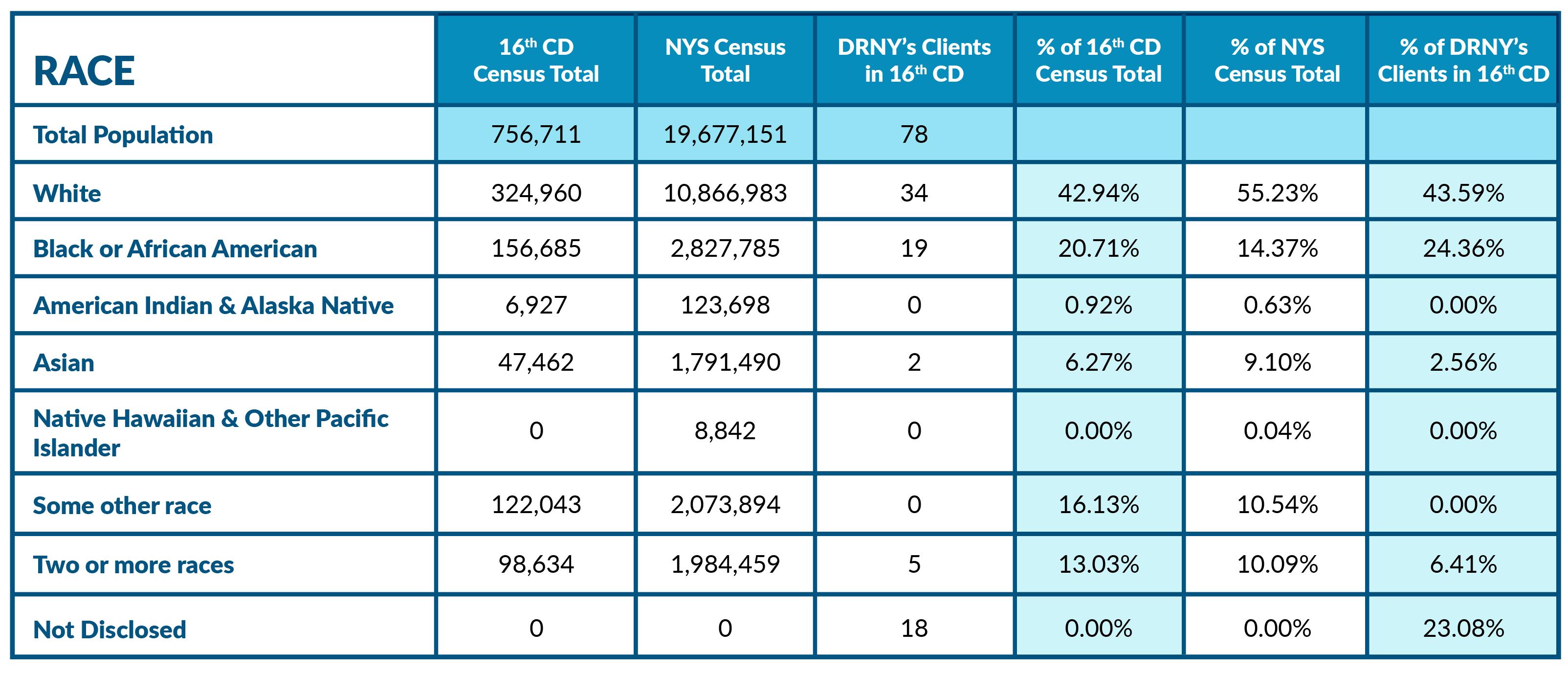

SERVICE REQUESTS
There were a total 86 service requests in this reporting period. DRNY provided full case services in 11 of the requests or 12.79%. DRNY provided Information and Referral (I&R) services to the remaining 75 requests.
DRNY makes appropriate referrals to other agencies in those matters where the issues are outside DRNY’s priorities, or because DRNY lacks the resources to undertake the matter. DRNY also provides information regarding the clients’ rights and available options. These matters vary from consumer financial issues, evictions, or other legal issues that are unrelated to the client’s disability.
Service Requests by Program

Response Time to Service Requests
20 of these Service Requests were resolved in less than 7 DAYS
7 of these Service Requests were resolved in less than 14 DAYS

REPRESENTATIVE ISSUE

Complications from Pregnancy Reasonable Accommodation
Returning to work after giving birth can be challenging, and the stress can be compounded when there are complications during pregnancy.
A woman reached out to us for help because she needed a reasonable accommodation from her employer. She had already taken all of her FMLA and NYS leave and requested an extension of that leave, fortunately, her request was granted.
After some time, her doctor approved her to return to work, with two reasonable accommodations. She requested a limited work schedule to attend her wound care appointment, and she could not lift over 30 pounds for three months. The employer stated that she could only return to work if she could do so without any restrictions.
We advocated on her behalf and the employer agreed to the accommodations.
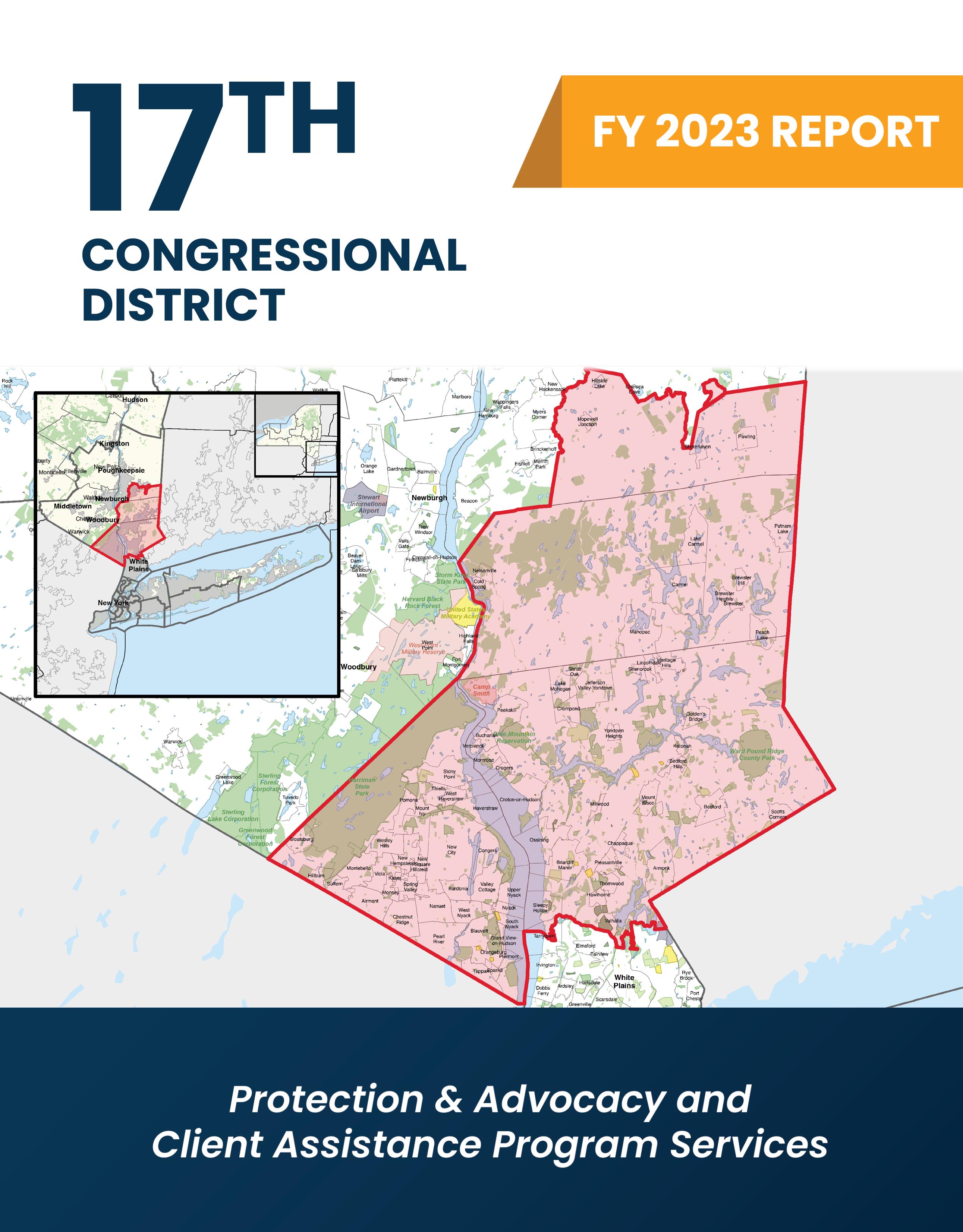
OUR CLIENTS
Over this 12 month period, DRNY averaged 7 Service Requests per month from individuals in your District. According to the most recent U.S. Census Bureau estimates, there are 75,866 individuals with disabilities living in the 17th Congressional District and DRNY has handled 80 Service Requests for 71 distinct clients living in those 37 zip codes.
Clients by Age
In your district DRNY assisted some of the most vulnerable individuals. 23 unique clients were residents of nursing homes, hospitals, correctional facilities, rehabilitation facilities, and youth-focused residential facilities. Of the residents living in the community, 5 or nearly 10.64% of DRNY’s unique clients were under 18. According to census data, individuals under 18 account for 8.88% of civilian, non-institutionalized individuals with a disability.
The following table shows that 32.39% of DRNY’s clients are age 55 or older. *Demographic information is not required to receive DRNY services.
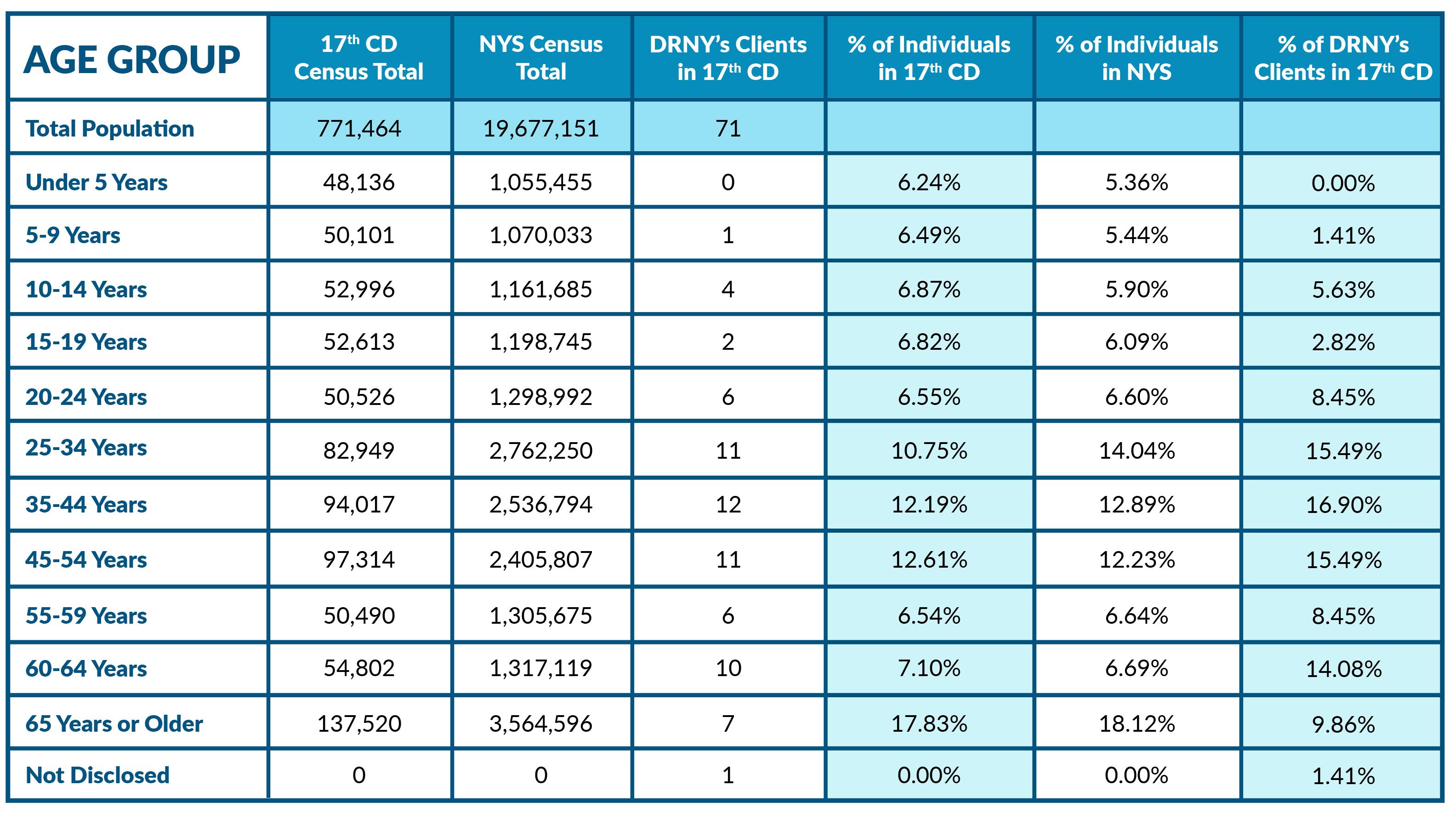
Clients from Under-Represented Groups
DRNY affirmatively seeks to provide services to historically under-represented groups. The following charts compare race and ethnicity demographics for the entire State of New York with that of DRNY’s clients.
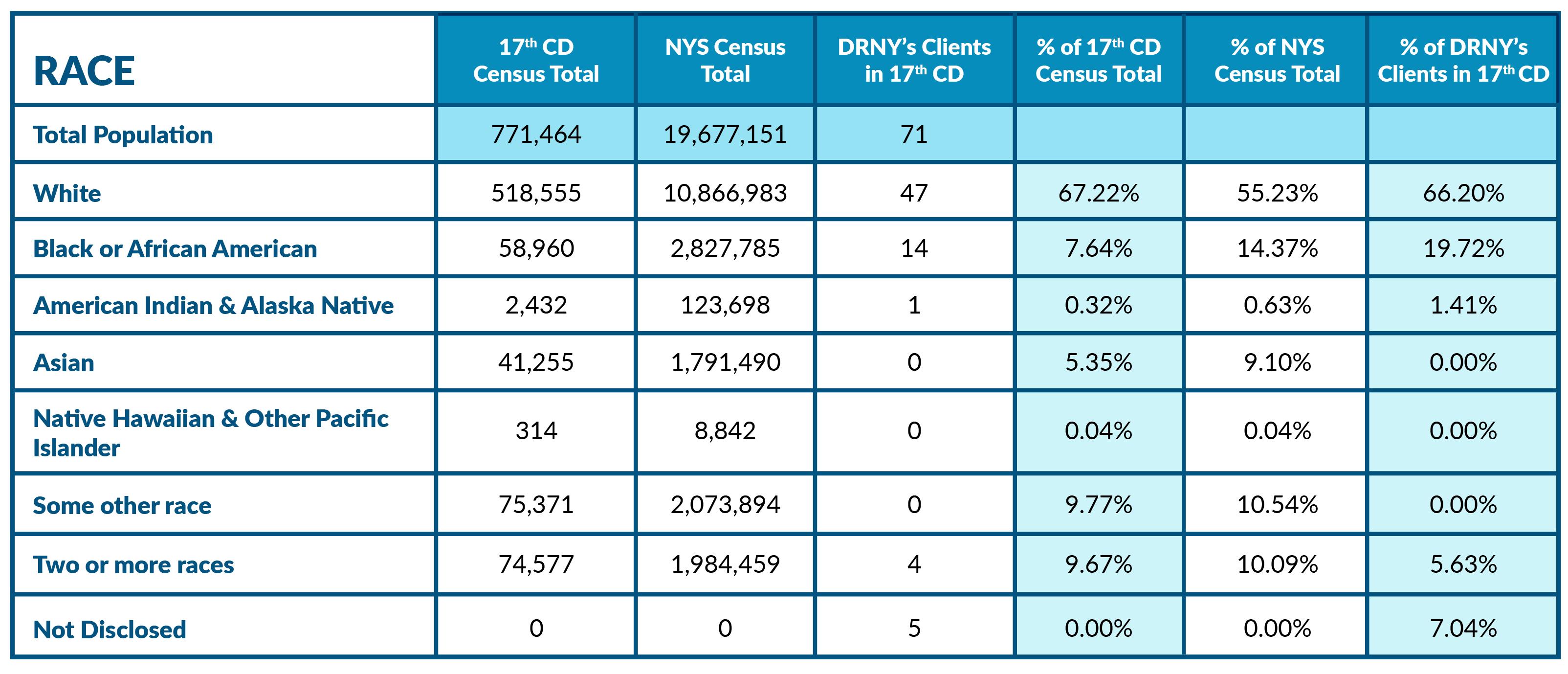

SERVICE REQUESTS
There were a total 80 service requests in this reporting period. DRNY provided full case services in 19 of the requests or 23.75%. DRNY provided Information and Referral (I&R) services to the remaining 61 requests.
DRNY makes appropriate referrals to other agencies in those matters where the issues are outside DRNY’s priorities, or because DRNY lacks the resources to undertake the matter. DRNY also provides information regarding the clients’ rights and available options. These matters vary from consumer financial issues, evictions, or other legal issues that are unrelated to the client’s disability.
Service Requests by Program
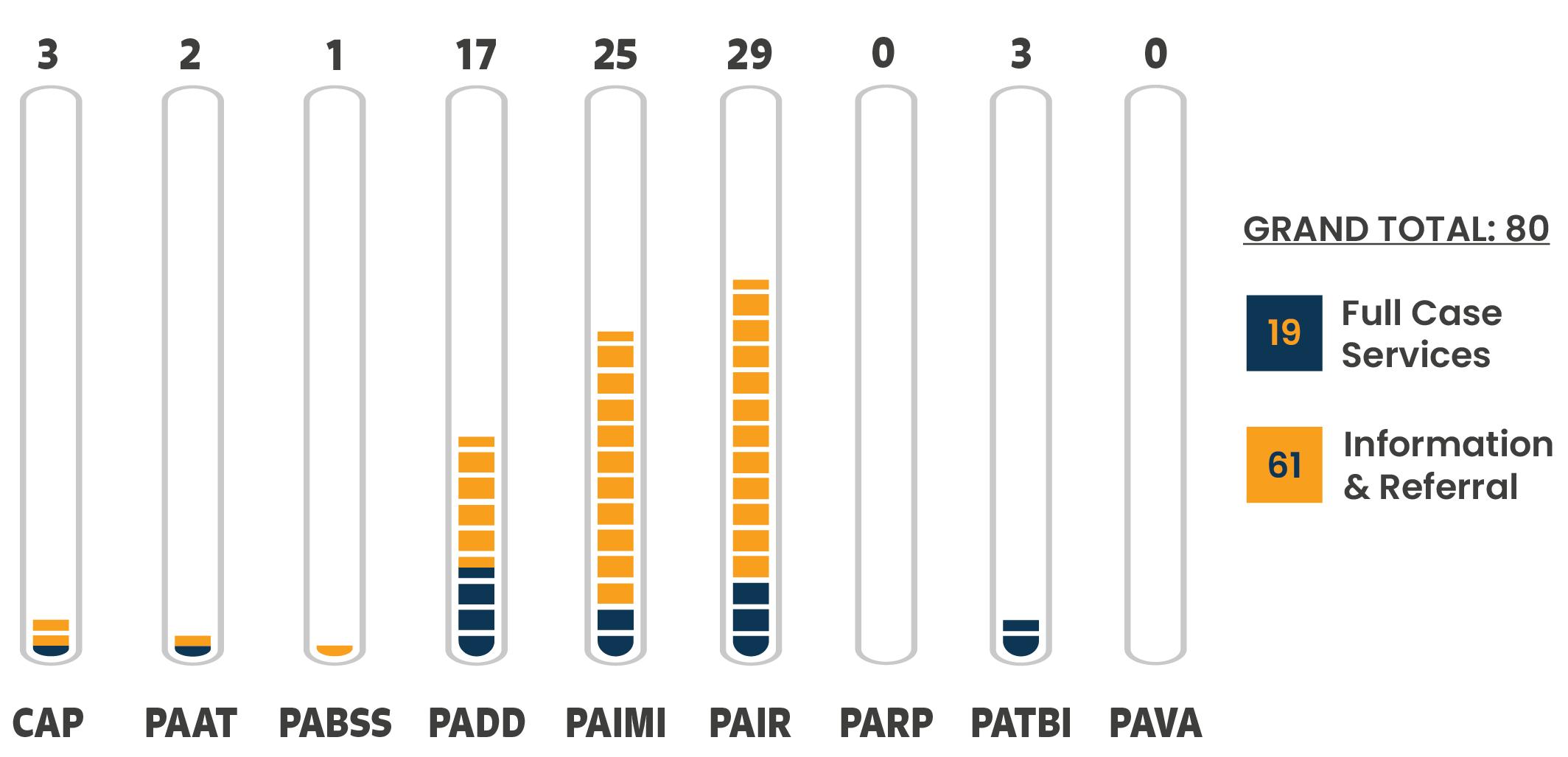
Response Time to Service Requests
14 of these Service Requests were resolved in less than 7 DAYS
10 of these Service Requests were resolved in less than 14 DAYS

REPRESENTATIVE ISSUE
Military Veteran Allowed Proper Medication

A military veteran who was detained at Rockland County Jail had been refused his medication. He was diagnosed with Post-Traumatic Stress Disorder (PTSD) symptoms stemming from his service overseas, claustrophobia, and severe Crohn’s disease.
Without his medication, he was unable to sleep, combat-related nightmares tormented him, and he was uncharacteristically involved in altercations precipitated by his anxiety.
The anxiety resulted in a flare-up of his Crohn’s disease. We contacted the jail and spoke with his psychiatrist. The doctor explained that there was a blanket policy at the jail that banned Trazadone because of its “potential for abuse.”
However, she agreed to raise the concerns with the jail administration and for them to consider alternatives. Not long after our conversation, we were pleased and relieved that the jail had agreed to make an exception and allow the much-needed medication.
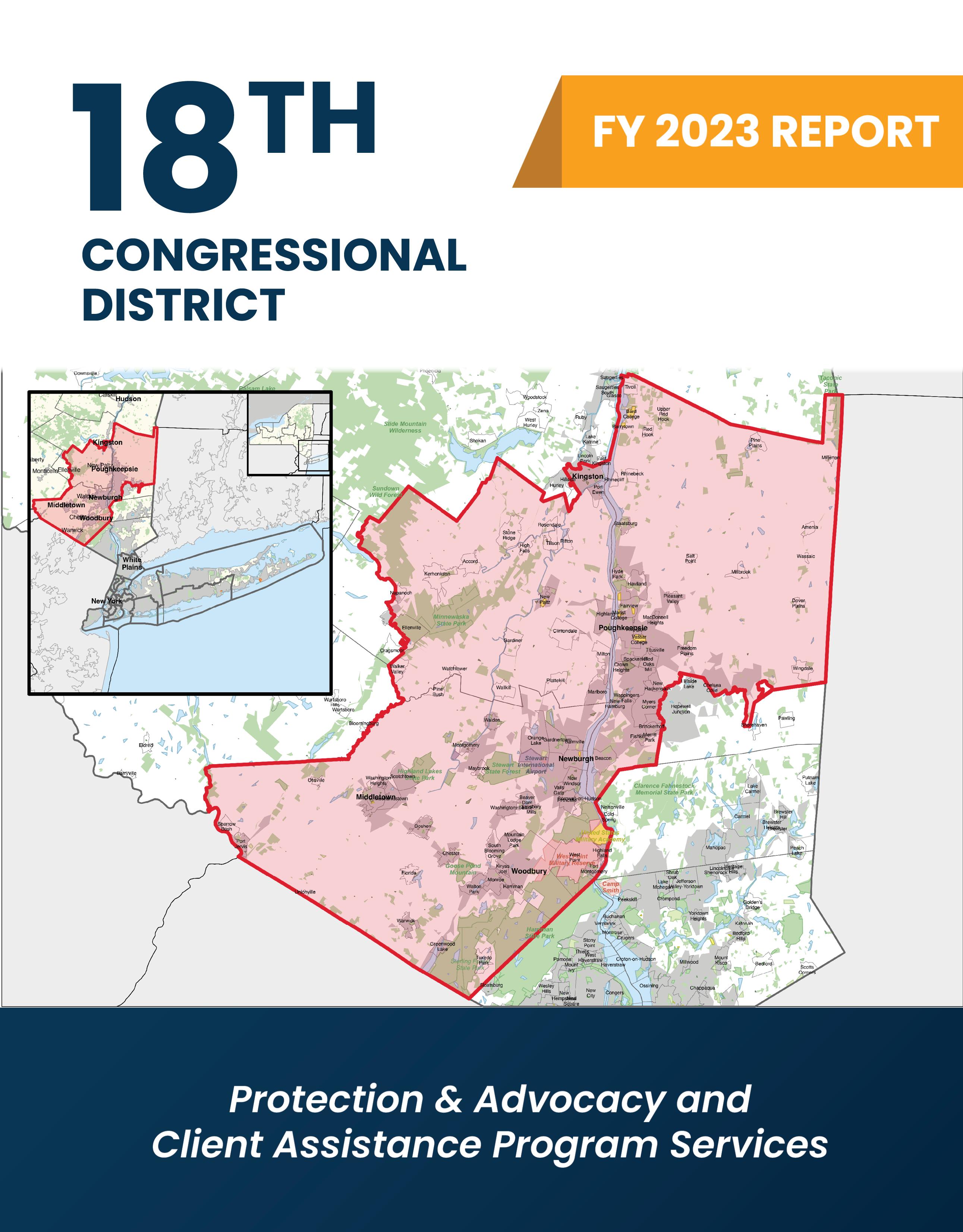
OUR CLIENTS
Over this 12 month period, DRNY averaged 11 Service Requests per month from individuals in your District. According to the most recent U.S. Census Bureau estimates, there are 103,965 individuals with disabilities living in the 18th Congressional District and DRNY has handled 126 Service Requests for 113 distinct clients living in those 41 zip codes.
Clients by Age
In your district DRNY assisted some of the most vulnerable individuals. 27 unique clients were residents of nursing homes, hospitals, correctional facilities, rehabilitation facilities, and youth-focused residential facilities. Of the residents living in the community, 15 or nearly 18.52% of DRNY’s unique clients were under 18. According to census data, individuals under 18 account for 6.53% of civilian, non-institutionalized individuals with a disability.
The following table shows that 24.78% of DRNY’s clients are age 55 or older. *Demographic information is not required to receive DRNY services.

Clients from Under-Represented Groups
DRNY affirmatively seeks to provide services to historically under-represented groups. The following charts compare race and ethnicity demographics for the entire State of New York with that of DRNY’s clients.
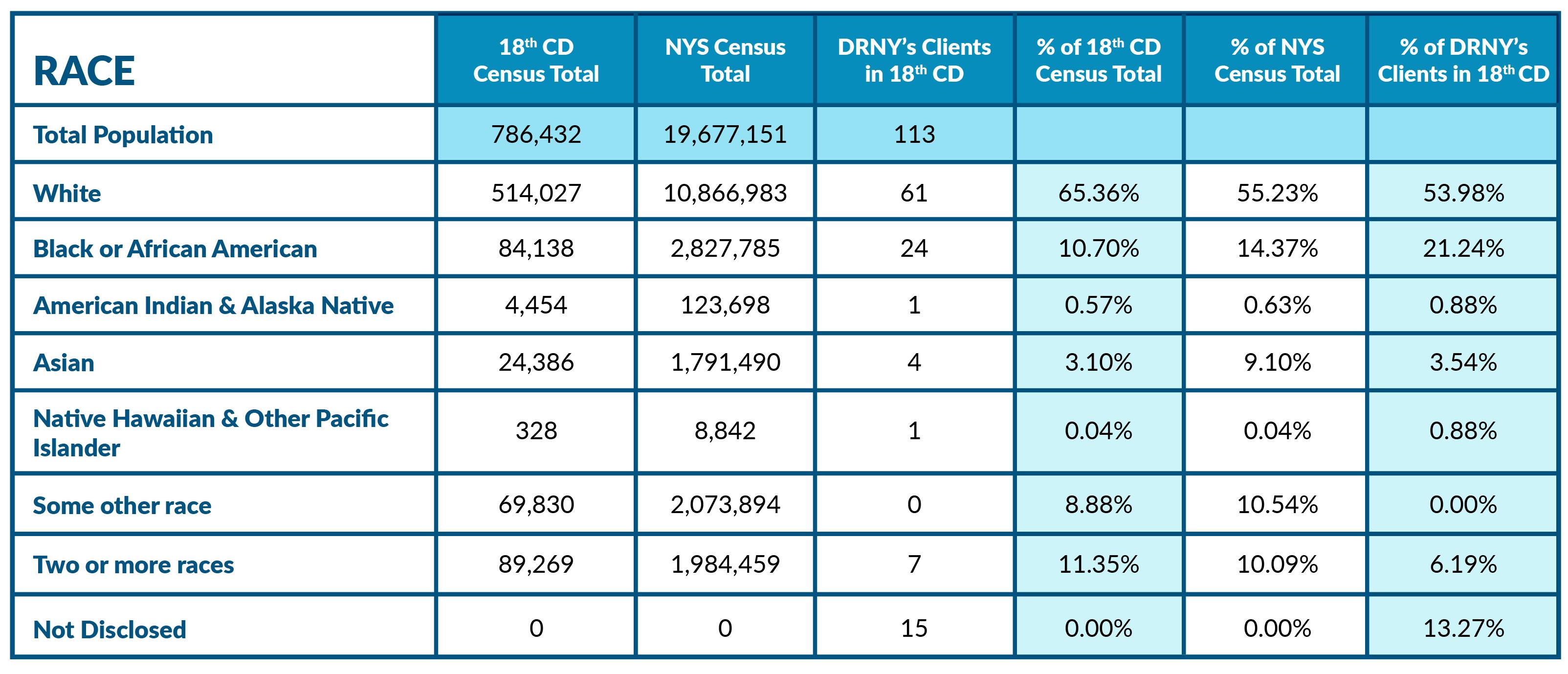

SERVICE REQUESTS
There were a total 126 service requests in this reporting period. DRNY provided full case services in 0 of the requests or 15.87%. DRNY provided Information and Referral (I&R) services to the remaining 106 requests.
DRNY makes appropriate referrals to other agencies in those matters where the issues are outside DRNY’s priorities, or because DRNY lacks the resources to undertake the matter. DRNY also provides information regarding the clients’ rights and available options. These matters vary from consumer financial issues, evictions, or other legal issues that are unrelated to the client’s disability.
Service Requests by Program
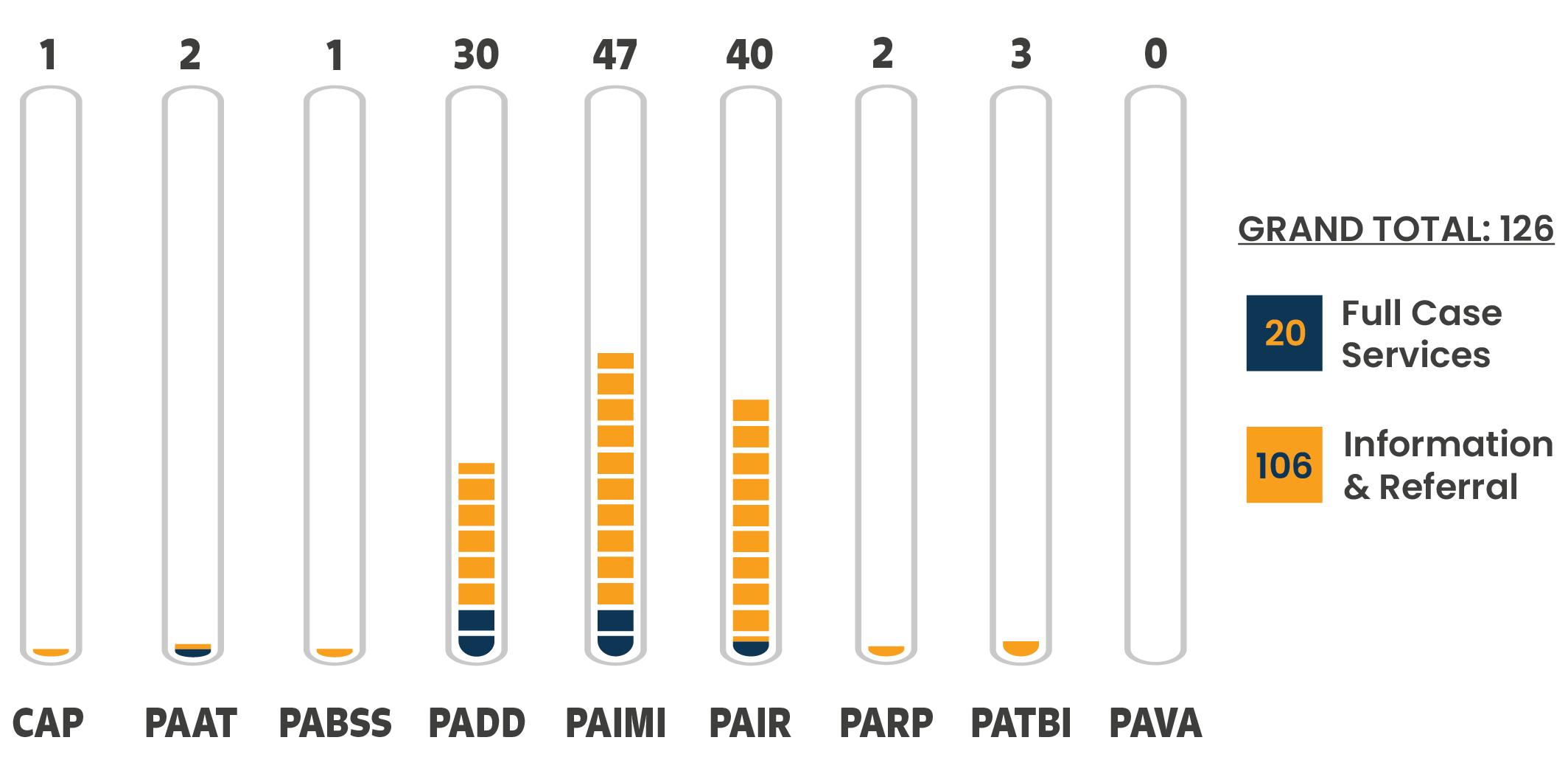
Response Time to Service Requests
19 of these Service Requests were resolved in less than 7 DAYS
19 of these Service Requests were resolved in less than 14 DAYS

REPRESENTATIVE ISSUE
Emergency Fair Hearing and Assistance

Imagine depending on in-home care to carry out your daily activities, only to be met with unskilled and uncommitted staff who not only fail to meet your needs but also compromise your physical and mental well-being. It can be a frustrating and overwhelming experience that leaves you feeling helpless and vulnerable.
That was the experience of a 54-year-old man with Cerebral Palsy (CP) who had been living independently in his apartment and also had been dependent on long-term home care services to complete activities of daily living.
Unfortunately, his home care provider had been sending staff who were both unable and unwilling to use the Hoyer Lift he required to transfer him out of bed. Instead, they left him in bed all day without proper care. He ultimately filed a complaint about the agency to the New York State Department of Health (DOH) and, thankfully, DOH asked for corrective action.
However, the agency informed him they were terminating all care instead of addressing the complaint. Shockingly, DOH did not contest this action, and the agency notified the Department Of Social Services (DSS) that he would be without care. Unable to find alternative providers, DSS called the Adult Protective Services Program (APS), who arranged for him to be taken to a hospital pending nursing home placement.
We immediately requested an emergency fair hearing and a home health aid to ensure he could return home with services. The request was granted after he was transferred to a nursing home. DSS acknowledged they were required to provide services pending the hearing but could not locate an agency.
We then launched a call campaign to put more pressure on DSS. Finally, two weeks after the illegal transfer, the man returned home.
We advocated for him and explored systemic remedies to address this increasingly common scenario. Although he was able to return home, we highlighted that it is vital that agencies are held accountable for their actions and that policies are put in place to ensure that clients are not abandoned without proper care and support.
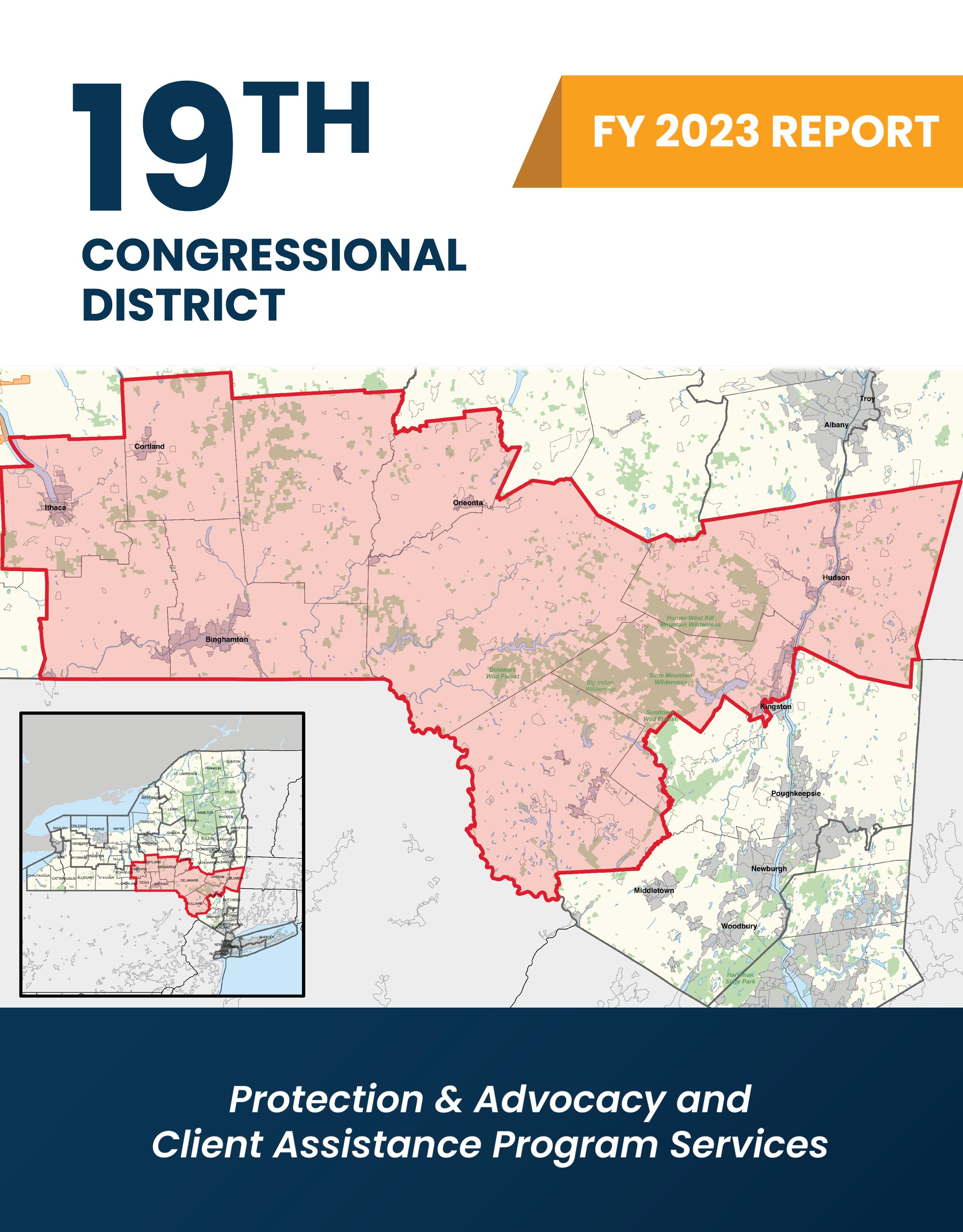
OUR CLIENTS
Over this 12 month period, DRNY averaged 10 Service Requests per month from individuals in your District. According to the most recent U.S. Census Bureau estimates, there are 111,721 individuals with disabilities living in the 19th Congressional District and DRNY has handled 122 Service Requests for 106 distinct clients living in those 54 zip codes.
Clients by Age
In your district DRNY assisted some of the most vulnerable individuals. 27 unique clients were residents of nursing homes, hospitals, correctional facilities, rehabilitation facilities, and youth-focused residential facilities. Of the residents living in the community, 12 or nearly 16.00% of DRNY’s unique clients were under 18. According to census data, individuals under 18 account for 6.97% of civilian, non-institutionalized individuals with a disability.
The following table shows that 34.91% of DRNY’s clients are age 55 or older. *Demographic information is not required to receive DRNY services.
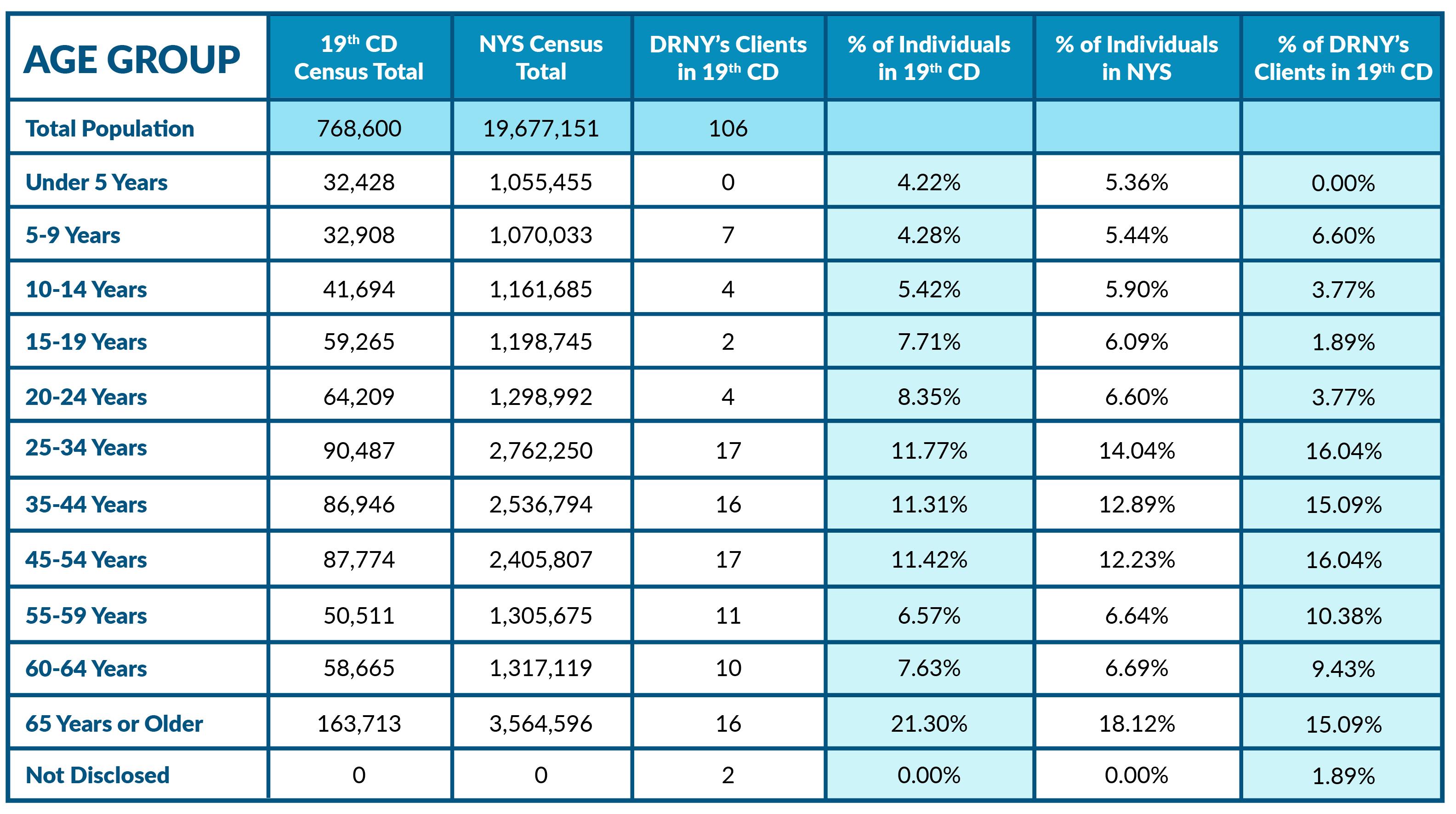
Clients from Under-Represented Groups
DRNY affirmatively seeks to provide services to historically under-represented groups. The following charts compare race and ethnicity demographics for the entire State of New York with that of DRNY’s clients.
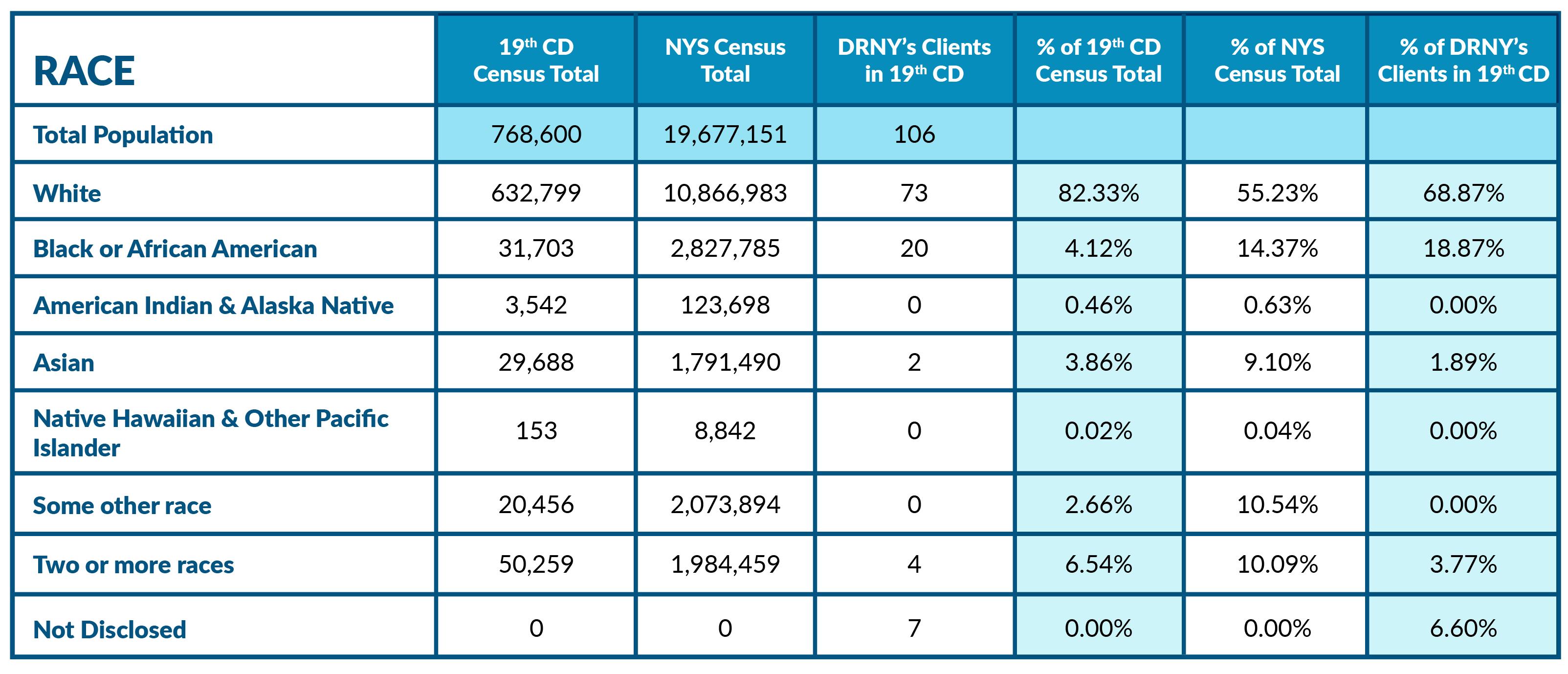

SERVICE REQUESTS
There were a total 122 service requests in this reporting period. DRNY provided full case services in 24 of the requests or 19.67%. DRNY provided Information and Referral (I&R) services to the remaining 98 requests.
DRNY makes appropriate referrals to other agencies in those matters where the issues are outside DRNY’s priorities, or because DRNY lacks the resources to undertake the matter. DRNY also provides information regarding the clients’ rights and available options. These matters vary from consumer financial issues, evictions, or other legal issues that are unrelated to the client’s disability.
Service Requests by Program
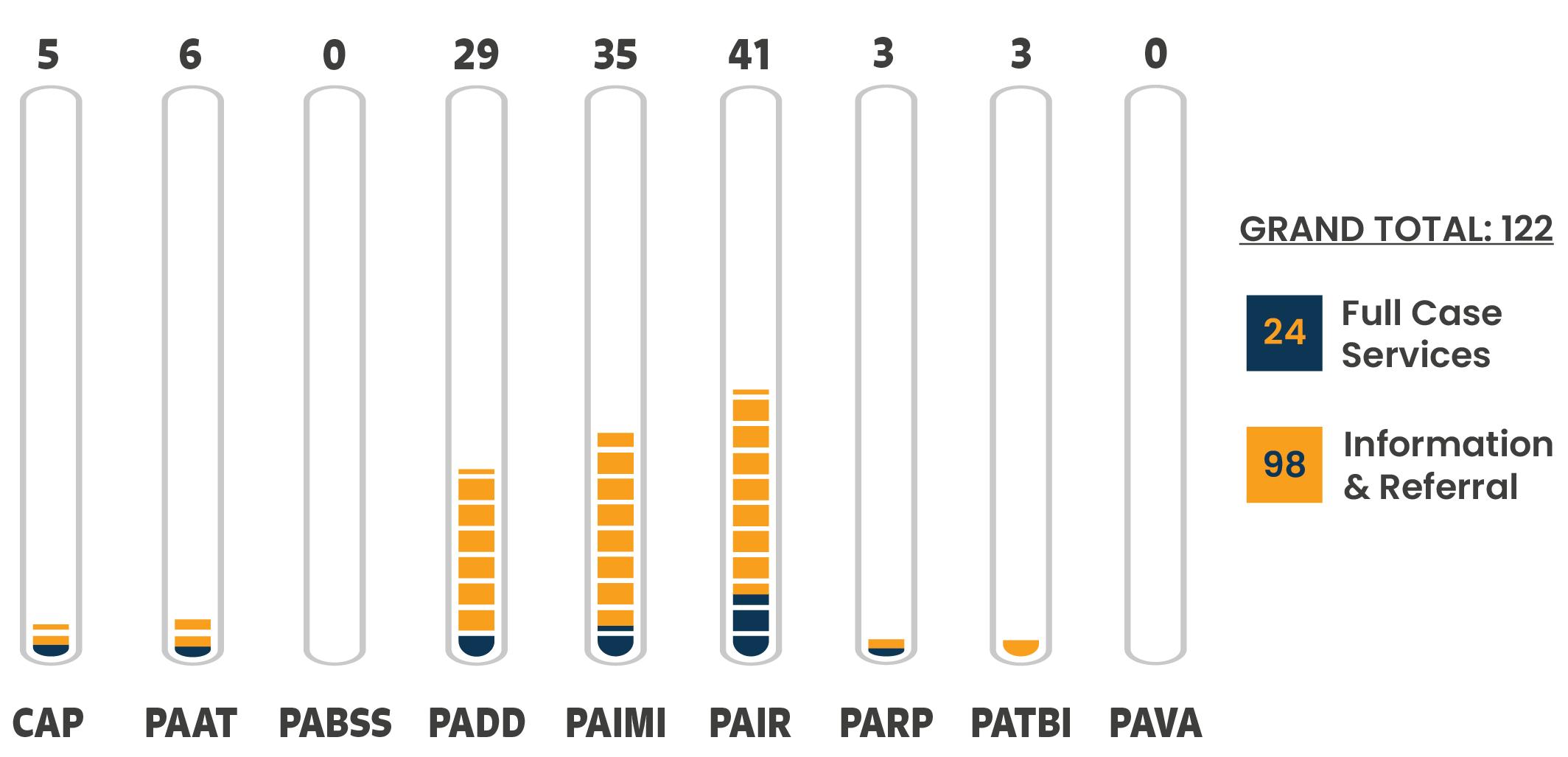
Response Time to Service Requests
20 of these Service Requests were resolved in less than 7 DAYS
12 of these Service Requests were resolved in less than 14 DAYS

REPRESENTATIVE ISSUE

American Sign Language (ASL) Interpreter Provided
Lack of language translation significantly impacts our ability to communicate and participate in the community. It limits our access to essential services and information. Being unable to communicate can also lead to feelings of isolation and exclusion, making it nearly impossible to form meaningful connections with others.
A young Deaf woman who resided at a skilled nursing facility for over two years had not been provided with an American Sign Language (ASL) interpreter. Without interpretation, it was difficult for her to communicate with others and participate in daily activities.
We contacted the facility to explain their obligations under the law and request ASL services for her. After understanding the gravity of the situation, the facility agreed to provide services and arranged for ASL interpretation to be available.
Thanks to our advocacy, the young woman can now easily communicate with others and participate in activities. The facility took responsibility for its obligations and provided her with the necessary services to help her lead a more fulfilling life.
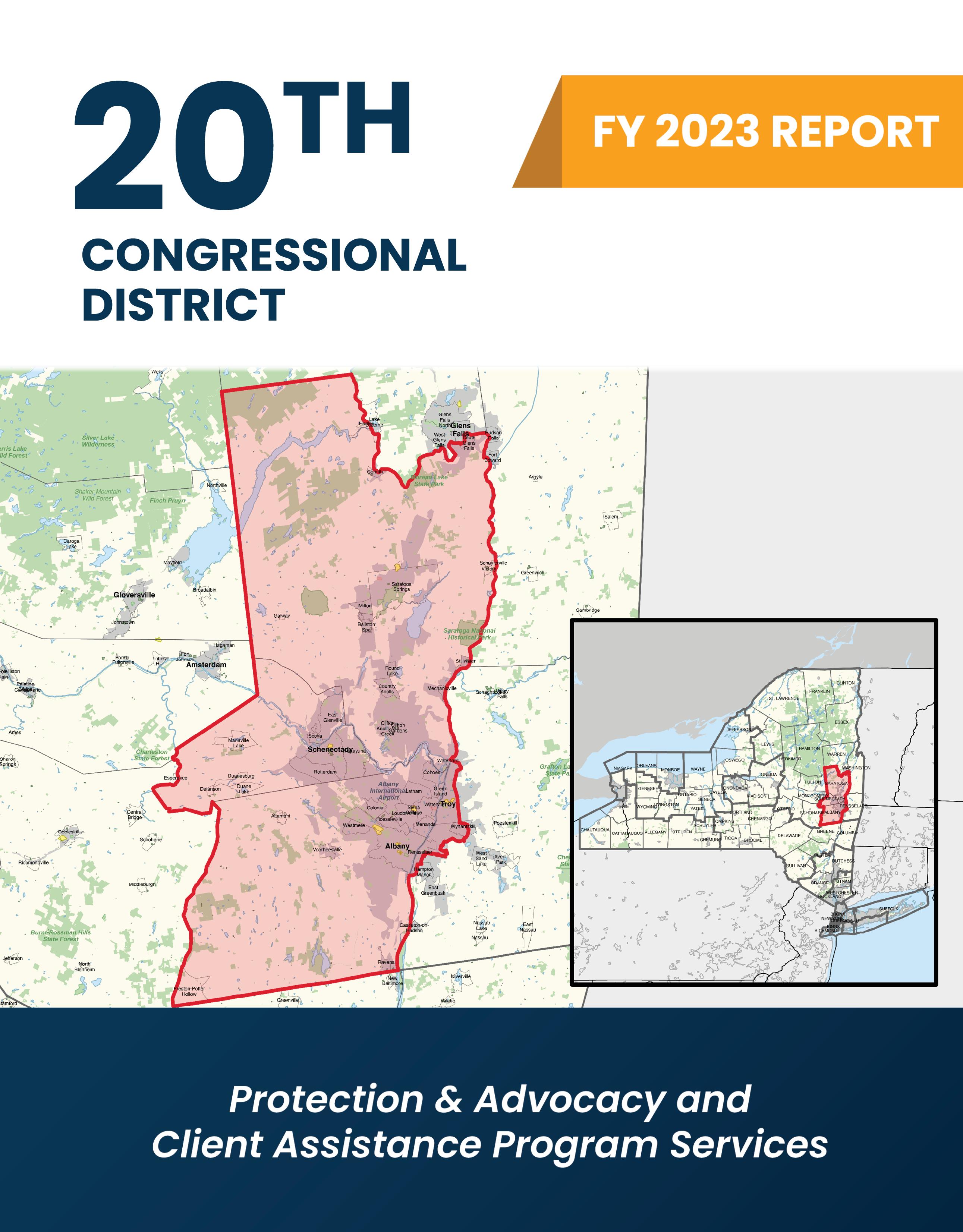
OUR CLIENTS
Over this 12 month period, DRNY averaged 21 Service Requests per month from individuals in your District. According to the most recent U.S. Census Bureau estimates, there are 97,613 individuals with disabilities living in the 20th Congressional District and DRNY has handled 255 Service Requests for 222 distinct clients living in those 50 zip codes.
Clients by Age
In your district DRNY assisted some of the most vulnerable individuals. 10 unique clients were residents of nursing homes, hospitals, correctional facilities, rehabilitation facilities, and youth-focused residential facilities. Of the residents living in the community, 47 or nearly 23.38% of DRNY’s unique clients were under 18. According to census data, individuals under 18 account for 7.21% of civilian, non-institutionalized individuals with a disability.
The following table shows that 28.38% of DRNY’s clients are age 55 or older. *Demographic information is not required to receive DRNY services.
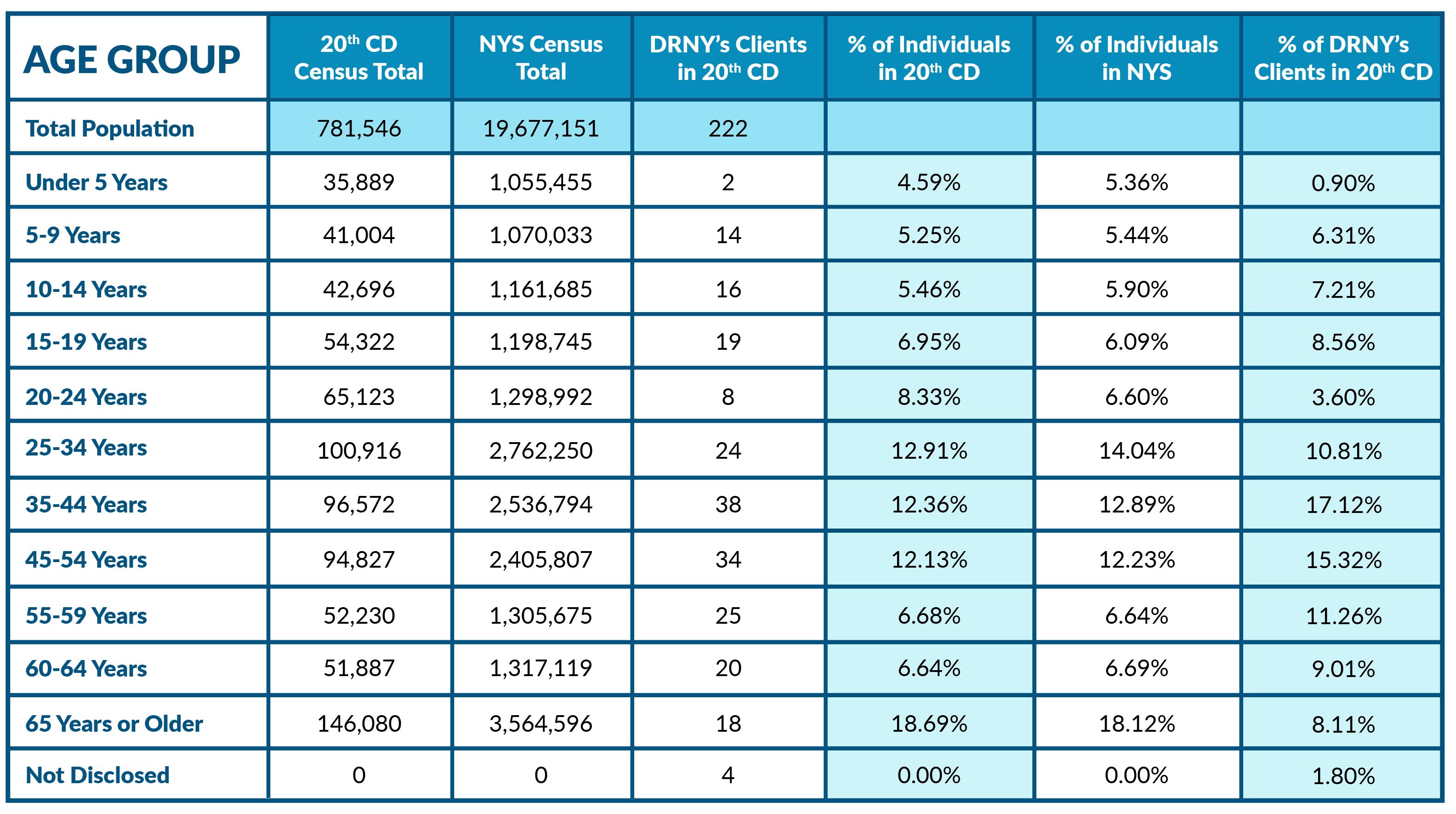
Clients from Under-Represented Groups
DRNY affirmatively seeks to provide services to historically under-represented groups. The following charts compare race and ethnicity demographics for the entire State of New York with that of DRNY’s clients.
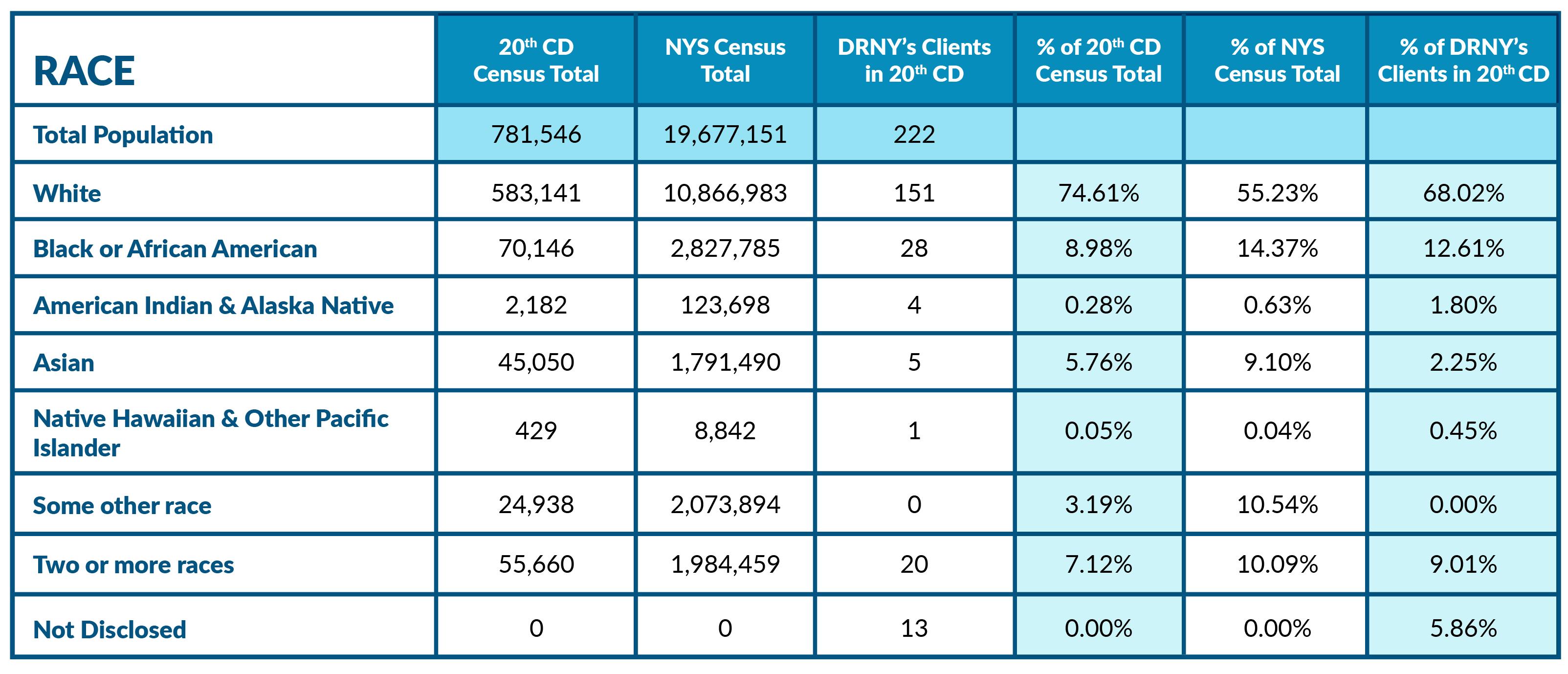

SERVICE REQUESTS
There were a total 255 service requests in this reporting period. DRNY provided full case services in 54 of the requests or 21.17%. DRNY provided Information and Referral (I&R) services to the remaining 201 requests.
DRNY makes appropriate referrals to other agencies in those matters where the issues are outside DRNY’s priorities, or because DRNY lacks the resources to undertake the matter. DRNY also provides information regarding the clients’ rights and available options. These matters vary from consumer financial issues, evictions, or other legal issues that are unrelated to the client’s disability.
Service Requests by Program
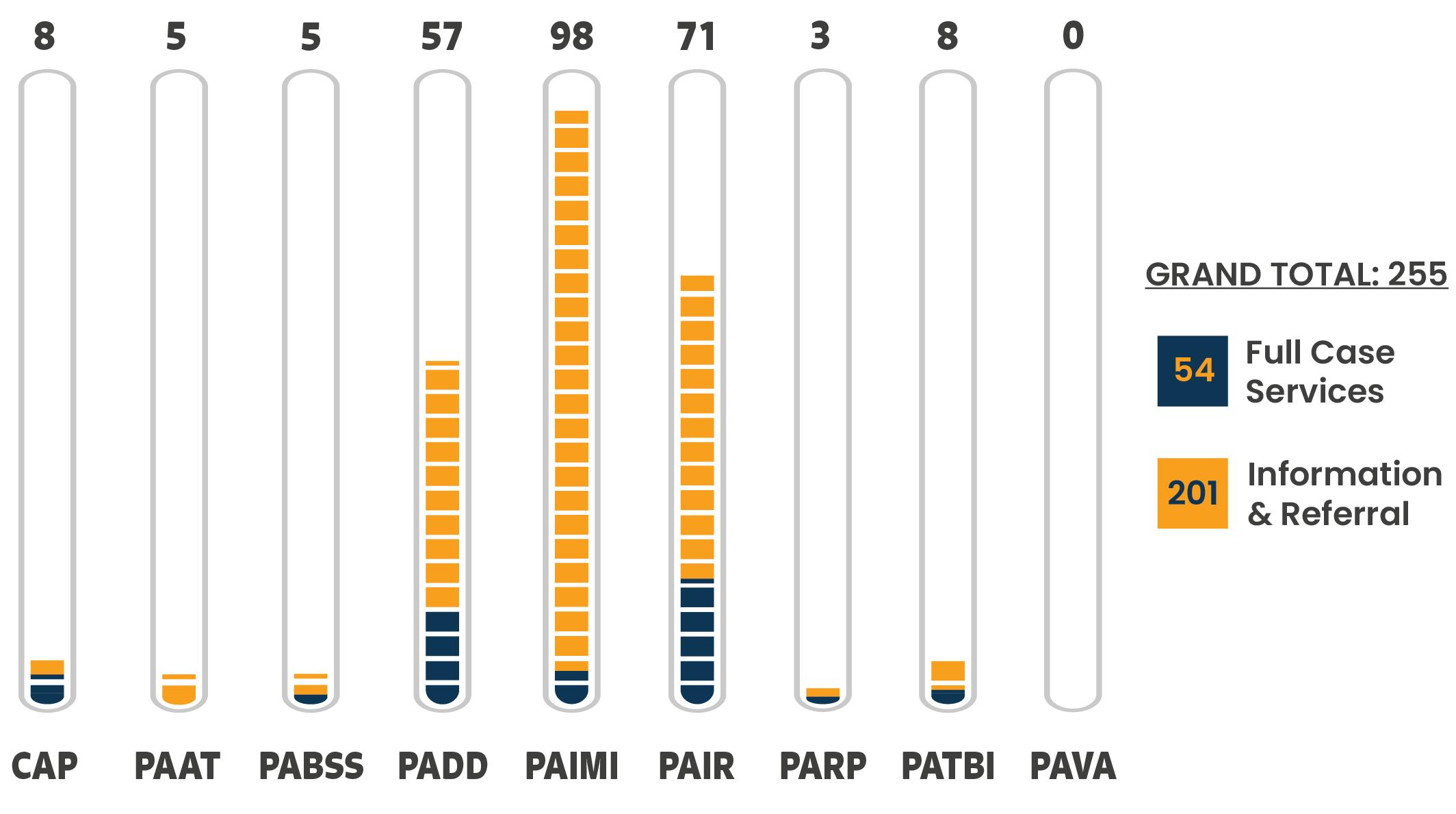
Response Time to Service Requests
35 of these Service Requests were resolved in less than 7 DAYS
28 of these Service Requests were resolved in less than 14 DAYS

REPRESENTATIVE ISSUE
Service Animal Discrimination

Going to the market to get groceries should be easy and stress-free, but unfortunately, that is not always the case. In fact, a woman recently faced discrimination when trying to enter a grocery store with her service animal, an experience that no one should have to endure.
We informed the store of the ADA and requested that they give her full access and train its staff on the rights of customers who utilize service animals to avoid future discrimination.
Thanks to our advocacy, the store included training on service animal access during new-employee orientation and added service animal access as part of each department’s communications checklist.
We were happy to see this case come to a successful resolution without any administrative or court intervention and to help this woman and her service dog regain their rights to access the grocery store.
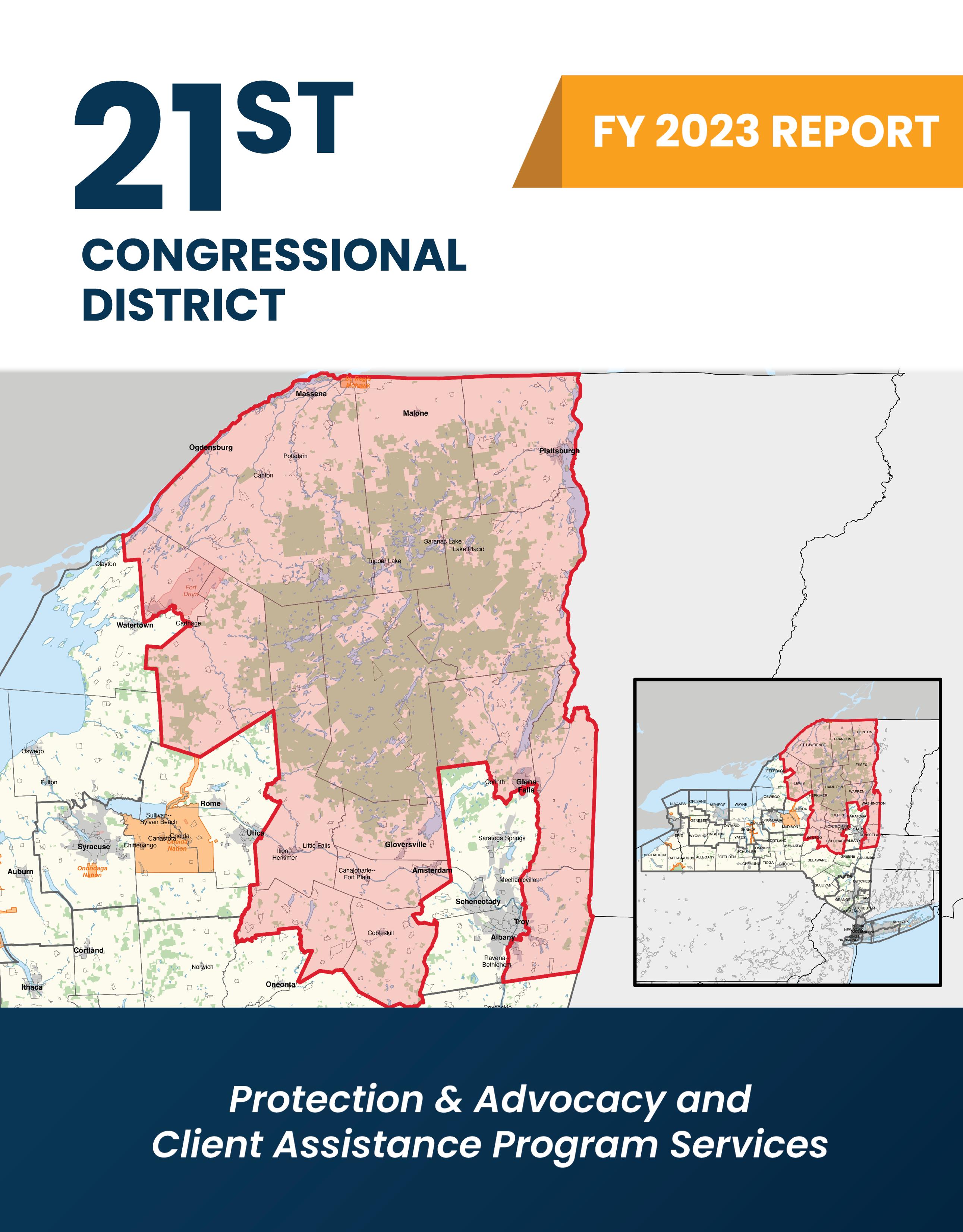
OUR CLIENTS
Over this 12 month period, DRNY averaged 13 Service Requests per month from individuals in your District. According to the most recent U.S. Census Bureau estimates, there are 122,387 individuals with disabilities living in the 21st Congressional District and DRNY has handled 151 Service Requests for 132 distinct clients living in those 70 zip codes.
Clients by Age
In your district DRNY assisted some of the most vulnerable individuals. 26 unique clients were residents of nursing homes, hospitals, correctional facilities, rehabilitation facilities, and youth-focused residential facilities. Of the residents living in the community, 22 or nearly 22.45% of DRNY’s unique clients were under 18. According to census data, individuals under 18 account for 7.34% of civilian, non-institutionalized individuals with a disability.
The following table shows that 21.21% of DRNY’s clients are age 55 or older. *Demographic information is not required to receive DRNY services.
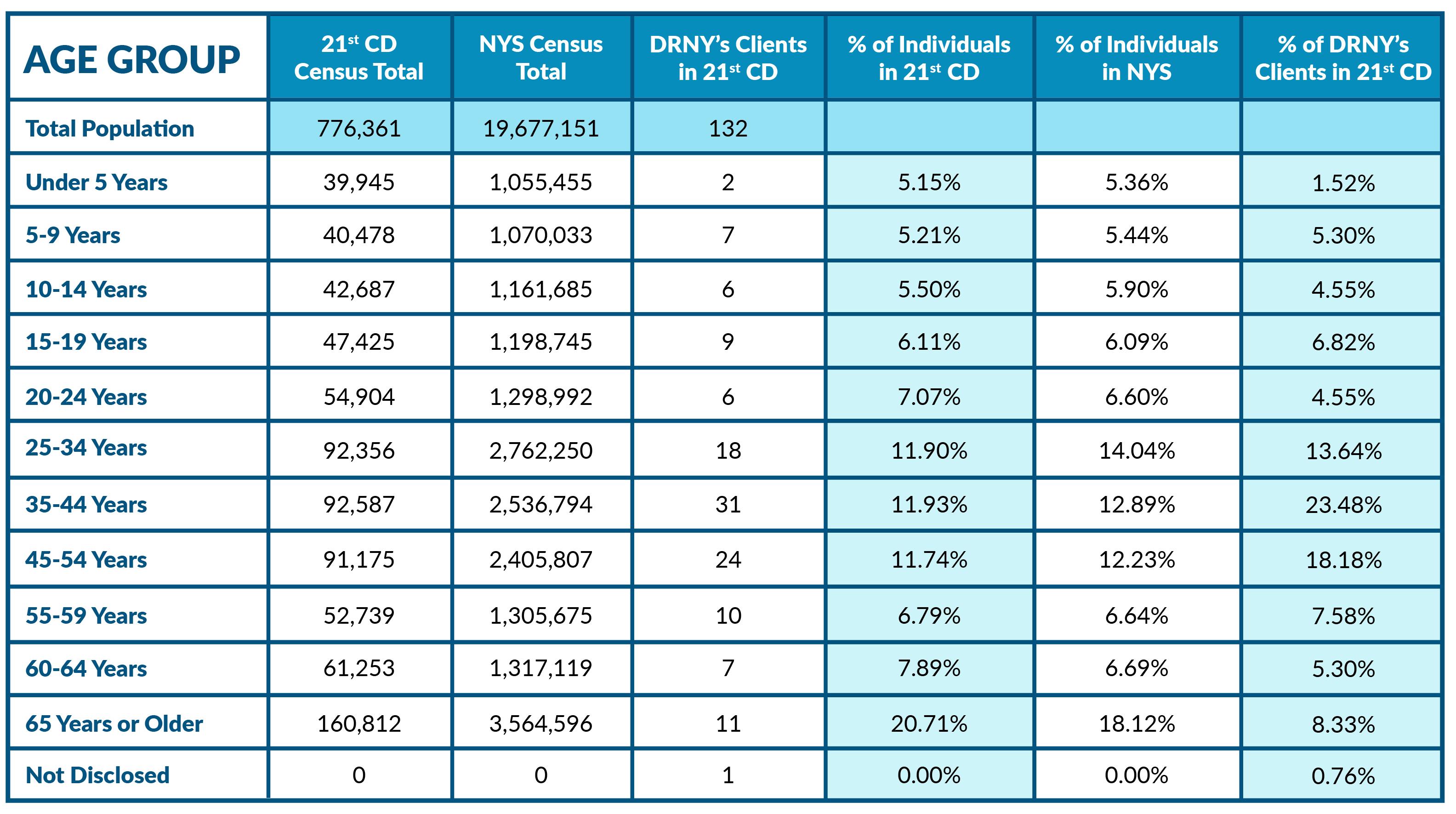
Clients from Under-Represented Groups
DRNY affirmatively seeks to provide services to historically under-represented groups. The following charts compare race and ethnicity demographics for the entire State of New York with that of DRNY’s clients.
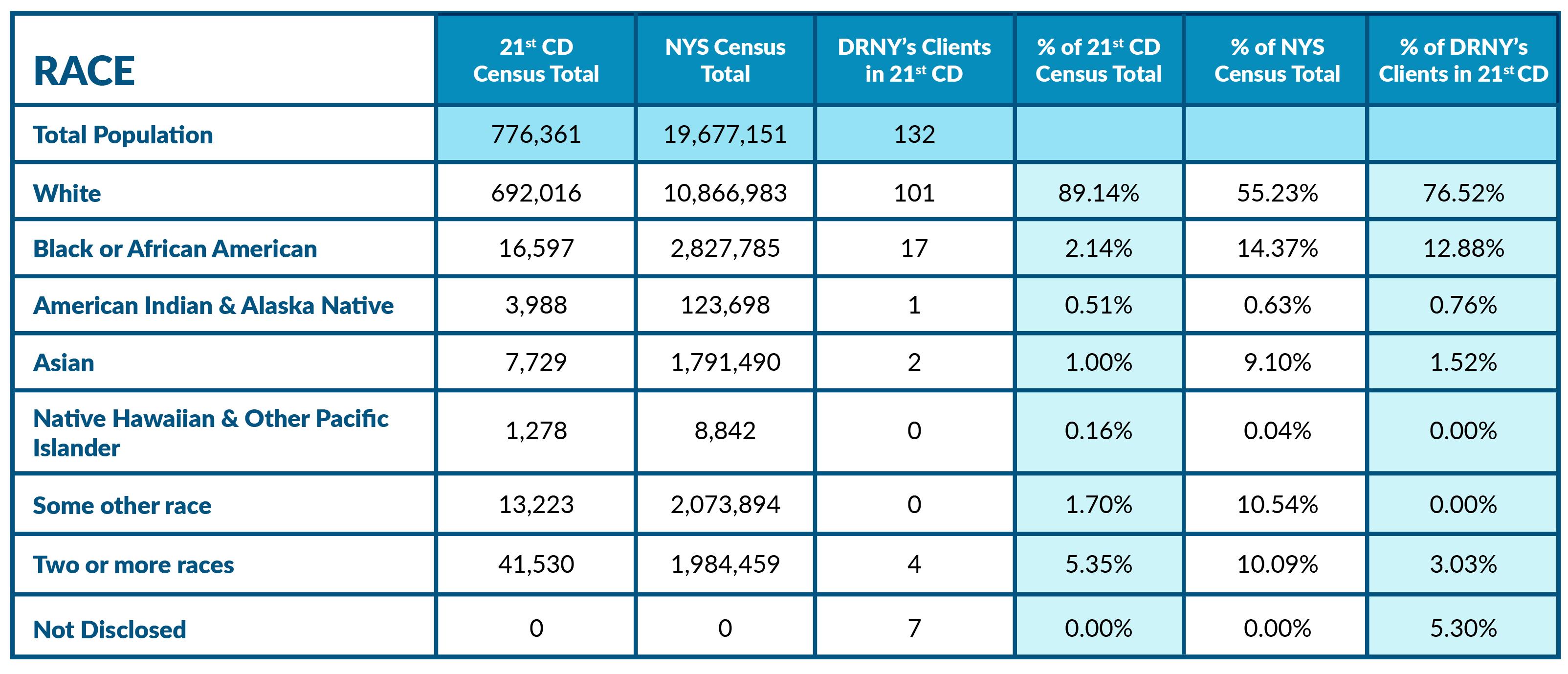

SERVICE REQUESTS
There were a total 151 service requests in this reporting period. DRNY provided full case services in 35 of the requests or 23.18%. DRNY provided Information and Referral (I&R) services to the remaining 116 requests.
DRNY makes appropriate referrals to other agencies in those matters where the issues are outside DRNY’s priorities, or because DRNY lacks the resources to undertake the matter. DRNY also provides information regarding the clients’ rights and available options. These matters vary from consumer financial issues, evictions, or other legal issues that are unrelated to the client’s disability.
Service Requests by Program

Response Time to Service Requests
14
of these Service Requests were resolved in less than 7 DAYS 20 of these Service Requests were resolved in less than 14 DAYS

REPRESENTATIVE ISSUE
Systemic Issues Regarding Family-Type Homes for Adults

We all want to ensure that our family members receive the best possible care when they are in need. The last thing we want to worry about is the possibility of their care ending prematurely.
A concerned daughter whose mother resides in a Family-Type Home for Adults (FTHA) informed us that her mother has been given a 30-day termination notice, which had understandably caused significant distress. According to her, the New York State Office of Children and Family Services (OCFS) asserted that the FTHA provided services beyond the allowable level of care.
The daughter was adamant that her mother would remain at the FTHA, and her doctor agreed that it was medically necessary. The FTHA informed us that a family member would be required to either stay in the home every night or that an additional nightly staff member would have to be paid for in case of an emergency. Due to this, the woman’s family made the difficult decision to move her out of the FTHA and to a nearby skilled nursing facility.
Our efforts revealed broader systemic issues regarding OCFS’s enforcement of its regulations and guidance to FTHAs on reasonable accommodations for residents using wheelchairs and Hoyer lifts. We continue our advocacy by reviewing the FTHA regulations at issue and will engage with OCFS to clarify the issues that the woman faced for other FTHA residents.
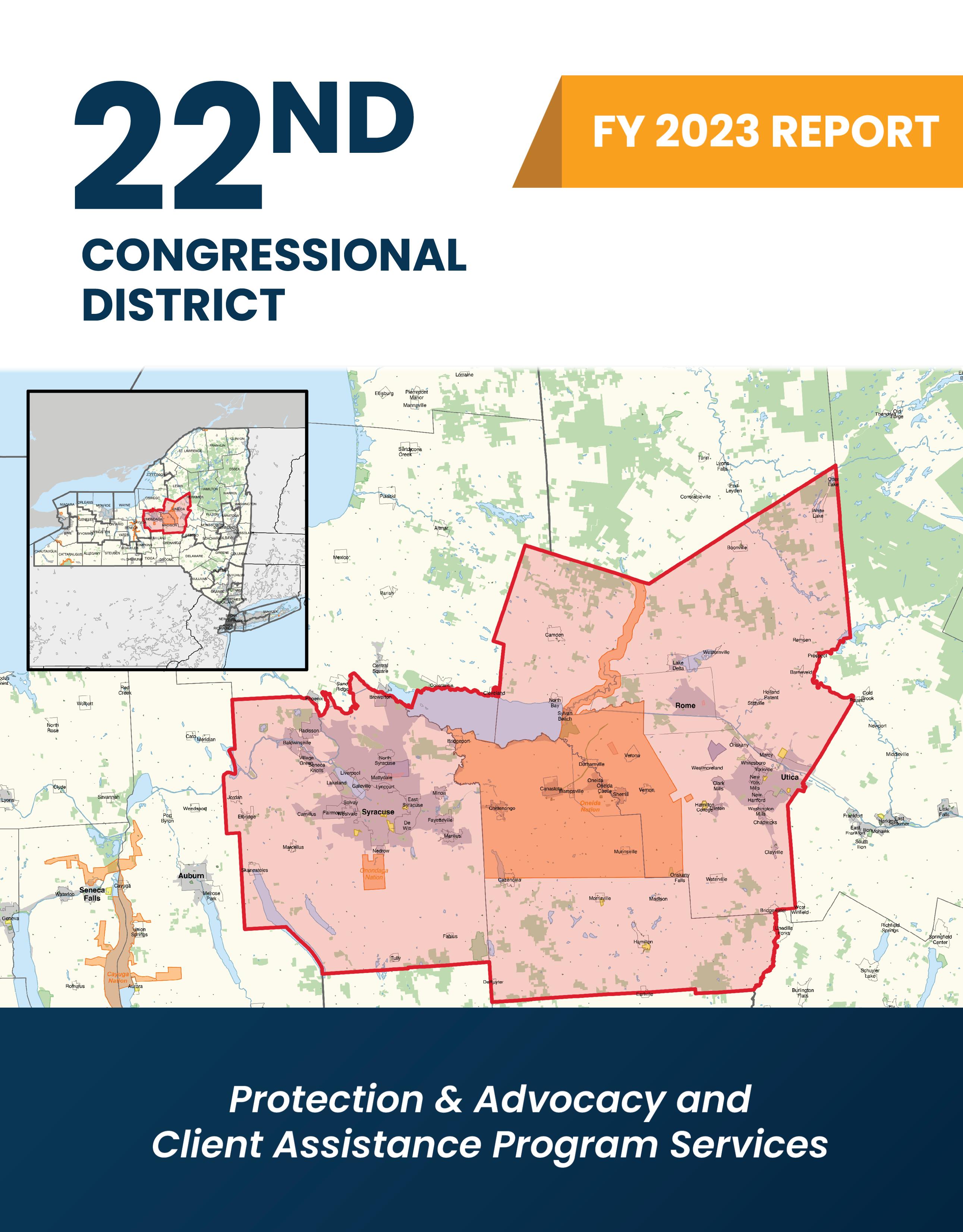
OUR CLIENTS
Over this 12 month period, DRNY averaged 8 Service Requests per month from individuals in your District. According to the most recent U.S. Census Bureau estimates, there are 113,924 individuals with disabilities living in the 22nd Congressional District and DRNY has handled 99 Service Requests for 88 distinct clients living in those 42 zip codes.
Clients by Age
In your district DRNY assisted some of the most vulnerable individuals. 21 unique clients were residents of nursing homes, hospitals, correctional facilities, rehabilitation facilities, and youth-focused residential facilities. Of the residents living in the community, 11 or nearly 17.74% of DRNY’s unique clients were under 18. According to census data, individuals under 18 account for 9.10% of civilian, non-institutionalized individuals with a disability.
The following table shows that 27.27% of DRNY’s clients are age 55 or older. *Demographic information is not required to receive DRNY services.
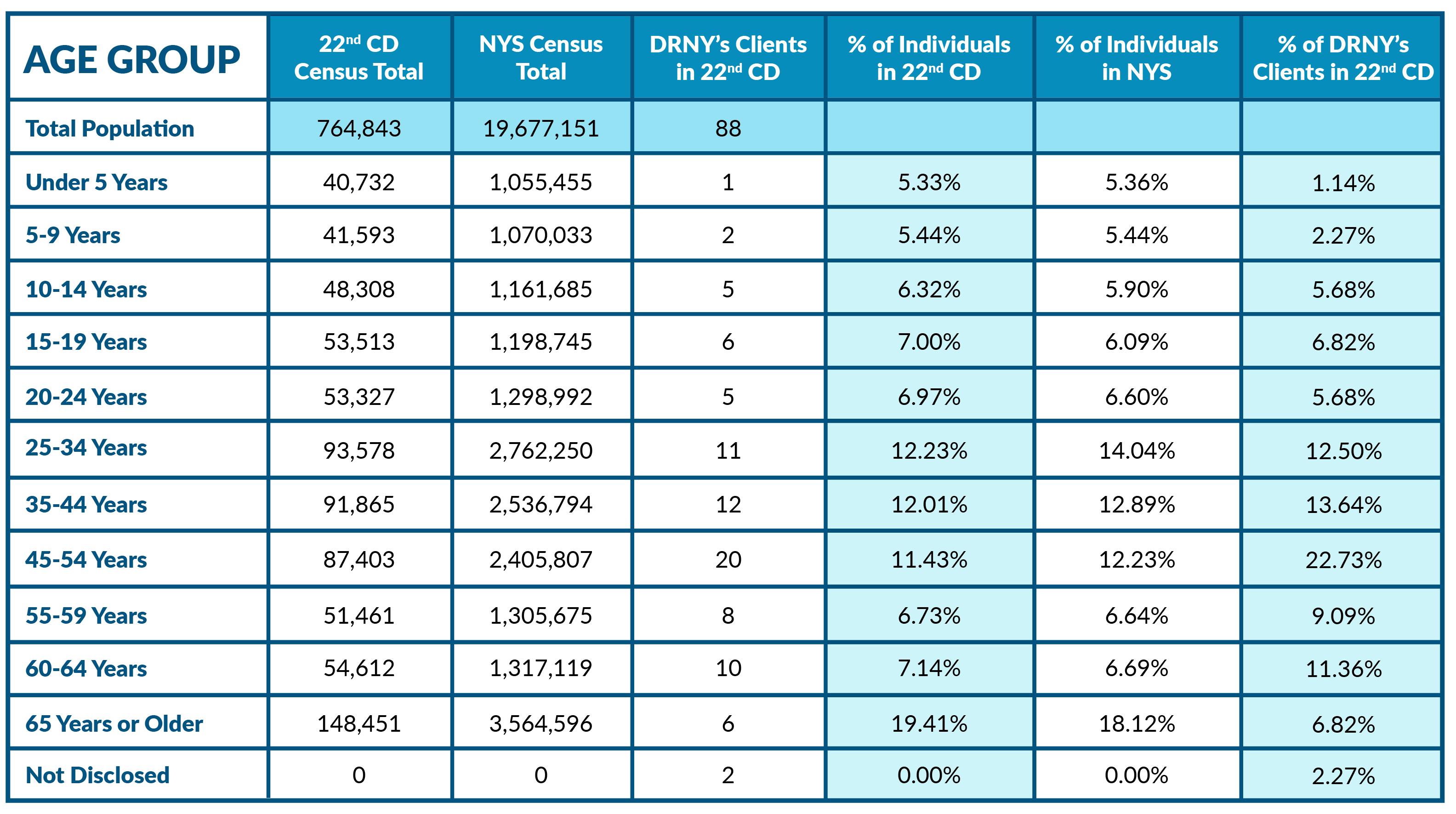
Clients from Under-Represented Groups
DRNY affirmatively seeks to provide services to historically under-represented groups. The following charts compare race and ethnicity demographics for the entire State of New York with that of DRNY’s clients.
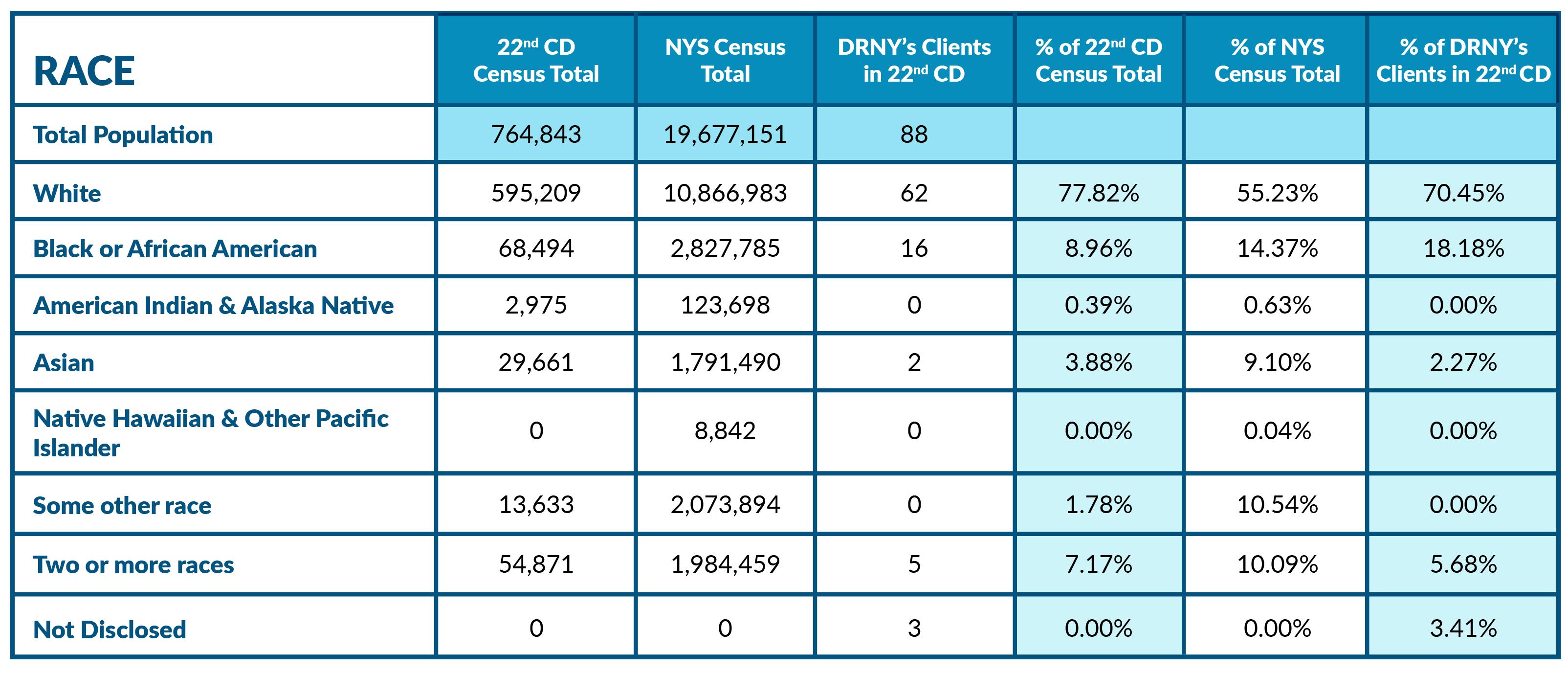

SERVICE REQUESTS
There were a total 99 service requests in this reporting period. DRNY provided full case services in 25 of the requests or 25.25%. DRNY provided Information and Referral (I&R) services to the remaining 74 requests.
DRNY makes appropriate referrals to other agencies in those matters where the issues are outside DRNY’s priorities, or because DRNY lacks the resources to undertake the matter. DRNY also provides information regarding the clients’ rights and available options. These matters vary from consumer financial issues, evictions, or other legal issues that are unrelated to the client’s disability.
Service Requests by Program
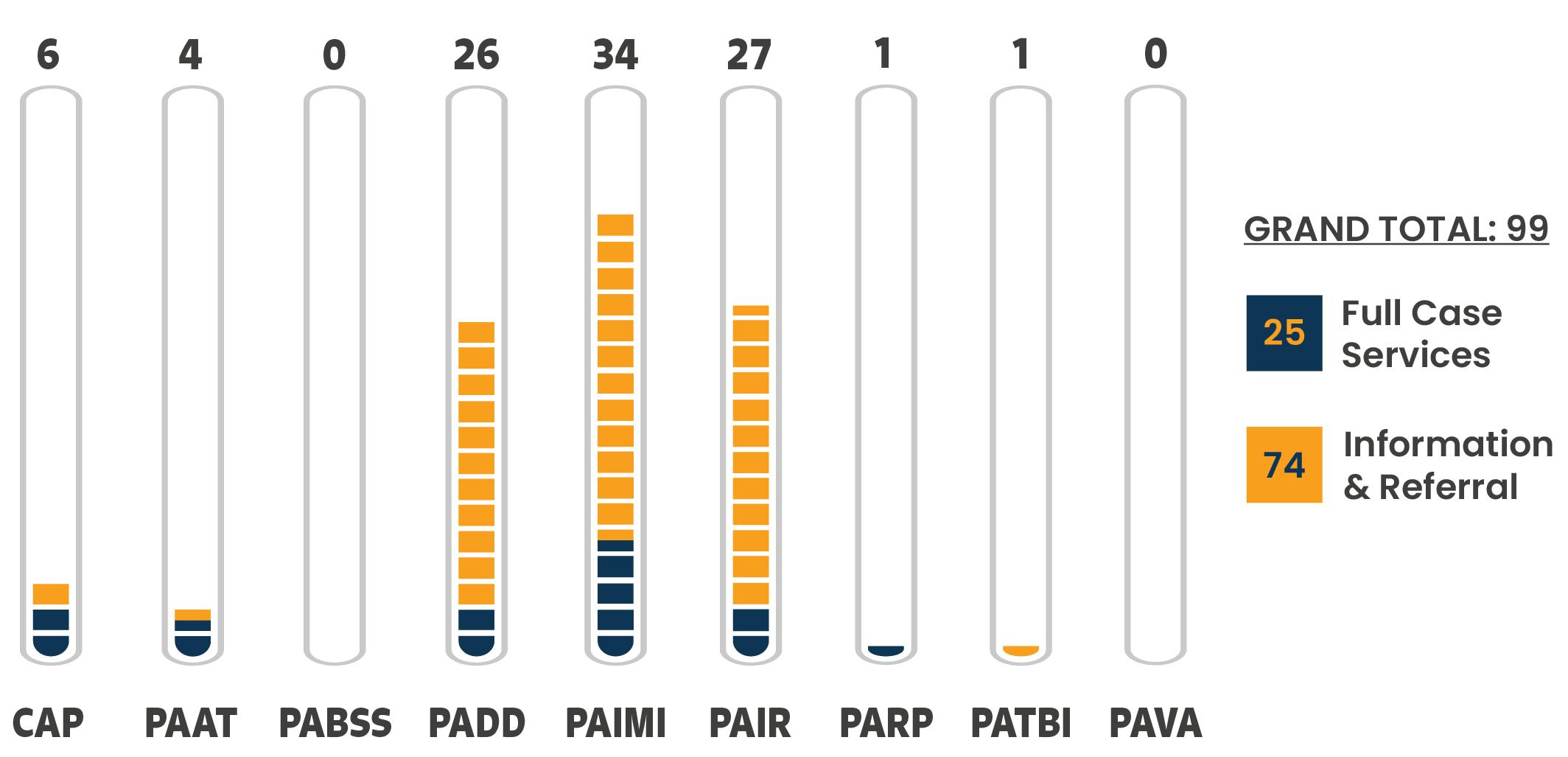
Response
Time to Service Requests
9 of these Service Requests were resolved in less than 7 DAYS
11 of these Service Requests were resolved in less than 14 DAYS

REPRESENTATIVE ISSUE
New Electric Wheelchair Provided

People who use wheelchairs rely on their equipment to participate in everyday tasks and activities. When their equipment is broken and unusable, everything becomes impossible.
The electric wheelchair of a man living in a skilled nursing facility broke down, and his facility refused to allow him to get a new one. After investigating the matter, we discovered that the facility was unwilling to finance the assessment and chair while he resided there.
We reminded the facility of their financial responsibility to pay for the assessment and any assistive technology, as the man was on Medicaid. As a result of our efforts, they initiated the wheelchair assessment process, and the man was provided with a new electric wheelchair at the facility’s expense.
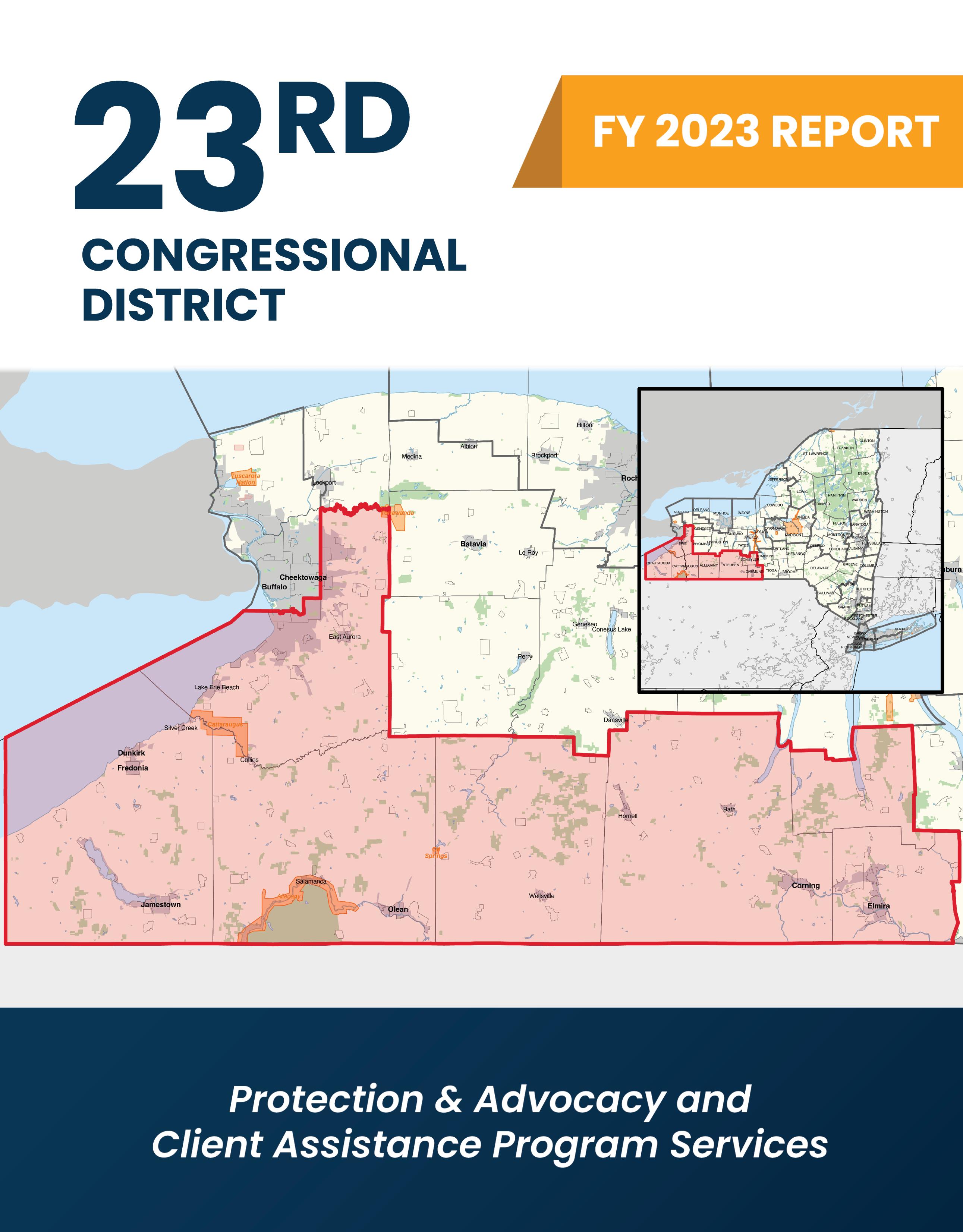
OUR CLIENTS
Over this 12 month period, DRNY averaged 6 Service Requests per month from individuals in your District. According to the most recent U.S. Census Bureau estimates, there are 119,006 individuals with disabilities living in the 23rd Congressional District and DRNY has handled 71 Service Requests for 55 distinct clients living in those 36 zip codes.
Clients by Age
In your district DRNY assisted some of the most vulnerable individuals. 14 unique clients were residents of nursing homes, hospitals, correctional facilities, rehabilitation facilities, and youth-focused residential facilities. Of the residents living in the community, 3 or nearly 8.33% of DRNY’s unique clients were under 18. According to census data, individuals under 18 account for 6.31% of civilian, noninstitutionalized individuals with a disability.
The following table shows that 32.73% of DRNY’s clients are age 55 or older. *Demographic information is not required to receive DRNY services.
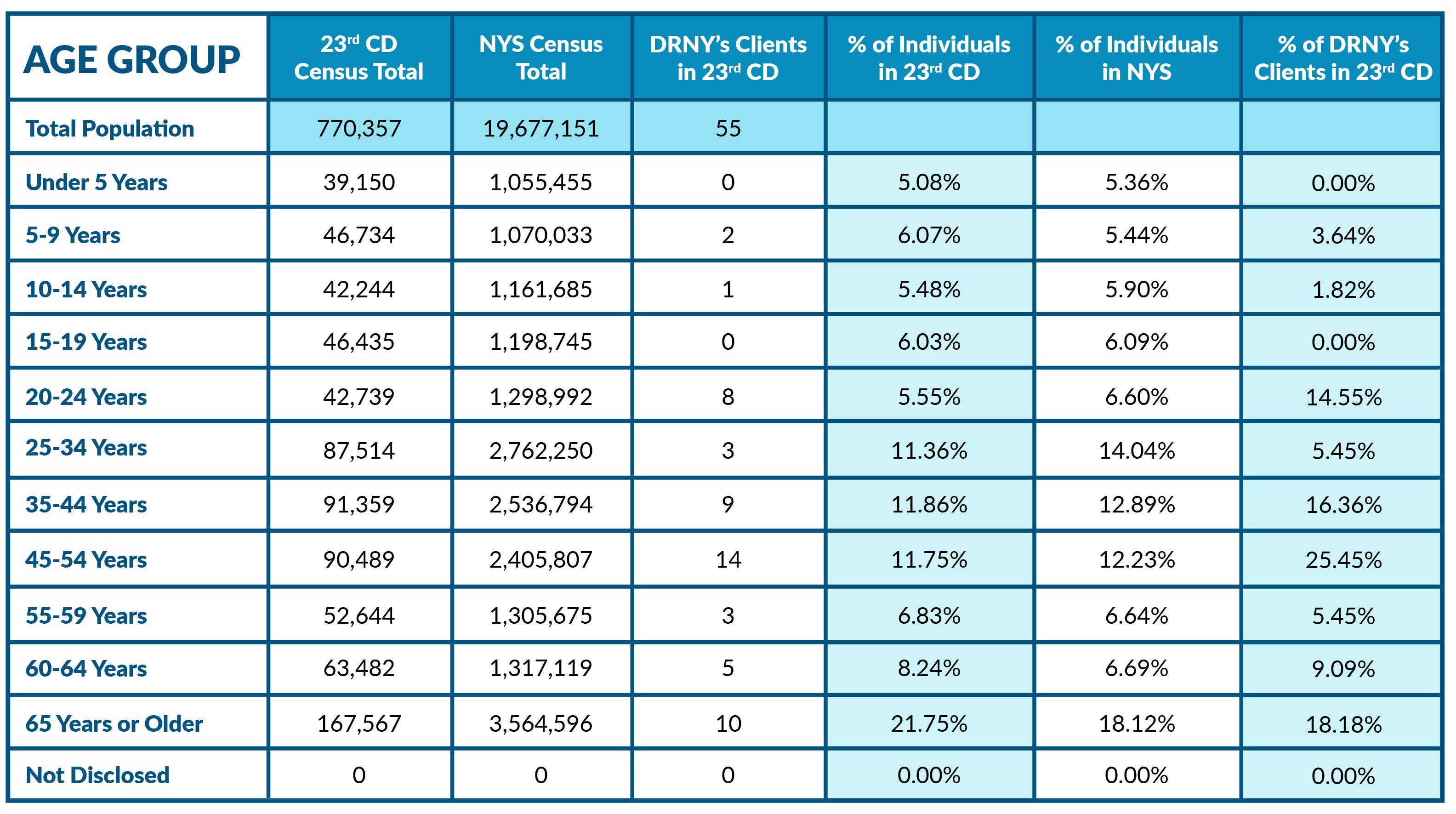
Clients from Under-Represented Groups
DRNY affirmatively seeks to provide services to historically under-represented groups. The following charts compare race and ethnicity demographics for the entire State of New York with that of DRNY’s clients.
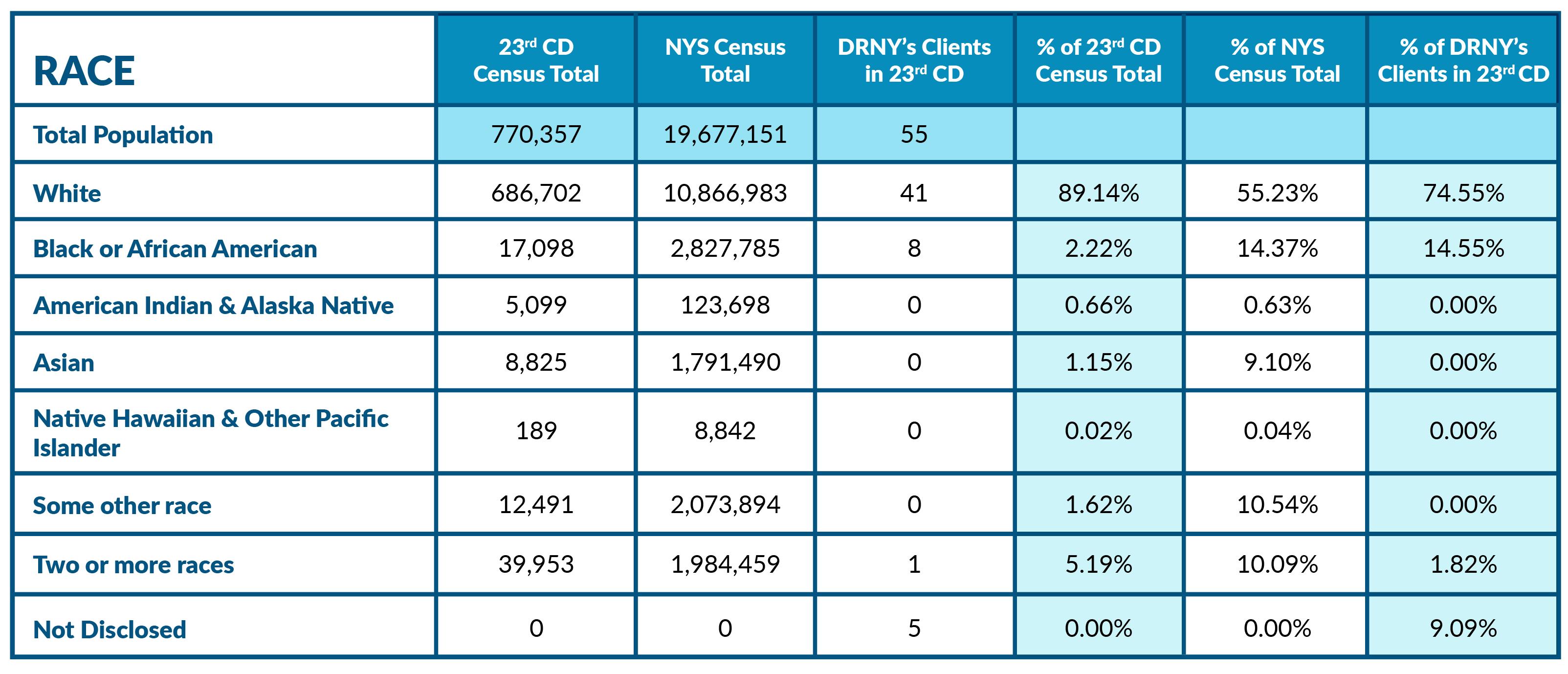

SERVICE REQUESTS
There were a total 71 service requests in this reporting period. DRNY provided full case services in 19 of the requests or 26.76%. DRNY provided Information and Referral (I&R) services to the remaining 52 requests.
DRNY makes appropriate referrals to other agencies in those matters where the issues are outside DRNY’s priorities, or because DRNY lacks the resources to undertake the matter. DRNY also provides information regarding the clients’ rights and available options. These matters vary from consumer financial issues, evictions, or other legal issues that are unrelated to the client’s disability.
Service Requests by Program
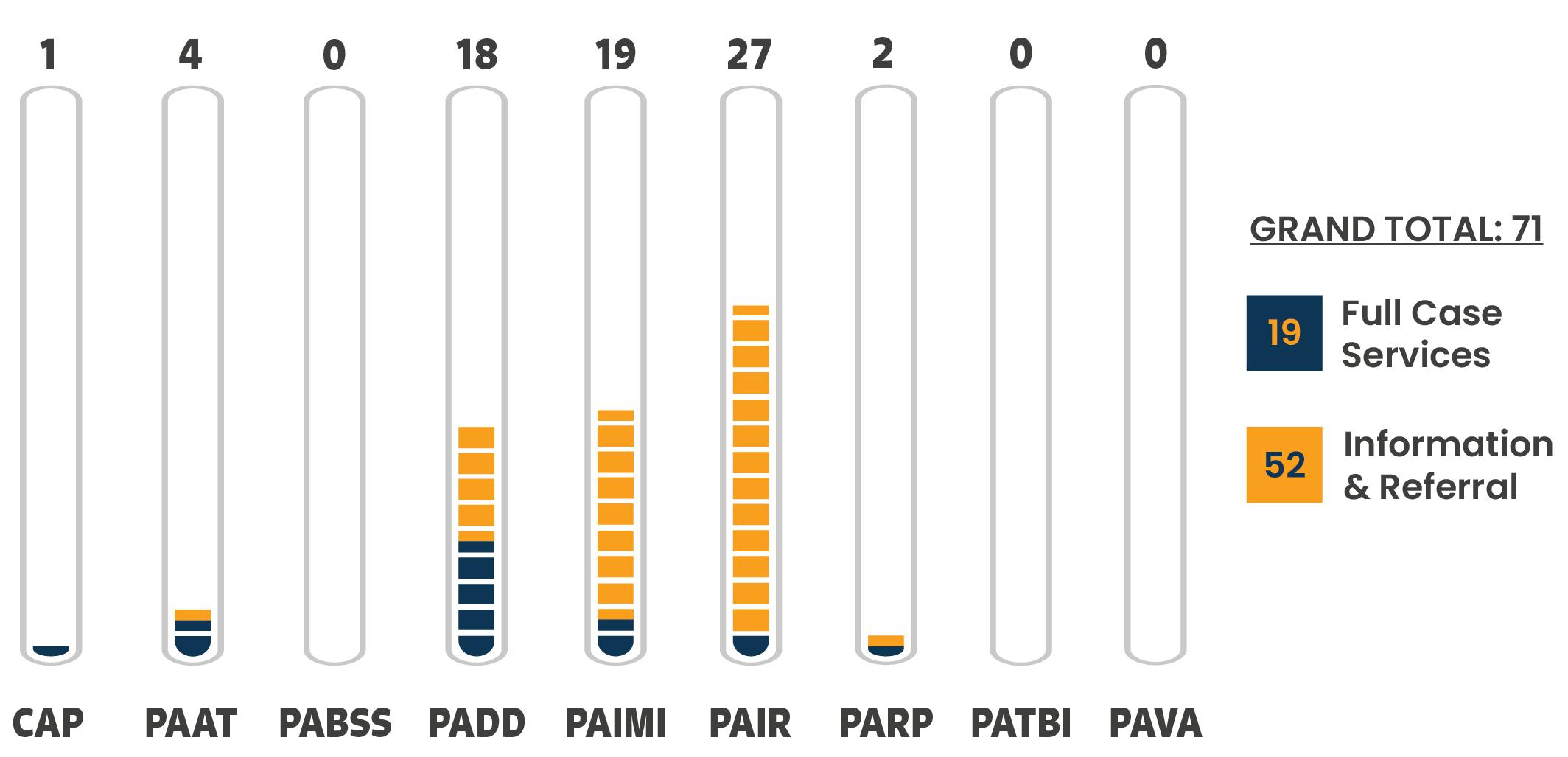
Response Time to Service Requests
12 of these Service Requests were resolved in less than 7 DAYS
8 of these Service Requests were resolved in less than 14 DAYS

REPRESENTATIVE ISSUE

Restoration of Rights
We successfully secured the removal of a 17-A guardianship in Cattaraugus County Surrogate’s Court for a woman living under guardianship for four years.
It was clear that she was completely independent and had been making decisions for herself, from paying her rent and sharing in the household expenses.
Before entering the court, we even secured a stipulation from her guardian stating that she did not need guardianship. We presented our case, and the Judge agreed to dissolve the guardianship on the spot without a hearing.
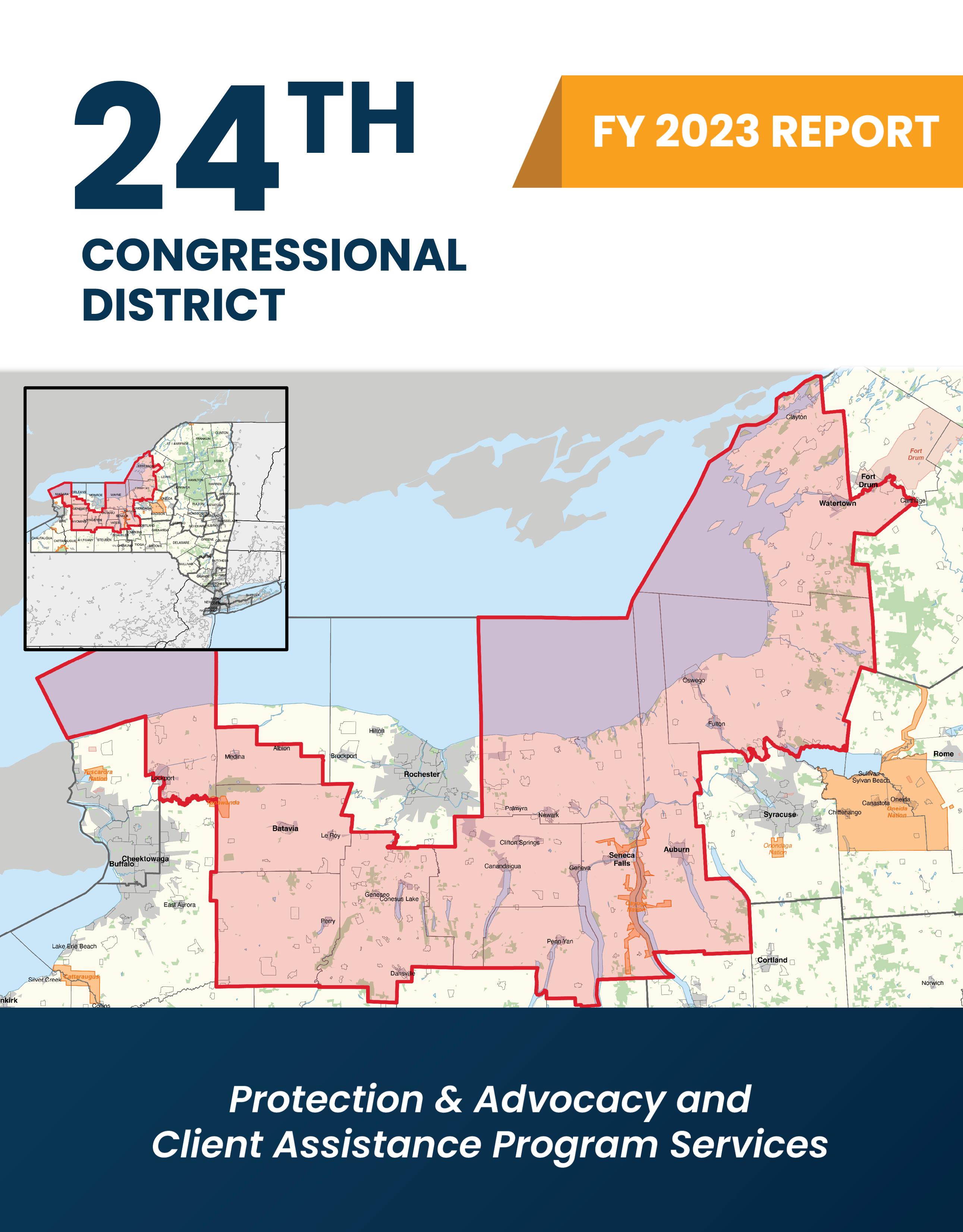
OUR CLIENTS
Over this 12 month period, DRNY averaged 9 Service Requests per month from individuals in your District. According to the most recent U.S. Census Bureau estimates, there are 117,516 individuals with disabilities living in the 24th Congressional District and DRNY has handled 113 Service Requests for 91 distinct clients living in those 41 zip codes.
Clients by Age
In your district DRNY assisted some of the most vulnerable individuals. 34 unique clients were residents of nursing homes, hospitals, correctional facilities, rehabilitation facilities, and youth-focused residential facilities. Of the residents living in the community, 11 or nearly 21.15% of DRNY’s unique clients were under 18. According to census data, individuals under 18 account for 8.92% of civilian, non-institutionalized individuals with a disability.
The following table shows that 18.86% of DRNY’s clients are age 55 or older. *Demographic information is not required to receive DRNY services.

Clients from Under-Represented Groups
DRNY affirmatively seeks to provide services to historically under-represented groups. The following charts compare race and ethnicity demographics for the entire State of New York with that of DRNY’s clients.
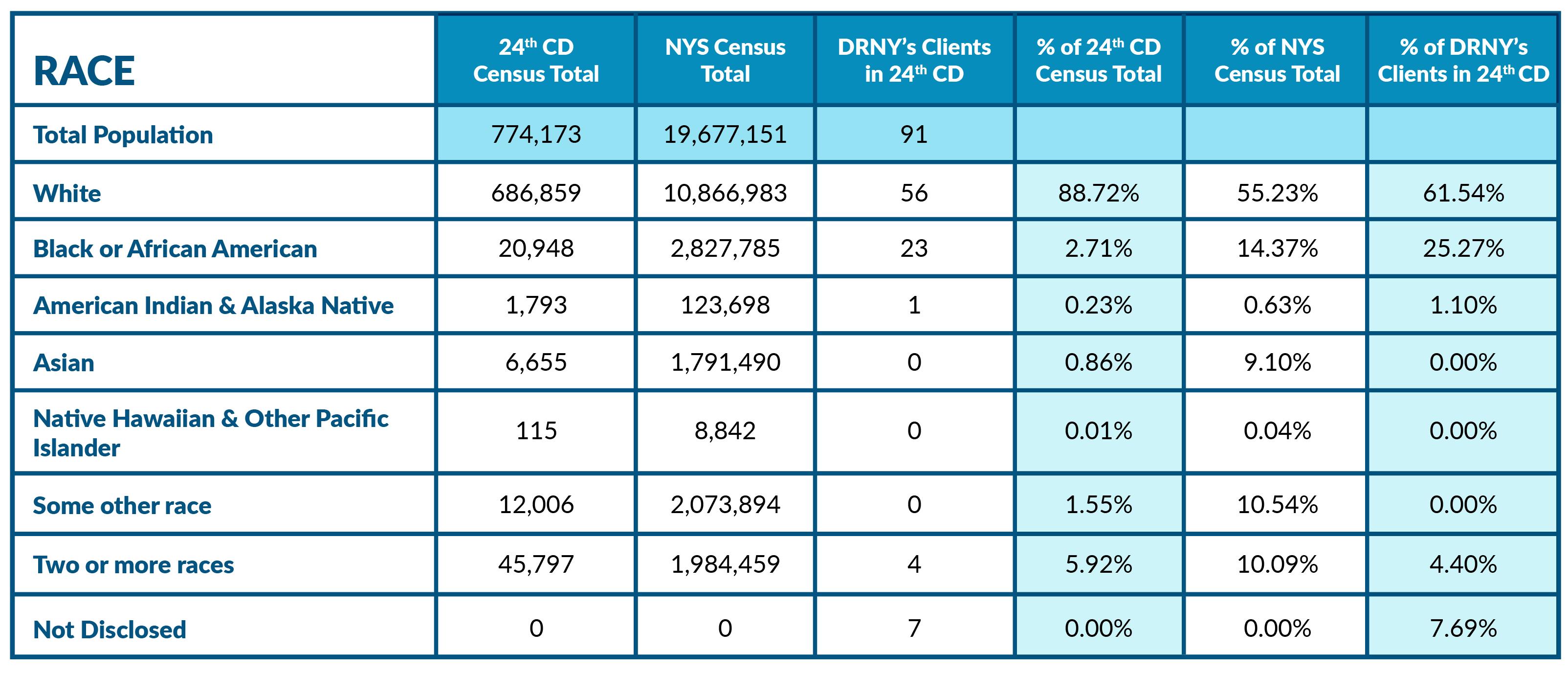

SERVICE REQUESTS
There were a total 113 service requests in this reporting period. DRNY provided full case services in 32 of the requests or 28.32%. DRNY provided Information and Referral (I&R) services to the remaining 81 requests.
DRNY makes appropriate referrals to other agencies in those matters where the issues are outside DRNY’s priorities, or because DRNY lacks the resources to undertake the matter. DRNY also provides information regarding the clients’ rights and available options. These matters vary from consumer financial issues, evictions, or other legal issues that are unrelated to the client’s disability.
Service Requests by Program
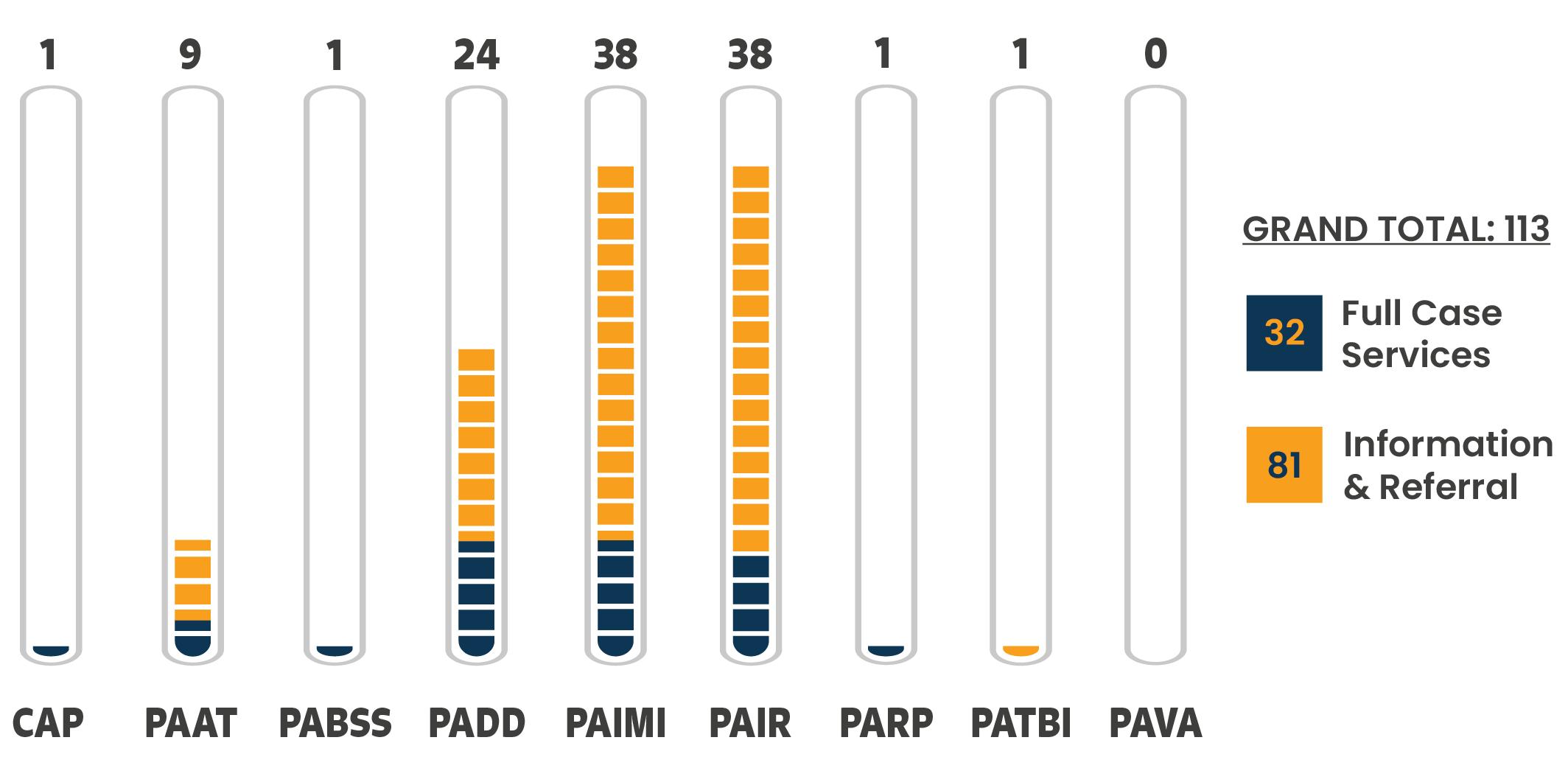
Response Time to Service Requests
12 of these Service Requests were resolved in less than 7 DAYS
10 of these Service Requests were resolved in less than 14 DAYS

REPRESENTATIVE ISSUE

University Student Received Appropriate Services for Seizures
Going off to college is a significant milestone. One that should be met with excitement and possibility. However, if a student is denied necessary health services or medication, it can make the entire process of attending college impossible.
A young man attending St. John Fisher University was denied reasonable accommodation to train his building security staff on the administration of his epileptic seizure medication.
His mother contacted us and explained that this medication must be administered within 3 minutes if he has an epilepsy attack. The college was not willing to administer it because they were not trained. She had contacted the college and even offered to train the staff herself. However, the college declined.
We reached out to the school and negotiated appropriate services related to his seizure disorder. The university agreed that security staff would provide seizure first aid as well as administer emergency medication at the direction of the young man’s parents.
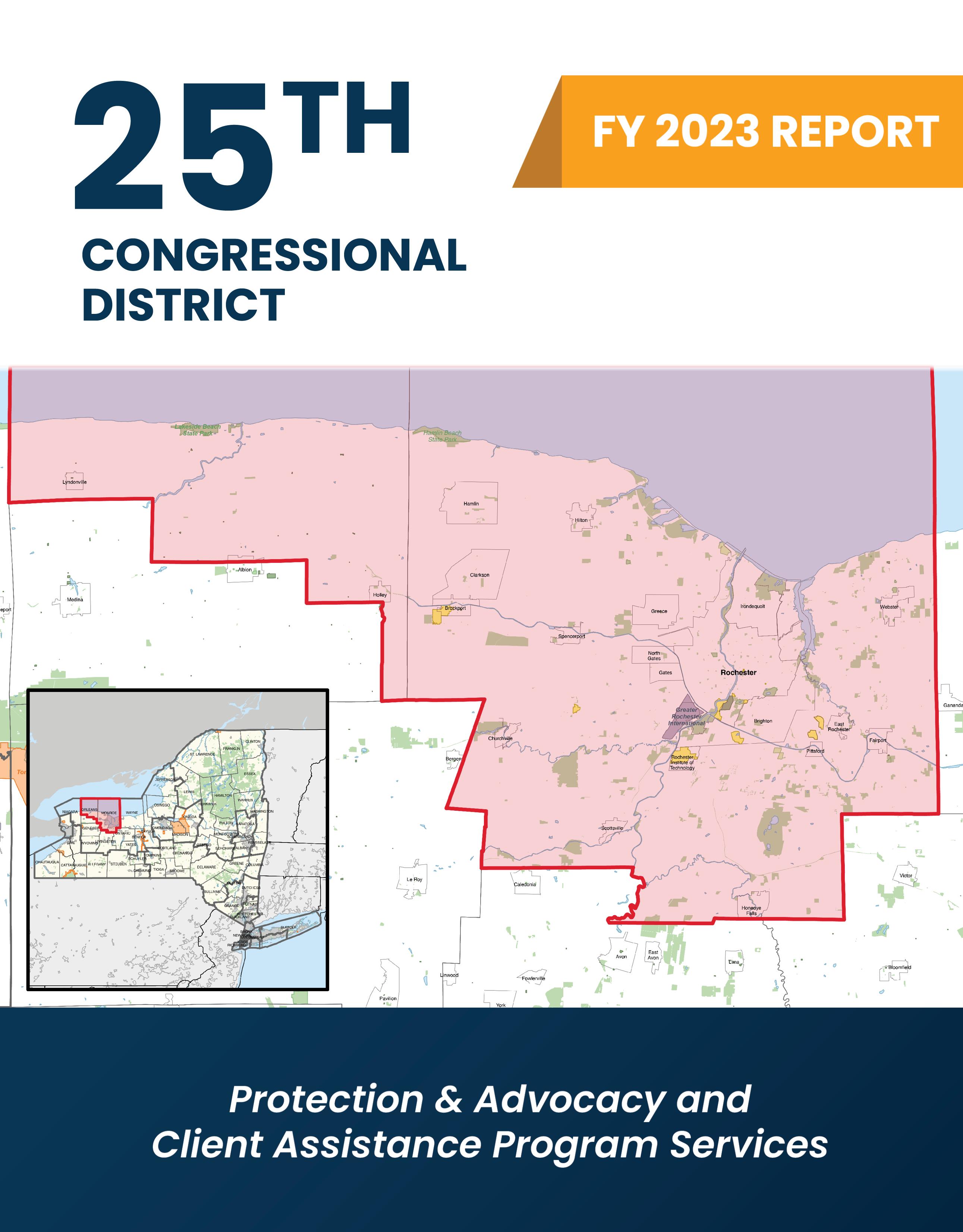
OUR CLIENTS
Over this 12 month period, DRNY averaged 9 Service Requests per month from individuals in your District. According to the most recent U.S. Census Bureau estimates, there are 109,637 individuals with disabilities living in the 25th Congressional District and DRNY has handled 105 Service Requests for 94 distinct clients living in those 37 zip codes.
Clients by Age
In your district DRNY assisted some of the most vulnerable individuals. 12 unique clients were residents of nursing homes, hospitals, correctional facilities, rehabilitation facilities, and youth-focused residential facilities. Of the residents living in the community, 9 or nearly 11.39% of DRNY’s unique clients were under 18. According to census data, individuals under 18 account for 10.29% of civilian, non-institutionalized individuals with a disability.
The following table shows that 29.79% of DRNY’s clients are age 55 or older. *Demographic information is not required to receive DRNY services.
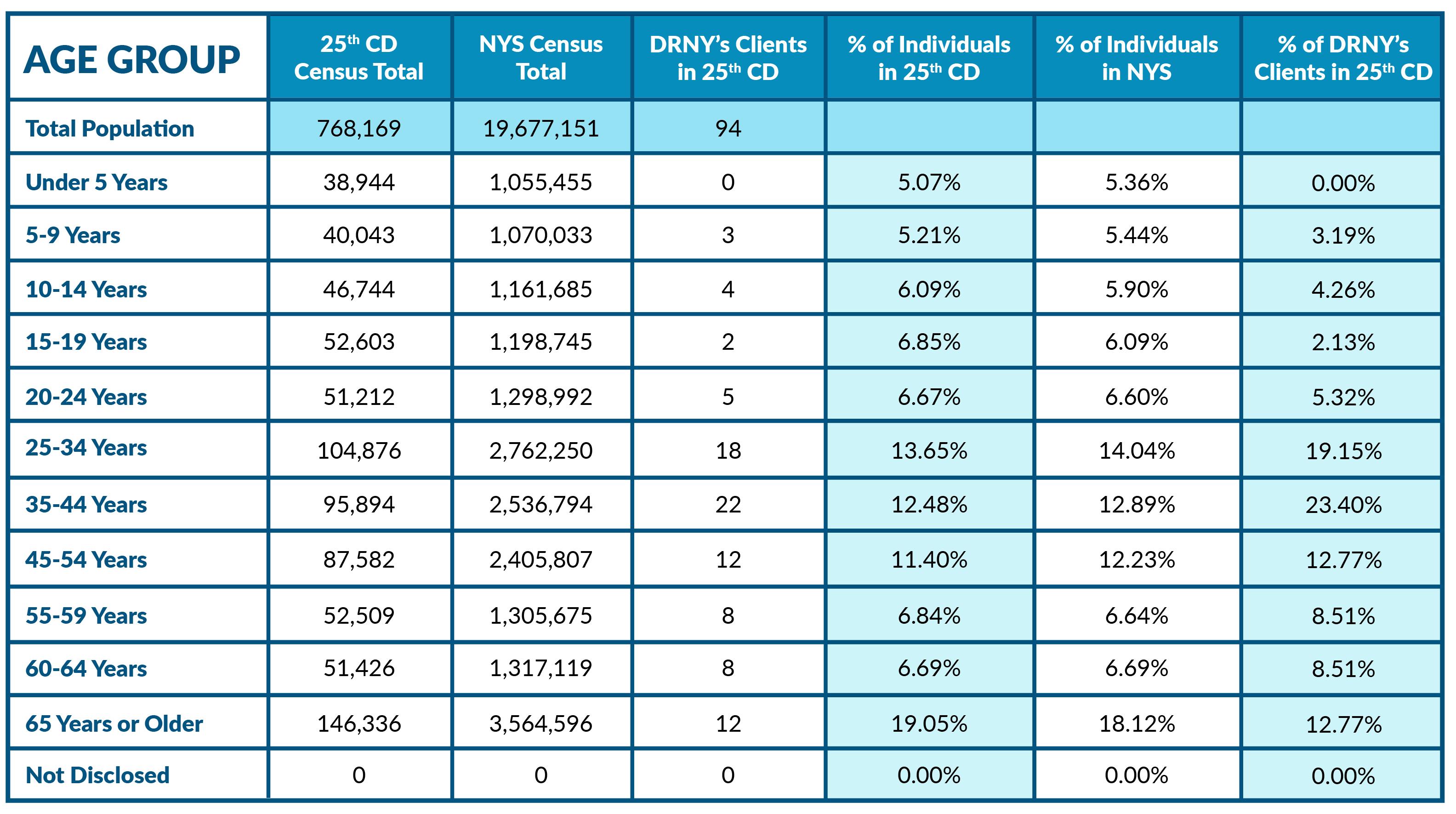
Clients from Under-Represented Groups
DRNY affirmatively seeks to provide services to historically under-represented groups. The following charts compare race and ethnicity demographics for the entire State of New York with that of DRNY’s clients.
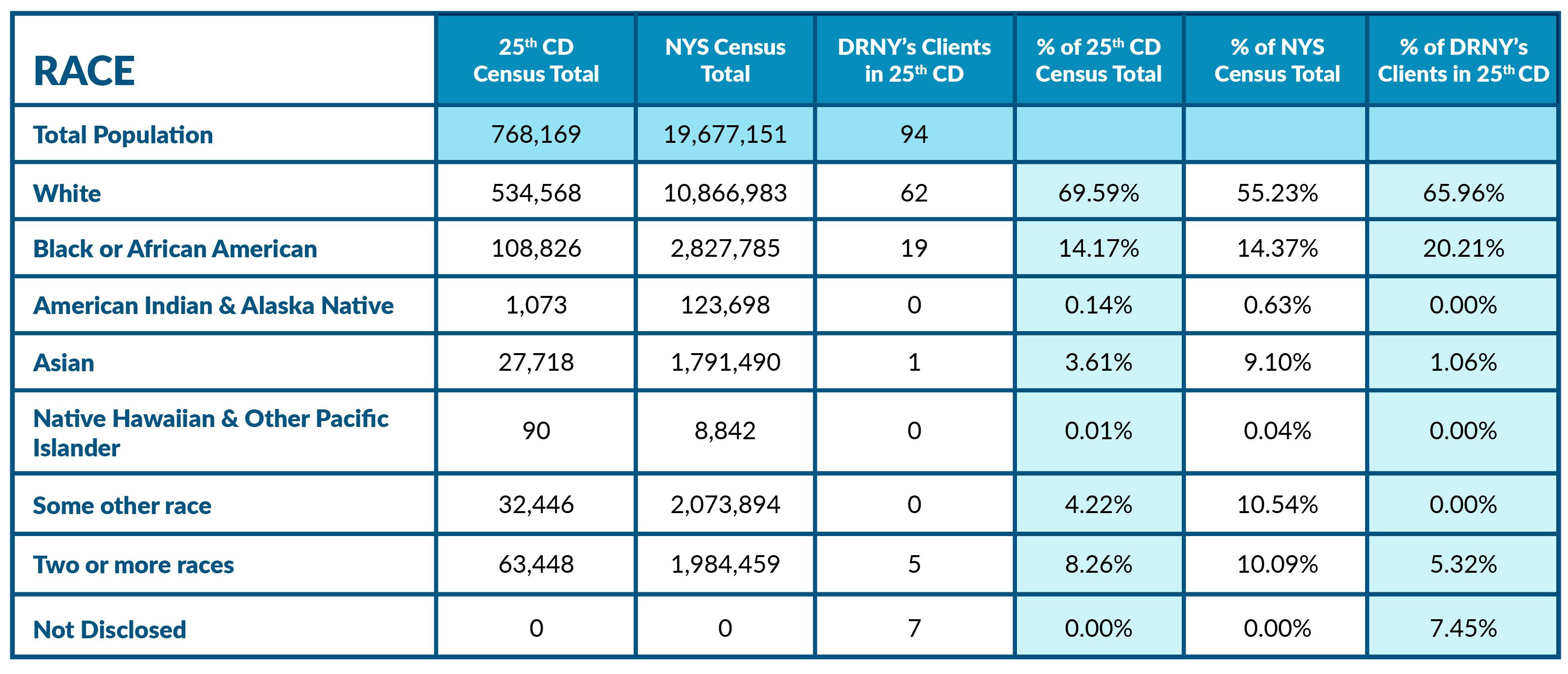

SERVICE REQUESTS
There were a total 105 service requests in this reporting period. DRNY provided full case services in 24 of the requests or 22.86%. DRNY provided Information and Referral (I&R) services to the remaining 81 requests.
DRNY makes appropriate referrals to other agencies in those matters where the issues are outside DRNY’s priorities, or because DRNY lacks the resources to undertake the matter. DRNY also provides information regarding the clients’ rights and available options. These matters vary from consumer financial issues, evictions, or other legal issues that are unrelated to the client’s disability.
Service Requests by Program
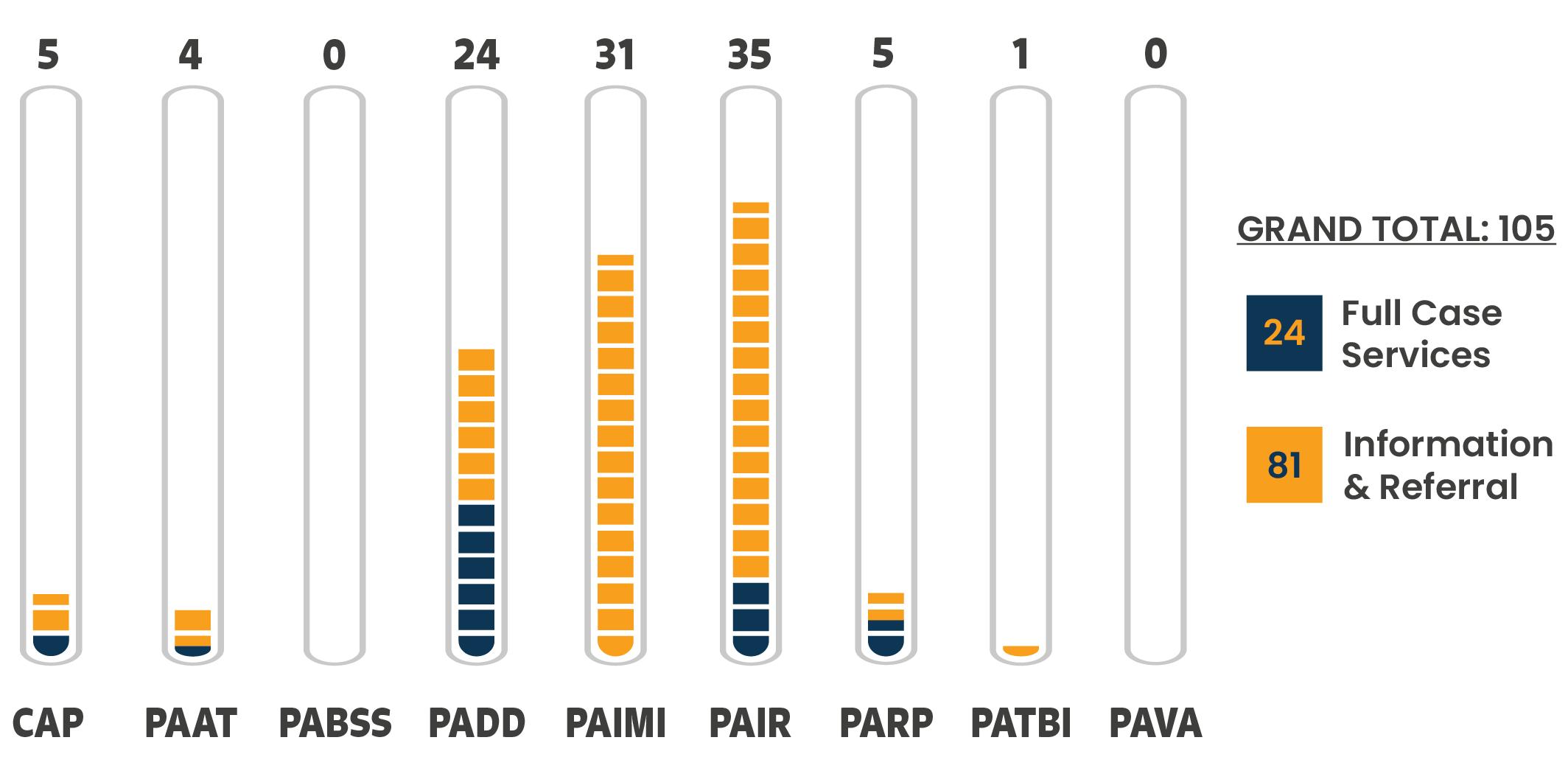
Response Time to Service Requests
12 of these Service Requests were resolved in less than 7 DAYS
6 of these Service Requests were resolved in less than 14 DAYS

REPRESENTATIVE ISSUE
Foot Steering System Modification Approved

Our vehicles are essential for living an independent and free life. However, if they break down, we become dependent on getting them fixed. Without timely repairs, we lose our ability to live and function independently.
A woman struggled to get approval for modifying her van’s foot steering system even though ten years ago, she received the modification approval from Adult Career and Continuing Education Services-Vocational Rehabilitation (ACCESVR). Still, she was denied because of a technical issue with the bidding process.
During our discussion with ACCES-VR, we discovered that their consultant had found a different and improved foot steering system, and we advocated for a re-bid for the modification.
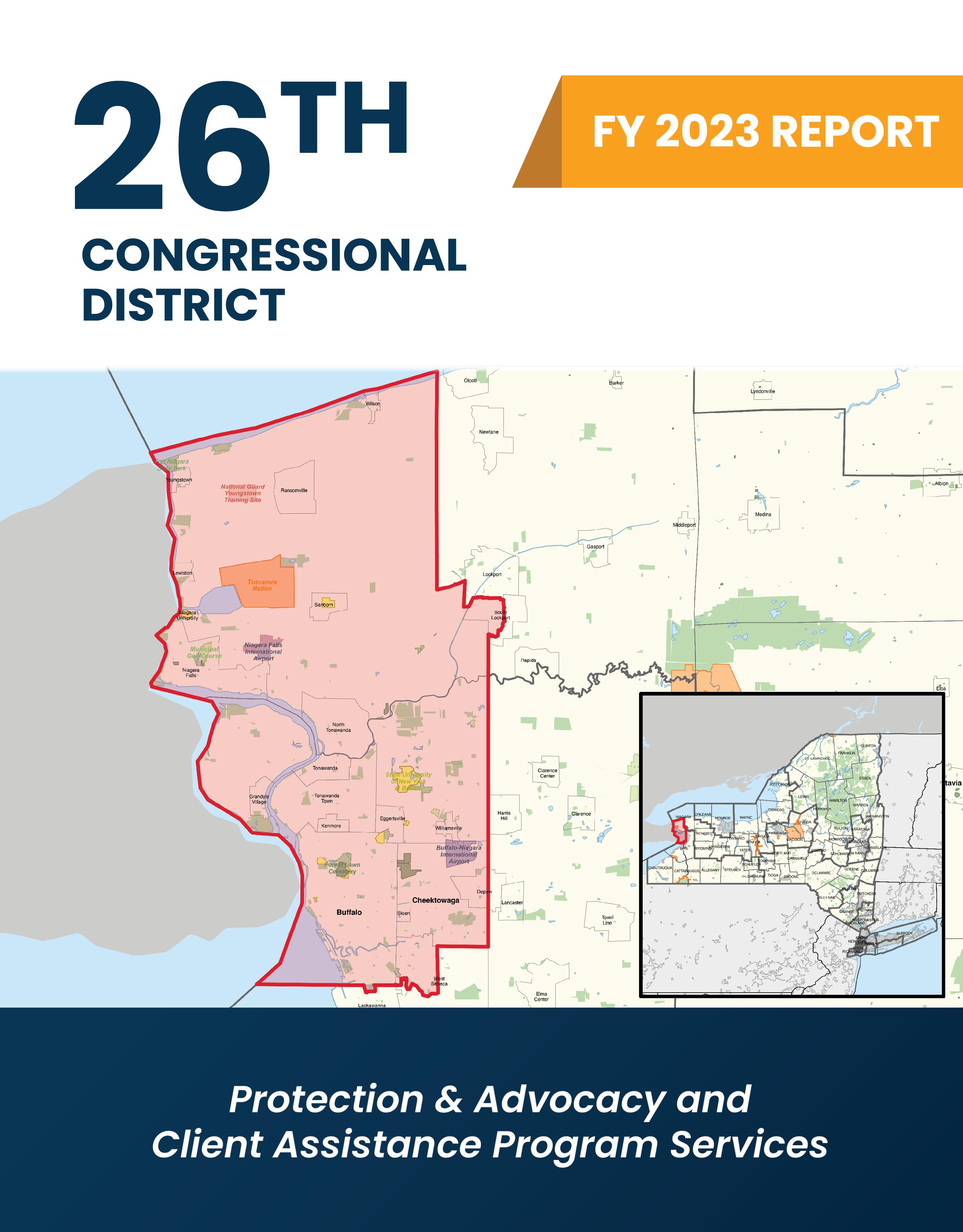
OUR CLIENTS
Over this 12 month period, DRNY averaged 5 Service Requests per month from individuals in your District. According to the most recent U.S. Census Bureau estimates, there are 102,830 individuals with disabilities living in the 26th Congressional District and DRNY has handled 62 Service Requests for 53 distinct clients living in those 30 zip codes.
Clients by Age
In your district DRNY assisted some of the most vulnerable individuals. 4 unique clients were residents of nursing homes, hospitals, correctional facilities, rehabilitation facilities, and youth-focused residential facilities. Of the residents living in the community, 8 or nearly 17.39% of DRNY’s unique clients were under 18. According to census data, individuals under 18 account for 7.34% of civilian, non-institutionalized individuals with a disability.
The following table shows that 28.30% of DRNY’s clients are age 55 or older. *Demographic information is not required to receive DRNY services.
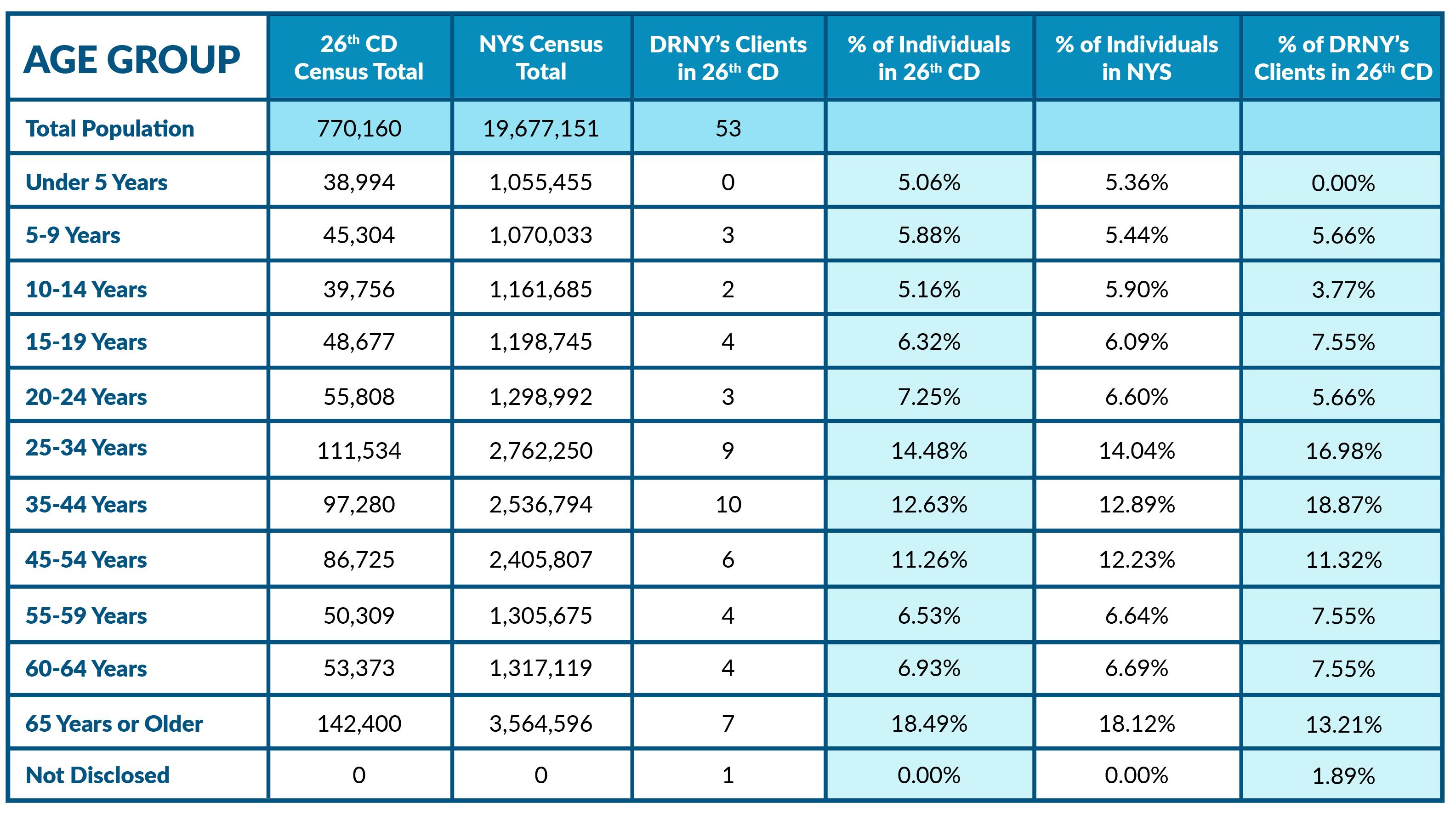
Clients from Under-Represented Groups
DRNY affirmatively seeks to provide services to historically under-represented groups. The following charts compare race and ethnicity demographics for the entire State of New York with that of DRNY’s clients.
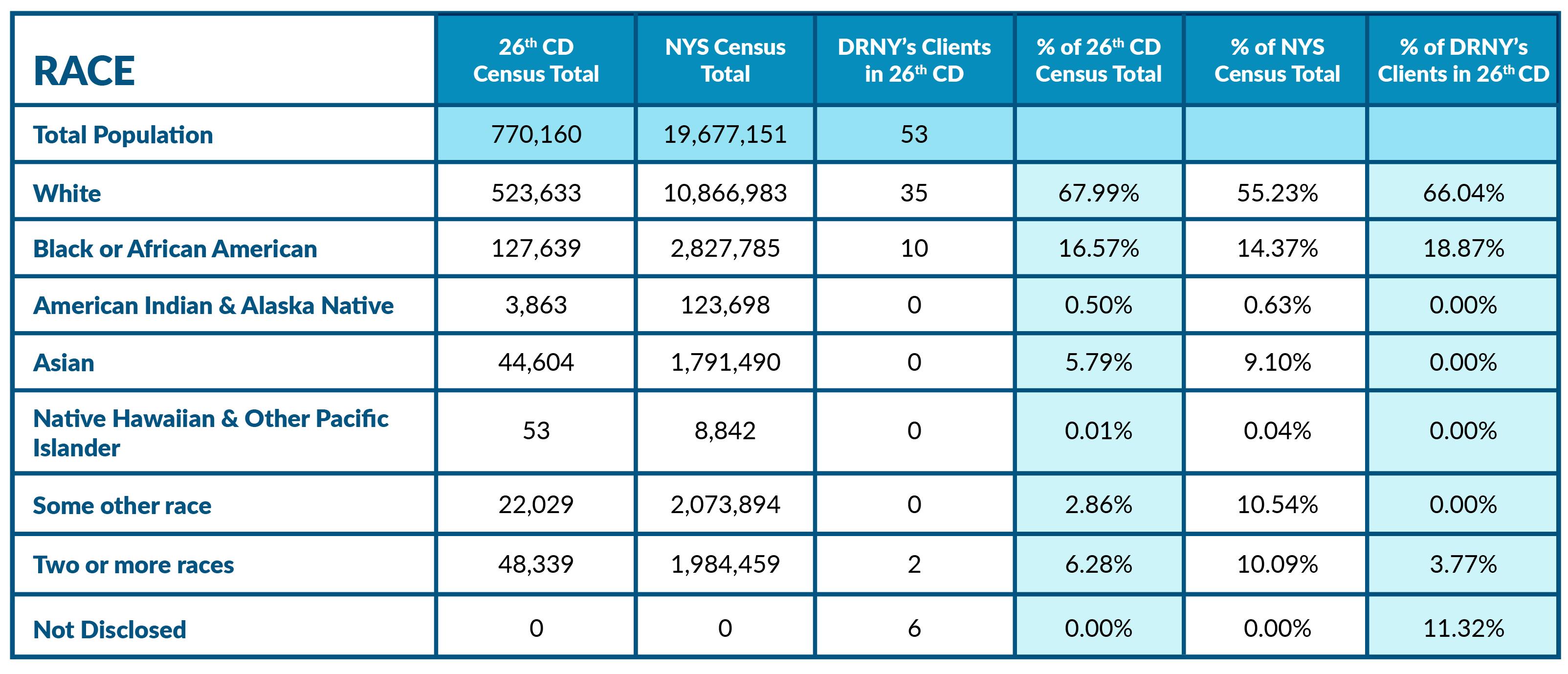

SERVICE REQUESTS
There were a total 62 service requests in this reporting period. DRNY provided full case services in 12 of the requests or 19.35%. DRNY provided Information and Referral (I&R) services to the remaining 50 requests.
DRNY makes appropriate referrals to other agencies in those matters where the issues are outside DRNY’s priorities, or because DRNY lacks the resources to undertake the matter. DRNY also provides information regarding the clients’ rights and available options. These matters vary from consumer financial issues, evictions, or other legal issues that are unrelated to the client’s disability.
Service Requests by Program
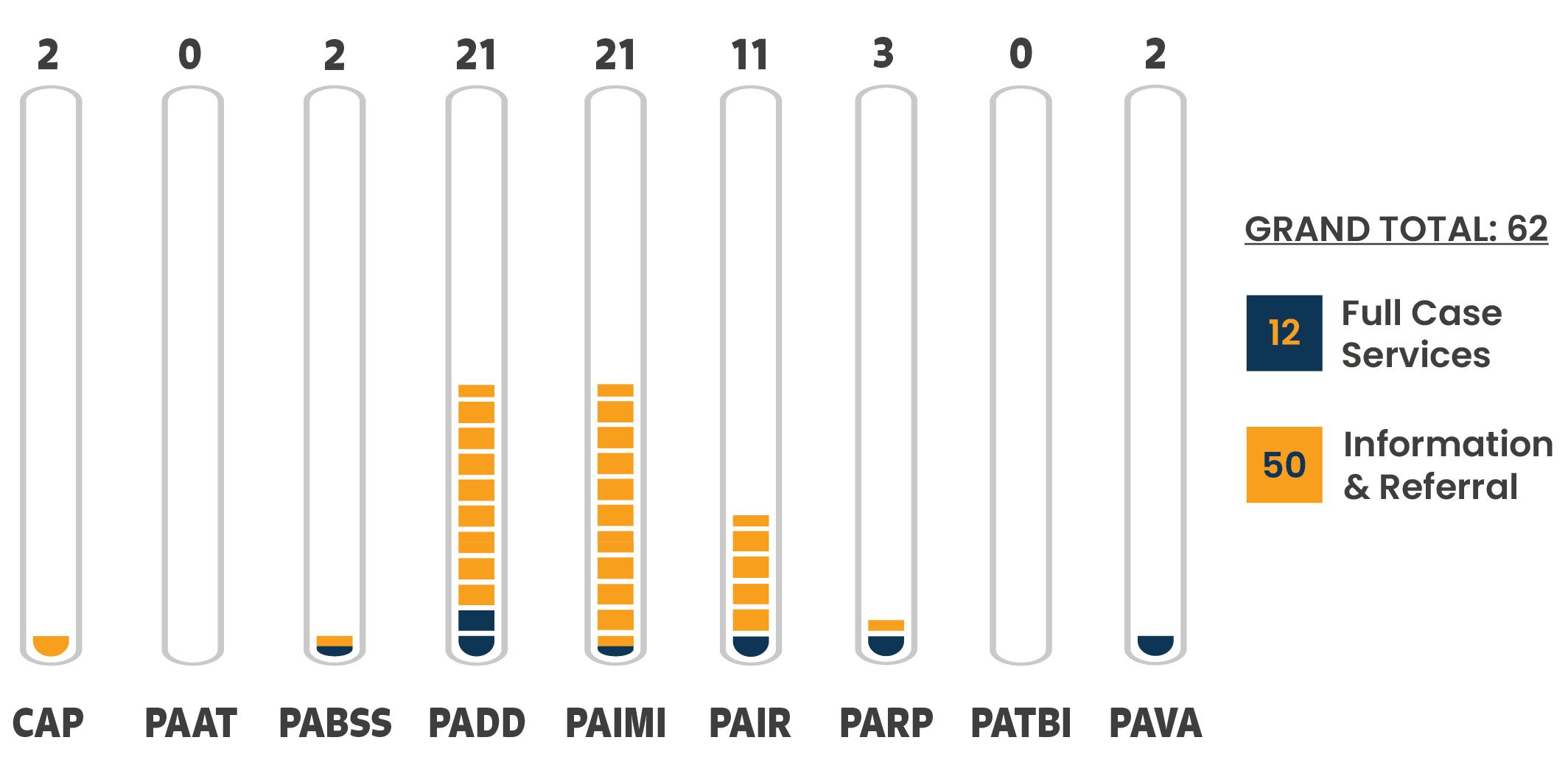
Response Time to Service Requests
of these Service Requests were resolved in less than 7 DAYS
7 of these Service Requests were resolved in less than 14 DAYS

REPRESENTATIVE ISSUE

Restoration of Rights
For over ten years, a young woman had been living under guardianship, and she wanted it removed.
Although her guardian agreed that no guardian was necessary and had been mostly absent for four years, the court still appointed a Guardian Ad Litem (GAL) who expressed some reservations about terminating the guardianship.
We worked with the young woman to testify at the proceedings and highlighted her effective support system for decision-making and daily activities. This illustrated why plenary guardianship was unnecessary.
The Court agreed with us, issuing a decision that found she had sufficient support in her life and that guardianship was not in her best interests.
DRNY PROGRAMS
All DRNY work is conducted with recognition that the people we serve combat persistent societal stigmatization and can be members of traditionally underserved communities, including BIPOC and LGBTQIA+ communities. We develop systemic advocacy projects to address patterns of discrimination, including state and federal class action litigation, monitoring and investigation, published reports and policymaker education.
CAP Program
CAP is an advocacy resource for people with disabilities who are seeking, receiving, or have been denied services from state vocational rehabilitation agencies. In NYS those agencies are the Commission for the Blind and ACCES-VR. We help people get the services they need in order to prepare for, obtain, and maintain employment.
PAAT Program
Our PAAT program helps people understand their rights to use medical devices or technology that can aid them in managing their disability. Collectively this is called Assistive Technology (AT). We help people navigate legal issues such as insurance denials of coverage for AT or related services, access to medical care that requires use of AT, housing accommodations, workplace accommodations, and accommodations in school.
PABSS Program
Our PABSS program helps people remove barriers to being successfully employed. Some of those barriers include denial of reasonable accommodations, lack of accessible transportation to get to work, or being discriminated against while at work. Potential clients must be under age 65, and must currently be receiving SSI and/or SSDI.
PADD Program
Our PADD program provides both systemic and individual advocacy to people with ID/DD. We investigate complaints of abuse, neglect, and rights violations. We monitor locations where people with disabilities receive services. We work to enforce and expand the rights of all people with ID/DD through lawsuits, public reports, education, outreach, and self-advocacy support.
PAIMI Program
Our PAIMI program provides both systemic and individual advocacy to people with a mental health diagnosis. We advocate on behalf of individuals living in the community, as well as in congregate care settings, including psychiatric facilities, adult homes, jails, and prisons. We work to enforce and expand the rights of all people with mental illness through lawsuits, public reports, education, outreach, and self-advocacy support.
PAIR Program
Our PAIR program serves people with disabilities who are not eligible for assistance from our other programs. We work to ensure that they are free from discrimination in housing, employment, education, and access to public accommodations and that they are included in emergency preparedness initiatives.
PARP Program
Our PARP program protects Social Security beneficiaries that require the assistance of a representative payee from financial exploitation, abuse, and neglect. A representative payee is a person or an organization who assists someone who can’t manage or direct the management of their benefits. We review the performance of representative payees through beneficiary and payee interviews, onsite inspections, and a detailed review of financial and other documentation. These reviews ensure the wellbeing of beneficiaries while educating payees on how to better serve them.
PATBI Program
Our PATBI program helps people with TBI navigate legal issues that may affect all aspects of their lives, including access to medical care, housing accommodations, workplace accommodations, and accommodations in school. We ensure that people with TBI and their families have access to information, referrals and advice, individual and family advocacy, legal representation, and specific assistance in self-advocacy.
PAVA Program
Our PAVA program helps ensure that people with disabilities are included in the election process. Civic engagement and inclusion of all people, including people with disabilities, is paramount to our democracy. We ensure that every qualified person with a disability has access to vote on Election Day.
ALBANY
725 Broadway, Suite 450
Albany, New York 12207-5001

BROOKLYN
25 Chapel Street, Suite 1005 Brooklyn, New York 11201
ROCHESTER
44 Exchange Blvd, Suite 110 Rochester, New York 14614
MAILING ADDRESS: Disability Rights New York, 279 Troy Road, Ste 9, PMB 236, Rensselaer, NY 12144

DRNY is supported at taxpayer expense by the U.S. Department of Health & Human Services, The Administration for Community Living; Center for Mental Health Services, Substance Abuse & Mental Health Services Administration; U.S. Department of Education, Rehabilitation Services Administration; and, the Social Security Administration. This publication does not represent the views, positions or policies of, or the endorsements by, any of these federal agencies.





